

Editor
Executive Editor
Managing Editor
Manuscripts Editor
Special Projects Editor
Design Director
TriQuarterly Fellow
Fiction Readers
Editorial Assistants
Advisory Editors




Editor
Executive Editor
Managing Editor
Manuscripts Editor
Special Projects Editor
Design Director
TriQuarterly Fellow
Fiction Readers
Editorial Assistants
Advisory Editors

Reginald Gibbons
Bob Perlongo
Joe La Russo
Susan Hahn
Fred Shafer
Gini Kondziolka
Greg Myerson
Lisa Cole, Chris Olson
Brian Bouldrey, Will Johnson, Michael Lindsay, Frances Norton
Robert Alter, Michael Anania, Elliott Anderson, Terrence DesPres, Gloria Emerson, Richard Ford, George Garrett, Gerald Graff, Francine du Plessix Gray, Michael S. Harper, David Hayman, Bill Henderson, Maxine Kumin, Elizabeth Pochoda, Michael Ryan
TRIQUARTERlY IS AN INTERNAnONAL JOURNAL OF ART, WRITING, AND CUlTURAllNQUIRY PUBLISHED IN THE FALL, WINTER. AND SPRING AT NORTHWESn:RN UNIVERSITY, EVANSTON, ILLINOIS 60201
Subscription rates-Individuals: one year $16; rwo years $28; life $100. Institutions: one year $22; two years $40; life $200. Foreign subscripnons $4 per year additional. Single copies usually $5.95. Sample copies $3. Correspondence and subscriptions should be addressed to TriQuarterly, NORTHWESTERN UNIVERSITY, 1735 Benson Avenue, Evanston, Illinois 60201. The editors invite submissions of fiction, poetry, and literary essays. No manuscripts WIll be returned unless accompanied by a stamped, self-addressed envelope. All manuscripts accepted for publication become the property of TriQuarterly, unless otherwise indicated. Copyright \!:) 1983 by TriQuarterly. All rights reserved. The views expressed In this magazine are to be attributed to the writers, not the editors or sponsors. Printed in the United States of America.
National distributor to retail trade: B. Deboer, 113 East Central Street-Rear, Nutley, New Jersey 07110. Distnbutor for West Coast trade: Bookpeople, 2940 Seventh Street, Berkeley, Califorma 94710. Midwest: Bookslinger, 213 East Fourth Street, St. Paul. Minnesota 55101 and Prairie News Agency, 2404 West Hirsch Street. Chicago, Illinois 60622.
Reprints of issues 111-15 of TriQuarterly are available in full format from Kraus Reprint Company, Route 100, Millwood, New York 10546, and all issues in microfilm from University Microfilms International, 300 North Zeeb Road, Ann Arbor, Michigan 48106. ISSN: 0041-3097.
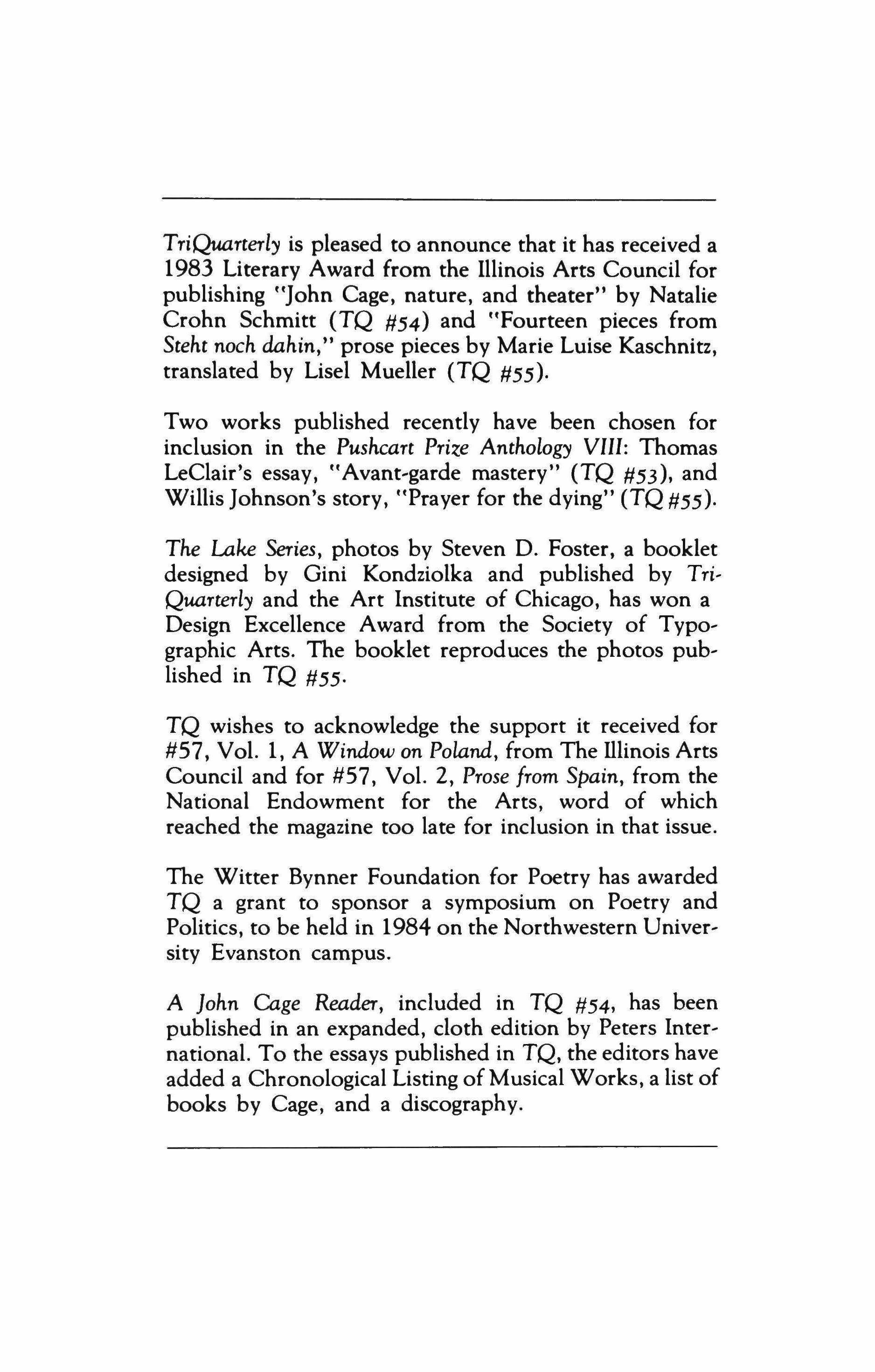
TriQuarterly is pleased to announce that it has received a 1983 Literary Award from the Illinois Arts Council for publishing "John Cage, nature, and theater" by Natalie Crohn Schmitt (TQ #54) and "Fourteen pieces from Steht noch dahin," prose pieces by Marie Luise Kaschnitz, translated by Lisel Mueller (TQ #55).
Two works published recently have been chosen for inclusion in the Pushcart Prize Anthology VIII: Thomas LeClair's essay, "Avant-garde mastery" (TQ #53), and Willis Johnson's story, "Prayer for the dying" (TQ #55).
The Lake Series, photos by Steven D. Foster, a booklet designed by Gini Kondziolka and published by TriQuarterly and the Art Institute of Chicago, has won a Design Excellence Award from the Society of Typographic Arts. The booklet reproduces the photos published in TQ #55.
TQ wishes to acknowledge the support it received for #57, Vol. I, A Window on Poland, from The Illinois Arts Council and for #57, Vol. 2, Prose from Spain, from the National Endowment for the Arts, word of which reached the magazine too late for inclusion in that issue.
The Witter Bvnner Foundation for Poetry has awarded TQ a grant to sponsor a symposium on Poetry and Politics, to be held in 1984 on the Northwestern University Evanston campus.
A John Cage Reader, included in TQ #54, has been published in an expanded, cloth edition by Peters International. To the essays published in TQ, the editors have added a Chronological Listing of Musical Works, a list of books by Cage, and a discography.

1915-1983

Reviews: The Witness of Poetry, Czeslaw Milosz; Resuming Green, Roland Flint; Letters from a Father and Other Poems, Mona Van Duyn; Selected Poems 1940-1982, Norman Nicholson; The Levant
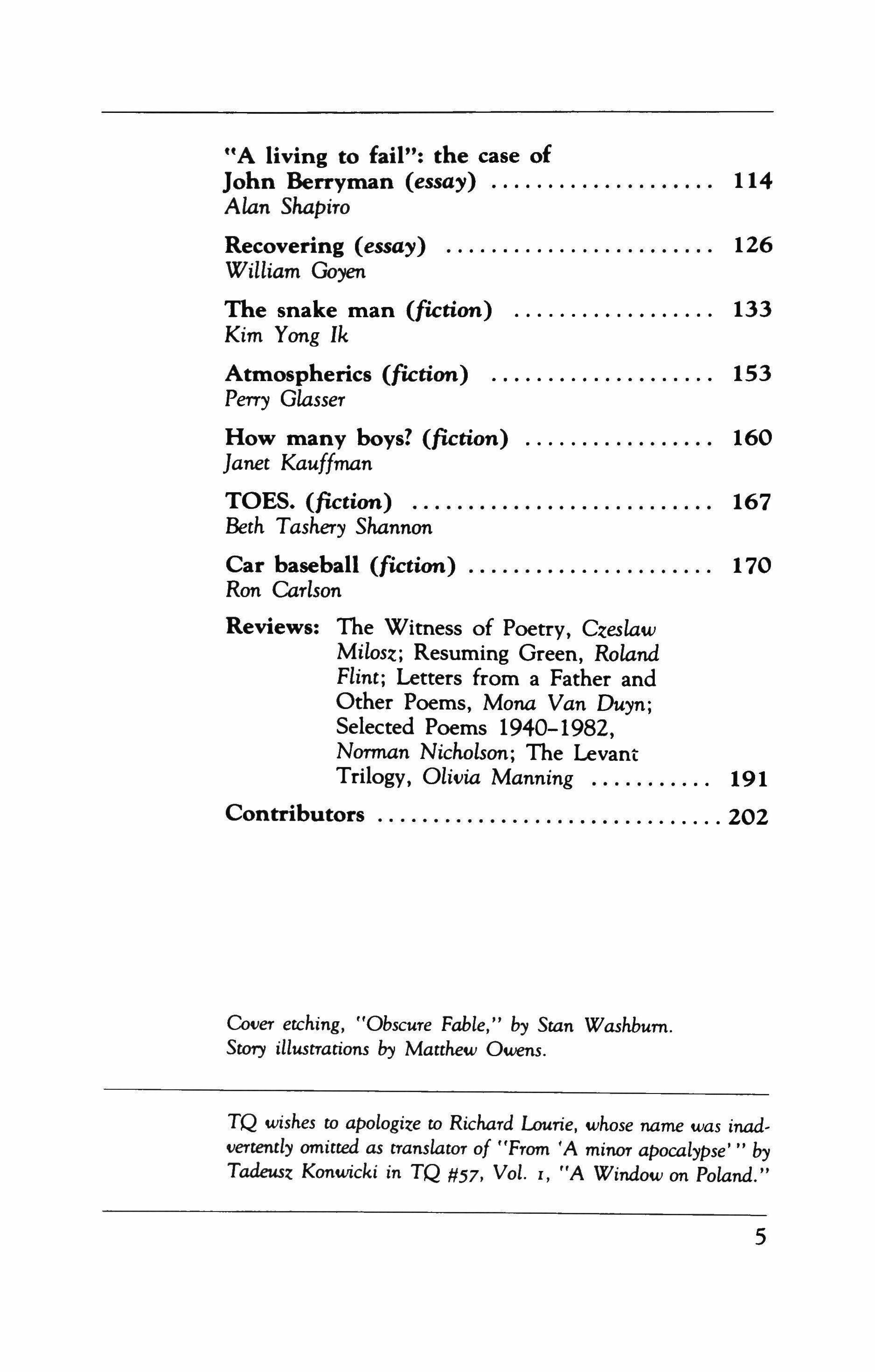
Cover etching, "Obscure Fable," by Stan Washburn. Story illustrations by Matthew Owens.
TQ wishes to apologize to Richard Lourie, whose name was inadvertently omitted as translator of "From 'A minor apocalypse' by Tadeusz Konwicki in TQ #57, Vol. I, "A Window on Poland."
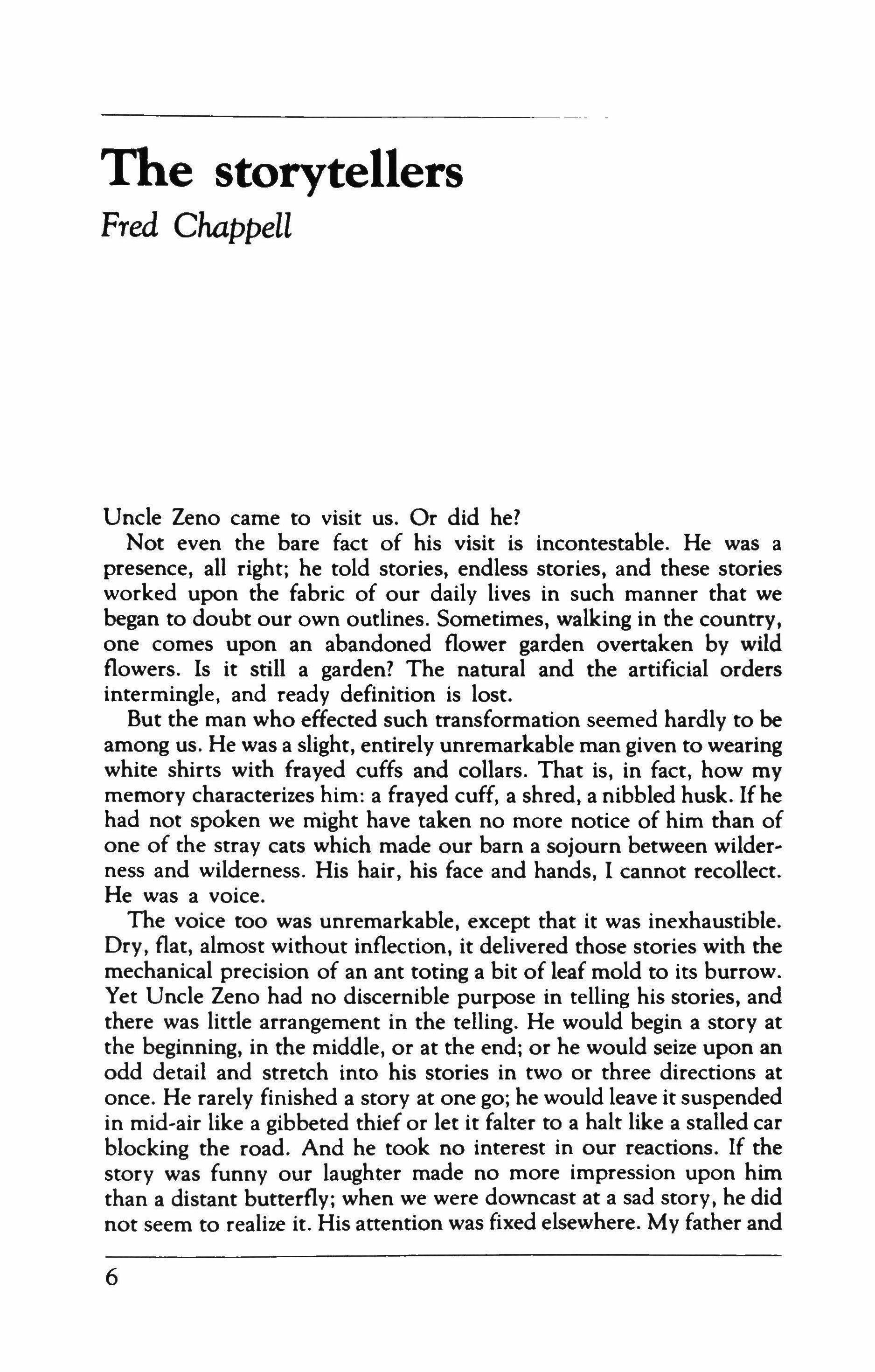
Uncle Zeno came to visit us. Or did he?
Not even the bare fact of his visit is incontestable. He was a presence, all right; he told stories, endless stories, and these stories worked upon the fabric of our daily lives in such manner that we began to doubt our own outlines. Sometimes, walking in the country, one comes upon an abandoned flower garden overtaken by wild flowers. Is it still a garden? The natural and the artificial orders intermingle, and ready definition is lost.
But the man who effected such transformation seemed hardly to be among us. He was a slight, entirely unremarkable man given to wearing white shirts with frayed cuffs and collars. That is, in fact, how my memory characterizes him: a frayed cuff, a shred, a nibbled husk. Ifhe had not spoken we might have taken no more notice of him than of one of the stray cats which made our barn a sojourn between wilderness and wilderness. His hair, his face and hands, I cannot recollect. He was a voice.
The voice too was unremarkable, except that it was inexhaustible. Dry, flat, almost without inflection, it delivered those stories with the mechanical precision of an ant toting a bit of leaf mold to its burrow. Yet Uncle Zeno had no discernible purpose in telling his stories, and there was little arrangement in the telling. He would begin a story at the beginning, in the middle, or at the end; or he would seize upon an odd detail and stretch into his stories in two or three directions at once. He rarely finished a story at one go; he would leave it suspended in mid-air like a gibbeted thief or let it falter to a halt like a stalled car blocking the road. And he took no interest in our reactions. If the story was funny our laughter made no more impression upon him than a distant butterfly; when we were downcast at a sad story, he did not seem to realize it. His attention was fixed elsewhere. My father and
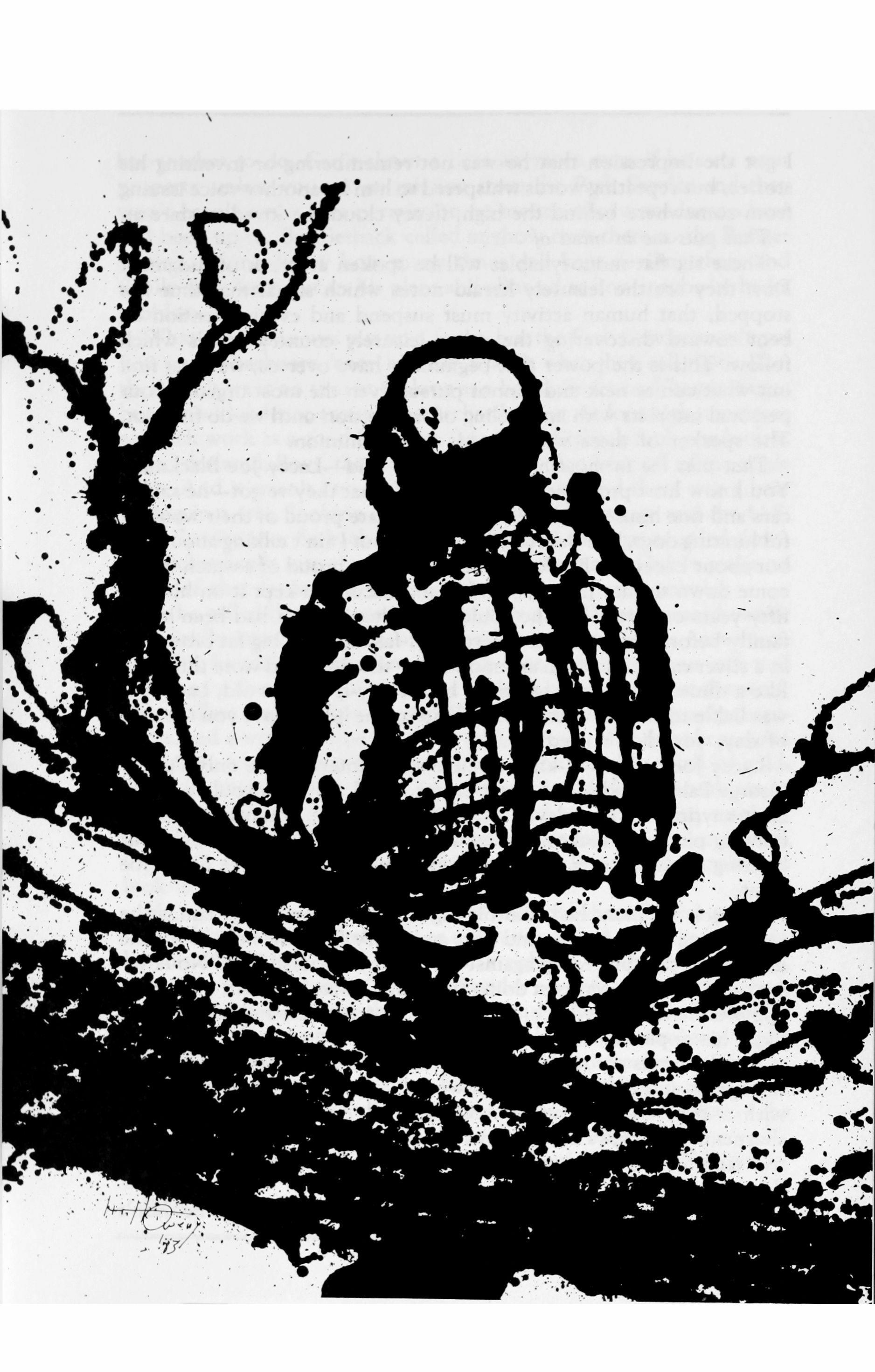
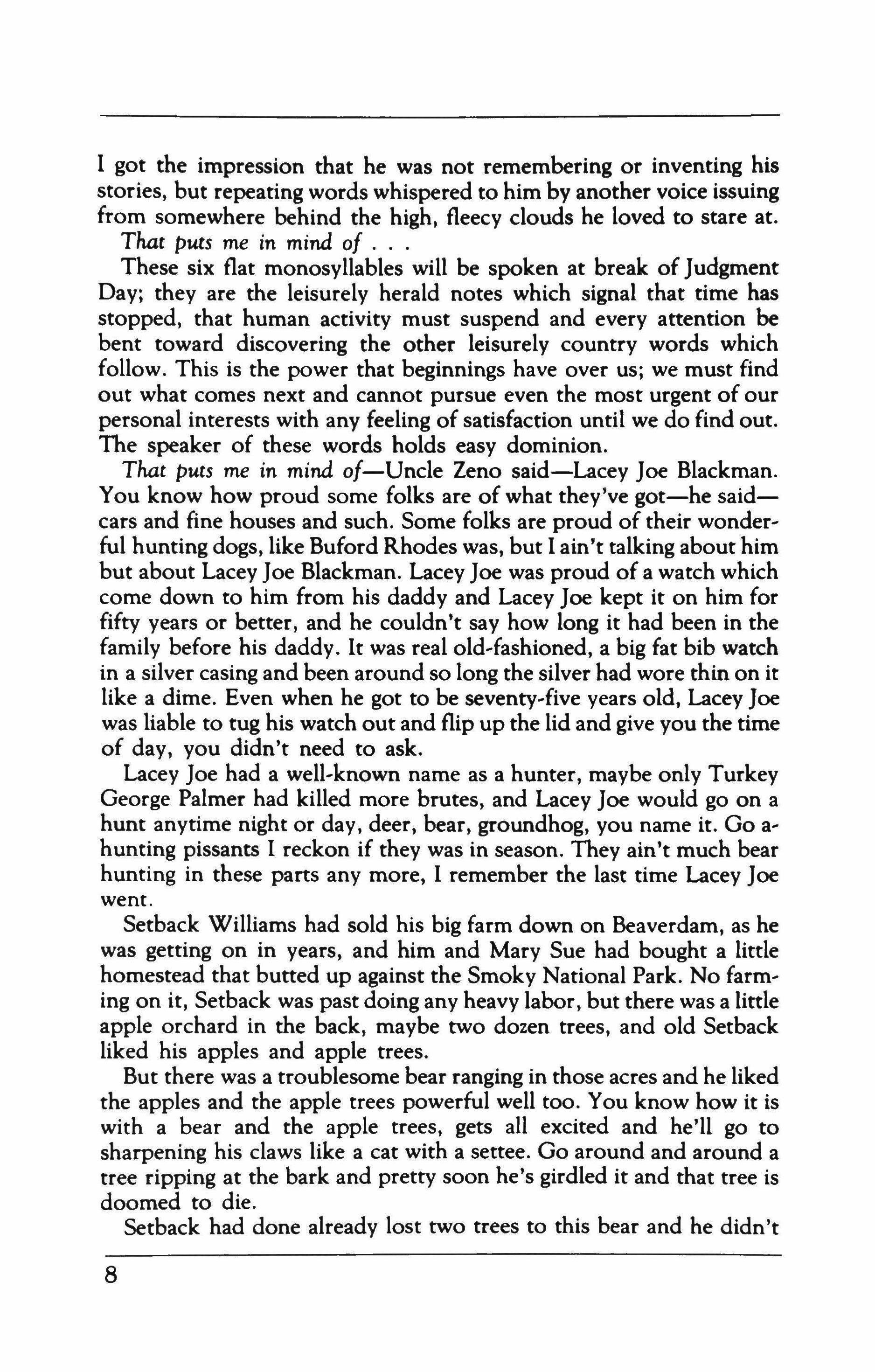
I got the impression that he was not remembering or inventing his stories, but repeating words whispered to him by another voice issuing from somewhere behind the high, fleecy clouds he loved to stare at.
That puts me in mind of
These six flat monosyllables will be spoken at break of Judgment Day; they are the leisurely herald notes which signal that time has stopped, that human activity must suspend and every attention be bent toward discovering the other leisurely country words which follow. This is the power that beginnings have over us; we must find out what comes next and cannot pursue even the most urgent of our personal interests with any feeling of satisfaction until we do find out. The speaker of these words holds easy dominion.
That puts me in mind of-Uncle Zeno said-Lacey Joe Blackman. You know how proud some folks are of what they've got-he saidcars and fine houses and such. Some folks are proud of their wonderful hunting dogs, like Buford Rhodes was, but I ain't talking about him but about Lacey Joe Blackman. Lacey Joe was proud of a watch which come down to him from his daddy and Lacey Joe kept it on him for fifty years or better, and he couldn't say how long it had been in the family before his daddy. It was real old-fashioned, a big fat bib watch in a silver casing and been around so long the silver had wore thin on it like a dime. Even when he got to be seventy-five years old, Lacey Joe was liable to tug his watch out and flip up the lid and give you the time of day, you didn't need to ask.
Lacey Joe had a well-known name as a hunter, maybe only Turkey George Palmer had killed more brutes, and Lacey Joe would go on a hunt anytime night or day, deer, bear, groundhog, you name it. Go ahunting pissants I reckon if they was in season. They ain't much bear hunting in these parts any more, I remember the last time Lacey Joe went.
Setback Williams had sold his big farm down on Beaverdam, as he was getting on in years, and him and Mary Sue had bought a little homestead that butted up against the Smoky National Park. No farming on it, Setback was past doing any heavy labor, but there was a little apple orchard in the back, maybe two dozen trees, and old Setback liked his apples and apple trees.
But there was a troublesome bear ranging in those acres and he liked the apples and the apple trees powerful well too. You know how it is with a bear and the apple trees, gets all excited and he'll go to sharpening his claws like a cat with a settee. Go around and around a tree ripping at the bark and pretty soon he's girdled it and that tree is doomed to die.
Setback had done already lost two trees to this bear and he didn't
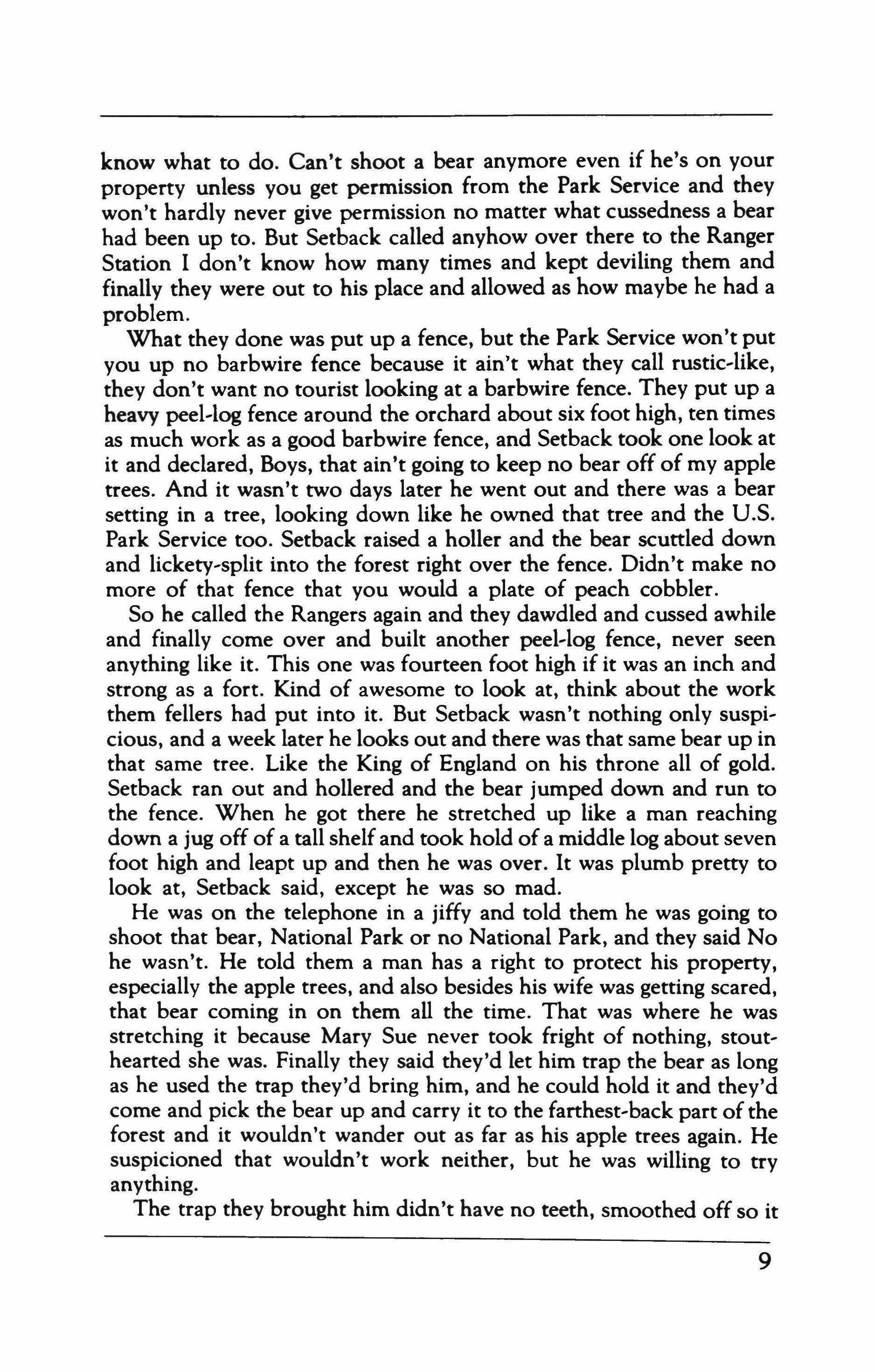
know what to do. Can't shoot a bear anymore even if he's on your property unless you get permission from the Park Service and they won't hardly never give permission no matter what cussedness a bear had been up to. But Setback called anyhow over there to the Ranger Station I don't know how many times and kept deviling them and finally they were out to his place and allowed as how maybe he had a problem.
What they done was put up a fence, but the Park Service won't put you up no barbwire fence because it ain't what they call rustic-like, they don't want no tourist looking at a barbwire fence. They put up a heavy peel-log fence around the orchard about six foot high, ten times as much work as a good barbwire fence, and Setback took one look at it and declared, Boys, that ain't going to keep no bear off of my apple trees. And it wasn't two days later he went out and there was a bear setting in a tree, looking down like he owned that tree and the U.S. Park Service too. Setback raised a holler and the bear scuttled down and licketv-split into the forest right over the fence. Didn't make no more of that fence that you would a plate of peach cobbler.
So he called the Rangers again and they dawdled and cussed awhile and finally come over and built another peel-log fence, never seen anything like it. This one was fourteen foot high if it was an inch and strong as a fort. Kind of awesome to look at, think about the work them fellers had put into it. But Setback wasn't nothing only suspicious, and a week later he looks out and there was that same bear up in that same tree. Like the King of England on his throne all of gold. Setback ran out and hollered and the bear jumped down and run to the fence. When he got there he stretched up like a man reaching down a jug off of a tall shelf and took hold of a middle log about seven foot high and leapt up and then he was over. It was plumb pretty to look at, Setback said, except he was so mad.
He was on the telephone in a jiffy and told them he was going to shoot that bear, National Park or no National Park, and they said No he wasn't. He told them a man has a right to protect his property, especially the apple trees, and also besides his wife was getting scared, that bear coming in on them all the time. That was where he was stretching it because Mary Sue never took fright of nothing, stout, hearted she was. Finally they said they'd let him trap the bear as long as he used the trap they'd bring him, and he could hold it and they'd come and pick the bear up and carry it to the farthest-back part ofthe forest and it wouldn't wander out as far as his apple trees again. He suspicioned that wouldn't work neither, but he was willing to try anything.
The trap they brought him didn't have no teeth, smoothed off so it
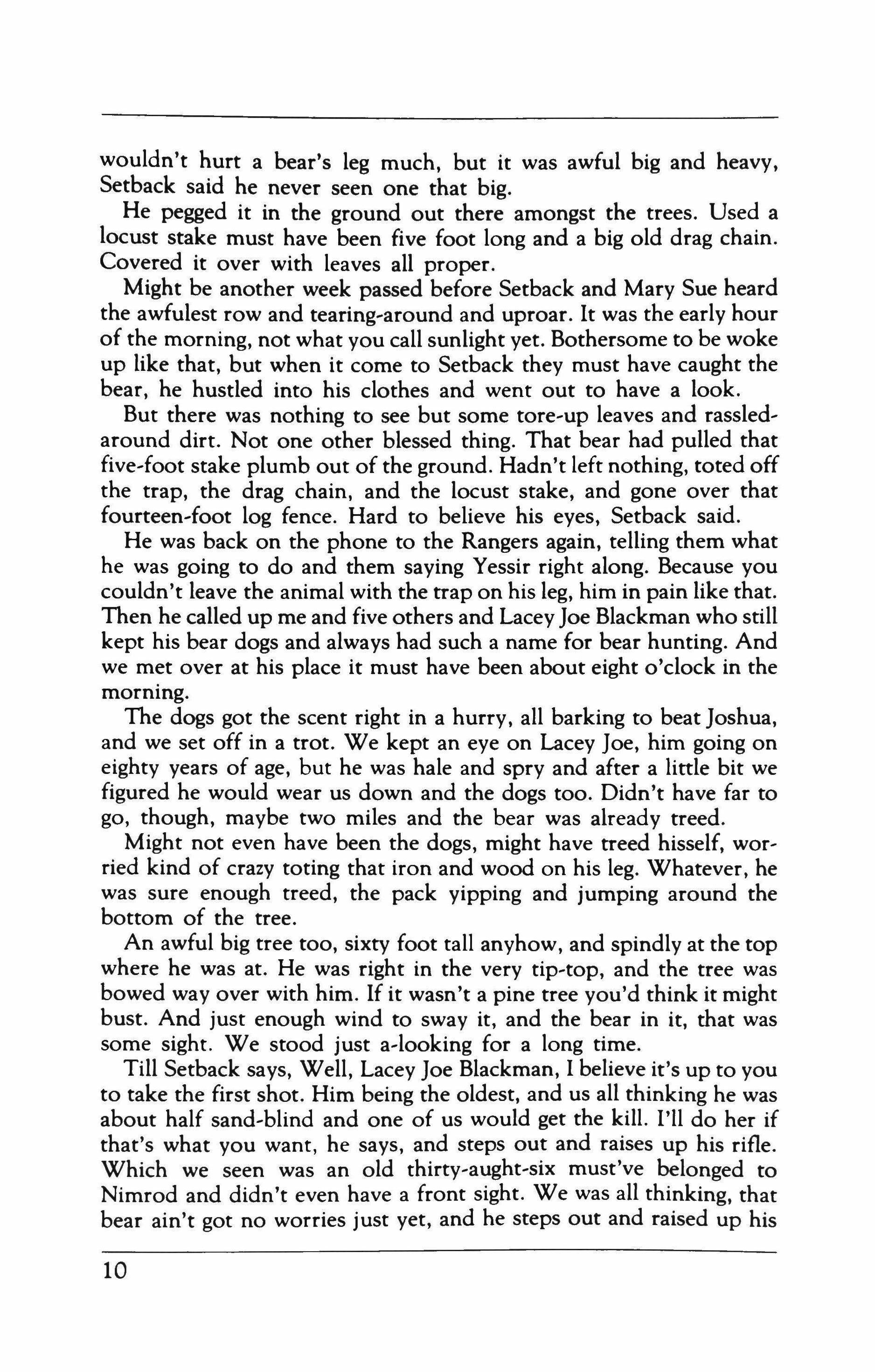
wouldn't hurt a bear's leg much, but it was awful big and heavy, Setback said he never seen one that big.
He pegged it in the ground out there amongst the trees. Used a locust stake must have been five foot long and a big old drag chain. Covered it over with leaves all proper.
Might be another week passed before Setback and Mary Sue heard the awfulest row and tearing-around and uproar. It was the early hour of the morning, not what you call sunlight yet. Bothersome to be woke up like that, but when it come to Setback they must have caught the bear, he hustled into his clothes and went out to have a look.
But there was nothing to see but some tore-up leaves and rassledaround dirt. Not one other blessed thing. That bear had pulled that five-foot stake plumb out of the ground. Hadn't left nothing, toted off the trap, the drag chain, and the locust stake, and gone over that fourteen-foot log fence. Hard to believe his eyes, Setback said.
He was back on the phone to the Rangers again, telling them what he was going to do and them saying Yessir right along. Because you couldn't leave the animal with the trap on his leg, him in pain like that. Then he called up me and five others and Lacey Joe Blackman who still kept his bear dogs and always had such a name for bear hunting. And we met over at his place it must have been about eight o'clock in the morning.
The dogs got the scent right in a hurry, all barking to beat Joshua, and we set off in a trot. We kept an eye on Lacey Joe, him going on eighty years of age, but he was hale and spry and after a little bit we figured he would wear us down and the dogs too. Didn't have far to go, though, maybe two miles and the bear was already treed. Might not even have been the dogs, might have treed hisself, worried kind of crazy toting that iron and wood on his leg. Whatever, he was sure enough treed, the pack yipping and jumping around the bottom of the tree.
An awful big tree too, sixty foot tall anyhow, and spindly at the top where he was at. He was right in the very tip-top, and the tree was bowed way over with him. If it wasn't a pine tree you'd think it might bust. And just enough wind to sway it, and the bear in it, that was some sight. We stood just a-looking for a long time.
Till Setback says, Well, Lacey Joe Blackman, I believe it's up to you to take the first shot. Him being the oldest, and us all thinking he was about half sand-blind and one of us would get the kill. I'll do her if that's what you want, he says, and steps out and raises up his rifle. Which we seen was an old thirty-aught-six must've belonged to Nimrod and didn't even have a front sight. We was all thinking, that bear ain't got no worries just yet, and he steps out and raised up his

rifle and didn't take no aim and killed that bear stone dead. Bullet we found out later went in right between the eyes.
The bear dropped plummet. Down about thirty foot and then jerked up again. That locust stake he'd been dragging got caught crossways in the fork of a big old limb and held him up there. The tree was bending way over. And the bear hung up like that went back and forth like a pend'lum on a grandfather clock. Back and forth, and back and forth. It was a sight made us all stand there quiet as pallbearers.
And so Lacey Joe Blackman, he pulls that silver-case watch of his out and opens it up. He squints at that bear swinging back and forth and he looks down at his watch, up at the bear, down at his watch. And he says, Boys, if this-here old watch of mine is still keeping right, that bear is swinging just a mite slow
"Just a mite slow?" My father frowned. "I don't get it. A bear is not hanging in a tree to be keeping time. What does he mean, a mite slow?"
But that was the end of the story, and the end too of Uncle Zeno's talk. He only told stories, he didn't answer questions. The voice he listened to, the voice beyond the world, gave him only stories to re-
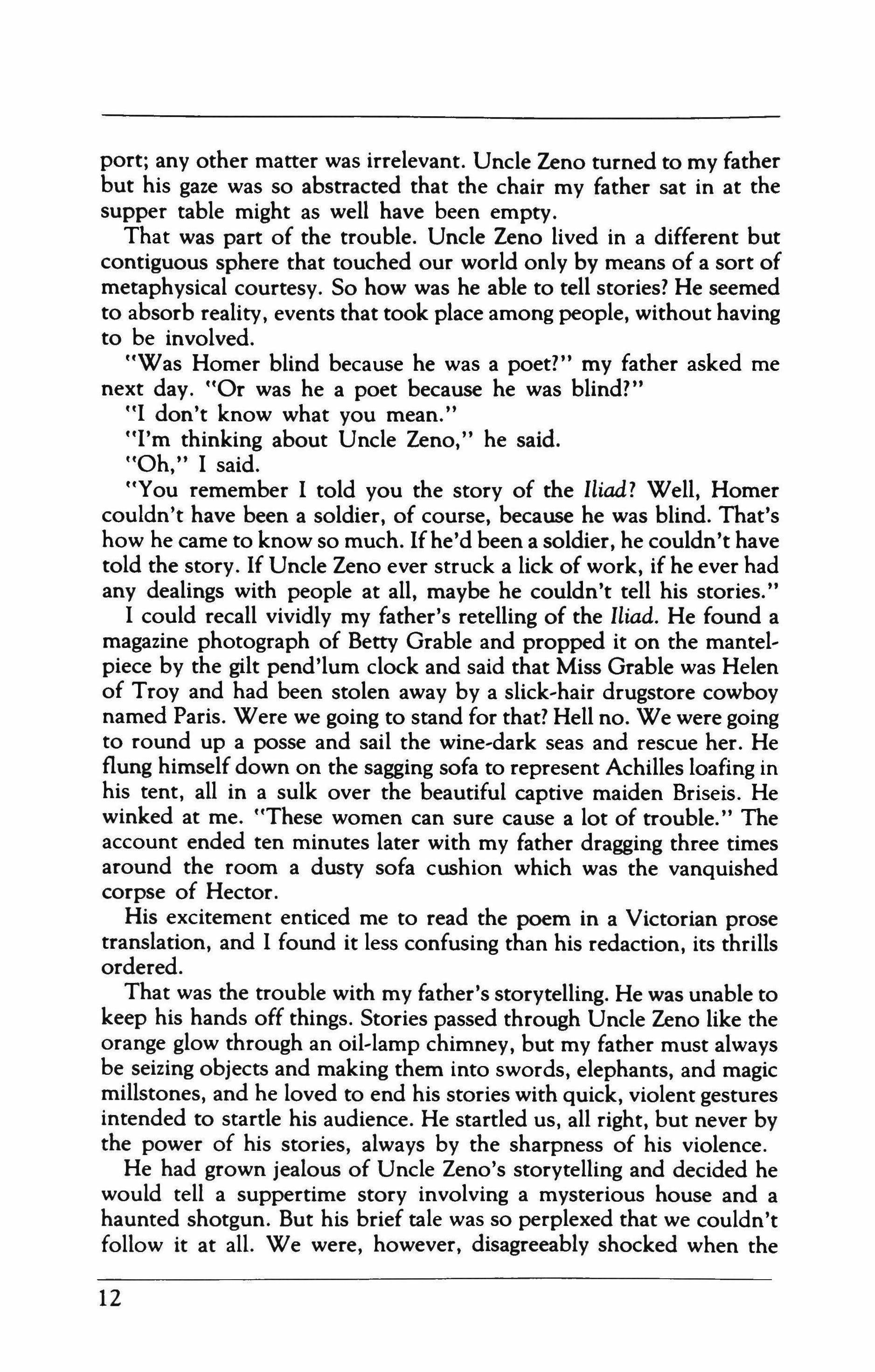
port; any other matter was irrelevant. Uncle Zeno turned to my father but his gaze was so abstracted that the chair my father sat in at the supper table might as well have been empty.
That was part of the trouble. Uncle Zeno lived in a different but contiguous sphere that touched our world only by means of a sort of metaphysical courtesy. So how was he able to tell stories? He seemed to absorb reality, events that took place among people, without having to be involved.
"Was Homer blind because he was a poet?" my father asked me next day. "Or was he a poet because he was blind?"
"I don't know what you mean."
"I'm thinking about Uncle Zeno," he said.
"Oh," I said.
"You remember I told you the story of the Iliad? Well, Homer couldn't have been a soldier, of course, because he was blind. That's how he came to know so much. Ifhe'd been a soldier, he couldn't have told the story. If Uncle Zeno ever struck a lick of work, if he ever had any dealings with people at all, maybe he couldn't tell his stories."
I could recall vividly my father's retelling of the Iliad. He found a magazine photograph of Betty Grable and propped it on the mantel, piece by the gilt pend'lum clock and said that Miss Grable was Helen of Troy and had been stolen away by a slick-hair drugstore cowboy named Paris. Were we going to stand for that? Hell no. We were going to round up a posse and sail the wine-dark seas and rescue her. He flung himself down on the sagging sofa to represent Achilles loafing in his tent, all in a sulk over the beautiful captive maiden Briseis. He winked at me. "These women can sure cause a lot of trouble." The account ended ten minutes later with my father dragging three times around the room a dusty sofa cushion which was the vanquished corpse of Hector.
His excitement enticed me to read the poem in a Victorian prose translation, and I found it less confusing than his redaction, its thrills ordered.
That was the trouble with my father's storytelling. He was unable to keep his hands off things. Stories passed through Uncle Zeno like the orange glow through an oil,lamp chimney, but my father must always be seizing objects and making them into swords, elephants, and magic millstones, and he loved to end his stories with quick, violent gestures intended to startle his audience. He startled us, all right, but never by the power of his stories, always by the sharpness of his violence.
He had grown jealous of Uncle Zeno's storytelling and decided he would tell a suppertime story involving a mysterious house and a haunted shotgun. But his brief tale was so perplexed that we couldn't follow it at all. We were, however, disagreeably shocked when the

haunted shotgun fired because he illustrated this detonation with a swift blow of his fist on the edge of the table which caused the insert prongs of the inner leaf to break, catapulting a bowl of butter beans onto my father's shirtfront.
My mother and grandmother and I stared at him in consternation as he mumbled and began plucking beans from his lap, but Uncle Zeno, sitting directly across the table, took no notice, gazing past my father's downcast confusion into his portable Outer Space. "That puts me in mind of he began, and proceeded to tell of a haunted house ofhis knowledge, atop which the weather vane pointed crosswise to the wind, in which fires flamed up without human agency in the fireplaces, and the cellar resounded with a singing chorus of lost children. We turned with grateful relief from my father's predicament and were soon enrapt by Uncle Zeno's monotone narrative, which now began to include sealed doors that sweated blood, a bathtub that filled up with copperhead snakes from the faucet, a vanity mirror that gave back the images of the dead, a piano whose keys turned into fangs whenever "Roses of Picardy" was attempted. My father too became enthralled and sat motionless among his butter beans until Uncle Zeno concluded. His ending, if that is the correct term, was, "Anvhow=-"
That jerked my father awake. "Anyhow?" he cried. "What kind of climax is that? Did this Willie Hammer ever find the forbidden treasure or didn't he?"
But Uncle Zeno was not to speak again until possessed by another story, and he merely looked at my father with an expression of vacant serenity. My father gave up in disgust and began again to drop his lapful of beans into the bowl one at a time, plunk plunk plunk. His jealousy grew. He was going to learn to tell stories that would shade Uncle Zeno's the way a mountain overtowers a hill of potatoes. He ransacked his memory, and he begged stories from the loafers down at Virgil Campbell's grocery store, and he began to delve into the volumes of fairy tales and folklore scattered about the house. He borrowed my book of Norse mythology and committed a good halfof it to memory. All to no avail. My father was simply too entranced with mischief and effect, and the stories he managed to begin in leisurely fashion soon careered into wild gesticulation and ended with an unpleasant loud noise. "Wham!" he would shout. "I've gotcha!"
But he didn't have us, not in the way he wanted to, and he looked into our startled faces with an expression of expectancy quickly sagging to disappointment. "Well, maybe I left out some stuff," he would say, "but it's still a damn good story. Better than some I've heard lately."
Uncle Zeno said: That puts me in mind of Buford Rhodes and his coonhounds. Buford was a good old boy anyway you want and kind of

crazy about raising coonhounds and was an awful smart hand at it. Lived out there in Sudie's Cove in a tin-roof shack with his wife and six younguns and must have been a good dozen dogs. All kinds of dogs, Walkers and Blue Ticks and Redbones and lots of old hounds with the breeding mixed in like juices in soup. One of them named Raymond, you couldn't never figure out, must have been a cross between a bloodhound and a Shetland pony. Kids rode that dog all day like a pony, he was that good-natured.
But it was the dog called Elmer that Buford was most proudest of, though Elmer wasn't much bred either, just an old sooner dog. Still he was the brightest dog anybody ever heard tell of. Buford was selling his hides to Sears and Roebuck for a dollar apiece. He'd catch them coons by the score and skin them and tack their hides up to cure. Got so after a while there wasn't a inch of wall on Buford's house or milkshed not covered with coon hides. So Buford always kept an eye out for old scrap lumber and kept piling it underneath his house to cure them hides on.
That was where Elmer's smartness come in. That dog Elmer was so smart that if Buford showed him a piece ofoak board or a joint of pine siding, he'd take off and tree a coon which when the hide was skinned off and stretched would exactly fill out that length of wood. That was what made him so smart and valuable and caused Buford to think the world of him, rather have Elmer than the jewels of Sheba and the wisdom of Solomon.
But then they got into trouble one Tuesday about the middle of September. Elmer happened to wander inside the house while Buford was off somewhere and his wife had left the door open by mistake. Buford wouldn't never of let him in, ruins a good dog to lay around in a dwelling house. But Elmer wandered in this time and seen Buford's wife there ironing the laundry. He took one look at that ironing board and just lit out down the road as fast as he could go and heading west as far as you could point. Buford said later on he didn't know whether Elmer already had a coon that big somewhere he knew about or it just sparked his ambitions.
Whatever, Elmer had set hisself a journey and when Buford got home and heard what happened he took offafter him. Dog like Elmer, that smart, can't afford to lose a dog like that. So Buford was traveling west now, trying to track him down, asking questions of anybody he came to, and for a long time he could tell where he'd been. Folks will remember a dog that's got something on its mind. But then the houses got scarcer and not many people to ask, and Buford was getting worried-
My father nodded sagely. "And I'll bet you're not going to tell us
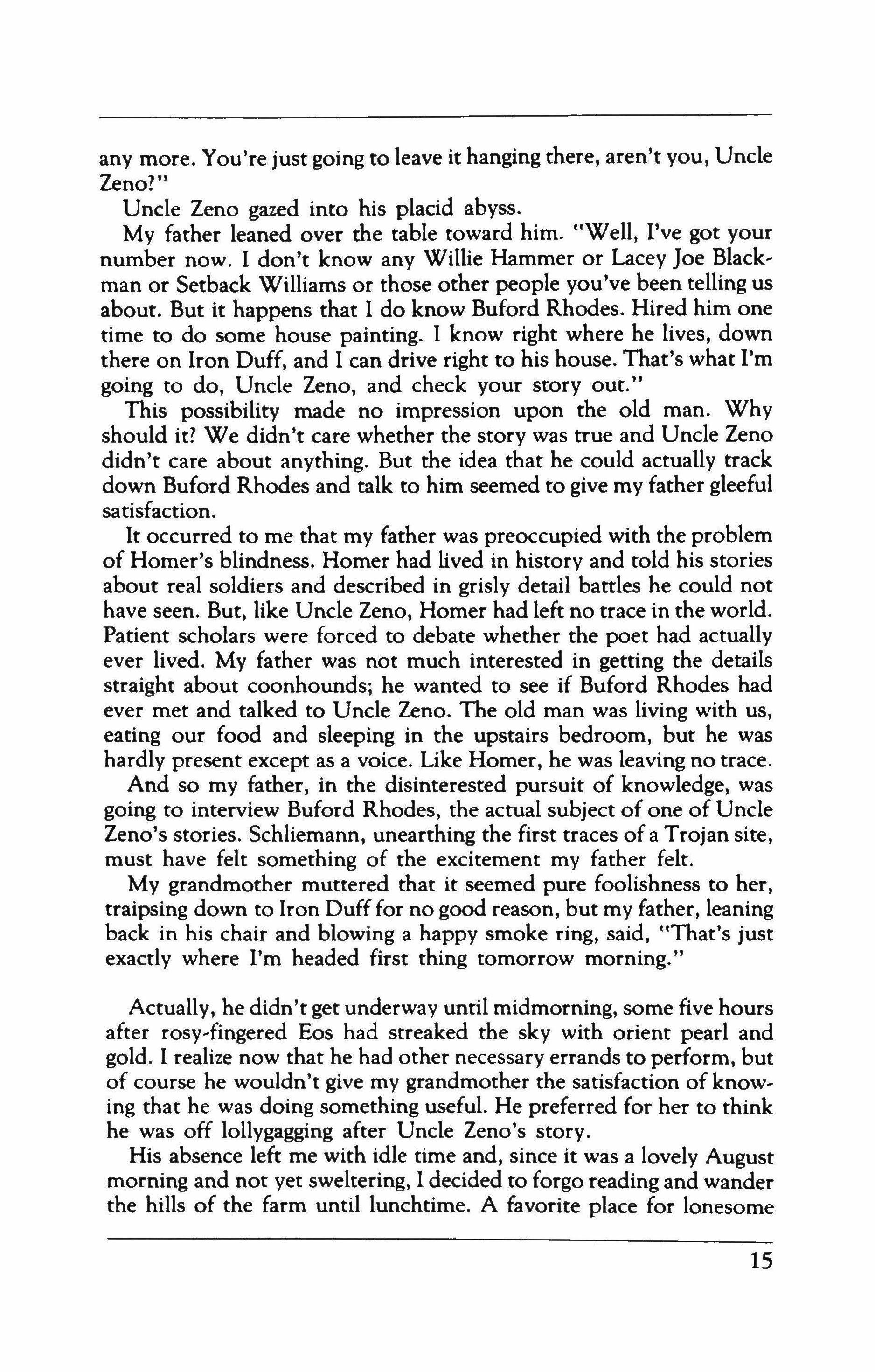
any more. You're just going to leave it hanging there, aren't you, Uncle Zeno?"
Uncle Zeno gazed into his placid abyss.
My father leaned over the table toward him. "Well, I've got your number now. I don't know any Willie Hammer or Lacey Joe Blackman or Setback Williams or those other people you've been telling us about. But it happens that I do know Buford Rhodes. Hired him one time to do some house painting. I know right where he lives, down there on Iron Duff, and I can drive right to his house. That's what I'm going to do, Uncle Zeno, and check your story out."
This possibility made no impression upon the old man. Why should it? We didn't care whether the story was true and Uncle Zeno didn't care about anything. But the idea that he could actually track down Buford Rhodes and talk to him seemed to give my father gleeful satisfaction.
It occurred to me that my father was preoccupied with the problem of Homer's blindness. Homer had lived in history and told his stories about real soldiers and described in grisly detail battles he could not have seen. But, like Uncle Zeno, Homer had left no trace in the world. Patient scholars were forced to debate whether the poet had actually ever lived. My father was not much interested in getting the details straight about coonhounds; he wanted to see if Buford Rhodes had ever met and talked to Uncle Zeno. The old man was living with us, eating our food and sleeping in the upstairs bedroom, but he was hardly present except as a voice. Like Homer, he was leaving no trace.
And so my father, in the disinterested pursuit of knowledge, was going to interview Buford Rhodes, the actual subject of one of Uncle Zeno's stories. Schliemann, unearthing the first traces of a Trojan site, must have felt something of the excitement my father felt.
My grandmother muttered that it seemed pure foolishness to her, traipsing down to Iron Duff for no good reason, but my father, leaning back in his chair and blowing a happy smoke ring, said, "That's just exactly where I'm headed first thing tomorrow morning."
Actually, he didn't get underway until midmorning, some five hours after rosy-fingered Eos had streaked the sky with orient pearl and gold. I realize now that he had other necessary errands to perform, but of course he wouldn't give my grandmother the satisfaction of knowing that he was doing something useful. He preferred for her to think he was off lollygagging after Uncle Zeno's story.
His absence left me with idle time and, since it was a lovely August morning and not yet sweltering, I decided to forgo reading and wander the hills of the farm until lunchtime. A favorite place for lonesome
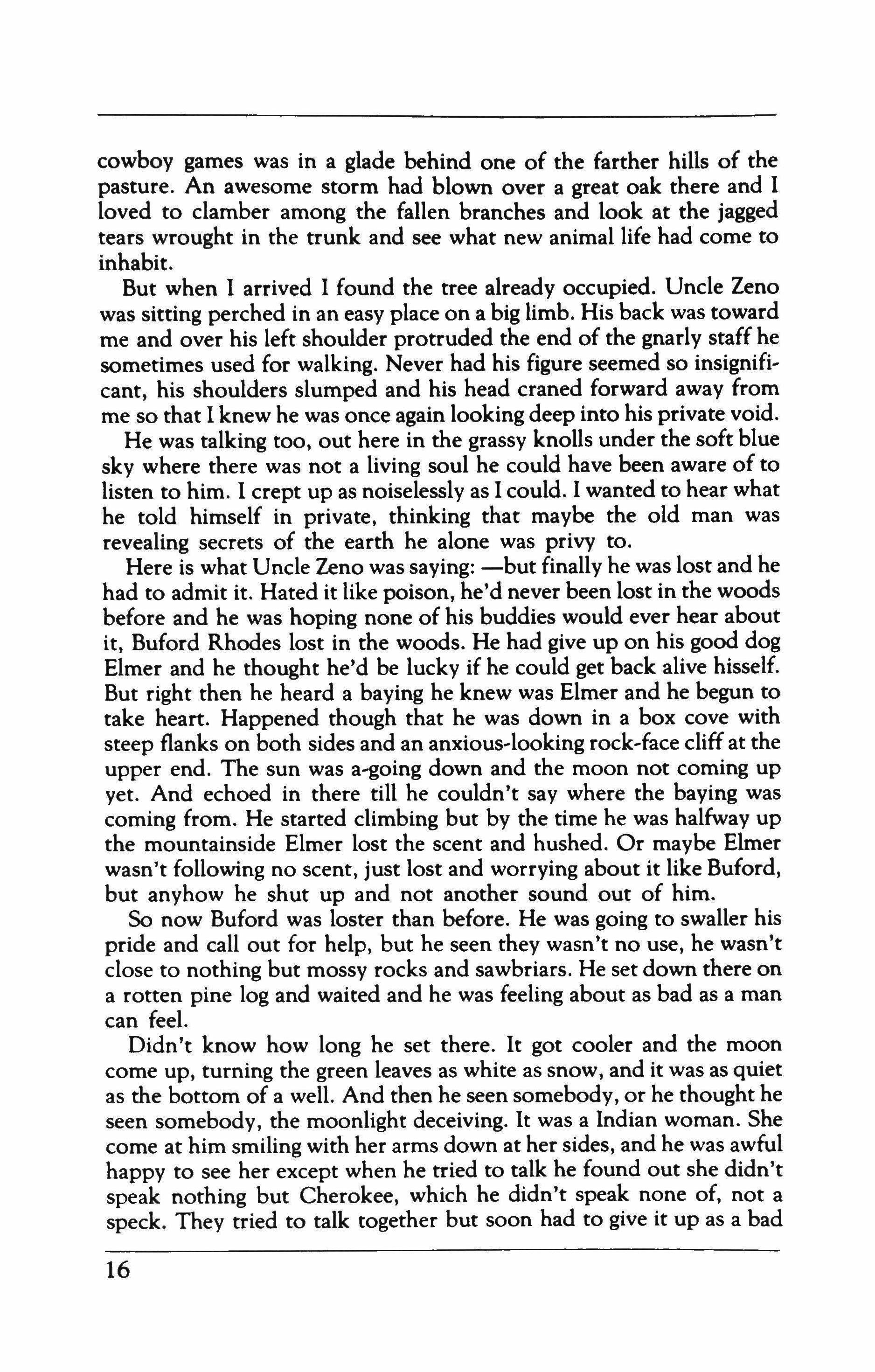
cowboy games was in a glade behind one of the farther hills of the pasture. An awesome storm had blown over a great oak there and I loved to clamber among the fallen branches and look at the jagged tears wrought in the trunk and see what new animal life had come to inhabit.
But when I arrived I found the tree already occupied. Uncle Zeno was sitting perched in an easy place on a big limb. His back was toward me and over his left shoulder protruded the end of the gnarly staff he sometimes used for walking. Never had his figure seemed so insignificant, his shoulders slumped and his head craned forward away from me so that I knew he was once again looking deep into his private void.
He was talking too, out here in the grassy knolls under the soft blue sky where there was not a living soul he could have been aware of to listen to him. I crept up as noiselessly as I could. I wanted to hear what he told himself in private, thinking that maybe the old man was revealing secrets of the earth he alone was privy to.
Here is what Uncle Zeno was saying: -but finally he was lost and he had to admit it. Hated it like poison, he'd never been lost in the woods before and he was hoping none of his buddies would ever hear about it, Buford Rhodes lost in the woods. He had give up on his good dog Elmer and he thought he'd be lucky if he could get back alive hisself. But right then he heard a baying he knew was Elmer and he begun to take heart. Happened though that he was down in a box cove with steep flanks on both sides and an anxious-looking rock-face cliff at the upper end. The sun was a-going down and the moon not coming up yet. And echoed in there till he couldn't say where the baying was coming from. He started climbing but by the time he was halfway up the mountainside Elmer lost the scent and hushed. Or maybe Elmer wasn't following no scent, just lost and worrying about it like Buford, but anyhow he shut up and not another sound out of him.
So now Buford was loster than before. He was going to swaller his pride and call out for help, but he seen they wasn't no use, he wasn't close to nothing but mossy rocks and sawbriars. He set down there on a rotten pine log and waited and he was feeling about as bad as a man can feel.
Didn't know how long he set there. It got cooler and the moon come up, turning the green leaves as white as snow, and it was as quiet as the bottom of a well. And then he seen somebody, or he thought he seen somebody, the moonlight deceiving. It was a Indian woman. She come at him smiling with her arms down at her sides, and he was awful happy to see her except when he tried to talk he found out she didn't speak nothing but Cherokee, which he didn't speak none of, not a speck. They tried to talk together but soon had to give it up as a bad
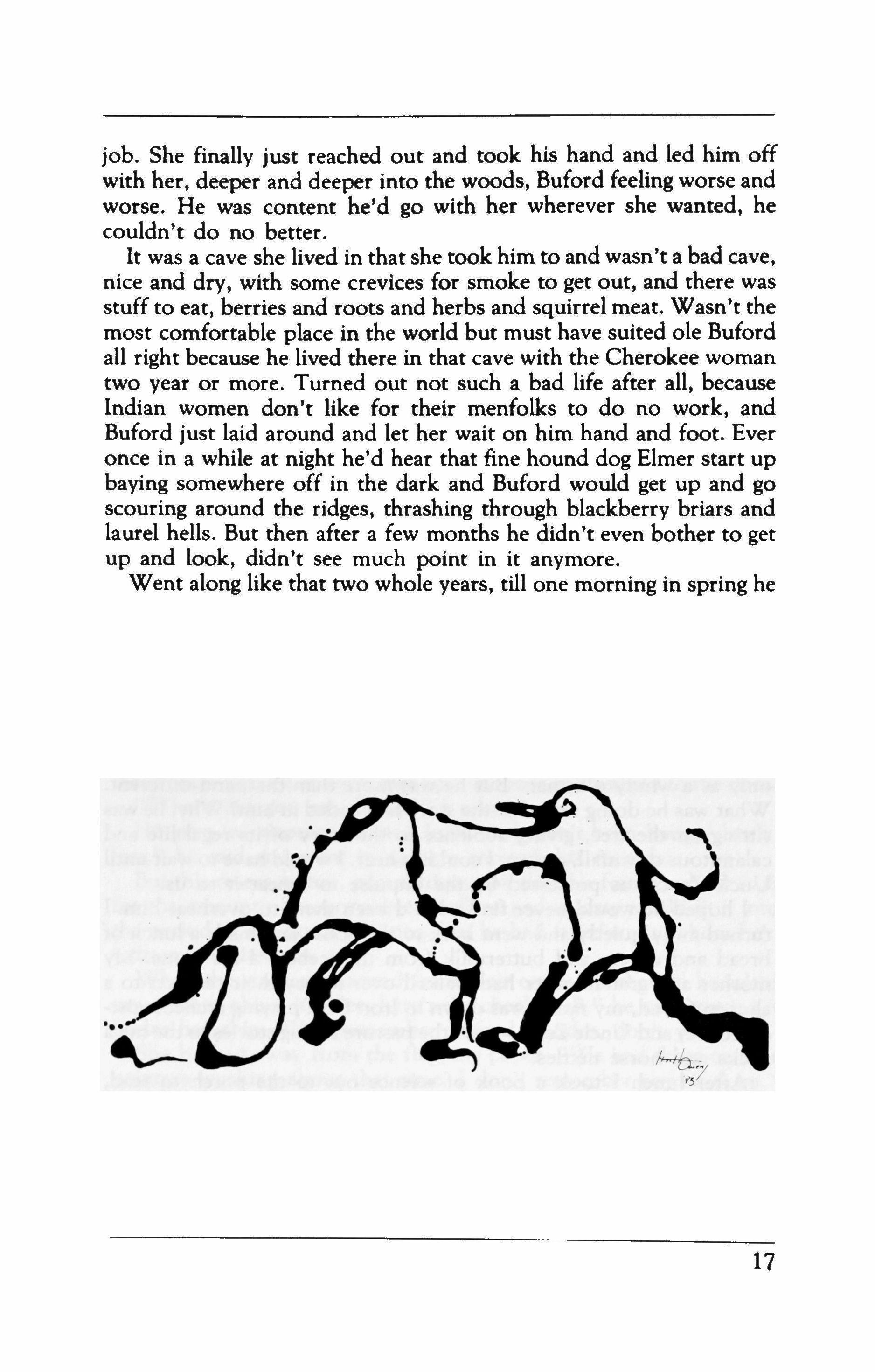
job. She finally just reached out and took his hand and led him off with her, deeper and deeper into the woods, Buford feeling worse and worse. He was content he'd go with her wherever she wanted, he couldn't do no better.
It was a cave she lived in that she took him to and wasn't a bad cave, nice and dry, with some crevices for smoke to get out, and there was stuff to eat, berries and roots and herbs and squirrel meat. Wasn't the most comfortable place in the world but must have suited ole Buford all right because he lived there in that cave with the Cherokee woman two year or more. Turned out not such a bad life after all, because Indian women don't like for their menfolks to do no work, and Buford just laid around and let her wait on him hand and foot. Ever once in a while at night he'd hear that fine hound dog Elmer start up baying somewhere off in the dark and Buford would get up and go scouring around the ridges, thrashing through blackberry briars and laurel hells. But then after a few months he didn't even bother to get up and look, didn't see much point in it anymore.
Went along like that two whole years, till one morning in spring he
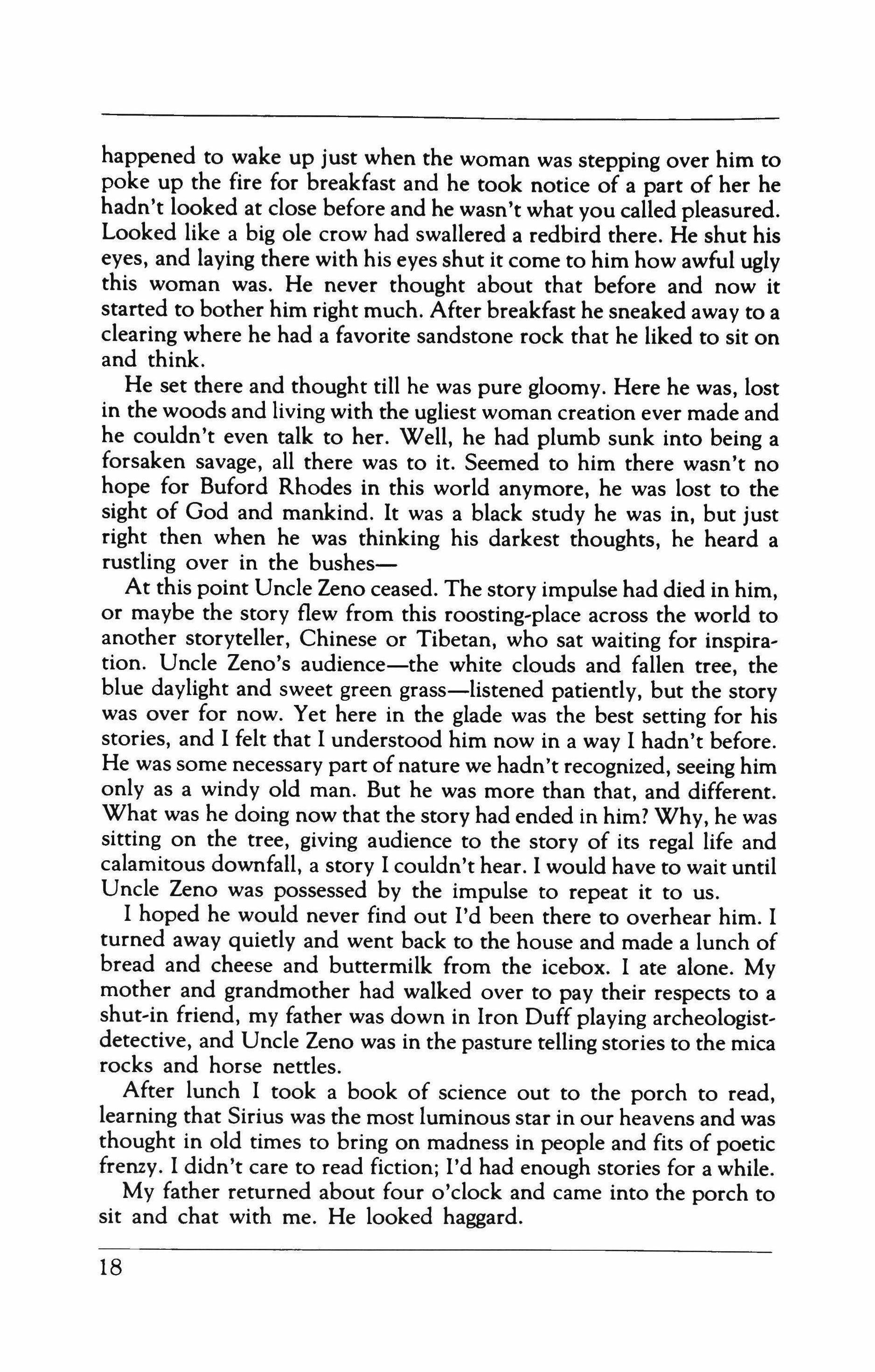
happened to wake up just when the woman was stepping over him to poke up the fire for breakfast and he took notice of a part of her he hadn't looked at close before and he wasn't what you called pleasured. Looked like a big ole crow had swallered a redbird there. He shut his eyes, and laying there with his eyes shut it come to him how awful ugly this woman was. He never thought about that before and now it started to bother him right much. After breakfast he sneaked away to a clearing where he had a favorite sandstone rock that he liked to sit on and think.
He set there and thought till he was pure gloomy. Here he was, lost in the woods and living with the ugliest woman creation ever made and he couldn't even talk to her. Well, he had plumb sunk into being a forsaken savage, all there was to it. Seemed to him there wasn't no hope for Buford Rhodes in this world anymore, he was lost to the sight of God and mankind. It was a black study he was in, but just right then when he was thinking his darkest thoughts, he heard a rustling over in the bushes-
At this point Uncle Zeno ceased. The story impulse had died in him, or maybe the story flew from this roosting-place across the world to another storyteller, Chinese or Tibetan, who sat waiting for inspiration. Uncle Zeno's audience-the white clouds and fallen tree, the blue daylight and sweet green grass-listened patiently, but the story was over for now. Yet here in the glade was the best setting for his stories, and I felt that I understood him now in a way I hadn't before. He was some necessary part of nature we hadn't recognized, seeing him only as a windy old man. But he was more than that, and different. What was he doing now that the story had ended in him? Why, he was sitting on the tree, giving audience to the story of its regal life and calamitous downfall, a story I couldn't hear. I would have to wait until Uncle Zeno was possessed by the impulse to repeat it to us.
I hoped he would never find out I'd been there to overhear him. I turned away quietly and went back to the house and made a lunch of bread and cheese and buttermilk from the icebox. I ate alone. My mother and grandmother had walked over to pay their respects to a shut-in friend, my father was down in Iron Duff playing archeologist, detective, and Uncle Zeno was in the pasture telling stories to the mica rocks and horse nettles.
After lunch I took a book of science out to the porch to read, learning that Sirius was the most luminous star in our heavens and was thought in old times to bring on madness in people and fits of poetic frenzy. I didn't care to read fiction; I'd had enough stories for a while. My father returned about four o'clock and came into the porch to sit and chat with me. He looked haggard.

"What did you find out?" I asked him.
He rubbed the back of his neck and looked at the pine ceiling. His tone was mournful, puzzling. "Nothing," he said.
"Couldn't you find Buford Rhodes?"
"Couldn't find him, couldn't find anyone who knew him, couldn't find the least trace of him."
"Maybe you went to the wrong house. You might have forgot where he lived."
"Drove right to his front door, where he used to live. House was empty and run-down. Windows broken, doors off the hinges. Holes in the roof. Looked like nobody had lived in it for twenty years."
"Did you ask the neighbors?"
"They never heard of him. Walked down to Hipps' grocery, and nobody there ever heard of him either."
"You must have got the wrong place. Somebody would know him."
"I drove down to ask Virgil Campbell. He knows everybody that was ever in the county. At first he thought he sort of did remember a Buford Rhodes, but the more he thought about it the less he could remember.
"Maybe you got the name mixed up," I said. "Maybe the man you hired to paint had a name like that but different."
"I know Buford Rhodes," he said. "Know him anywhere. Uncle Zeno described him to a T." He snapped his fingers. "I'm glad you mentioned that. I recall I paid Buford with a check. I'll have a record in my check stubs. Paid him seventy-seven dollars exactly. Wasn't but three years ago, I'll go look that up." He rose and walked to the door.
"Where did you eat dinner?" I asked.
He gave me another harried look. "I haven't been hungry lately, Jess," he said and went in to pore through his records.
But this research, too, proved disappointing. He found a check stub for the amount of seventy-seven dollars, and its date would fit it into the period of the house painting, but he had failed to list whom he'd written the check to.
When the women returned from their errand of charity, he asked my mother about it. "See, here's the check stub," he said, waving it under her chin. "You remember Buford Rhodes, don't you?"
She backed away from the flapping paper. "We had three or four painters working about that time. I don't remember any of them."
"You'd remember Buford, though. Had the kind ofbeard that gives you a blue face. Always cracking jokes and talking about his hound dogs. Always had a drink or two under his belt no matter what time of day it was."
"That describes every house painter I ever met," she said.

flyou ought to remember him, though. Uncle Zeno has got him down exactly. He was some kind of character."
"All I ever meet are characters," she said. "I don't believe that normal human beings show up in this part of the country."
Exasperated, he flung down the booklet of stubs and stamped on it. "How could anybody not remember Buford Rhodes?" he shouted.
"Calm down," she said. "It's not important."
But it was important to my father, and his shouting indicated the intensity of his feelings. I almost spoke up then. I almost told him that the last I'd heard Buford Rhodes was lost in the forest and living in a cave with an ugly Indian woman. I realized, however, that I'd better not speak; this information would only cause more confusion.
I was assailed by a wild thought and a goosy sensation. What if Buford Rhodes had ceased to exist upon the earth because Uncle Zeno told stories about him? I had entertained odd fancies since overhearing the old man this morning. What if Uncle Zeno's stories so thoroughly absorbed the characters he spoke of that they took leave of the everyday world and just went off to inhabit his narratives? Everything connected with them would disappear, they would leave no more sign among us than a hawk's shadow leaves in the snow he flies above. The only place you could find Achilles these days was in the Iliad. Had he ever existed otherwise? Had any of those heroes left evidence behind?
I cried out, "What about Agamemnon?"
My father gave me a peculiar look. "What about him?"
"Didn't you tell me they found his death mask? Didn't you say it was a mask made out of gold and they put it in a museum?"
He answered in a vexed tone. "That's the name they give it, but they can't really prove it belonged to Agamemnon, of course."
"Well, it ain't his," I said. "They've got the wrong man." Because now I was convinced of my notion. Homer and Uncle Zeno did not merely describe the world, they used it up. My father had said that one reason Homer was reckoned such a top-notch poet was you couldn't tell where the world left off and the Iliad began No wonder you couldn't tell.
My theory was wild enough to amuse my father; it was just the sort of mental plav-pretrv he liked to entertain himself with. But I decided not to tell him about it. He was earnestly troubled by the problem of Buford Rhodes and obviously in no mood for metaphysical speculations in the philosophy of narrative. I could read that much on his face. Then he said, "Come on, Jess. We'd better get the milking chores done."
I rose and followed him willingly. I looked forward to getting the evening chores out of the way and sitting down to supper. I was
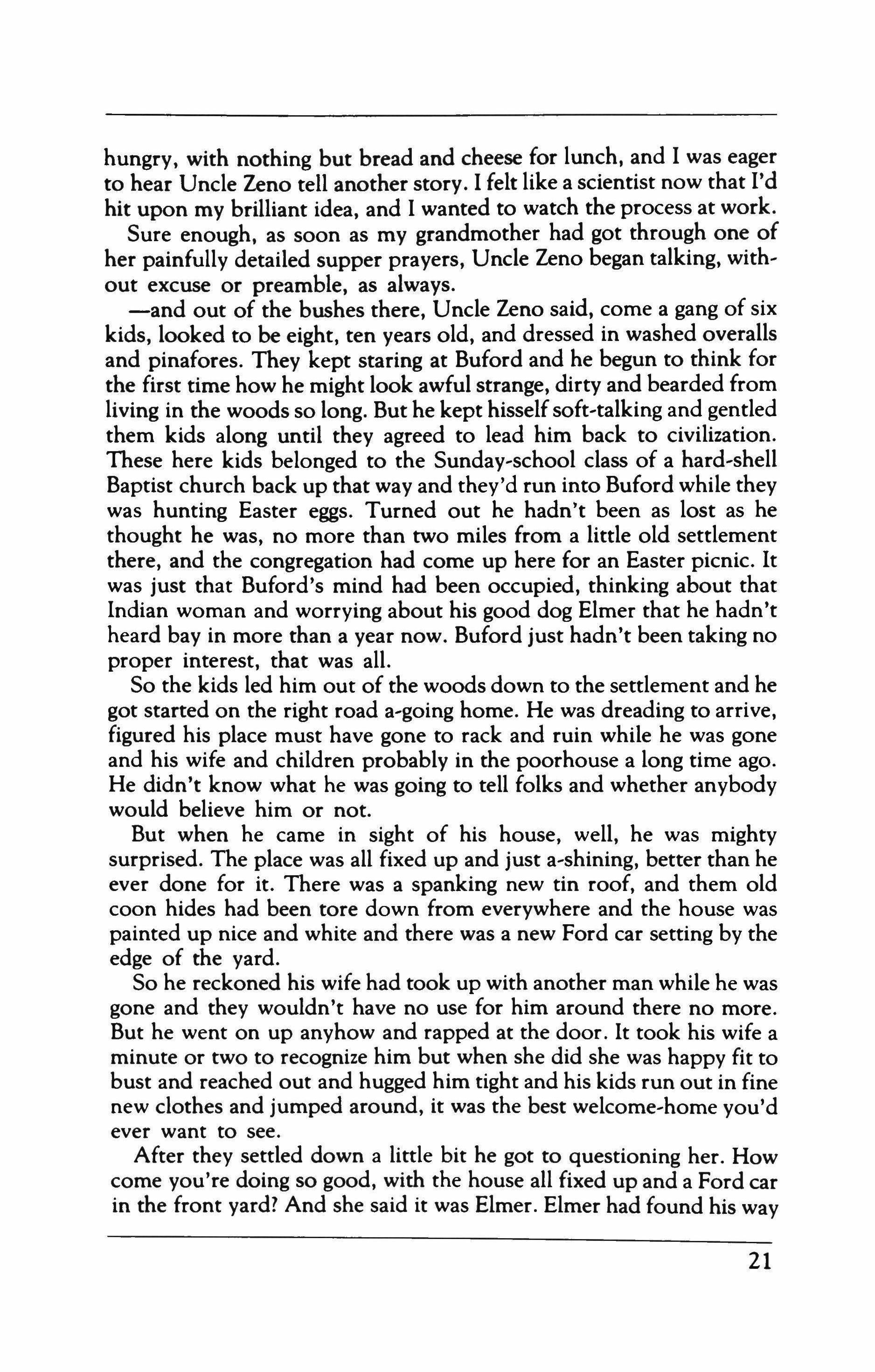
hungry, with nothing but bread and cheese for lunch, and I was eager to hear Uncle Zeno tell another story. I felt like a scientist now that I'd hit upon my brilliant idea, and I wanted to watch the process at work.
Sure enough, as soon as my grandmother had got through one of her painfully detailed supper prayers, Uncle Zeno began talking, without excuse or preamble, as always.
-and out of the bushes there, Uncle Zeno said, come a gang of six kids, looked to be eight, ten years old, and dressed in washed overalls and pinafores. They kept staring at Buford and he begun to think for the first time how he might look awful strange, dirty and bearded from living in the woods so long. But he kept hisselfsoft-talking and gentled them kids along until they agreed to lead him back to civilization. These here kids belonged to the Sunday-school class of a hard-shell Baptist church back up that way and they'd run into Buford while they was hunting Easter eggs. Turned out he hadn't been as lost as he thought he was, no more than two miles from a little old settlement there, and the congregation had come up here for an Easter picnic. It was just that Buford's mind had been occupied, thinking about that Indian woman and worrying about his good dog Elmer that he hadn't heard bay in more than a year now. Buford just hadn't been taking no proper interest, that was all.
So the kids led him out of the woods down to the settlement and he got started on the right road a-going home. He was dreading to arrive, figured his place must have gone to rack and ruin while he was gone and his wife and children probably in the poorhouse a long time ago. He didn't know what he was going to tell folks and whether anybody would believe him or not.
But when he came in sight of his house, well, he was mighty surprised. The place was all fixed up and just a-shining, better than he ever done for it. There was a spanking new tin roof, and them old coon hides had been tore down from everywhere and the house was painted up nice and white and there was a new Ford car setting by the edge of the yard.
So he reckoned his wife had took up with another man while he was gone and they wouldn't have no use for him around there no more. But he went on up anyhow and rapped at the door. It took his wife a minute or two to recognize him but when she did she was happy fit to bust and reached out and hugged him tight and his kids run out in fine new clothes and jumped around, it was the best welcome-horne you'd ever want to see.
After they settled down a little bit he got to questioning her. How come you're doing so good, with the house all fixed up and a Ford car in the front yard? And she said it was Elmer. Elmer had found his way
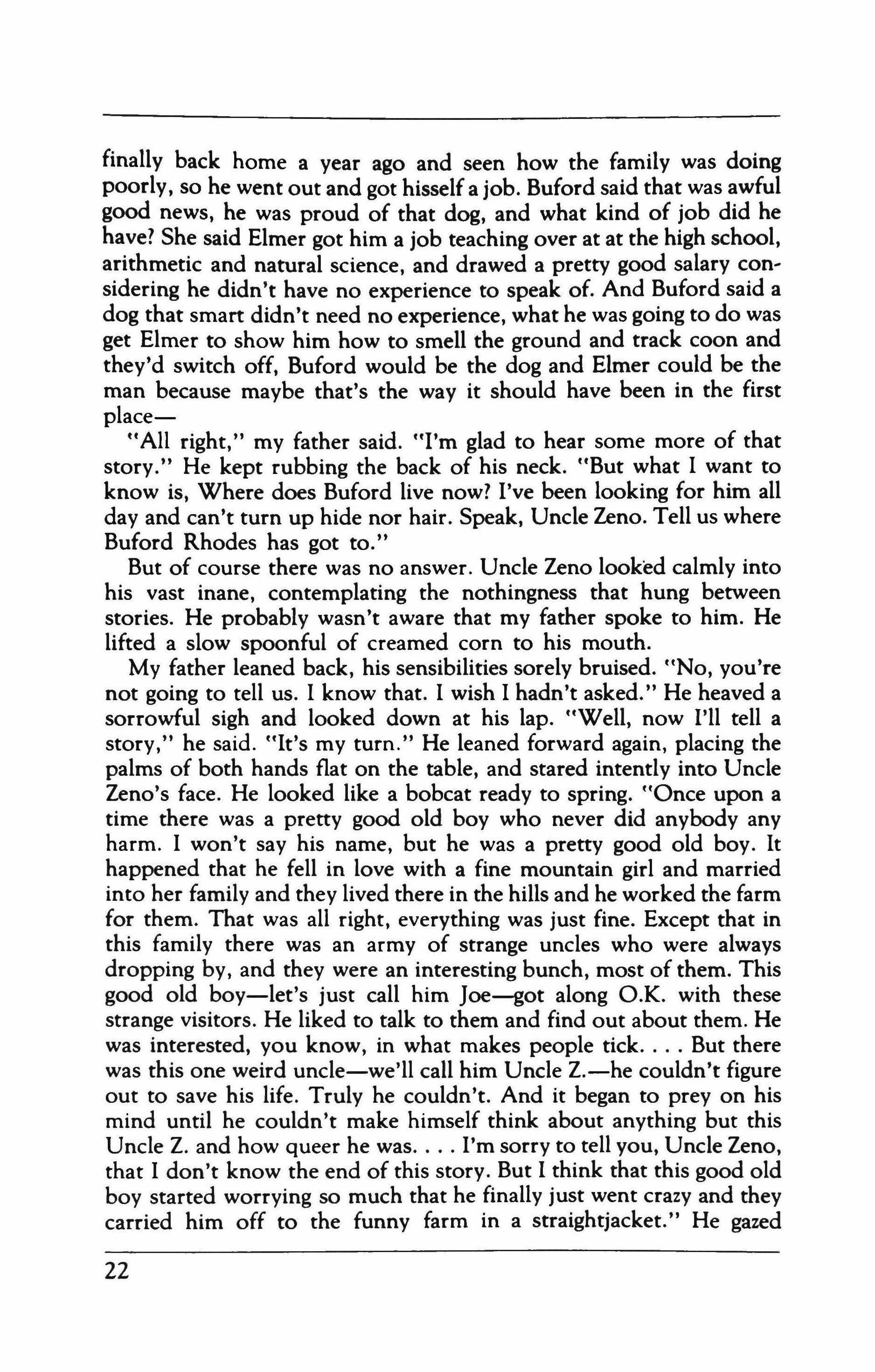
finally back home a year ago and seen how the family was doing poorly, so he went out and got hisself a job. Buford said that was awful good news, he was proud of that dog, and what kind of job did he have? She said Elmer got him a job teaching over at at the high school, arithmetic and natural science, and drawed a pretty good salary considering he didn't have no experience to speak of. And Buford said a dog that smart didn't need no experience, what he was going to do was get Elmer to show him how to smell the ground and track coon and they'd switch off, Buford would be the dog and Elmer could be the man because maybe that's the way it should have been in the first place-
t< All right," my father said. "I'm glad to hear some more of that story." He kept rubbing the back of his neck. "But what I want to know is, Where does Buford live now? I've been looking for him all day and can't turn up hide nor hair. Speak, Uncle Zeno. Tell us where Buford Rhodes has got to."
But of course there was no answer. Uncle Zeno looked calmly into his vast inane, contemplating the nothingness that hung between stories. He probably wasn't aware that my father spoke to him. He lifted a slow spoonful of creamed corn to his mouth.
My father leaned back, his sensibilities sorely bruised. "No, you're not going to tell us. I know that. I wish I hadn't asked." He heaved a sorrowful sigh and looked down at his lap. "Well, now I'll tell a story," he said. "It's my turn." He leaned forward again, placing the palms of both hands flat on the table, and stared intently into Uncle Zeno's face. He looked like a bobcat ready to spring. "Once upon a time there was a pretty good old boy who never did anybody any harm. I won't say his name, but he was a pretty good old boy. It happened that he fell in love with a fine mountain girl and married into her family and they lived there in the hills and he worked the farm for them. That was all right, everything was just fine. Except that in this family there was an army of strange uncles who were always dropping by, and they were an interesting bunch, most of them. This good old boy-let's just call him Joe-got along O.K. with these strange visitors. He liked to talk to them and find out about them. He was interested, you know, in what makes people tick But there was this one weird uncle-we'll call him Uncle Z.-he couldn't figure out to save his life. Truly he couldn't. And it began to prey on his mind until he couldn't make himself think about anything but this Uncle Z. and how queer he was I'm sorry to tell you, Uncle Zeno, that I don't know the end of this story. But I think that this good old boy started worrying so much that he finally just went crazy and they carried him off to the funny farm in a straightjacket." He gazed

morosely into the plate of food he had hardly touched. "But like I say, I don't really know the end of the story."
My grandmother reprimanded him, in a tone gender than usual. "Now, Joe Robert, you don't want to be unmannerly."
He stood up. "No, of course I don't," he said. "If vou-all will excuse me, I think I'll go out on the porch and have a cigarette. Maybe clear my head. I don't know what's the matter with me." He fumbled a moment with the knob, then stepped through the door and closed it.
My mother and grandmother looked at each other, and my grand, mother said, "Joe Robert's acting kind of peculiar, seems to me. He ain't ailing, is he?"
"He doesn't seem to be ill," my mother said.
"It's Uncle Zeno's stories," I told them. "They get him all worked up. He wants to do something, but he don't know what to do."
"They're only stories," my mother said. "No one is supposed to do anything about them."
I wanted to reply, but I couldn't very well tell my mother that she didn't understand my father, that he always had to be doing things, changing the order of the world in some way, causing anarchy when he could or simple disorder if he couldn't do any better.
"Just seems peculiar to me," my grandmother said, "somebody getting all worked up about a few harmless windies." She looked at our visitor with a fond expression. "Why, Uncle Zeno wouldn't harm a fly."
The three of us looked at him, an inoffensive old man who hardly appeared to occupy the chair he sat in. He seemed ignorant of our regard, and it was clear that what she said was true. He wouldn't harm a fly.
Then his drifting abstraction formed into a voice and he began to speak again. "That puts me in mind of," Uncle Zeno said, "Cousin Annie Barbara Sorrells that lived down toward the mouth of Ember Cove. Had a right nice farm there, about a hundred acres or so, but didn't have nobody to work it, her oldest son dying when he was eight and her other boy, Luden, gone off to California on a motorcycle. But she had her a son-in-law, Joe Robert his name was, and he was a pretty fair hand at farming, she didn't have no complaints to speak of, except that Joe Robert was ever the sort to dream up mischief Well, it happened one time that her boy Luden had sent Annie Barbara a pres, ent, which was a box of fancy candies he'd bought in St. Louis-"
This was too much.
Uncle Zeno was telling a story about us. I knew what he was going to say; I'd lived through those events, after all. His story focused on my father, and that fact disturbed me. My father didn't seem to get along

too well with Uncle Zeno as it was, and perhaps he wouldn't be happy to hear that he was now a character in the old man's stories.
I jumped up without even saying Excuse me and went out to the porch. It was as dark as the dreams of a sleeping bear; rain clouds blocked off the starlight and there was only a dim light coming through the dining-room drapes. My father was not smoking, but just sitting in a chair shoved flat against the wall of the house.
"Are you here?" I asked.
He paused a long time before answering. "Yeah, I'm right here, Jess."
"Are you feeling O.K.?"
Another pause, and I could hear Uncle Zeno's mumble drone through the door.
"I'm all right, I guess. Maybe I'm catching a cold. I've been feeling kind of light-headed. Feel a little weak all over, like I'd lost a lot of weight in a hurry."
"Come on back in and have a piece of apple pie. Maybe it'll make you feel better."
He sat motionless. There was no wind sound, no sound at all except for the low, indistinct mutter of Uncle Zeno's story.
"Apple pie," he said softly. "Well, that's not bad medicine." He didn't move for a while yet. Finally he rose slowly from the chair. But when he took a step he walked directly into darkest shadow and I couldn't see him at all and at that moment Uncle Zeno's story concluded and all the night went silent.

Surely the reckoning will be made After the passing of this cloud. We are the people without [ears, Straighter than you more proud Anna Akhmatova
To honor him I wanted to write a story named "Isaac Babel" after his "Guy de Maupassant," but material for such an imitation did not exist, and I was unwilling or unable to invent.
The wish grew into an obligation, yet a year went by without giving me an inkling of how to proceed, though I wearied my brains and ransacked my journal. And as time passed nothing seemed less plausible than to write a story about a story-or more necessary.
Babel's terrible paradigms obsessed me, especially his masterpiece about a penniless Odessa Jew who goes to Petersburg in 1916 with a forged passport and his ancestors' injunction to enjoy, and gets a job translating Maupassant for the voluptuous wife of a profit-maddened munitions supplier, owner of a publishing house.
Three of Maupassant's stories-"Miss Harriet," "Idyll," and "The Confession," all tales of Eros-are sketched in Babel's tour de force about famished youth, at once a panegyric, a treatise on writing, and a deadly foreboding.
Drunk one night, exuberant with his genius, the translator tries to seduce his patroness, then returns singing to his garret and reads a biography, learning that Guy de Maupassant, born in Normandy in 1850, was Gustave Flaubert's cousin, lived a profligate life and developed syphilis at twenty-five. At first his prodigious energy and joie de vivre withstood the onslaughts. He struggled furiously, fled around the Mediterranean in a yacht, going crazy and blind, but always writing. He attained fame, at forty cut his throat, survived to be confined and die two years later in a madhouse, crawling on all fours, eating his feces.
The disciple closes the book and goes to the window, but the world is hidden in fog.
In 1969, sick of the city and its constantly shrieking sirens, Abigail

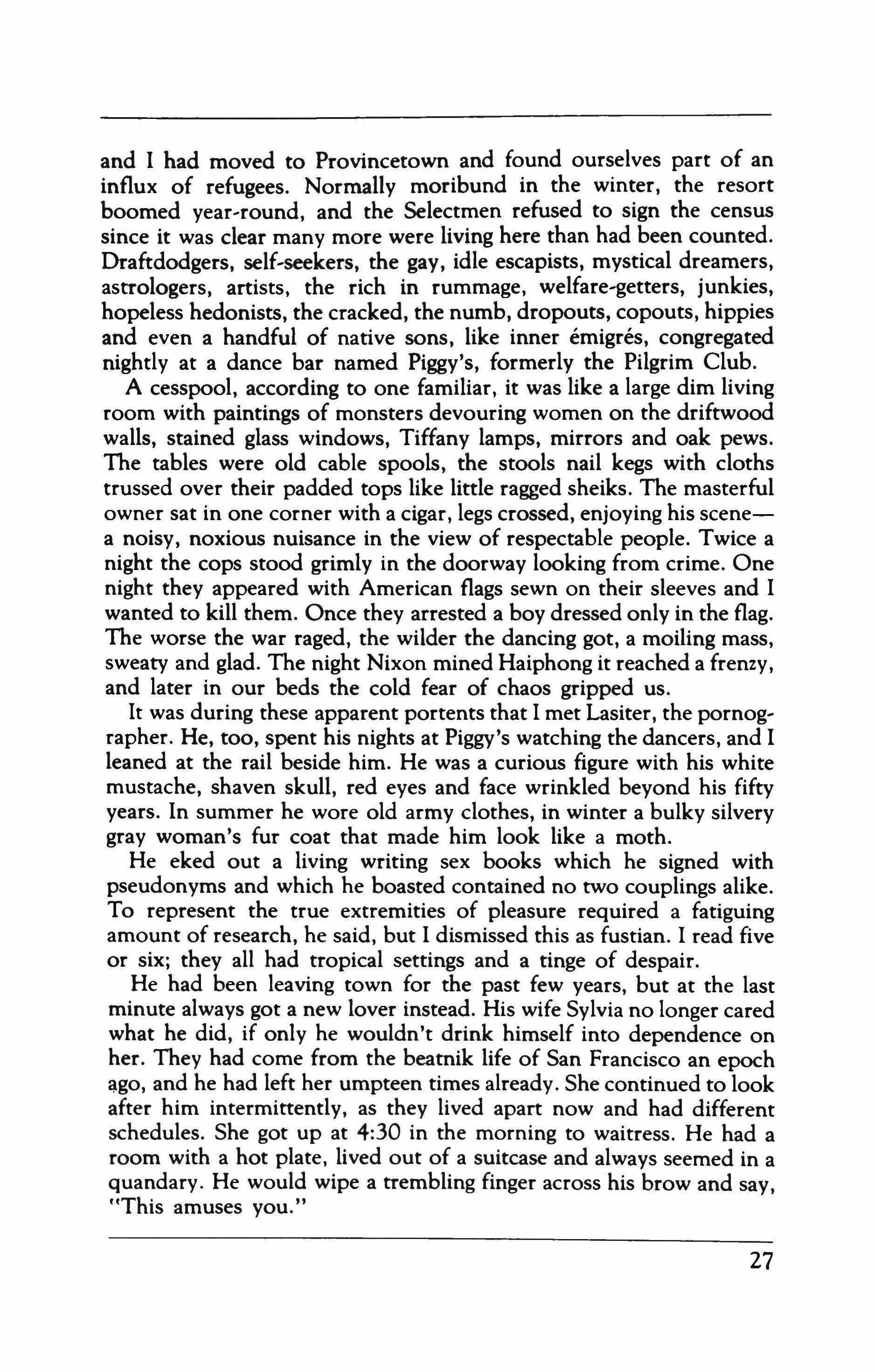
and I had moved to Provincetown and found ourselves part of an influx of refugees. Normally moribund in the winter, the resort boomed vear-round, and the Selectmen refused to sign the census since it was clear many more were living here than had been counted. Draftdodgers, self-seekers, the gay, idle escapists, mystical dreamers, astrologers, artists, the rich in rummage, welfare-getters, junkies, hopeless hedonists, the cracked, the numb, dropouts, copouts, hippies and even a handful of native sons, like inner emigres, congregated nightly at a dance bar named Piggy's, formerly the Pilgrim Club.
A cesspool, according to one familiar, it was like a large dim living room with paintings of monsters devouring women on the driftwood walls, stained glass windows, Tiffany lamps, mirrors and oak pews. The tables were old cable spools, the stools nail kegs with cloths trussed over their padded tops like little ragged sheiks. The masterful owner sat in one corner with a cigar, legs crossed, enjoying his scenea noisy, noxious nuisance in the view of respectable people. Twice a night the cops stood grimly in the doorway looking from crime. One night they appeared with American flags sewn on their sleeves and I wanted to kill them. Once they arrested a boy dressed only in the flag. The worse the war raged, the wilder the dancing got, a moiling mass, sweaty and glad. The night Nixon mined Haiphong it reached a frenzy, and later in our beds the cold fear of chaos gripped us.
It was during these apparent portents that I met Lasiter, the pornographer. He, too, spent his nights at Piggy's watching the dancers, and I leaned at the rail beside him. He was a curious figure with his white mustache, shaven skull, red eyes and face wrinkled beyond his fifty years. In summer he wore old army clothes, in winter a bulky silvery gray woman's fur coat that made him look like a moth.
He eked out a living writing sex books which he signed with pseudonyms and which he boasted contained no two couplings alike. To represent the true extremities of pleasure required a fatiguing amount of research, he said, but I dismissed this as fustian. I read five or six; they all had tropical settings and a tinge of despair.
He had been leaving town for the past few years, but at the last minute always got a new lover instead. His wife Sylvia no longer cared what he did, if only he wouldn't drink himself into dependence on her. They had come from the beatnik life of San Francisco an epoch ago, and he had left her umpteen times already. She continued to look after him intermittently, as they lived apart now and had different schedules. She got up at 4:30 in the morning to waitress. He had a room with a hot plate, lived out of a suitcase and always seemed in a quandary. He would wipe a trembling finger across his brow and say, "This amuses you."

Inspired by the bourbon he bought by the quart, I told him the stories of Isaac Babel, including the one named "And Then There Were None," circa 1923, long suppressed in Russia, about the murder of nine Polish prisoners by a wounded Cossack over the protests of a Jewish supply officer who next day takes his diary into an untouched garden of hyacinths and blue roses to make notes on the dead, but immediately is interrupted by fellow-soldiers with coats over their heads and a smoking torch, plundering the beehives.
He lays down his pen, horrified at the number of memorials still to be written.
No iron can stab the heart with such force as a period put at exactl-y the right place, Babel says in "Guy de Maupassant," and adds, A phrase is born into the world both good and bad. The secret lies in a slight, almost invisible twist. The lever should rest in the hand, getting warm, and can be tumed only once, not twice.
With a certain enjoyable malice, I divulged to Lasiter the gist of "Rue Dante," a tale about a Parisian prostitute who cuts her bovfriend's throat when he jilts her.
The corpse is carried from the brothel by the gendarmes at six in the evening, the hour of love, when the hotel soars through the air on groans. Men with unlaced boots are lined up in the halls. Half-dressed women are restoring their lipstick and rouge.
A chorus of old women gathers-mounds of wry and goiterous flesh, bewhiskered, stertorous of breath, with walleyes and purple blotches-and pronounces God's punishment on those who do not love.
Darkness falls. The squat crowds of the Latin Quarter scuttle into their crevices and a burning breath of garlic wafts from the courtyards. Danton had lived here a century and a half before; the same scene, the blind, close-pressed hovels, the bridges cast lightly across the Seine, had met his eyes. Jostled by the wind, the rusty trusses of the inn signs creak.
Lasiter read only pornography, plagiarized freely and composed ignoble debaucheries in flowery prose. Virtue Undone, Vice Rewarded was his soothing, mournful theme. The relief of the dear, distressed flesh and the degradations of the spirit that flowed from his pen seemed devised to suborn the reader. "You think all art is affirrnative," he once complained. "Unlike you blocked esoterics who get grants to produce driblets no normal wretch wants to read, I aggravate a need."
All the same, he was a humble soul compared to me, who, drinking while drunk, railed at the gods. Shakespeare? Shakespeare quit writing and went back to Stratford! Shakespeare retired! How could that be?
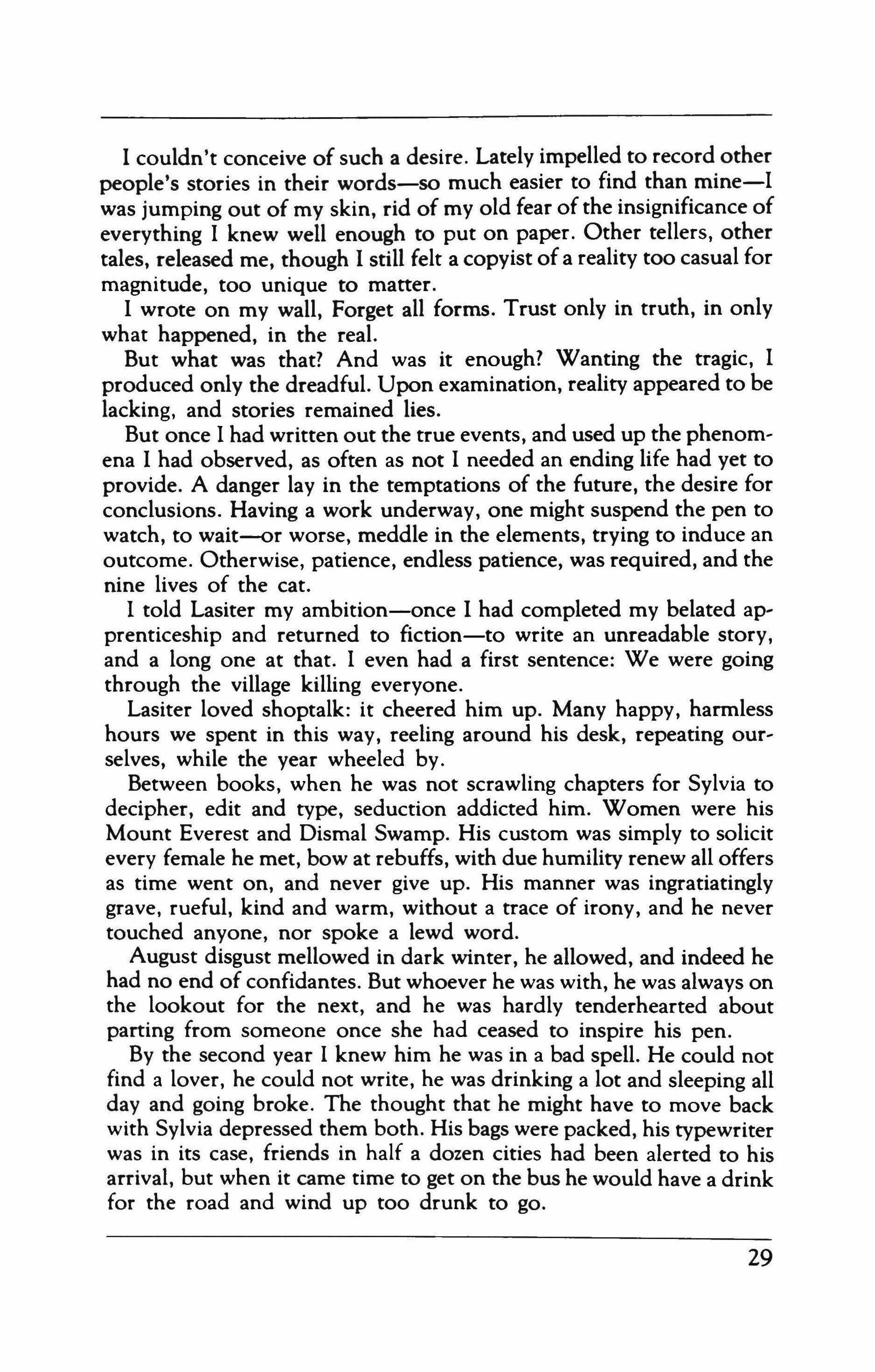
I couldn't conceive of such a desire. Lately impelled to record other people's stories in their words-so much easier to find than mine-I was jumping out of my skin, rid of myoid fear of the insignificance of everything I knew well enough to put on paper. Other tellers, other tales, released me, though I still felt a copyist of a reality too casual for magnitude, too unique to matter.
I wrote on my wall, Forget all forms. Trust only in truth, in only what happened, in the real.
But what was that? And was it enough? Wanting the tragic, I produced only the dreadful. Upon examination, reality appeared to be lacking, and stories remained lies.
But once I had written out the true events, and used up the phenomena I had observed, as often as not I needed an ending life had yet to provide. A danger lay in the temptations of the future, the desire for conclusions. Having a work underway, one might suspend the pen to watch, to wait-or worse, meddle in the elements, trying to induce an outcome. Otherwise, patience, endless patience, was required, and the nine lives of the cat.
I told Lasiter my ambition-once I had completed my belated apprenticeship and returned to fiction-to write an unreadable story, and a long one at that. I even had a first sentence: We were going through the village killing everyone.
Lasiter loved shoptalk: it cheered him up. Many happy, harmless hours we spent in this way, reeling around his desk, repeating ourselves, while the year wheeled by.
Between books, when he was not scrawling chapters for Sylvia to decipher, edit and type, seduction addicted him. Women were his Mount Everest and Dismal Swamp. His custom was simply to solicit every female he met, bow at rebuffs, with due humility renew all offers as time went on, and never give up. His manner was ingratiatingly grave, rueful, kind and warm, without a trace of irony, and he never touched anyone, nor spoke a lewd word.
August disgust mellowed in dark winter, he allowed, and indeed he had no end of confidantes. But whoever he was with, he was always on the lookout for the next, and he was hardly tenderhearted about parting from someone once she had ceased to inspire his pen.
By the second year I knew him he was in a bad spell. He could not find a lover, he could not write, he was drinking a lot and sleeping all day and going broke. The thought that he might have to move back with Sylvia depressed them both. His bags were packed, his typewriter was in its case, friends in half a dozen cities had been alerted to his arrival, but when it came time to get on the bus he would have a drink for the road and wind up too drunk to go.

It was February, the deadly month, when he said, "All women are the same."
"Even Esmeralda?" I said, with my evil genius.
"Who's she?" he said, lifting his eyes at the name.
So I took him to her house. I was surprised he did not know her, but in fact she had stopped going out. She could no longer stand the grim world or any of its manifestations, and people thought her affected, and she thought them mad.
She spent hours in her velvet-hung, perfume-heavy bedroom, sitting before a mirror propped on a desk covered with cosmetics, changing her makeup and nails. She wore flowing, flimsy black gowns or a clinging slip and her large round breasts moved like moons as she arose or reclined on the pillow-strewn couch in her narrow living room. A parallel length of marble on milk crates always offered vials of various drugs and a hookah. Coffee brewed in the kitchen. At that time her life was a search for new highs.
It was like Breughel's "Land of Cockayne" there, where the dim lights were never turned off, with everyone and everything afloat timelessly, and fancies, thick as thieves, crowded the tongue, an abstract world where one ate standing up, alone, at all hours, staring out at the bare briars and empty parking lot.
Lately she had suffered a languid indifference to one lesbian lover after another and was surely Lasiter's jaded equal. "Why don't you go back to men?" I would say, but it was a political issue with her.
The introductions made, Esmeralda said with her gargantuan horror, "You actually write pornography?" and brought out a bottle of brandy.
His eyes turned bright red as he said, "Yes."
"Then you're practically the perfect personification of the enemy," she said.
"I don't know what I am," he said, and there was an eerie treble in his voice.
"I know what I am," Esmeralda said with her implacable gravity. "I spent my infancy on top of a bar where my mother served drinks to workingmen. My father was an unemployed Marxist and read Bakunin to me. When he was drunk he would beat my mother because the revolution refused to come. She died of a heart attack at thirty-two, and then he lost hope and died himself. He was a degenerated Anglo. She was a Guatemalan peasant, and in spirit so am l. But foremost, above all else, I am a woman."
She caught my eye and her glowering gloom dissolved in delighted laughter at the outlandishness of it all. "But I think I like you," she said to Lasiter, who bowed. "How is that possible?" He bowed more deeply yet.

1 went home to Abigail and my blank page. How the unending hours must have flown on the voluminous couch, what exquisite tinglings must have been sustained, what disturbing astonishments, what fearful inklings of submission!
1 saw little of them for the next month and did not enter Esmeralda's house, as she never answered her door. In March, meeting her on the street, I went home with her and found a new world. Lasiter was reeling around, his eyes red as a sunrise. "I can drink," he said, "all day long and never get drunk, and I hardly need a wink at night."
On the left-hand corner of the kitchen table was a mug full of pens and a pile of scrawled foolscap. His typewriter was set up at the end of the living room, and beside it stood a battered wire basket with half an inch of finished manuscript.
"About Esmeralda?" I said.
He looked at me with shock.
"I may write one about him," she said, and her rippling, tumultuous laughter engulfed us.
"I'm writing my autobiography," he said.
"Dear Jesus!" 1 said.
"It seems to be writing itself," he said with dignity. "Knock on wood."
I did so with goodwill and skinned my knuckles on the edge ofwhat turned out to be a formica table. 1 hit the wall and some plaster fell. I bent, hurting my back, and beat on the floor.
"Actually I've decided to finish my thesis," Esmeralda said, and her eyes roamed the magnificent ranges of her books.
Over dinner I related "Di Grasso," 1937, the penultimate of Babel's published works, a tale of the Odessa theater, in the unhappy year the opera flopped.
Things looked desperate indeed with the arrival of a Sicilian tragedian and his shabby gypsy troupe. Even at half price, tickets wouldn't sell. Opening night, they staged a folk drama as trite as the succession of night and day. A peasant girl is engaged to a shepherd. A city slicker steals her love. In the second act she hands the shepherd back his ring. In the third the city slicker meets his end. Having a shave at the barber'S, he fidgets in his chair, feeling the shepherd's burning gaze. Finally he sits up and in a shaking voice shouts for a policeman to clear the square of all gloomy, suspicious-looking persons.
The shepherd, played by Di Grasso himself, stands lost in thought, then gives a smile, leaps aloft, sails across the stage and sinks his teeth in his rival's throat, growling and squinting and sucking the blood as the noiseless, ominous curtain falls, confirming that there is more justice in outbursts of noble passion than in all the joyless rules that run the world, and saving the impresario's shirt, filling his erstwhile
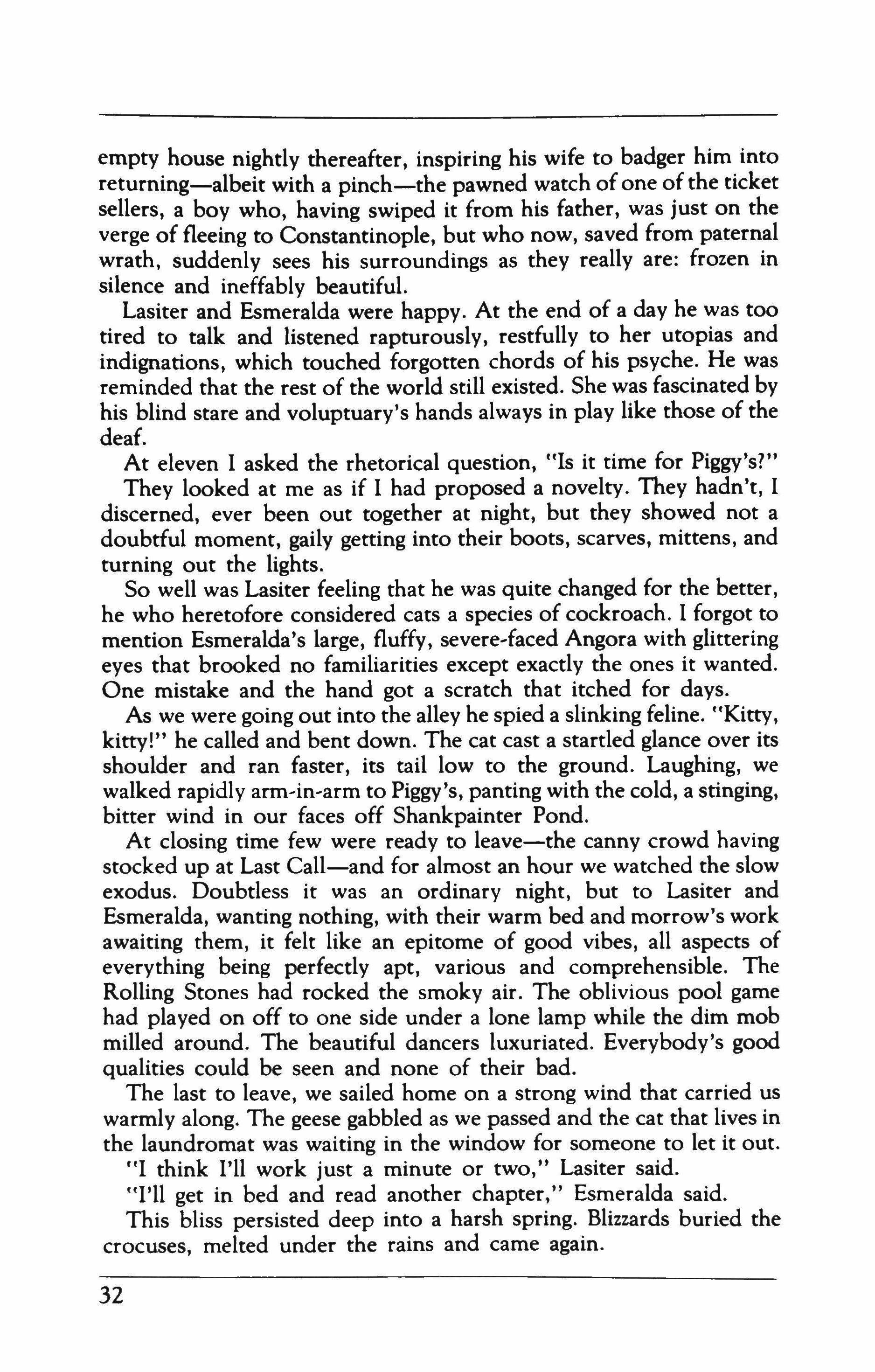
empty house nightly thereafter, inspiring his wife to badger him into returning-albeit with a pinch-the pawned watch of one of the ticket sellers, a boy who, having swiped it from his father, was just on the verge of fleeing to Constantinople, but who now, saved from paternal wrath, suddenly sees his surroundings as they really are: frozen in silence and ineffably beautiful.
Lasiter and Esmeralda were happy. At the end of a day he was too tired to talk and listened rapturously, restfully to her utopias and indignations, which touched forgotten chords of his psyche. He was reminded that the rest of the world still existed. She was fascinated by his blind stare and voluptuary's hands always in play like those of the deaf.
At eleven I asked the rhetorical question, "Is it time for Piggy's?"
They looked at me as if I had proposed a novelty. They hadn't, I discerned, ever been out together at night, but they showed not a doubtful moment, gaily getting into their boots, scarves, mittens, and turning out the lights.
So well was Lasiter feeling that he was quite changed for the better, he who heretofore considered cats a species of cockroach. I forgot to mention Esmeralda's large, fluffy, severe-faced Angora with glittering eyes that brooked no familiarities except exactly the ones it wanted. One mistake and the hand got a scratch that itched for days.
As we were going out into the alley he spied a slinking feline. "Kitty, kitty!" he called and bent down. The cat cast a startled glance over its shoulder and ran faster, its tail low to the ground. Laughing, we walked rapidly arm-in-arm to Piggy's, panting with the cold, a stinging, bitter wind in our faces off Shankpainter Pond.
At closing time few were ready to leave-the canny crowd having stocked up at Last Call-and for almost an hour we watched the slow exodus. Doubtless it was an ordinary night, but to Lasiter and Esmeralda, wanting nothing, with their warm bed and morrow's work awaiting them, it felt like an epitome of good vibes, all aspects of everything being perfectly apt, various and comprehensible. The Rolling Stones had rocked the smoky air. The oblivious pool game had played on off to one side under a lone lamp while the dim mob milled around. The beautiful dancers luxuriated. Everybody's good qualities could be seen and none of their bad.
The last to leave, we sailed home on a strong wind that carried us warmly along. The geese gabbled as we passed and the cat that lives in the laundromat was waiting in the window for someone to let it out.
"I think I'll work just a minute or two," Lasiter said.
"I'll get in bed and read another chapter," Esmeralda said. This bliss persisted deep into a harsh spring. Blizzards buried the crocuses, melted under the rains and came again.

I was stupefied, next time I met Esmeralda, to learn that she was pregnant. "These devices!" she said with scornful disgust.
But it was no misfortune. At thirtv-seven it was not too late for her to raise a Socialist child, a desire long suppressed. "Not an age one would want to bring children into," she had lamented for years, but now her pessimism failed. She suddenly felt at home in the world, whose injustices she detested; she resolved to be of use.
Lasiter vacillated. Now that he had found happiness he felt old and the possible solace of a daughter intrigued him. Perhaps the end of eroticism was a generous life. He threw away his collection of keep' sakes, but could not quite get himself to give up his room and went on paying rent, though he never went there and nothing was left in it but a bed. All the same he swore he wholly intended to embrace the rounded responsible life his new nature now allowed.
He went to get Sylvia's assent and assure himself of their future collaboration. It occurred to him the child would want an aunt. Sylvia had renounced children for art even before she met Lasiter, but the ideal had faded, and she had little to show for the years. Her pride was in his books, so hard won from him that she well might have put her pseudonyms on them, beside his, as in their old joke.
Grim and remote, she wished him bad luck in an unfamiliar, insin' uating tone. She was bent on divorce, a resort he had often offered her, and was arranging to move to New York and hunt for a loft. She had lost weight and looked intent.
He left her calm apartment profoundly amazed and got drunk by himself. At closing time, when he wondered where to go, his heart shrank at the touch of an irremediable truth. He slept in his room for the first time in two months and awoke with the spring sun prickling his face.
He went back to Sylvia's day after day, but in spirit she had already gone. Once she left him sitting at the kitchen table while she did errands, then asked him to leave upon her return.
Esmeralda lost her laughter and sudden lines masked her face. Her friends were disbelieving, then appalled, finally mocking or silent. Groups of women visited her like delegations, but she was steadfast in her decision and braced for Lasiter's defection.
His mouth warped, he walked with eyes upon the ground while the zero days approached=-Svlvla's departure and the date too late for an abortion. He could not endure either Sylvia or Esmeralda for need of the other, and he could abide neither, since both damned him.
Next I knew he had retreated to his bare room to think, as he put it, but what he mostly did was drink. His book had come to an end, too vile to write, nor could he face the mirror of the future. "Change, change!" he muttered. "But what ever changes?"
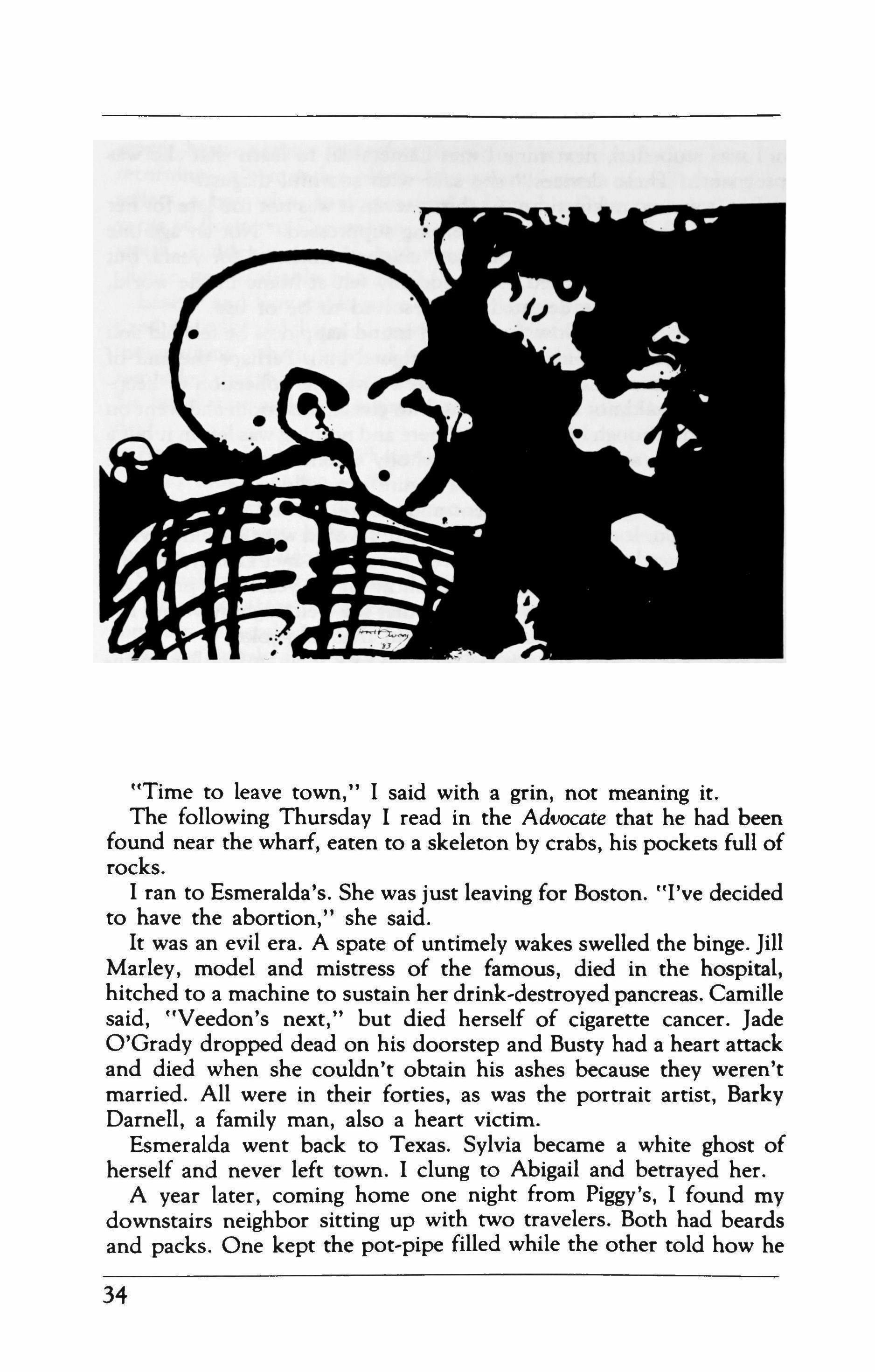
"Time to leave town," I said with a grin, not meaning it.
The following Thursday I read in the Advocate that he had been found near the wharf, eaten to a skeleton by crabs, his pockets full of rocks.
I ran to Esmeralda's. She was just leaving for Boston. "I've decided to have the abortion," she said.
It was an evil era. A spate of untimely wakes swelled the binge. Jill Marley, model and mistress of the famous, died in the hospital, hitched to a machine to sustain her drink-destroved pancreas. Camille said, "Veedon's next," but died herself of cigarette cancer. Jade O'Grady dropped dead on his doorstep and Busty had a heart attack and died when she couldn't obtain his ashes because they weren't married. All were in their forties, as was the portrait artist, Barky Darnell, a family man, also a heart victim.
Esmeralda went back to Texas. Sylvia became a white ghost of herself and never left town. I clung to Abigail and betrayed her.
A year later, coming home one night from Piggy's, I found my downstairs neighbor sitting up with two travelers. Both had beards and packs. One kept the pot-pipe filled while the other told how he

made his living selling pens. "This pen," he said, "will write what you want, when you want it to."
He took the cap off, wet his lips and began to play Bach. The candle flame wavered in the dim room, the vodka in the bottle went down. His long, tremulous fingers held the cap to his swelling lips and he nodded time, swaying from side to side. I have never been happier. None of them had heard of Isaac Babel. I started to tell the little I knew but to my amazed shame cried uncontrollably and couldn't talk. They all nodded sympathetically, it did not matter at what, some stranger bursting into tears late at night. After a while the musician took up his pen cap and began to play. He switched to jazz, then ragtime parodies of sentimental tunes. The evening ended in torpor and exhaustion. We shook hands, hoping to meet again. I climbed to my porch in the cloudy dawn and cursed the invisible stars.
Isaac Babel was born in the Moldavanka district of Odessa in 1894, the only child of Fanya Aronovna Shvevel and Emmanuel Isaakovich Babel, a shopkeeper. Sprung from a maelstrom of pogroms, revolution and war, the protege of Maxim Gorki, he achieved international renown with his youth's books, Red Cavalry (1926) and Odessa Stories (1932), after which new works were announced, never to appear. He apologized, wrote his quota of journalism and movie scripts, supported a tribe of dependents, befriended pariahs, hid from editors, joked that he had become a past master of the genre of silence. His stories in their impossible drafts piled up on his shelves. His wife, mother and sister emigrated; a daughter was born abroad. Still, in spite of sinister gossip, he was the very figure of the Soviet writer. The government gave him a villa, let him leave the country three times, and three times he returned alone, unable to persuade his family to follow. His phenomenal joie de vivre never flagged, he believed in the triumph of man and mind, belonged to the Revolution, loved his country and language. Greedily curious, a powerful optimist, he visited the Chief of the Secret Police to sniff the smell of the store where, he told Osip Mandelstam, the only merchandise was death. Awesome in early achievement, cautious and clever, revered by all, he endured the censorship, mastering his terror, till his arrest in May 1939. Entering Lubyanka Prison, he is said to have smiled and said, "I wasn't given time to finish."
His unpublished works were burned with the police archives in December 1941, as the Germans approached Moscow.
Sage of the ghetto, cast up by the titanic times, he crowed that only Odessa could beget a national Maupassant, a poet of the sun to celebrate the Black Sea and bronzed bathers, the various fructifying South and all its colorful life, not old Russia's cold ancestral gloomthe muddy road, the drunken drudge's shout.

Inexhaustible giant in chains, brave at his desk, the frail myopic boy become a Cossack, he laughed with his whole body, was called wise, an awkward customer, fond of cornering pomp. Hacks fled his quips. Only one thing he couldn't understand: humdrum anti-Semitism, the crippled ragman that children loved who tore the head off his dove. Horse lover, explorer of women's handbags, asthmatic twister of string-prolixity was not in his nature. Deeper, he said. Deeper. The unexpected is the essence of art.
Did the eye wither, the ear crack, as day by day, year on year, the new dark age came in?
The Nazis burned Red Cavalry. Dostoyevsky and Gogol grew dangerous in Moscow. He praised late Tolstoy and the proletarians when interviewed. I honor his steady nerve and long survival. I mourn his lost stories.
No one knows among the millions how Isaac Babel died, or why. Even the mad Czar was bereaved, the last Father of all, who had banished tragedy but wanted immortal praise and knew of him, knew of everyone. Monstrous, inconceivable Russia!
All we ask is a natural death, beyond the reign of bombs. War and revolution are done for, finished-or we are. May Babel still have believed in the future when the bullet hit or he lay unwakable in a barracks, tvphus-ridden, one with his silence, done with the polished oar of his beloved slavery, done with Russian, while his camp mates mustered outside for their dawn march to field or canal, road or mine, in the stifling charnel house where he had long since ceased to distinguish the living from the dead.
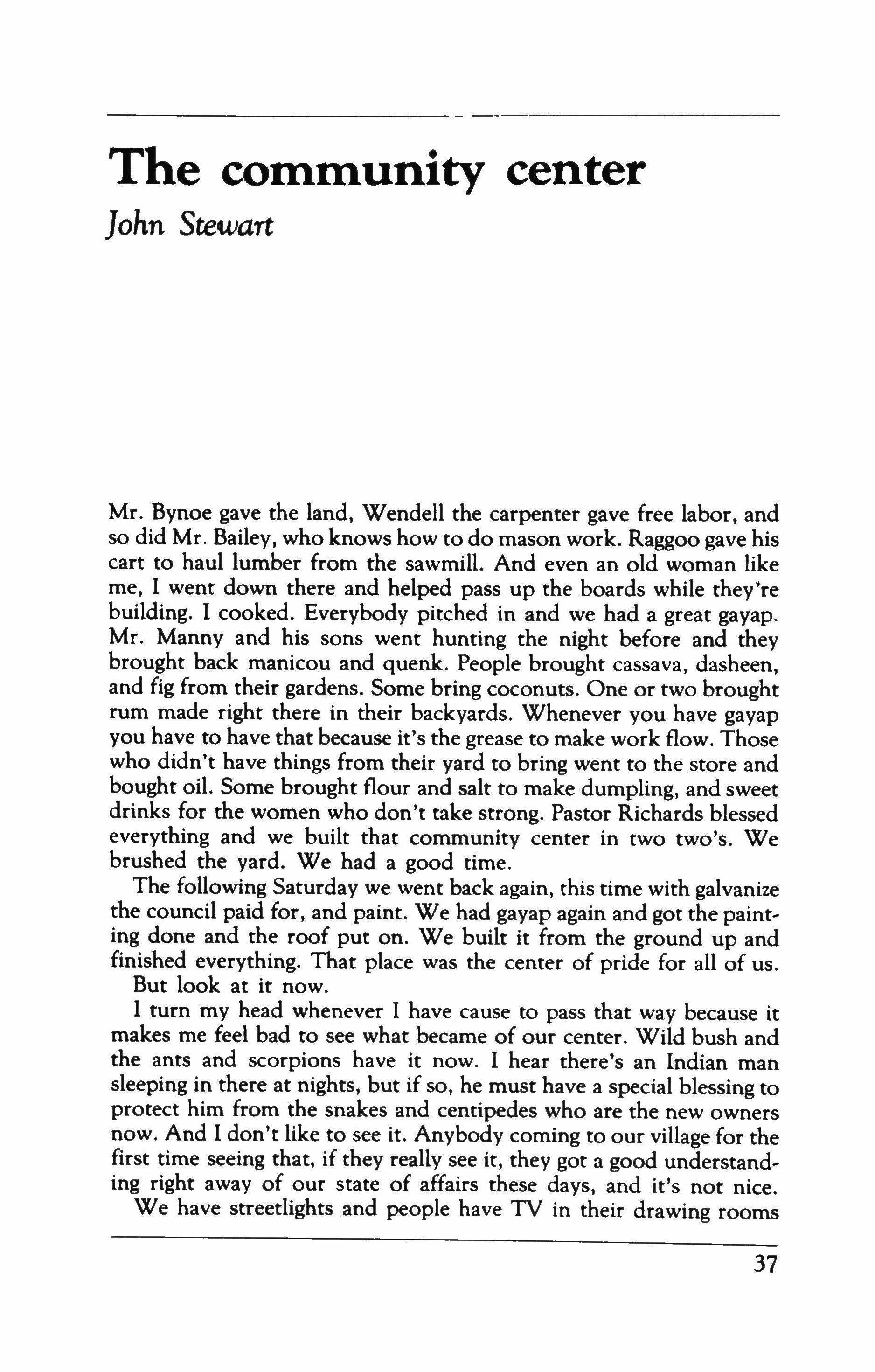
Mr. Bynoe gave the land, Wendell the carpenter gave free labor, and so did Mr. Bailey, who knows how to do mason work. Raggoo gave his cart to haul lumber from the sawmill. And even an old woman like me, I went down there and helped pass up the boards while they're building. I cooked. Everybody pitched in and we had a great gayap. Mr. Manny and his sons went hunting the night before and they brought back manicou and quenk. People brought cassava, dasheen, and fig from their gardens. Some bring coconuts. One or two brought rum made right there in their backyards. Whenever you have gayap you have to have that because it's the grease to make work flow. Those who didn't have things from their yard to bring went to the store and bought oil. Some brought flour and salt to make dumpling, and sweet drinks for the women who don't take strong. Pastor Richards blessed everything and we built that community center in two two's. We brushed the yard. We had a good time.
The following Saturday we went back again, this time with galvanize the council paid for, and paint. We had gayap again and got the painting done and the roof put on. We built it from the ground up and finished everything. That place was the center of pride for all of us.
But look at it now.
I turn my head whenever I have cause to pass that way because it makes me feel bad to see what became of our center. Wild bush and the ants and scorpions have it now. I hear there's an Indian man sleeping in there at nights, but if so, he must have a special blessing to protect him from the snakes and centipedes who are the new owners now. And I don't like to see it. Anybody coming to our village for the first time seeing that, if they really see it, they got a good understanding right away of our state of affairs these days, and it's not nice.
We have streetlights and people have TV in their drawing rooms
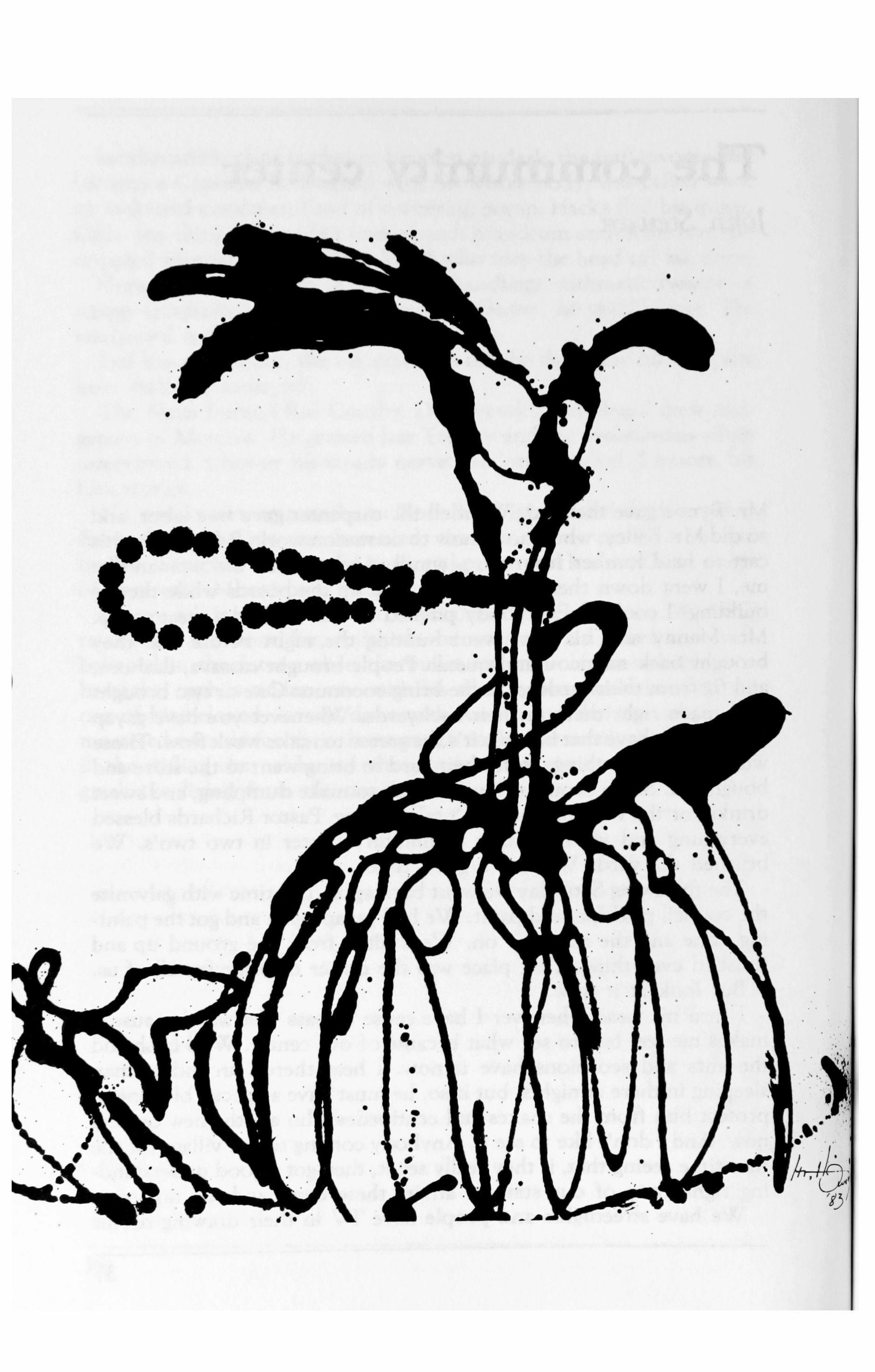

now. Water pipes not only in the yards but inside the house, people have these days. You could hear radios blasting from one end of the village to the next. And some of the young boys working for oil money build houses big enough to have school in. No more wood smoke in the kitchen, it's gas stove if you please. No mud oven. Who bothering to bake bread, when you could buy that thing the shop sells wrapped in fancy wax paper just like they do in Port-of-Spain! There are more motorcars owned in this village than used to be in the whole island before the war. We have plenty noise, and light, and busyness. But the heart's gone. And if you want to see where it went, pass by the community center.
And, we don't pay much attention to the Better Village Competition anymore, because that is what started it. Whatever you call it, the sickness that mash us up, it started with that competition. We entered in the first year and we were good. We did the dancing, we had woodwork and handicraft, we entered in the stickfighting. We had garden produce and bouquets. That year we should have won, but they gave us second.
The next year we prepared for them.
That Chinese boy who the government have selling choreograph, or whatever they call it, for village dance these days, he wasn't even born yet. But you have to watch these Chinese, you know. They're a wily people. Plenty things they don't know, but they're masters at pushing themselves to the front. And they don't give a damn about black people. They don't like us at all. I see with my own eyes a Chinese boy here in Princes Town curse his own mother, calling her dirty nigger, and saying he wished every nigger would drop dead. That is their way. But the government have this one, paying him to tell people about village dance. You think the likes of he could've been anywhere in the same circle with Tan Rosa? Bele, Bongo, Shango, Castillian, Pasillo, she was the queen of all. From San Francique to St. Mary's, Mayaro to Sangre Grande, people know Tan Rosa.
They used to come for her in motorcars when they had wake anywhere, and all she's walking with is her qua qua. Same thing every Saturday night, especially around Easter time and the Christmas season. Everybody want Tan Rosa to come to their dance because when she's there, and she step out, everything liven up. When you see Rosa pick up her skirt and decide to flare those petticoats, nobody could touch her you know. And if you're watching you're bound to catch the fever yourself. She was queen. Rosa never wanted for anything. She never had to walk with a cent in her pocket because people glad to give Rosa whatever she wanted. She was queen, and there'll never be another one like her-Lord bless her soul.
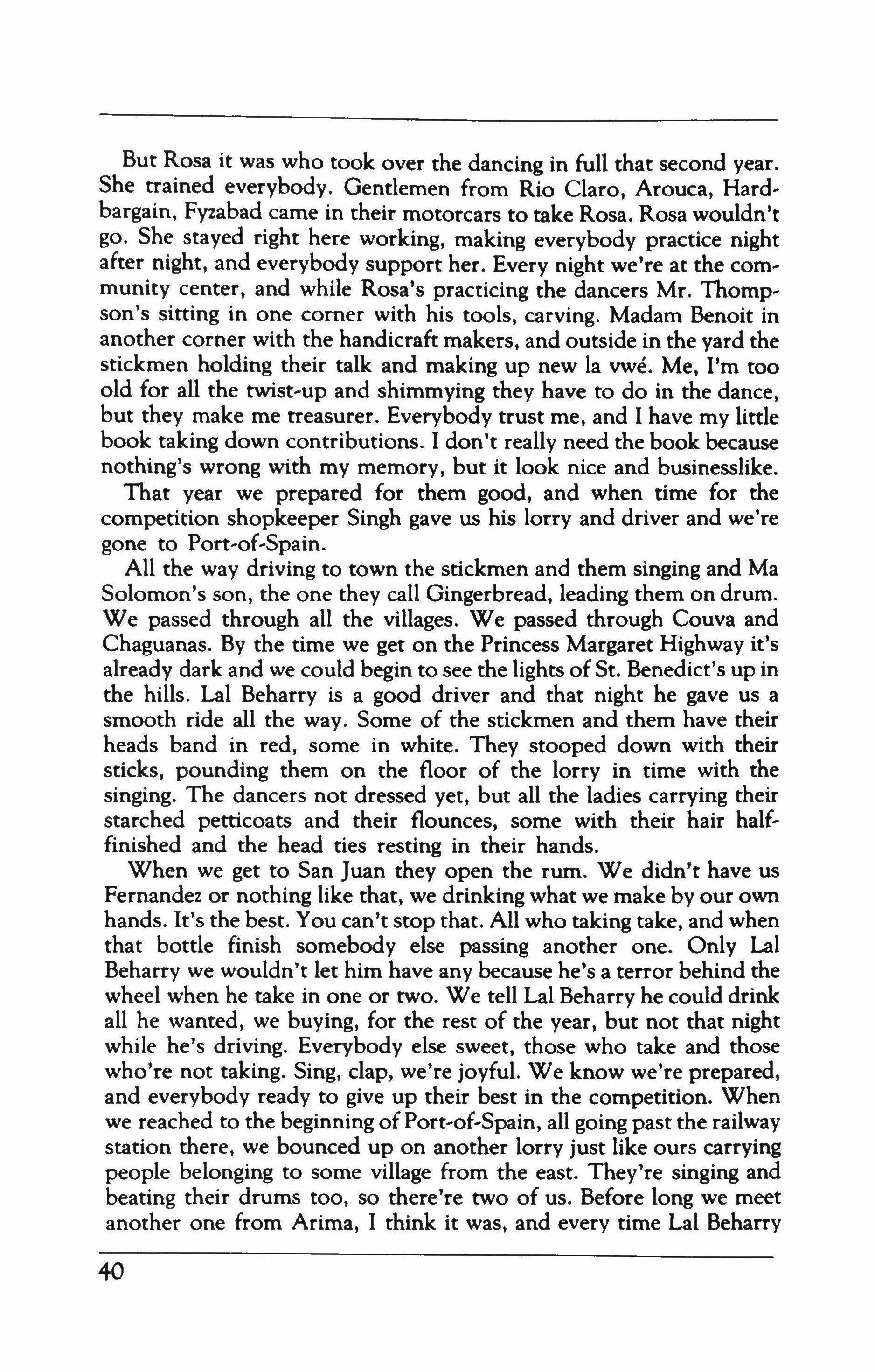
But Rosa it was who took over the dancing in full that second year. She trained everybody. Gentlemen from Rio Claro, Arouca, Hardbargain, Fyzabad came in their motorcars to take Rosa. Rosa wouldn't go. She stayed right here working, making everybody practice night after night, and everybody support her. Every night we're at the community center, and while Rosa's practicing the dancers Mr. Thompson's sitting in one corner with his tools, carving. Madam Benoit in another corner with the handicraft makers, and outside in the yard the stickmen holding their talk and making up new la vwe. Me, I'm too old for all the twist-up and shimmying they have to do in the dance, but they make me treasurer. Everybody trust me, and I have my little book taking down contributions. I don't really need the book because nothing's wrong with my memory, but it look nice and businesslike.
That year we prepared for them good, and when time for the competition shopkeeper Singh gave us his lorry and driver and we're gone to Port-of-Spain.
All the way driving to town the stickmen and them singing and Ma Solomon's son, the one they call Gingerbread, leading them on drum. We passed through all the villages. We passed through Couva and Chaguanas. By the time we get on the Princess Margaret Highway it's already dark and we could begin to see the lights of St. Benedict's up in the hills. Lal Beharry is a good driver and that night he gave us a smooth ride all the way. Some of the stickmen and them have their heads band in red, some in white. They stooped down with their sticks, pounding them on the floor of the lorry in time with the singing. The dancers not dressed yet, but all the ladies carrying their starched petticoats and their flounces, some with their hair halffinished and the head ties resting in their hands.
When we get to San Juan they open the rum. We didn't have us Fernandez or nothing like that, we drinking what we make by our own hands. It's the best. You can't stop that. All who taking take, and when that bottle finish somebody else passing another one. Only Lal Beharry we wouldn't let him have any because he's a terror behind the wheel when he take in one or two. We tell Lal Beharry he could drink all he wanted, we buying, for the rest of the year, but not that night while he's driving. Everybody else sweet, those who take and those who're not taking. Sing, clap, we're joyful. We know we're prepared, and everybody ready to give up their best in the competition. When we reached to the beginning ofPort-of-Spain, all going past the railway station there, we bounced up on another lorry just like ours carrying people belonging to some village from the east. They're singing and beating their drums too, so there're two of us. Before long we meet another one from Arima, I think it was, and every time Lal Beharry
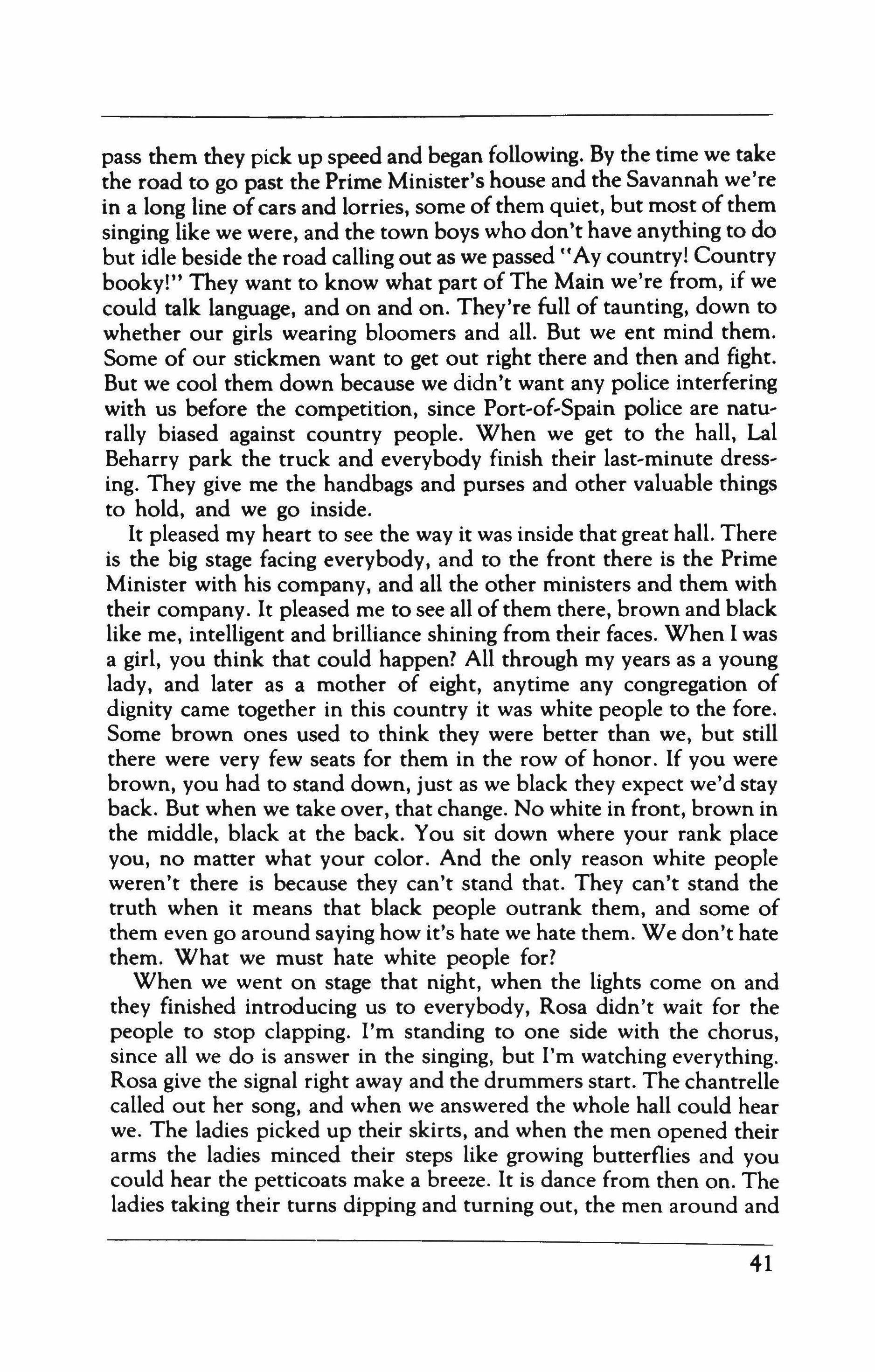
pass them they pick up speed and began following. By the time we take the road to go past the Prime Minister's house and the Savannah we're in a long line of cars and lorries, some of them quiet, but most of them singing like we were, and the town boys who don't have anything to do but idle beside the road calling out as we passed IfAy country! Country booky!" They want to know what part of The Main we're from, if we could talk language, and on and on. They're full of taunting, down to whether our girls wearing bloomers and all. But we ent mind them. Some of our stickmen want to get out right there and then and fight. But we cool them down because we didn't want any police interfering with us before the competition, since Port-of-Spain police are naturally biased against country people. When we get to the hall, Lal Beharry park the truck and everybody finish their last-minute dressing. They give me the handbags and purses and other valuable things to hold, and we go inside.
It pleased my heart to see the way it was inside that great hall. There is the big stage facing everybody, and to the front there is the Prime Minister with his company, and all the other ministers and them with their company. It pleased me to see all of them there, brown and black like me, intelligent and brilliance shining from their faces. When I was a girl, you think that could happen? All through my years as a young lady, and later as a mother of eight, anytime any congregation of dignity came together in this country it was white people to the fore. Some brown ones used to think they were better than we, but still there were very few seats for them in the row of honor. If you were brown, you had to stand down, just as we black they expect we'd stay back. But when we take over, that change. No white in front, brown in the middle, black at the back. You sit down where your rank place you, no matter what your color. And the only reason white people weren't there is because they can't stand that. They can't stand the truth when it means that black people outrank them, and some of them even go around saying how it's hate we hate them. We don't hate them. What we must hate white people for?
When we went on stage that night, when the lights come on and they finished introducing us to everybody, Rosa didn't wait for the people to stop clapping. I'm standing to one side with the chorus, since all we do is answer in the singing, but I'm watching everything. Rosa give the signal right away and the drummers start. The chantrelle called out her song, and when we answered the whole hall could hear we. The ladies picked up their skirts, and when the men opened their arms the ladies minced their steps like growing butterflies and you could hear the petticoats make a breeze. It is dance from then on. The ladies taking their turns dipping and turning out, the men around and
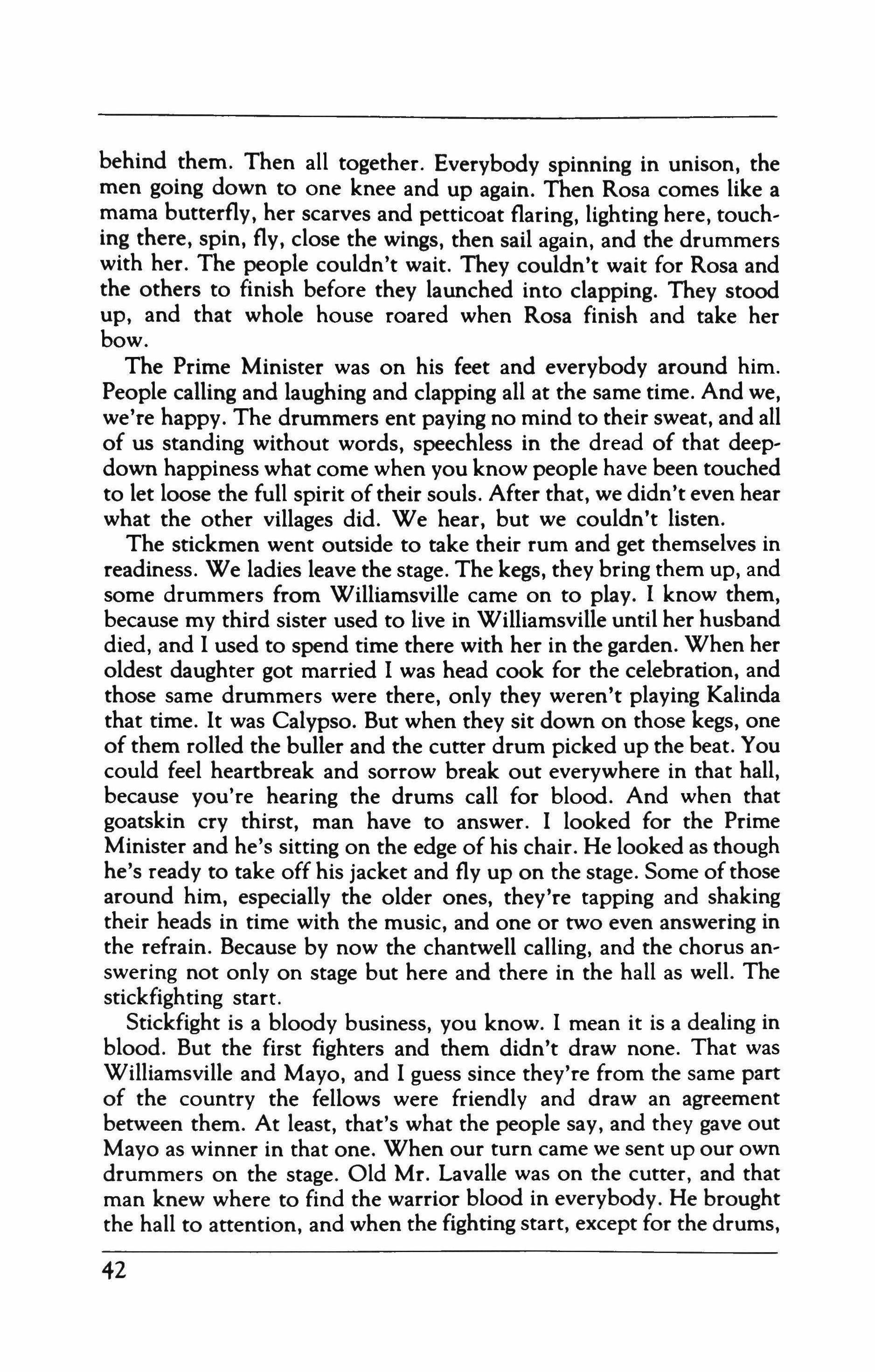
behind them. Then all together. Everybody spinning in unison, the men going down to one knee and up again. Then Rosa comes like a mama butterfly, her scarves and petticoat flaring, lighting here, touching there, spin, fly, close the wings, then sail again, and the drummers with her. The people couldn't wait. They couldn't wait for Rosa and the others to finish before they launched into clapping. They stood up, and that whole house roared when Rosa finish and take her bow.
The Prime Minister was on his feet and everybody around him. People calling and laughing and clapping all at the same time. And we, we're happy. The drummers ent paying no mind to their sweat, and all of us standing without words, speechless in the dread of that deepdown happiness what come when you know people have been touched to let loose the full spirit of their souls. After that, we didn't even hear what the other villages did. We hear, but we couldn't listen.
The stickmen went outside to take their rum and get themselves in readiness. We ladies leave the stage. The kegs, they bring them up, and some drummers from Williamsville came on to play. I know them, because my third sister used to live in Williamsville until her husband died, and I used to spend time there with her in the garden. When her oldest daughter got married I was head cook for the celebration, and those same drummers were there, only they weren't playing Kalinda that time. It was Calypso. But when they sit down on those kegs, one of them rolled the buller and the cutter drum picked up the beat. You could feel heartbreak and sorrow break out everywhere in that hall, because you're hearing the drums call for blood. And when that goatskin cry thirst, man have to answer. I looked for the Prime Minister and he's sitting on the edge of his chair. He looked as though he's ready to take off his jacket and fly up on the stage. Some of those around him, especially the older ones, they're tapping and shaking their heads in time with the music, and one or two even answering in the refrain. Because by now the chantwell calling, and the chorus answering not only on stage but here and there in the hall as well. The stickfighting start.
Stickfight is a bloody business, you know. I mean it is a dealing in blood. But the first fighters and them didn't draw none. That was Williamsville and Mayo, and I guess since they're from the same part of the country the fellows were friendly and draw an agreement between them. At least, that's what the people say, and they gave out Mayo as winner in that one. When our turn came we sent up our own drummers on the stage. Old Mr. Lavalle was on the cutter, and that man knew where to find the warrior blood in everybody. He brought the hall to attention, and when the fighting start, except for the drums,
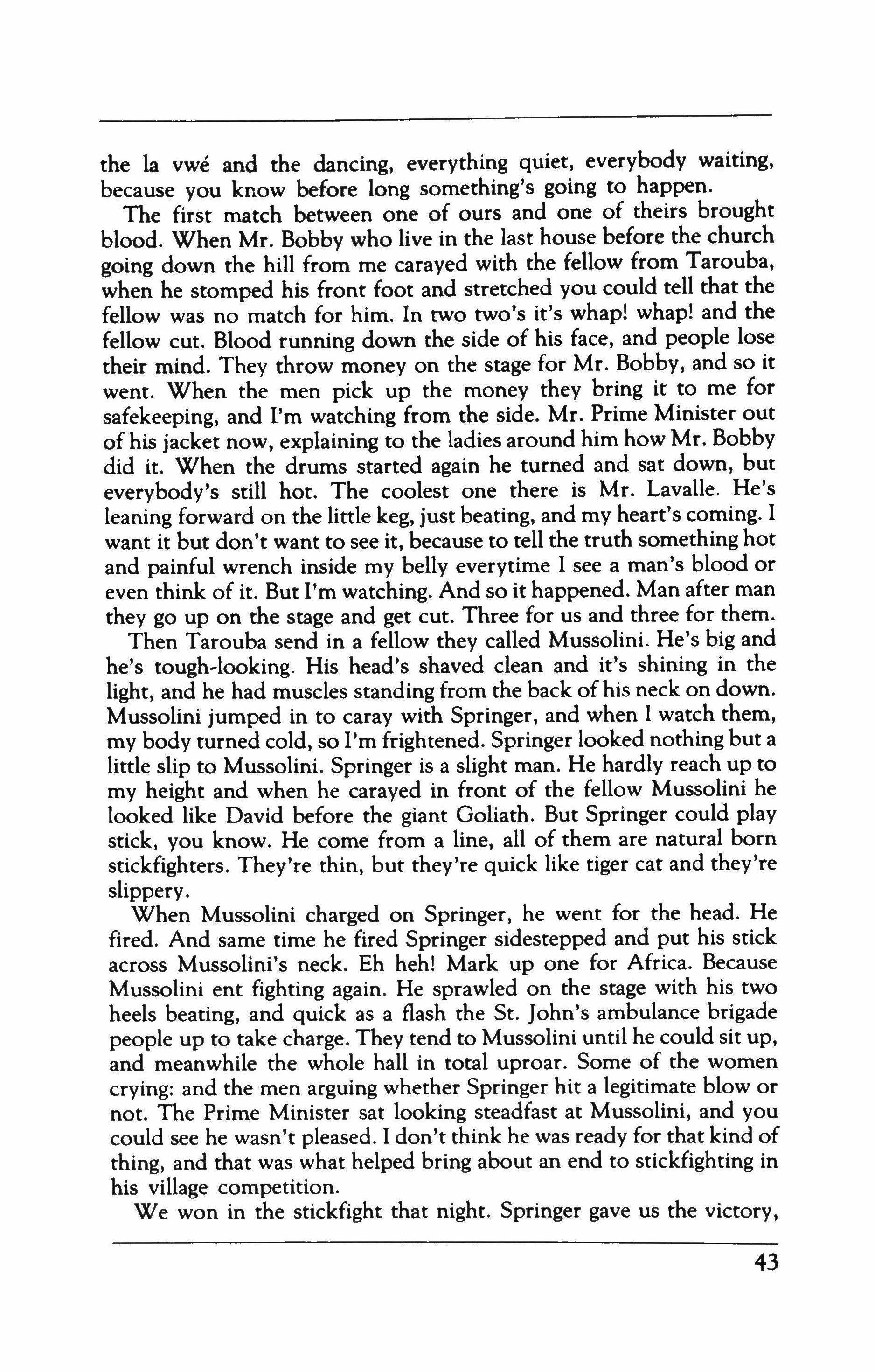
the la vwe and the dancing, everything quiet, everybody waiting, because you know before long something's going to happen.
The first match between one of ours and one of theirs brought blood. When Mr. Bobby who live in the last house before the church going down the hill from me carayed with the fellow from Tarouba, when he stomped his front foot and stretched you could tell that the fellow was no match for him. In two two's it's whap! whap! and the fellow cut. Blood running down the side of his face, and people lose their mind. They throw money on the stage for Mr. Bobby, and so it went. When the men pick up the money they bring it to me for safekeeping, and I'm watching from the side. Mr. Prime Minister out of his jacket now, explaining to the ladies around him how Mr. Bobby did it. When the drums started again he turned and sat down, but everybody's still hot. The coolest one there is Mr. Lavalle. He's leaning forward on the little keg, just beating, and my heart's coming. I want it but don't want to see it, because to tell the truth something hot and painful wrench inside my belly everytime I see a man's blood or even think of it. But I'm watching. And so it happened. Man after man they go up on the stage and get cut. Three for us and three for them.
Then Tarouba send in a fellow they called Mussolini. He's big and he's tough-looking. His head's shaved clean and it's shining in the light, and he had muscles standing from the back of his neck on down. Mussolini jumped in to caray with Springer, and when I watch them, my body turned cold, so I'm frightened. Springer looked nothing but a little slip to Mussolini. Springer is a slight man. He hardly reach up to my height and when he carayed in front of the fellow Mussolini he looked like David before the giant Goliath. But Springer could play stick, you know. He come from a line, all of them are natural born srickfighters. They're thin, but they're quick like tiger cat and they're slippery.
When Mussolini charged on Springer, he went for the head. He fired. And same time he fired Springer sidestepped and put his stick across Mussolini's neck. Eh heh! Mark up one for Africa. Because Mussolini ent fighting again. He sprawled on the stage with his two heels beating, and quick as a flash the St. John's ambulance brigade people up to take charge. They tend to Mussolini until he could sit up, and meanwhile the whole hall in total uproar. Some of the women crying: and the men arguing whether Springer hit a legitimate blow or not. The Prime Minister sat looking steadfast at Mussolini, and you could see he wasn't pleased. I don't think he was ready for that kind of thing, and that was what helped bring about an end to stickfighting in his village competition.
We won in the stickfight that night. Springer gave us the victory,
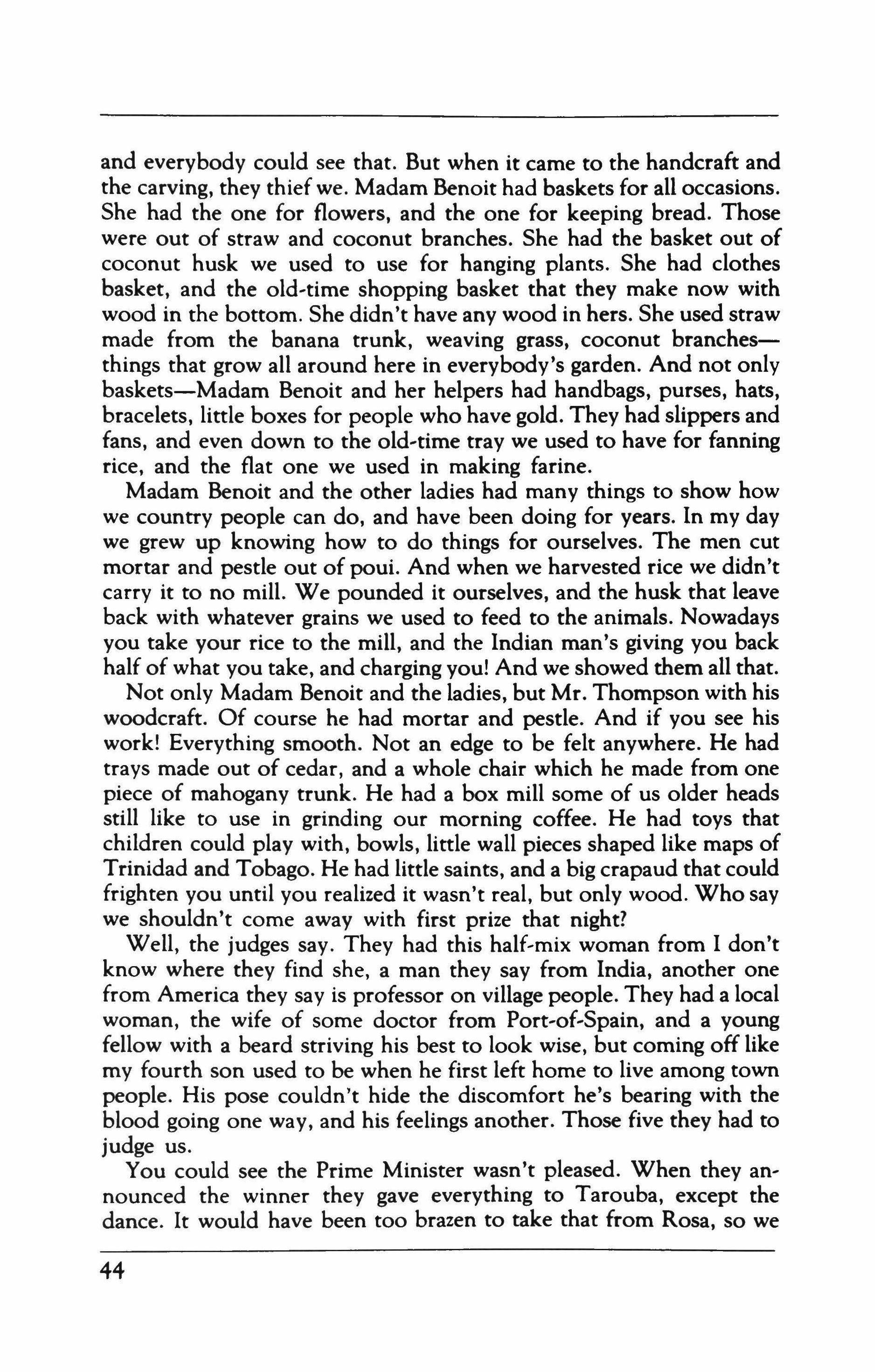
and everybody could see that. But when it came to the handcraft and the carving, they thief we. Madam Benoit had baskets for all occasions. She had the one for flowers, and the one for keeping bread. Those were out of straw and coconut branches. She had the basket out of coconut husk we used to use for hanging plants. She had clothes basket, and the old-time shopping basket that they make now with wood in the bottom. She didn't have any wood in hers. She used straw made from the banana trunk, weaving grass, coconut branchesthings that grow all around here in everybody's garden. And not only baskets-Madam Benoit and her helpers had handbags, purses, hats, bracelets, little boxes for people who have gold. They had slippers and fans, and even down to the old-time tray we used to have for fanning rice, and the flat one we used in making farine.
Madam Benoit and the other ladies had many things to show how we country people can do, and have been doing for years. In my day we grew up knowing how to do things for ourselves. The men cut mortar and pestle out of poui. And when we harvested rice we didn't carry it to no mill. We pounded it ourselves, and the husk that leave back with whatever grains we used to feed to the animals. Nowadays you take your rice to the mill, and the Indian man's giving you back half of what you take, and charging you! And we showed them all that.
Not only Madam Benoit and the ladies, but Mr. Thompson with his woodcraft. Of course he had mortar and pestle. And if you see his work! Everything smooth. Not an edge to be felt anywhere. He had trays made out of cedar, and a whole chair which he made from one piece of mahogany trunk. He had a box mill some of us older heads still like to use in grinding our morning coffee. He had toys that children could play with, bowls, little wall pieces shaped like maps of Trinidad and Tobago. He had little saints, and a big crapaud that could frighten you until you realized it wasn't real, but only wood. Who say we shouldn't come away with first prize that night?
Well, the judges say. They had this half-mix woman from I don't know where they find she, a man they say from India, another one from America they say is professor on village people. They had a local woman, the wife of some doctor from Port-of-Spain, and a young fellow with a beard striving his best to look wise, but coming off like my fourth son used to be when he first left home to live among town people. His pose couldn't hide the discomfort he's bearing with the blood going one way, and his feelings another. Those five they had to judge us.
You could see the Prime Minister wasn't pleased. When they announced the winner they gave everything to Tarouba, except the dance. It would have been too brazen to take that from Rosa, so we

won in that. But for the stickfight, they say Springer hit an unlawful blow and that disqualified him, so we lost that. And for the handcraft, they didn't like our baskets because, they say, they were too rough. We had handmade roses with leaf-stern decorating ours, but that wasn't good enough. The other village had plastic. They had plastic in red, white, and blue that they cut up in stripes to weave their baskets. It look nice, but where you ever hear about plastic growing in any village here in Trinidad? Some people in the crowd gave out boos, and you could see the Prime Minister wasn't too pleased.
In the wood carving, they say Mr. Thompson's chair was too stiff and didn't have the right varnish. The furniture that won look like anything you could buy from some store in Port-of-Spain, and none of that ent make in this country. Japan, Korea, America, that's where that shining furniture come from. And it always fragile when you match it with your own that we make here. You can't use it hard. It not make for people like we. We thought they wanted to see what people here could do with their own hands. With their wit and their talent. But they didn't want that. They say Mr. Thompson's chair was too hard. They say his coffee mill wasn't shining enough. They didn't even try it to see how he made the screw and handle and everything to work. They say our baskets and handbags too coarse. They say Springer's stick was too dangerous. And so they gave the grand prize to Tarouba. They didn't even give us second. They gave that to Williamsville because they had plastic baskets too. They marked us third.
The Prime Minister didn't like it. He didn't like it at all, but what could he do? When they made the announcement you see he gave a slight applause. He gave one or two claps but there wasn't any joy in his clapping. They rushed police men up on the stage then, and others came to guard the Prime Minister and the judges' box. They behaved as though we were going to fight them. And some of our stickmen were hot, but we ladies knew better than to let them get themselves in trouble.
On the way back home we were an unhappy people. I gave every' body back their belongings, and we finish the rum. While we're drinking, everyone talking over and over again, how such a thing could happen. They thief we. Some of us tried to console Madam Benoit, Mr. Thompson, and the others who'd worked so hard. "What you gon do?" I said.
"Never me again," Mr. Thompson said. "They could have village competition with money and love for prize, never me again."
"You shouldn't say that," I answered, "because it is still our country."
"Who country?" It would've been better if Madam Benoit was hot.
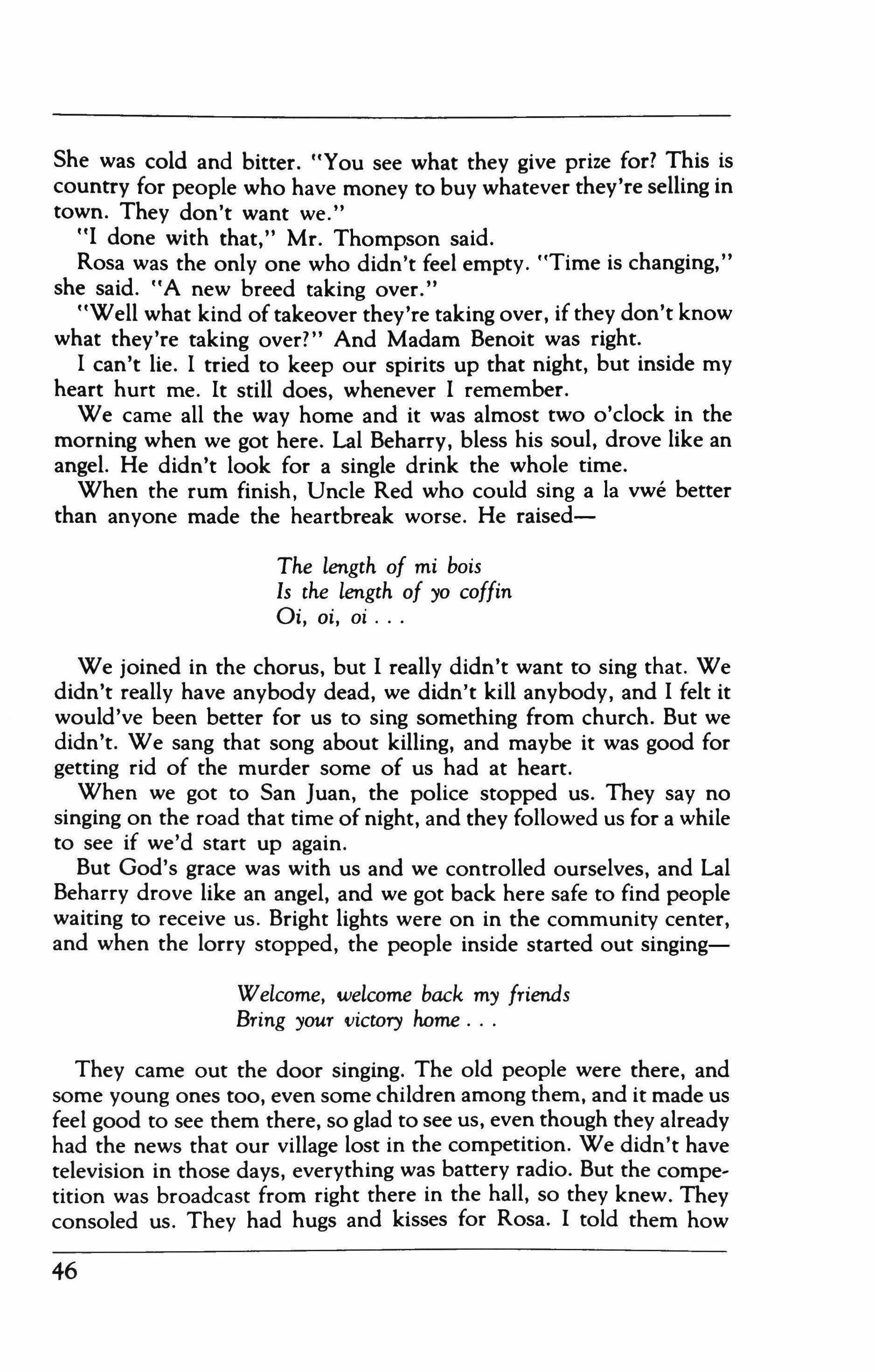
She was cold and bitter. "You see what they give prize for? This is country for people who have money to buy whatever they're selling in town. They don't want we."
"I done with that," Mr. Thompson said.
Rosa was the only one who didn't feel empty. "Time is changing," she said. "A new breed taking over."
"Well what kind of takeover they're taking over, if they don't know what they're taking over?" And Madam Benoit was right.
I can't lie. I tried to keep our spirits up that night, but inside my heart hurt me. It still does, whenever I remember.
We came all the way home and it was almost two o'clock in the morning when we got here. Lal Beharry, bless his soul, drove like an angel. He didn't look for a single drink the whole time.
When the rum finish, Uncle Red who could sing a la vwe better than anyone made the heartbreak worse. He raised-
The length of mi bois Is the length of yo coffin Oi, oi, oi
We joined in the chorus, but I really didn't want to sing that. We didn't really have anybody dead, we didn't kill anybody, and I felt it would've been better for us to sing something from church. But we didn't. We sang that song about killing, and maybe it was good for getting rid of the murder some of us had at heart.
When we got to San Juan, the police stopped us. They say no singing on the road that time of night, and they followed us for a while to see if we'd start up again.
But God's grace was with us and we controlled ourselves, and Lal Beharry drove like an angel, and we got back here safe to find people waiting to receive us. Bright lights were on in the community center, and when the lorry stopped, the people inside started out singing-
Welcome, welcome back my friends
Bring your victory home
They came out the door singing. The old people were there, and some young ones too, even some children among them, and it made us feel good to see them there, so glad to see us, even though they already had the news that our village lost in the competition. We didn't have television in those days, everything was battery radio. But the competition was broadcast from right there in the hall, so they knew. They consoled us. They had hugs and kisses for Rosa. I told them how
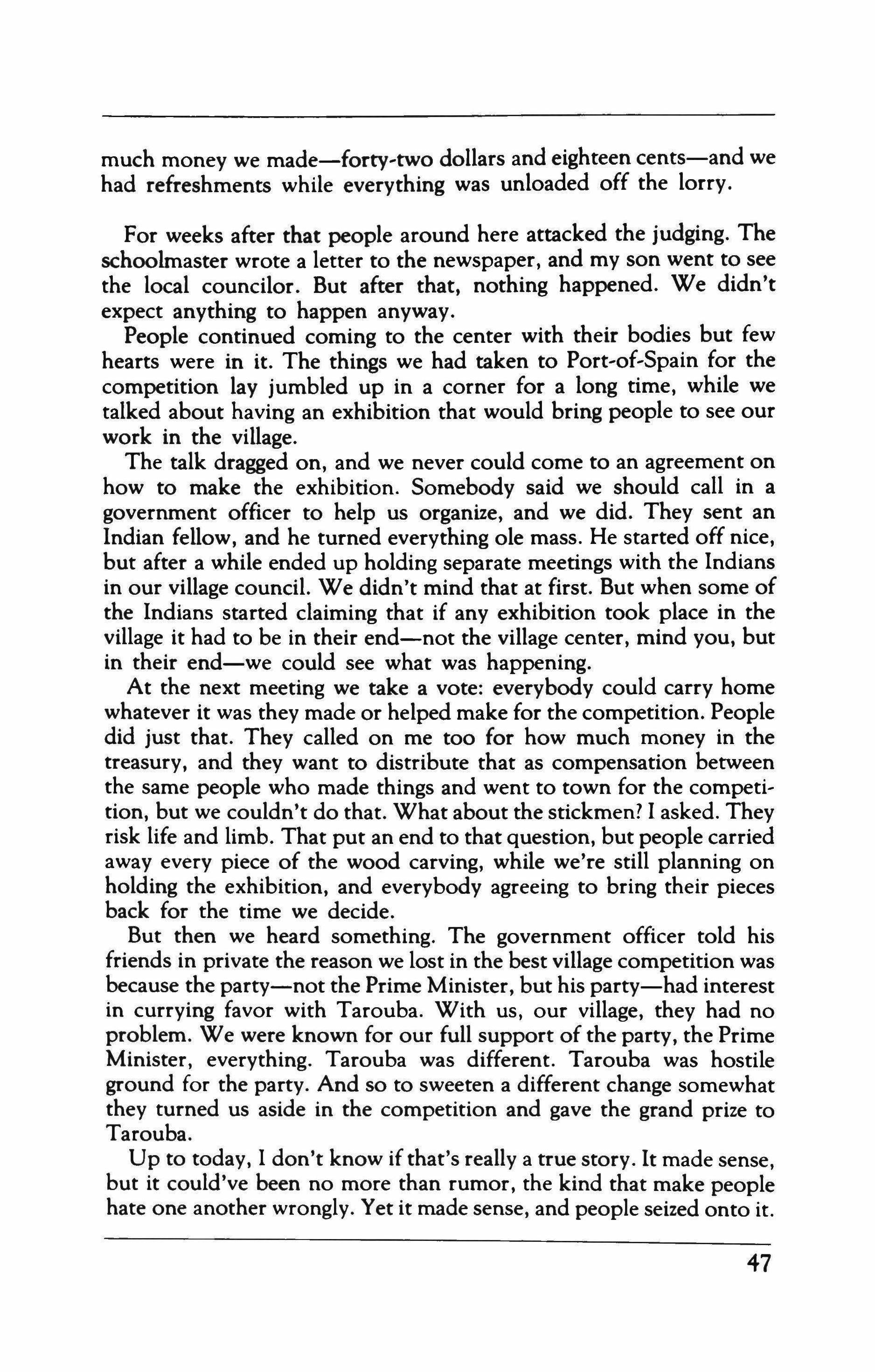
much money we made-s-fortv-rwo dollars and eighteen cents-and we had refreshments while everything was unloaded off the lorry.
For weeks after that people around here attacked the judging. The schoolmaster wrote a letter to the newspaper, and my son went to see the local councilor. But after that, nothing happened. We didn't expect anything to happen anyway.
People continued coming to the center with their bodies but few hearts were in it. The things we had taken to Port-of-Spain for the competition lay jumbled up in a corner for a long time, while we talked about having an exhibition that would bring people to see our work in the village.
The talk dragged on, and we never could come to an agreement on how to make the exhibition. Somebody said we should call in a government officer to help us organize, and we did. They sent an Indian fellow, and he turned everything ole mass. He started off nice, but after a while ended up holding separate meetings with the Indians in our village council. We didn't mind that at first. But when some of the Indians started claiming that if any exhibition took place in the village it had to be in their end-not the village center, mind you, but in their end-we could see what was happening.
At the next meeting we take a vote: everybody could carry home whatever it was they made or helped make for the competition. People did just that. They called on me too for how much money in the treasury, and they want to distribute that as compensation between the same people who made things and went to town for the competition, but we couldn't do that. What about the stickmen? I asked. They risk life and limb. That put an end to that question, but people carried away every piece of the wood carving, while we're still planning on holding the exhibition, and everybody agreeing to bring their pieces back for the time we decide.
But then we heard something. The government officer told his friends in private the reason we lost in the best village competition was because the party-not the Prime Minister, but his party-had interest in currying favor with Tarouba. With us, our village, they had no problem. We were known for our full support of the party, the Prime Minister, everything. Tarouba was different. Tarouba was hostile ground for the party. And so to sweeten a different change somewhat they turned us aside in the competition and gave the grand prize to Tarouba.
Up to today, I don't know if that's really a true story. It made sense, but it could've been no more than rumor, the kind that make people hate one another wrongly. Yet it made sense, and people seized onto it.
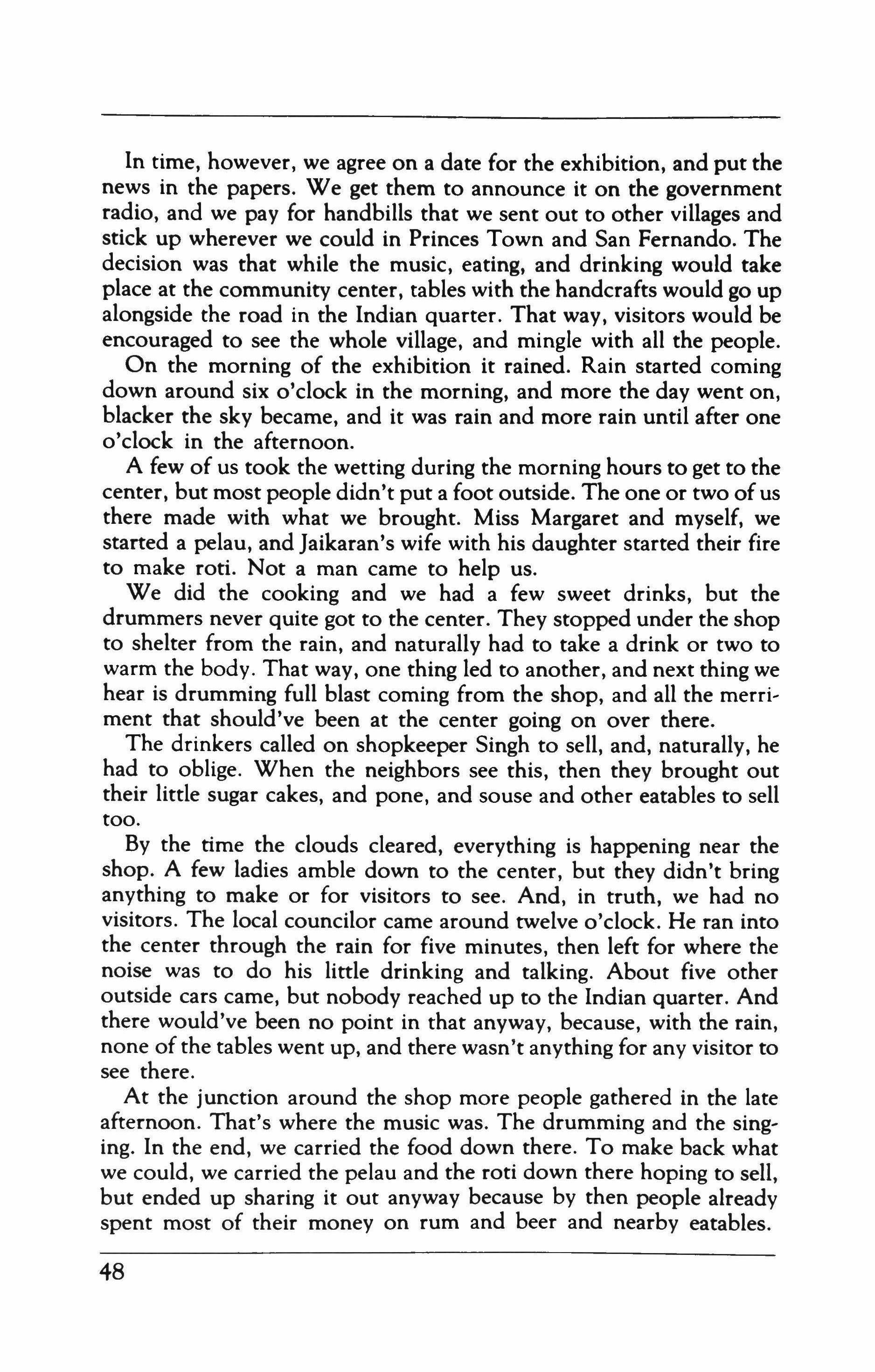
In time, however, we agree on a date for the exhibition, and put the news in the papers. We get them to announce it on the government radio, and we pay for handbills that we sent out to other villages and stick up wherever we could in Princes Town and San Fernando. The decision was that while the music, eating, and drinking would take place at the community center, tables with the handcrafts would go up alongside the road in the Indian quarter. That way, visitors would be encouraged to see the whole village, and mingle with all the people.
On the morning of the exhibition it rained. Rain started coming down around six o'clock in the morning, and more the day went on, blacker the sky became, and it was rain and more rain until after one o'clock in the afternoon.
A few of us took the wetting during the morning hours to get to the center, but most people didn't put a foot outside. The one or two of us there made with what we brought. Miss Margaret and myself, we started a pelau, and ]aikaran's wife with his daughter started their fire to make roti. Not a man came to help us.
We did the cooking and we had a few sweet drinks, but the drummers never quite got to the center. They stopped under the shop to shelter from the rain, and naturally had to take a drink or two to warm the body. That way, one thing led to another, and next thing we hear is drumming full blast coming from the shop, and all the rnerriment that should've been at the center going on over there.
The drinkers called on shopkeeper Singh to sell, and, naturally, he had to oblige. When the neighbors see this, then they brought out their little sugar cakes, and pone, and souse and other eatables to sell too.
By the time the clouds cleared, everything is happening near the shop. A few ladies amble down to the center, but they didn't bring anything to make or for visitors to see. And, in truth, we had no visitors. The local councilor came around twelve o'clock. He ran into the center through the rain for five minutes, then left for where the noise was to do his little drinking and talking. About five other outside cars came, but nobody reached up to the Indian quarter. And there would've been no point in that anyway, because, with the rain, none of the tables went up, and there wasn't anything for any visitor to see there.
At the junction around the shop more people gathered in the late afternoon. That's where the music was. The drumming and the singing. In the end, we carried the food down there. To make back what we could, we carried the pelau and the roti down there hoping to sell, but ended up sharing it out anyway because by then people already spent most of their money on rum and beer and nearby eatables.

And it wasn't long after we carried our trays down there that the police sergeant came. He and a constable. They wanted to know, did the men have a permit to beat drum on the road. To tell the truth, nobody even thought about that until the police came. We're an independent country. We ent thinking about permit to play we own music-that was for old-time days when white people couldn't stand to hear our drums and singing. They still can't. But they're gone now, so why we should have to get permit?
But the police and them only looking for a little grease-hand. Some of the men talked with them, and soon one or two ladies brought eggs and put in their car. Who had zaboca brought a few and put in their car. They get yam and green fig. Mr. Manny promised next time he went hunting he'd bring a manicou and pass by the station. The police get in their car and drive off. But what spirit it was that they interrupted, the whole thing break.
People start arguing whose fault it was the police had to come in the first place. Some vex because more visitors didn't come to the village, and they start accusing.
"What're they coming to see?" Mr. Benoit shout out. "What're they coming here for? You have something to show visitors? And even if you have something you think they're interested in that? All yuh village people too damn stupid."
"And who is you? Who is you?" Madam Zell shout back. "Where your mother get you? You think you ent country people too? You don't have no right opening your mouth to call people stupid. I come out of mi house to have a good time-not for you to be calling me stupid."
"You're stupid, yes! Damn stupid!" Mr. Benoit disrespected himself. "Serious business happening here-you think this ent serious? This showing you the whole business about government and what kind of people ruling Trinidad, and all you want is a good time."
"Aiel That's mi wife yo bawling at!" But Mr. Benoit didn't even hear Bajan Prince call out.
Prince and Madam Zell, they don't have any children. But you never see them one without the other. In their garden, going to church, going to town to do market, always it's two of them together. She belongs to here, but Prince was a newcomer to the village then. Her family never took part in the council, nor anything like that. They work hard, but they were a people onto themselves. Nobody knows how Bajan Prince got in with them. He's a little man who likes to stay pretty much to himself too, but he's hot-blooded.
"Aie!" Prince called out. "Aie, that's mi wife!"
But Mr. Benoit didn't hear him. Good time belong in your

bed, or go down under the tamarind tree " Mr. Benoit went on, "This is serious business. All yuh can't see? Village people dead in this country. They don't give a damn about we Mr. Benoit letting go everything he has penned up inside him, but with the little drink she had in her Madam Zell didn't care.
"You vex because I never went under no tamarind tree with you," she called back, and everybody laughed. Everybody around these two now. It's drama. "You never get, and you don't have none to get," said Madam Zell, as she turn and show her backside in Mr. Benoit's face.
"That rotten thing you have?" he called back. "Dog don't want that
I always say woman shouldn't curse with man because men have too many hurtful things they can say against us. And Mr. Benoit knew most of them. He shamed himself saying things about Madam Zell, but not for long.
Right then when he's giving it to her, and the crowd is laughing, Prince rushed forward and cuffed him in his mouth. That was what the crowd wanted.
Fighting break out right and left, with everybody scuffling. Prince and Madam Zell trying to put Mr. Benoit on the ground, one or two trying to part them, and others looking for neighbors they don't like or have a grudge against and cuffing them or butting.
Some of the older heads, with Jaikaran and Boodoosingh from the council, wrestling to part people and bring them to their senses. Then Mr. Manny told the drummers to play. "Play!" he said. "Play!" And he tried to raise a kaiso. Nobody much paid any attention to his singing, but the drumming cooled things down after a while and those who had to go home left, while others still there arguing, and nobody with money, so we gave away the food because when people're eating, they don't have time for fighting.
That was a day! Neighbors dredging longtime hatreds, and cursing one another face to face! It looked so bad, I felt shamed to the bottom of my heart.
As for the village council, people dropped off one by one after that day, so that in a little while the government officer didn't have anybody to talk to.
All weekly meetings stopped.
The young boys took over the center then, and started carrying on their idleness there-with the young girls who couldn't calm their weakness, and their tampi, and their slack talk. When it was time to brush the yard, they wouldn't do it. They didn't build any center, they said, and didn't see why they should have to care for it.
Meanwhile the ladies carried home all the things they had brought

in for doing handcraft and different kinds of baking. We had a pitchoil stove. One night it disappeared. We had a sewing machine-same thing. The drums that Mr. Robinson had made special for the center, they walked. Then somebody came and took off a window.
Well, you see what we have left. The galvanize is gone. The cement floor and the few bricks we had to the front are still standing. They're holding up the wild vines, and giving shelter to the crapauds and scorpions. I hear an Indian man sleeps there at night, but I don't pass there night or day if I could help it.
I still have money keeping for the council. I have eighteen dollars and fiftv-seven cents that belong to the council. But nobody can't claim it because there is no council.
As for the Prime Minister Better Village Competition, I sit here in my house and watch it on television sometimes. They don't have the crafts and stickfighting anymore. And what dancing there is is watered down with everybody doing the same thing again and again. That's to be expected, I guess, since it's not village people doing things for themselves, but the government paying young people to go around and show villagers how to behave on stage.
Now and then when Madam Benoit or Tan Rosa pass in, we remember those past times. We look at the young people today, how they walk so aimless, and we have a promise: when one of us dies, whoever's left behind will see to it a proper bongo takes place. I want good dancing, with qua qua and drum and whatever else people want to play. I want strong singing. Village life may be going, but it ent dead yet.

Who nowadays ever leaves behind more than a vague shadow, tying its shoes, bent over, leg propped on the base of a water pump, in the middle of Paris? The ancients conceived of the inhabitants of Hades as if figures in a photograph of Daguerre's: one could recognize them but not touch their flesh. But Hades vanished when belief disappeared, and only returned with technology, atomized since the invention of the mercury-plate into countless photos, which diffuse upon the beholder some of that same melancholy for which once it seemed necessary to make a visit to hell.
A short movie, in a style like Polanski's, shows us a man-peaceable, contented, with a nice house, a wife and children, several Carrasius auratus L. (goldfish)-who goes out for some air. The house is surrounded by a meadow of brightly colored flowers. There is a path, and the man ambles along it, now and then shading his eyes with his hand so as to get a better view of the bright summer day. After a while he turns around and looks at his house behind him, with his family, Carrasius auratus L., furniture, carpets, books, knickknacks of wood and porcelain ("Drink from this cup, / And things will look up"); and then, suddenly, an enormous black wave rolls down from behind and crashes over house and meadow. It stops short of the man, slows down fifty or sixty yards in front of him, and flows back at the same rate at which it came. The earth is still sprinkled with flowers, only
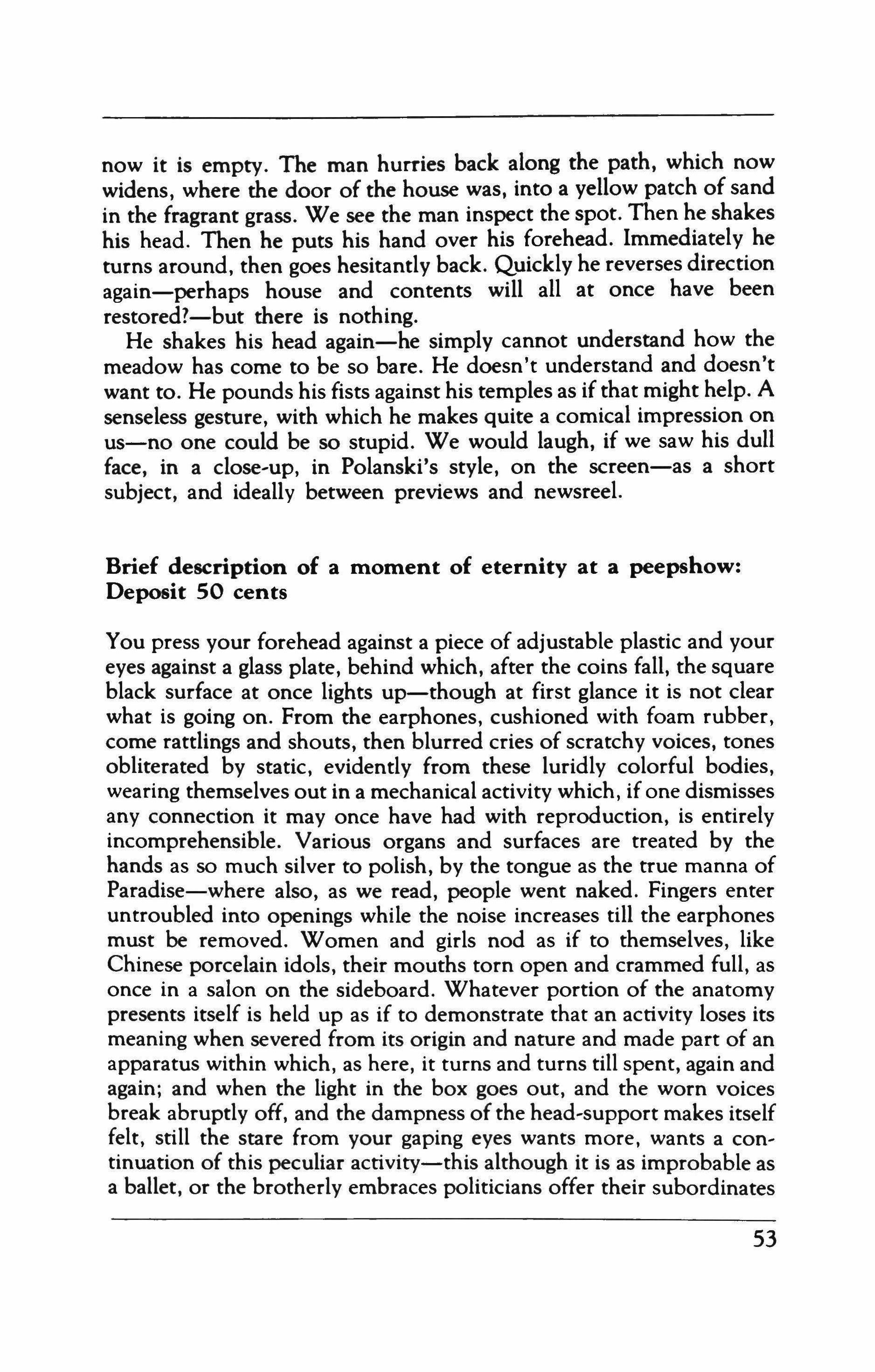
now it is empty. The man hurries back along the path, which now widens, where the door of the house was, into a yellow patch of sand in the fragrant grass. We see the man inspect the spot. Then he shakes his head. Then he puts his hand over his forehead. Immediately he turns around, then goes hesitantly back. Quickly he reverses direction again-perhaps house and contents will all at once have been restored?-but there is nothing. He shakes his head again-he simply cannot understand how the meadow has come to be so bare. He doesn't understand and doesn't want to. He pounds his fists against his temples as if that might help. A senseless gesture, with which he makes quite a comical impression on us-no one could be so stupid. We would laugh, if we saw his dull face, in a close-up, in Polanski's style, on the screen-as a short subject, and ideally between previews and newsreel.
Brief description of a moment of eternity at a peepshow: Deposit 50 cents
You press your forehead against a piece of adjustable plastic and your eyes against a glass plate, behind which, after the coins fall, the square black surface at once lights up-though at first glance it is not clear what is going on. From the earphones, cushioned with foam rubber, come rattlings and shouts, then blurred cries of scratchy voices, tones obliterated by static, evidently from these luridly colorful bodies, wearing themselves out in a mechanical activity which, if one dismisses any connection it may once have had with reproduction, is entirely incomprehensible. Various organs and surfaces are treated by the hands as so much silver to polish, by the tongue as the true manna of Paradise-where also, as we read, people went naked. Fingers enter untroubled into openings while the noise increases till the earphones must be removed. Women and girls nod as if to themselves, like Chinese porcelain idols, their mouths torn open and crammed full, as once in a salon on the sideboard. Whatever portion of the anatomy presents itself is held up as if to demonstrate that an activity loses its meaning when severed from its origin and nature and made part of an apparatus within which, as here, it turns and turns till spent, again and again; and when the light in the box goes out, and the worn voices break abruptly off, and the dampness ofthe head-support makes itself felt, still the stare from your gaping eyes wants more, wants a continuation of this peculiar activity-this although it is as improbable as a ballet, or the brotherly embraces politicians offer their subordinates

and each other. What is lacking is such truth as could impinge on the viewer, as could effect a lasting intoxication-for only truth can corrupt and poison. But here there is no durability, no eternity-that tough, indestructible substance, unremarked by the human figures standing before these instruments, which unceasingly reveal their inward parts, but which give you nothing to surpass in value the coins they have gobbled from your hands.
All true pain (and seldom do words like pain and truth correspond so) is the pain of insoluble contradiction. The book I would write, the allembracing total book, can never be written.
In its preliminary stage, its almost unthinkably long captivity, it consists only of intimations, withering memories, wavering images, which like everything thought or thinkable cannot be retained, but melt and resolve into moods. Their edges are blurred, their content sentimental and hypothetical-like the image of an old Berlin street, old less in historical fact than in a process, already long underway, of unconsciously reabsorbing lived experience. Imagine, say, the Auguststrasse, which you entered from the Oranienburgerstrasse, and in which, as it happens, the former New Synagogue now leads the life of an obscure ruin, giving no hint of the role it would play in my unwritten book, which would not at all be this role of a crumbling memorial, ignored for decades by my compatriots' faulty memoriesindeed, it is to their forgetfulness that the book would be dedicated. But the image of the Auguststrasse, like that of other streets, alleys, squares, is not at all identical with the actual Auguststrasse, the Auguststrasse of today, which indeed provides little more aid to the evocation of its image than does the printed sentence to the fantasy of a reader. My unwritten book-and this is one of the reasons for its remaining unwritten-would mean the retrospective sublation of the past, in the literal no less than in the Hegelian sense. I do not claim that what was has actually been. In my book, this city-of which Adalbert von Chamisso writes to a friend from Talcaguano, in Chile, "Berlin is my home and the omphalos of my world, which I,like the oblique foot of a compass, left in my wanderings in order to return to it"-would necessarily appear fully remade-not restored like a monument, but returned to its original condition, unharmed, and entire. Perhaps the strangely narrow Stallschreiberstrasse, the labyrinthine character of which proclaimed itself in its close, crooked inner courts, in which

every brick was saturated with the gazes of generations, and in which taxidermists boldly solicited the passersby, offering to transform their dead pinschers, ratters, terriers of all sorts, at their former owners' requests, to souvenirs of their own existence, the air blown about with numbing scents, camphor and rot, the taxidermists busy with sharp knives over bare bones in show windows, unacknowledged descendants of the Egyptian priesthood; perhaps other places in other streets, like the musty cellar-shops in the Wrangelstrasse in the Kreuzberg, the charms of which were only revealed when you stepped into their woefully ill-lit depths, and the owners brought out surprising treasures from unsuspected recesses, hidden catacombs; antique weapons, newspapers and journals somewhat less antique, historical detritus just past being contemporary. Each of these areas would recover, through its rebirth in my book, not only its hereditary place but also its unmistakable being. So also with all the ugly brick churches: St. Peter's in the Gertraudenstrasse, mentioned as early as 1285, the tallest in all Berlin; Jerusalem Church on the Lindenstrasse, Trinity on the Mauerstrasse near Checkpoint Charlie and, nearby, the Bethlehem Church of the exiled Bohemian Lutherans. So also with houses where Berlin notables lived-though most, given the local customs, were born elsewhereChamisso, 235 Friedrichstrasse; Daniel Chodowiecki, 31 Behrenstrasse; Hegel, 4a Kupfergraben; Alexander von Humboldt, 67 on the Oranienburgerstrasse mentioned above; Heinrich von Kleist, 58 Mauerstrasse; Ludwig Tieck, 1 Rossstrasse; at 6a Pariser-Platz, the composer Meyerbeer-houses on houses, in the "Cops' Corner" and on am Krogel, in the Scheunenviertel and on Alt-Stralau, on the Kleine Alexanderstrasse or behind the Silesian Station, underworld, middle world, so lit by a vanished sun that the hand of the reader of this unwritten book of mine would feel the warmth of it on the porous mortar, and would feel drawn to wander further, out to the green and silent streets of the New West, where one never expected to encounter a living soul, a region apparently extinct, in which life seemed incarnated only in villas of a Buddha-like contemplativeness, though from the unmoving windows glances followed the passerby, who sensed them-then further, to the more scattered and solitary buildings, set hopefully in what was almost country, forerunners of the city awaiting its coming, though the city could no longer find the strength to extend past its own periphery, exhausted with the exhaustion of history, worn down by events that in my book would not have happened.
But this architectural repristination, so to speak, would only be the basis, the syntax, by which all the rest would be expressed, all that
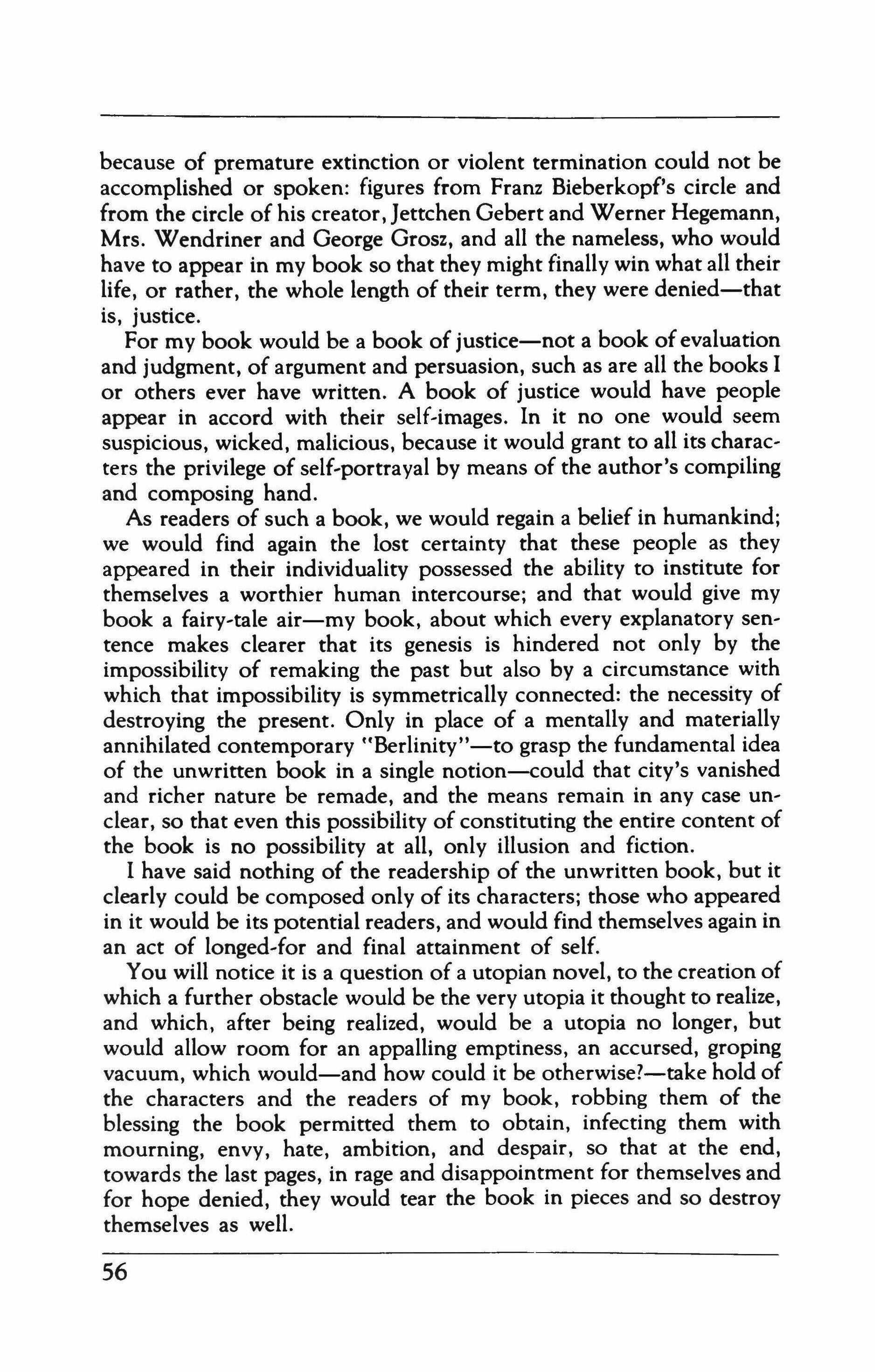
because of premature extinction or violent termination could not be accomplished or spoken: figures from Franz Bieberkopf's circle and from the circle of his creator, Jettchen Gebert and Werner Hegemann, Mrs. Wendriner and George Grosz, and all the nameless, who would have to appear in my book so that they might finally win what all their life, or rather, the whole length of their term, they were denied-that is, justice.
For my book would be a book of justice-not a book ofevaluation and judgment, of argument and persuasion, such as are all the books I or others ever have written. A book of justice would have people appear in accord with their self-images. In it no one would seem suspicious, wicked, malicious, because it would grant to all its characters the privilege of self-portrayal by means of the author's compiling and composing hand.
As readers of such a book, we would regain a belief in humankind; we would find again the lost certainty that these people as they appeared in their individuality possessed the ability to institute for themselves a worthier human intercourse; and that would give my book a fairy-tale air-my book, about which every explanatory sen, tence makes clearer that its genesis is hindered not only by the impossibility of remaking the past but also by a circumstance with which that impossibility is symmetrically connected: the necessity of destroying the present. Only in place of a mentally and materially annihilated contemporary "Berlinity"-to grasp the fundamental idea of the unwritten book in a single notion-could that city's vanished and richer nature be remade, and the means remain in any case unclear, so that even this possibility of constituting the entire content of the book is no possibility at all, only illusion and fiction.
I have said nothing of the readership of the unwritten book, but it clearly could be composed only of its characters; those who appeared in it would be its potential readers, and would find themselves again in an act of longed-for and final attainment of self.
You will notice it is a question of a utopian novel, to the creation of which a further obstacle would be the very utopia it thought to realize, and which, after being realized, would be a utopia no longer, but would allow room for an appalling emptiness, an accursed, groping vacuum, which would-and how could it be otherwise?-take hold of the characters and the readers of my book, robbing them of the blessing the book permitted them to obtain, infecting them with mourning, envy, hate, ambition, and despair, so that at the end, towards the last pages, in rage and disappointment for themselves and for hope denied, they would tear the book in pieces and so destroy themselves as well.
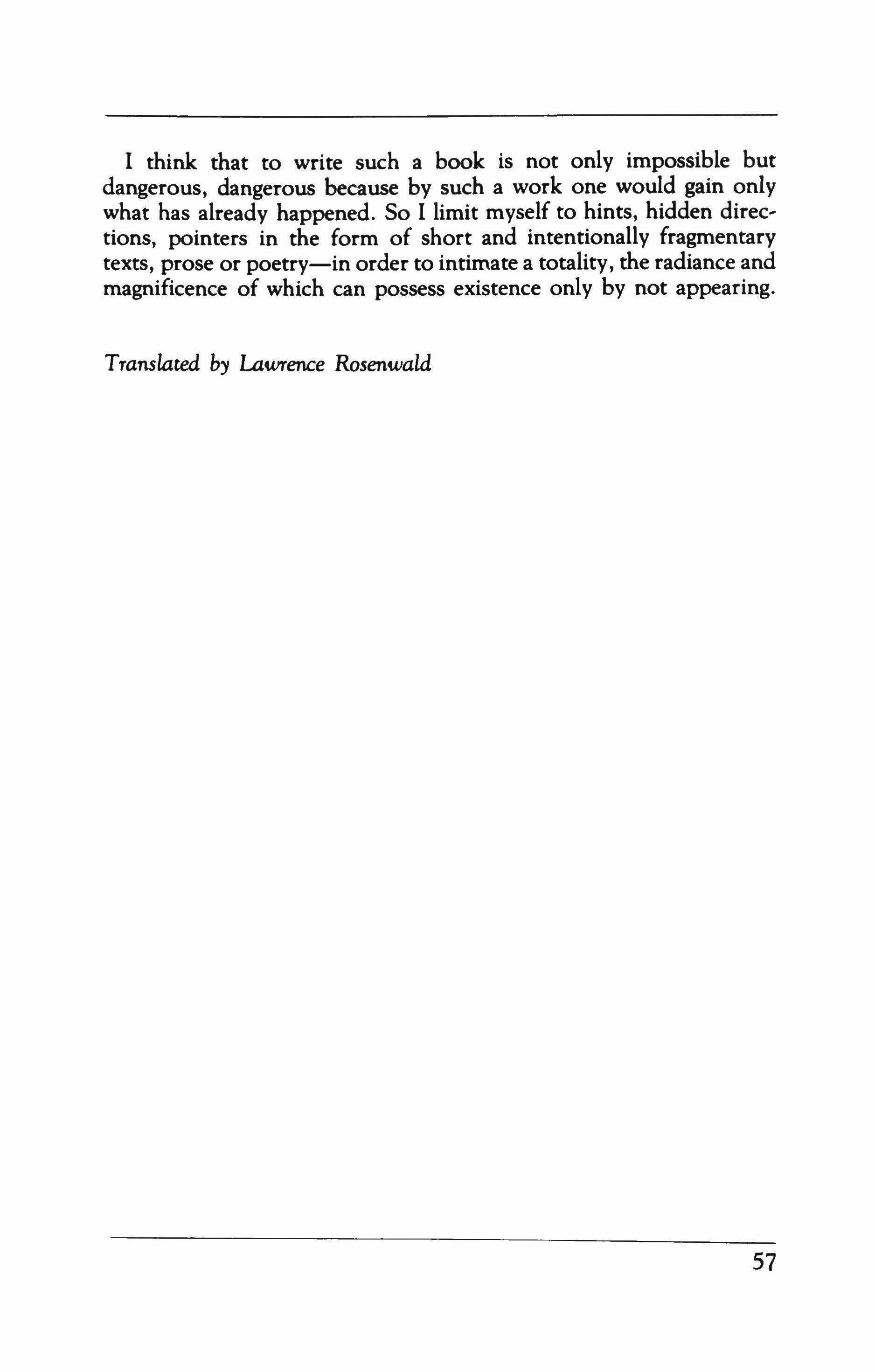
I think that to write such a book is not only impossible but dangerous, dangerous because by such a work one would gain only what has already happened. So I limit myself to hints, hidden directions, pointers in the form of short and intentionally fragmentary texts, prose or poetry-in order to intimate a totality, the radiance and magnificence of which can possess existence only by not appearing.
Translated by Lawrence Rosenwald
In Abruzzi there are only two seasons, summer and winter. Spring is snowy and windy, like winter, and autumn is hot and clear, like summer. Summer begins in June and ends in November. The long, sunny days among the low, dry hills end, and the winter begins. The people stop living in the streets then, and the young men disappear from the church steps. In the village I have in mind, almost all of the men disappeared after the last harvest; they left to work in Terni, Suimona Rome. It was a village of masons. Some of the houses were gracefully built, with terraces and colonnades, like little villas, and one was amazed to find, upon entering them, huge, dark kitchens hung with hams, and vast, squalid, bare rooms. The fire was laid in the kitchen, and there were different kinds of fires, big ones made from the stumps of oak, fires of branches and leaves, fires of twigs collected one by one along the road. It was easy to tell the poor from the rich simply by looking at their fires, much easier than by looking at the houses or the people themselves, their clothes or their shoes, which in everyone from high to low were the same.
When I first went to that village the faces all looked the same to me, all the women resembled one another, rich and poor, young and old. Almost all of them were toothless, for down there the women lose their teeth by the age of thirty because of overwork and poor diet, the hard life of the region and the custom of breast-feeding, prolonged without truce. But little by little, I began to distinguish Vincenzina from Secondina, Annunziata from Addolorata, and I began to enter each house and warm myself at their various fires.
When the first snows began to fall, a dull sadness took possession of us. Ours was an exile. Our own city was far away, and far away, too, were books, friends, the varied and changing events of a true life. We
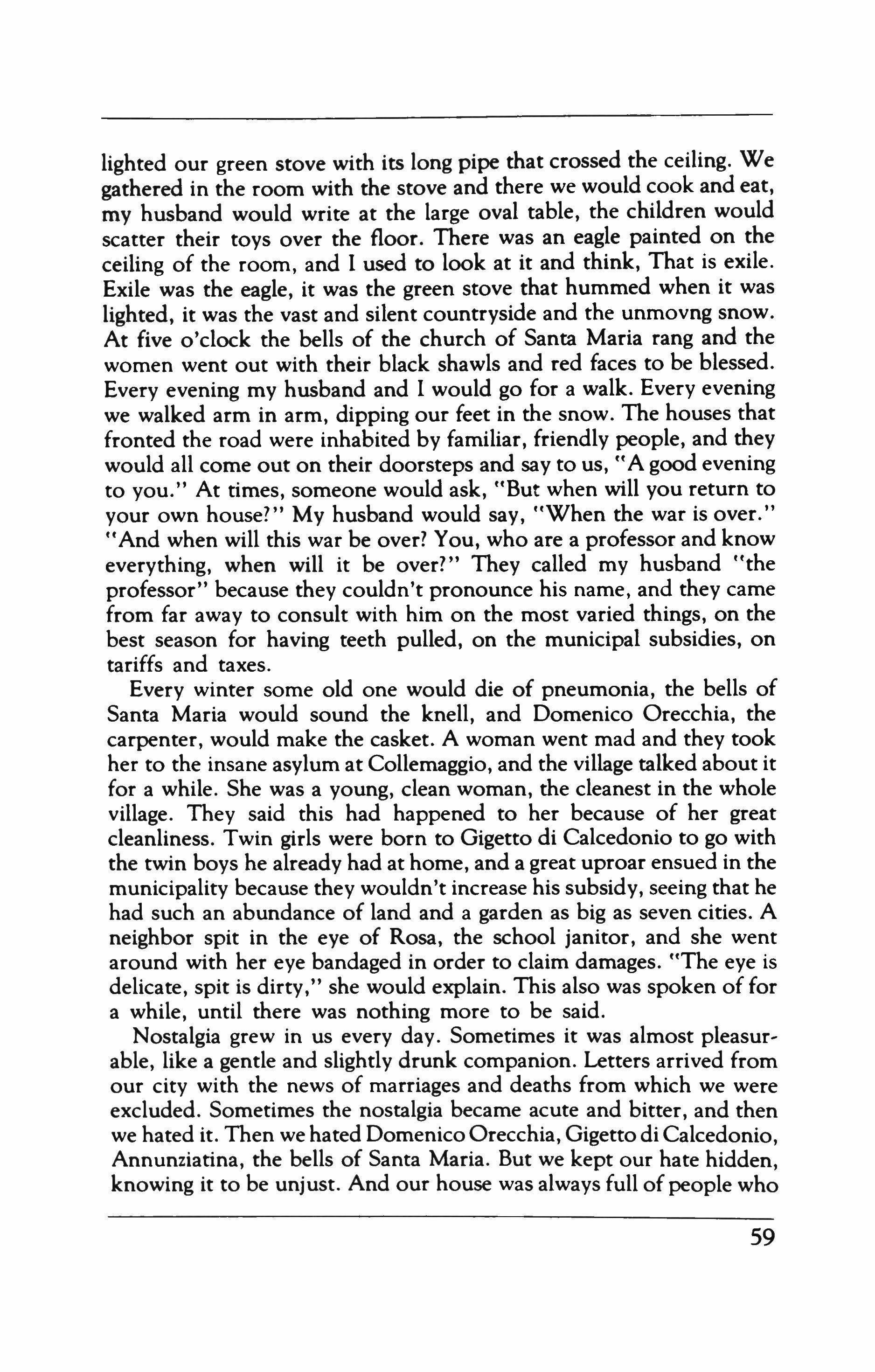
lighted our green stove with its long pipe that crossed the ceiling. We gathered in the room with the stove and there we would cook and eat, my husband would write at the large oval table, the children would scatter their toys over the floor. There was an eagle painted on the ceiling of the room, and I used to look at it and think, That is exile. Exile was the eagle, it was the green stove that hummed when it was lighted, it was the vast and silent countryside and the unmovng snow. At five o'clock the bells of the church of Santa Maria rang and the women went out with their black shawls and red faces to be blessed. Every evening my husband and I would go for a walk. Every evening we walked arm in arm, dipping our feet in the snow. The houses that fronted the road were inhabited by familiar, friendly people, and they would all come out on their doorsteps and say to us, "A good evening to you." At times, someone would ask, "But when will you return to your own house?" My husband would say, "When the war is over." "And when will this war be over? You, who are a professor and know everything, when will it be over?" They called my husband "the professor" because they couldn't pronounce his name, and they came from far away to consult with him on the most varied things, on the best season for having teeth pulled, on the municipal subsidies, on tariffs and taxes.
Every winter some old one would die of pneumonia, the bells of Santa Maria would sound the knell, and Domenico Orecchia, the carpenter, would make the casket. A woman went mad and they took her to the insane asylum at Collemaggio, and the village talked about it for a while. She was a young, clean woman, the cleanest in the whole village. They said this had happened to her because of her great cleanliness. Twin girls were born to Gigetto di Calcedonio to go with the twin boys he already had at home, and a great uproar ensued in the municipality because they wouldn't increase his subsidy, seeing that he had such an abundance of land and a garden as big as seven cities. A neighbor spit in the eye of Rosa, the school janitor, and she went around with her eye bandaged in order to claim damages. "The eye is delicate, spit is dirty," she would explain. This also was spoken offor a while, until there was nothing more to be said.
Nostalgia grew in us every day. Sometimes it was almost pleasurable, like a gentle and slightly drunk companion. Letters arrived from our city with the news of marriages and deaths from which we were excluded. Sometimes the nostalgia became acute and bitter, and then we hated it. Then we hated Domenico Orecchia, Gigetto di Calcedonio, Annunziatina, the bells of Santa Maria. But we kept our hate hidden, knowing it to be unjust. And our house was always full of people who

came to ask favors and to offer them. Sometimes the dressmaker came to make sagnoccole. She would tie a dish towel around her waist and beat the eggs and send Crocetta around the village to see who could lend us a pan that was big enough. Her red face became intent, her eyes sparkled with an imperious will. She would have set the house on fire in order to make those sagnoccole come out right. Her dress and hair became white with flour and on the oval table, where my husband was writing, the sagnoccole began to pile up.
Crocetta was the woman who kept house for us-in truth, not a woman, since she was only fourteen. The dressmaker had found her for us. The dressmaker divided the world into two camps, those who combed their hair and those who didn't. You had to be on your guard with those who didn't because, naturally, they had lice. Crocetta combed her hair, and therefore she came to work at our house and told the children long stories about death and cemeteries. Once upon a time, there was a little boy whose mother died. His father took another wife and the stepmother did not love the child. So she murdered him while his father was in the fields and she made a soup out of him. The father returned home and ate, but after he had eaten, the bones on his plate began to sing:
And my sad stepmother
Has cooked me in a kettle
And my father has eaten me
A fine mouthful he has made of me.
Afterwards, the father killed the wife with a sickle and hung her from a nail over the door. Sometimes I'm surprised to find myself murmuring the words of this song, and then the whole village rises up before me together with the particular savor of those seasons, the icy breath of the wind and the sound of the bells.
Every morning I went out with my children, and the people were astonished, and disapproved of my exposing them to the cold and snow. "What sin have these creatures committed?" they would say. "It is not weather for walking, signora. Go home." We would walk for a long time through the white and deserted countryside, and the few people I met would look at the children with pity. "What sin have they committed?" they would say to me. Down there, when a child is born in wintertime, they don't bring it outdoors until the summer has come. At noon, my husband would overtake me with the mail, and we would all return home together.
I often spoke to the children about our city. They were very little when we had left and didn't remember it at all. I would tell them that,

there, the houses had many storeys, and there were so many houses, and so many streets, and such beautiful shops. "But here there's Giro's," the children would say.
Giro's shop was just across the street from our house. Giro used to stand in his doorway, like an old owl, his round, indifferent eyes fixed on the road. He sold a little of everything: groceries and candles, postcards, shoes, oranges. When a shipment arrived and Giro was unpacking the boxes, the children would come running to eat the rotten oranges he threw away. At Christmastime, nougat and liqueurs and candies also arrived. But he would never knock a single soldo off the price. "What a rascal you are, Giro," the women would say to him. He would answer, "Who thrives if the dogs eat him up?" At Christmastime, the men returned from Terni, Sulmona, Rome, stayed a few days, and then departed again, after slaughtering the pigs. For days afterwards, the people ate nothing but cracklings and head cheese and did nothing but drink. Then the cries of newborn pigs would fill the road.
In February the air became soft and humid. Heavy gray clouds wandered across the sky. One year the gutters broke during the thaw. It rained inside the house and the rooms turned into veritable swamps. But it was this way all over the village. Not a single house was dry. The women emptied buckets out of the windows and swept water out of the doorways. Some even had to go to bed with their umbrellas opened. Domenico Orecchia said that it was the punishment for some sin. This lasted for more than a week. Then, finally, every trace of snow disappeared from the roofs, and Aristide came to fix the gutters. Winter's end always awakened in us something like restlessness. Perhaps someone would come to see us, perhaps something would finally happen. Our exile, too, must have an end. The roads that divided us from the world seemed shorter, the mail arrived more often. All our chilblains slowly healed.
There is a certain monotonous sameness in the destinies of men. Our lives unfold according to old and unalterable laws, according to a measured and ancient rhythm. Dreams never come true, and no sooner do we see them shattered than we understand, at once, that the great joys of our lives are outside of reality. No sooner do we see them shattered than we are consumed with the nostalgia for the time when they burned within us. In this way our lives spend themselves, in a succession of hopes and nostalgias.
My husband died in Rome, in the Queen of Heaven prison, a few months after we had left the village. Faced with the horror of his solitary death, faced with the other sorrows that preceded his death, I ask myself, Did this happen to us? To us, who used to buy oranges at
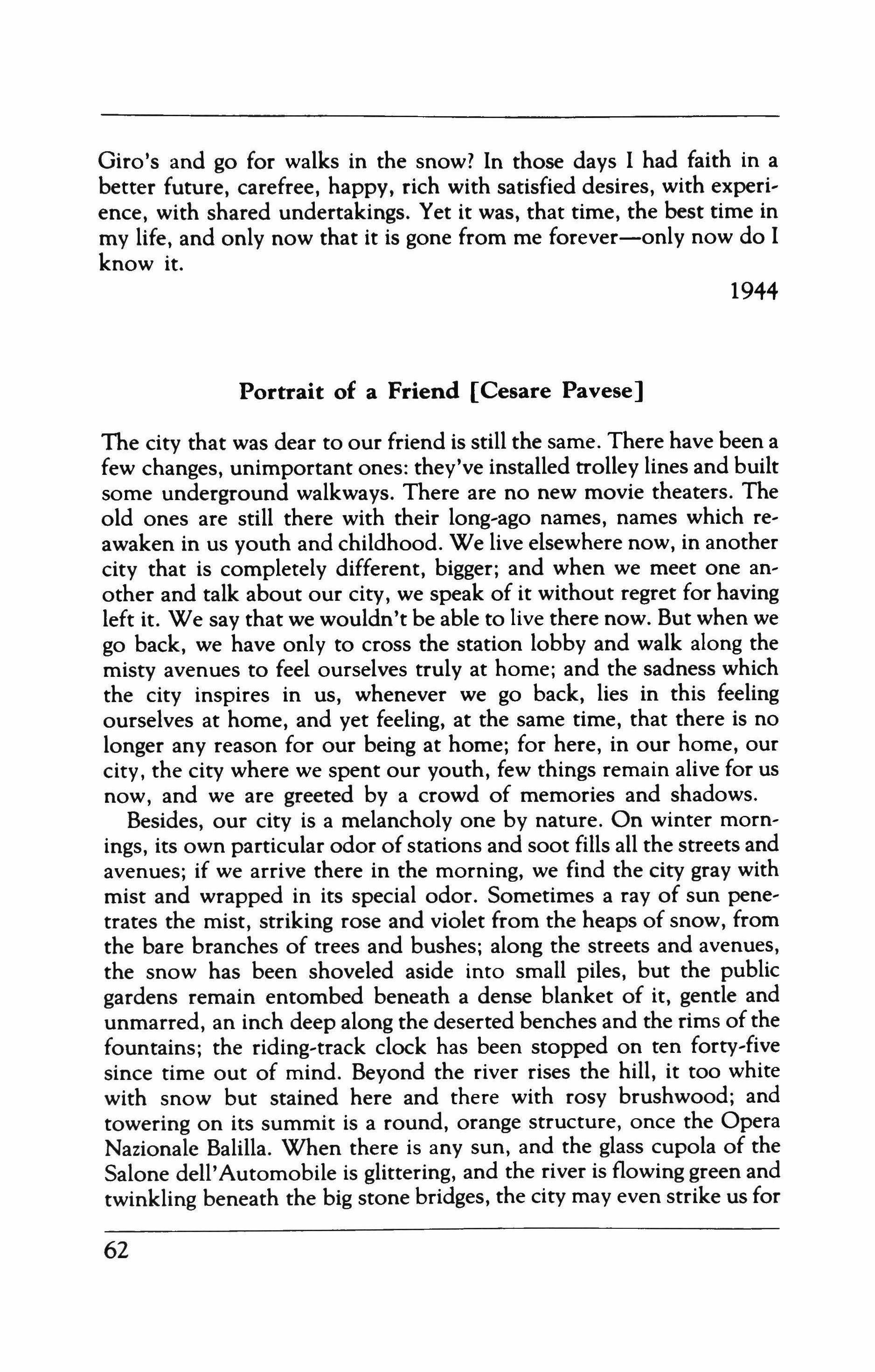
Giro's and go for walks in the snow? In those days I had faith in a better future, carefree, happy, rich with satisfied desires, with expertence, with shared undertakings. Yet it was, that time, the best time in my life, and only now that it is gone from me forever-only now do I know it.
The city that was dear to our friend is still the same. There have been a few changes, unimportant ones: they've installed trolley lines and built some underground walkways. There are no new movie theaters. The old ones are still there with their long-ago names, names which reawaken in us youth and childhood. We live elsewhere now, in another city that is completely different, bigger; and when we meet one an, other and talk about our city, we speak of it without regret for having left it. We say that we wouldn't be able to live there now. But when we go back, we have only to cross the station lobby and walk along the misty avenues to feel ourselves truly at home; and the sadness which the city inspires in us, whenever we go back, lies in this feeling ourselves at home, and yet feeling, at the same time, that there is no longer any reason for our being at home; for here, in our home, our city, the city where we spent our youth, few things remain alive for us now, and we are greeted by a crowd of memories and shadows. Besides, our city is a melancholy one by nature. On winter morn, ings, its own particular odor of stations and soot fills all the streets and avenues; if we arrive there in the morning, we find the city gray with mist and wrapped in its special odor. Sometimes a ray of sun penetrates the mist, striking rose and violet from the heaps of snow, from the bare branches of trees and bushes; along the streets and avenues, the snow has been shoveled aside into small piles, but the public gardens remain entombed beneath a dense blanket of it, gentle and unmarred, an inch deep along the deserted benches and the rims of the fountains; the riding-track clock has been stopped on ten forty-five since time out of mind. Beyond the river rises the hill, it too white with snow but stained here and there with rosy brushwood; and towering on its summit is a round, orange structure, once the Opera Nazionale Balilla. When there is any sun, and the glass cupola of the Salone dell'Automobile is glittering, and the river is flowing green and twinkling beneath the big stone bridges, the city may even strike us for
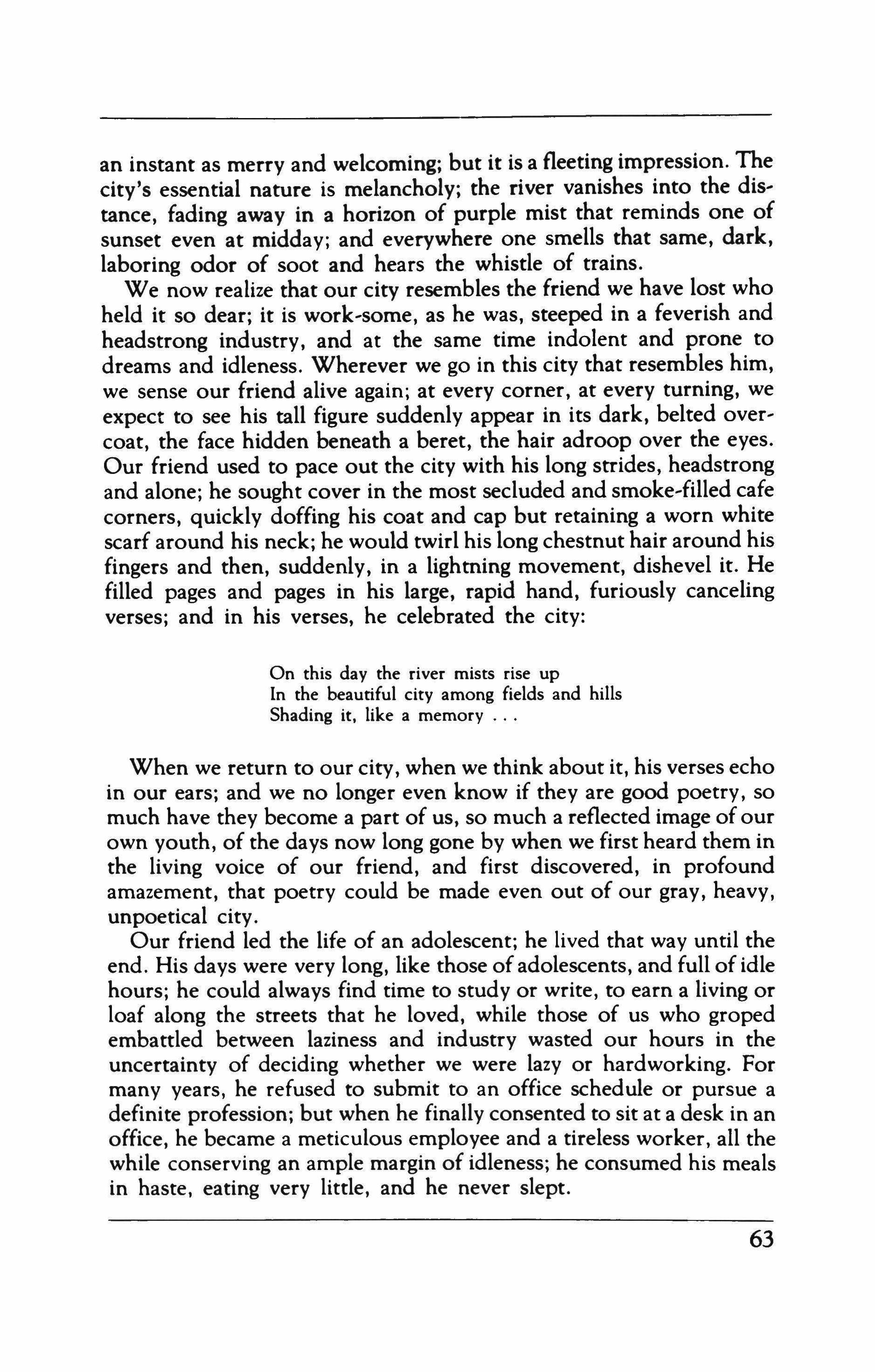
an instant as merry and welcoming; but it is a fleeting impression. The city's essential nature is melancholy; the river vanishes into the distance, fading away in a horizon of purple mist that reminds one of sunset even at midday; and everywhere one smells that same, dark, laboring odor of soot and hears the whistle of trains.
We now realize that our city resembles the friend we have lost who held it so dear; it is work-some, as he was, steeped in a feverish and headstrong industry, and at the same time indolent and prone to dreams and idleness. Wherever we go in this city that resembles him, we sense our friend alive again; at every corner, at every turning, we expect to see his tall figure suddenly appear in its dark, belted over� coat, the face hidden beneath a beret, the hair adroop over the eyes. Our friend used to pace out the city with his long strides, headstrong and alone; he sought cover in the most secluded and smoke-filled cafe corners, quickly doffing his coat and cap but retaining a worn white scarf around his neck; he would twirl his long chestnut hair around his fingers and then, suddenly, in a lightning movement, dishevel it. He filled pages and pages in his large, rapid hand, furiously canceling verses; and in his verses, he celebrated the city:
On this day the river mists rise up In the beautiful city among fields and hills Shading it, like a memory
When we return to our city, when we think about it, his verses echo in our ears; and we no longer even know if they are good poetry, so much have they become a part of us, so much a reflected image of our own youth, of the days now long gone by when we first heard them in the living voice of our friend, and first discovered, in profound amazement, that poetry could be made even out of our gray, heavy, unpoetical city.
Our friend led the life of an adolescent; he lived that way until the end. His days were very long, like those ofadolescents, and full of idle hours; he could always find time to study or write, to earn a living or loaf along the streets that he loved, while those of us who groped embattled between laziness and industry wasted our hours in the uncertainty of deciding whether we were lazy or hardworking. For many years, he refused to submit to an office schedule or pursue a definite profession; but when he finally consented to sit at a desk in an office, he became a meticulous employee and a tireless worker, all the while conserving an ample margin of idleness; he consumed his meals in haste, eating very little, and he never slept.
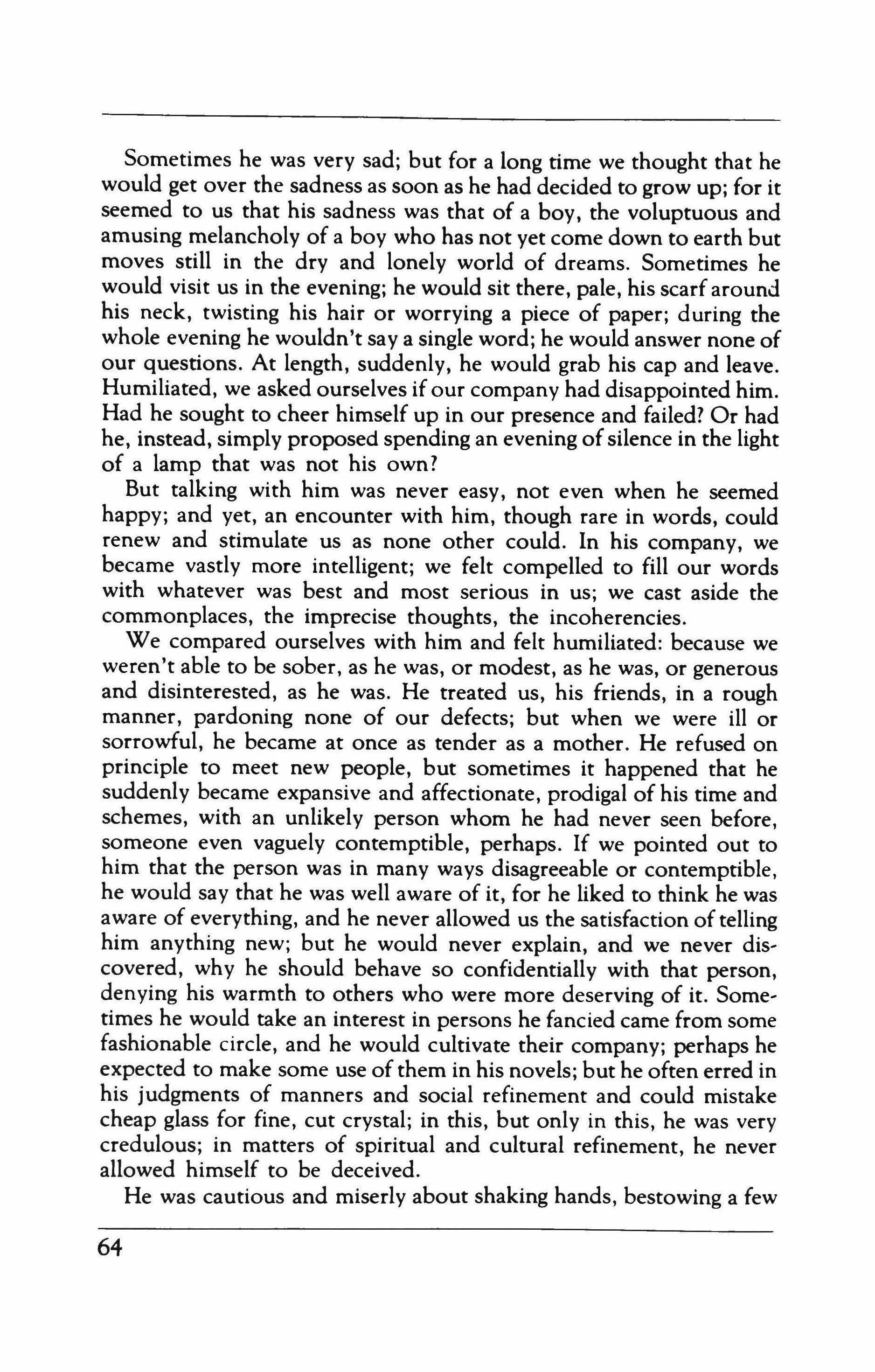
Sometimes he was very sad; but for a long time we thought that he would get over the sadness as soon as he had decided to grow up; for it seemed to us that his sadness was that of a boy, the voluptuous and amusing melancholy of a boy who has not yet come down to earth but moves still in the dry and lonely world of dreams. Sometimes he would visit us in the evening; he would sit there, pale, his scarf around his neck, twisting his hair or worrying a piece of paper; during the whole evening he wouldn't say a single word; he would answer none of our questions. At length, suddenly, he would grab his cap and leave. Humiliated, we asked ourselves if our company had disappointed him. Had he sought to cheer himself up in our presence and failed? Or had he, instead, simply proposed spending an evening ofsilence in the light of a lamp that was not his own?
But talking with him was never easy, not even when he seemed happy; and yet, an encounter with him, though rare in words, could renew and stimulate us as none other could. In his company, we became vastly more intelligent; we felt compelled to fill our words with whatever was best and most serious in us; we cast aside the commonplaces, the imprecise thoughts, the incoherencies.
We compared ourselves with him and felt humiliated: because we weren't able to be sober, as he was, or modest, as he was, or generous and disinterested, as he was. He treated us, his friends, in a rough manner, pardoning none of our defects; but when we were ill or sorrowful, he became at once as tender as a mother. He refused on principle to meet new people, but sometimes it happened that he suddenly became expansive and affectionate, prodigal of his time and schemes, with an unlikely person whom he had never seen before, someone even vaguely contemptible, perhaps. If we pointed out to him that the person was in many ways disagreeable or contemptible, he would say that he was well aware of it, for he liked to think he was aware of everything, and he never allowed us the satisfaction of telling him anything new; but he would never explain, and we never discovered, why he should behave so confidentially with that person, denying his warmth to others who were more deserving of it. Sometimes he would take an interest in persons he fancied came from some fashionable circle, and he would cultivate their company; perhaps he expected to make some use of them in his novels; but he often erred in his judgments of manners and social refinement and could mistake cheap glass for fine, cut crystal; in this, but only in this, he was very credulous; in matters of spiritual and cultural refinement, he never allowed himself to be deceived.
He was cautious and miserly about shaking hands, bestowing a few

fingers and then quickly withdrawing them; when it came to filling his pipe from his tobacco pouch, he was hesitant and niggardly; he was quick and brusque in offering us money when we needed it, so much so that the gift usually left us bewildered; he claimed to be miserly with what money he had, to suffer in parting with it: but the moment it was gone, he washed his hands of it. When we were away, he never wrote us, nor did he respond to our letters, unless with a few, abrupt, icy phrases; for he said that he couldn't love friends when they were away, he didn't wish to suffer from their absence and would quickly expunge them from his thoughts.
He never had a wife, or children, or a house of his own. He lived near to a married sister who loved him and whom he loved, but he used her in his usual rough way, behaving like a boy or a total stranger. At times he would come to our houses and with a kindly frown scrutinize the children born to us, the families growing up around us; he, too, thought of having a family, but he thought of it in a way that became, over the years, more and more complicated and tortured, so tortured that he was unable to bring his thoughts to any simple fruition. He had developed, over the years, a system of thought and principle so tangled and inexorable that he could no longer make real the simplest reality: and the more impossible and prohibited that simple reality became, the more profound became his desire to con' quer it, entangling and ramifying itself like a choked, tortured species of vegetation. He was very sad, at times, and we would have liked to come to his aid, but he never permitted us to offer a tender word, a consoling gesture; and so it happened that we, too, following his lead, rejected his pity in our moments of discomfort. For us, he was not a mentor, though he had taught us many, many things; for we saw clearly the absurdities and tortured complications of thought that imprisoned his simple soul; we would even have liked to teach him something, how to live in an airier, more elementary fashion, but we never succeeded in teaching him anything, for whenever we attempted to offer him reasons, he would raise his hand and say that he was already aware of it all.
In the final years his face was hollow and wrinkled, devastated by tormented thoughts, but he conserved to the end the gentleness of an adolescent. He became a famous writer in the final years; but this did not change in the least his bashful manners, nor the modesty of his gestures, nor his humility, conscientious to a scruple, at his daily labor. When we asked him whether he liked being famous, he would answer with a proud sneer that he had always expected it of himself: sometimes this sharp, proud sneer, childish and malevolent, would

flash across his face and then disappear. But the fact that he had always expected it ofhimself meant that the thing, once achieved, gave him no joy; for he was incapable ofenjoying things, of loving things, once they were in his grasp. He said that, by now, he knew his own art so deeply, it no longer held any secrets for him, no longer interested him. He would say that we ourselves, his friends, no longer held any secrets for him, that we were infinitely boring; and the thought that we bored him was so mortifying, we never managed to tell him that we knew where he had gone wrong: in his refusal to stoop to a love of everyday life, which proceeds uneventfully and without apparent secrets. All that remained to him to conquer, therefore, was everyday reality; yet for him, who thirsted after it and at the same time was disgusted by it, it remained forbidden and impregnable; he could only gaze at it as if from an immeasurable distance.
He died in the summertime. Our city is empty in the summer, as immense and bright and sonorous as a piazza; the sky, with its milky paleness, is clear but not luminous; the river courses as flat as a road, exhaling neither moisture nor coolness. Clouds of dust hang in the avenues; large carts filled with sand go by on their way from the river; the asphalt of the main street is entirely strewn with small stones which sizzle in the pitch. Outside, beneath fringed umbrellas, the cafe tables are hot to the touch and deserted.
None of us was in town. He chose for his death an ordinary day in that torrid August; and he chose a hotel room in the neighborhood of the station, preferring to die like a stranger in the city that belonged to him. He had imagined his death in an old poem, written many, many years before:
There will be no need to get out of bed. Dawn alone will enter the empty room, The window alone suffice to dress each thing In peaceful dimness, almost like light. A gaunt shadow will perch on the upturned face. Memories will be clots of shadow, Hidden like this, like old coals In the grate. Memory will be the harsh flame That yesterday still burned in deadened eyes.
Shortly after his death, we climbed the hill. Along the road were inns, with arbors of reddening grapes, bocce courts, stacks of bicycles, and farms where the wheat had been tied into sheaves, the hay cut and left in stacks to dry: the landscape, at the edge of the city, on the verge of autumn, that he loved. We watched the September night come over the grassy borders and turned fields. We were all close friends, had
known each other for many years, people who had always worked and thought together. As happens with those who love each other and are struck by misfortune, we were trying now to love each other more, to look after and protect one another; for we felt that he had always looked after and protected us in some mysterious way of his own. More than ever, on the prow of that hill, he was with us.
Each glimpse, returning, conserves a taste Of grass and things filled with afternoon sun On the shore. Each keeps a breath of the sea. Like a night sea-this vague shadow Of worry and old horror. The sky touches it And every night brings it back. Like the breaking Voice of that sea, the dead voices.
Translated by Michele Stepto
1957

Put this in your notebooks: All verse is occasional verse. In March, trying to get home, distracted and impatient at Gate 5 in the Greyhound station, I saw a drunk man bothering a woman. A poem depends on its detail but the woman had her back to me, and the man was just another drunk, black in this case, familiar, dirty. I moved past them both, got on the bus.
There is no further action to report. The man is not a symbol. If what he said to her touches us, we are touched by a narrative we supply. What he said was, "I'm sorry, I'm sorry," over and over, "I'm sorry," but you must understand he frightened the woman, he meant to rob her of those few quiet solitary moments sitting down, waiting for the bus, before she headed home and probably got supper for her family, perhaps in a room in Framingham, perhaps her child was sick.
My bus pulled out, made its usual turns and parted the formal gardens from the Common, both of them camouflaged by snow.

And as it threaded its way to open road, leaving the city, leaving our sullen classroom, I postponed my satchel of your poems and wondered who I am to teach the young, having come so far from honest love of the world; I tried to recall how it felt to live without grief; and then I wrote down a few tentative lines about the drunk, because of an old compulsion to record, or sudden resolve not to be self-absorbed and full of dread-
I wanted to salvage something from my life, to fix some truth beyond all change, the way photographers of war, miles from the front, lift print after print into the light, each one further cropped and amplified, pruning whatever baffles or obscures, until the small figures are restored as young men sleeping.

An old hill town in northern Pennsylvania, a missed connection for a bus, an hour to kill.
For all intents and purposes, the place was uninhabited; the mines had closed years beforeanthracite too dear to dig, the companies went west to strip, the miners to the citiesand now, though the four-lane truck route still went througheighteen-wheelers pounding pastthat was almost all: a shuttered Buick dealer, a grocery, not even a McDonald's, just the combination ticker-office, luncheonette and five-anddime where the buses turned around.
A low, gray frame building, it was gloomy and run-down, but charmingly old-fashioned; ancient wooden floors, open shelves, the smell of unwrapped candy, cigarettes and band-aid glue.
The only people there, the only people I think that I remember from the town at all, were the silent woman at the register, and a youngish teenaged boy standing reading.
The woman smoked and smoked, stared out the streaky window, handed me my coffee with indifference. It was hard to tell how old she was: her hair was dyed and teased, iced into a beehive.
The boy was frail, sidelong somehow, afflicted with a devastating Nessus-shirt of acne

boiling down his face and neck-pits and pores, scarlet streaks and scars; saddening.
We stood together at the magazine rack for a while before I realized what he was looking at.
Pornography: two naked men, one grimaces, the other, with a fist inside the first one, grins.
I must have flinched: the boy sidled down and blanked his face more-I left to take a walk.
It was cold, but not enough to catch or clear your breath: uncertain clouds, unemphatic light.
Everything seemed dimmed and colorless, the sense of surfaces dissolving, like the Parthenon.
Farther down the main street were a dentist and a chiropractor, both with hand-carved signs, then the Elks' decaying clapboard mansion with a parking space "Reserved for the Exalted Ruler," and a Russian church, gilt onion domes, a four-horned air-raid siren on a pole between them.
Two blocks in, the old slate sidewalks shatter and uplift, gnawed lawns, aluminum butane tanks, then the roads begin to peter out and rise: half-fenced yards with scabs of weeks-old snow, thin, inky, oily leaks of melt insinuating down the gulleys and the cindered cuts that rose again into the footings of the filthy, disused slagheaps ringing the horizon.
There was nowhere else. At the depot now, the women and the boy were both behind the counter.
He was on a stool, his eyes closed, she stood just in back ofhim, massaging him, hauling at his shoulders, kneading at the muscles like a boxer's trainer between rounds.
I picked up the county paper: it was anti-crime and welfare bums, for Reaganomics and defense.
The wirephoto was an actress in her swimming suit, that famously expensive bosom, cream.
My bus arrived at last, its heavy, healthy white exhaust pouring in the afternoon.
All aboard Carbondale, all aboard Pittston, all aboard Nanticoke, Tamaqua, La Plume.
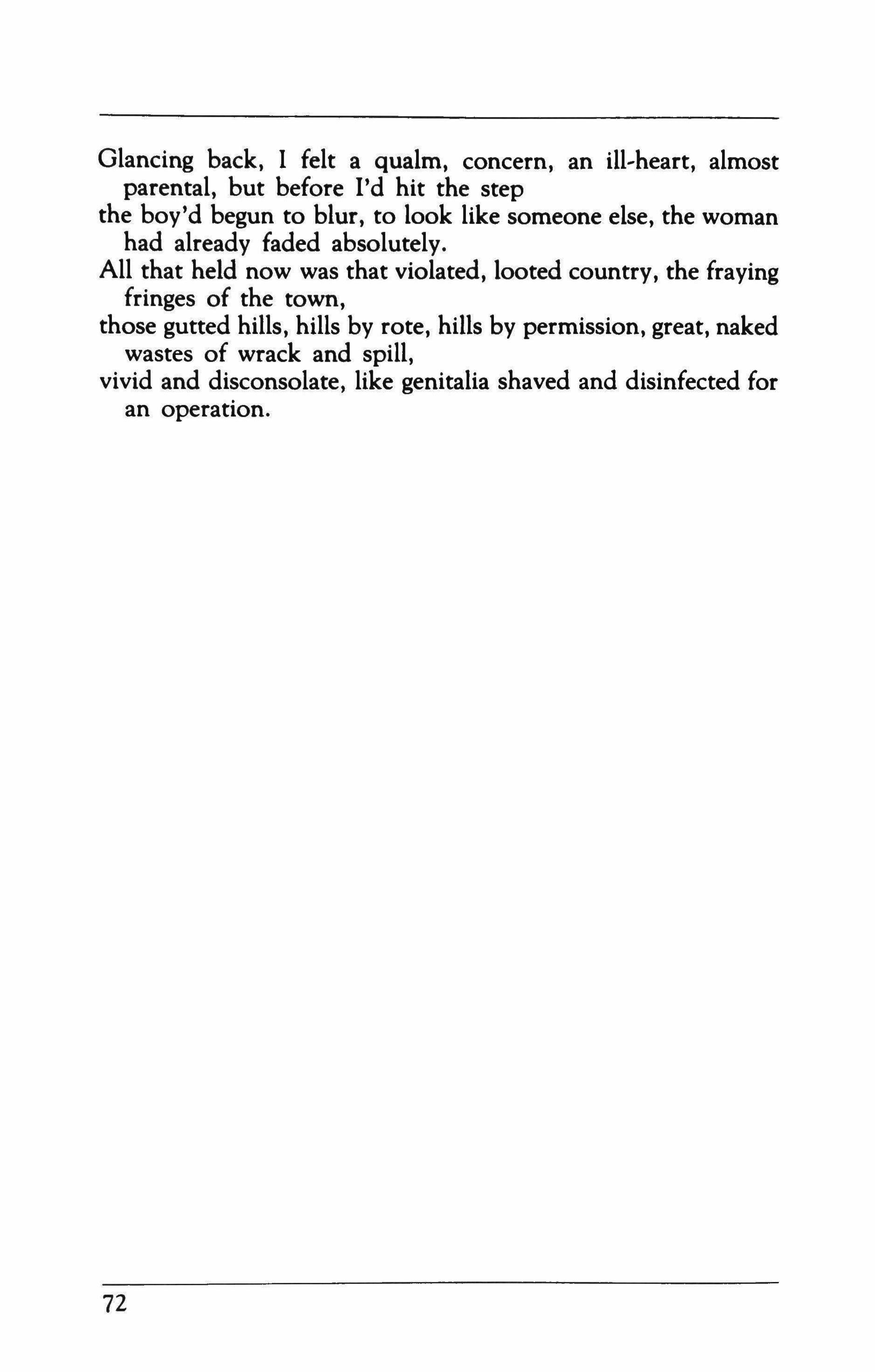
Glancing back, I felt a qualm, concern, an ill-heart, almost parental, but before I'd hit the step the bov'd begun to blur, to look like someone else, the woman had already faded absolutely. All that held now was that violated, looted country, the fraying fringes of the town, those gutted hills, hills by rote, hills by permission, great, naked wastes of wrack and spill, vivid and disconsolate, like genitalia shaved and disinfected for an operation.
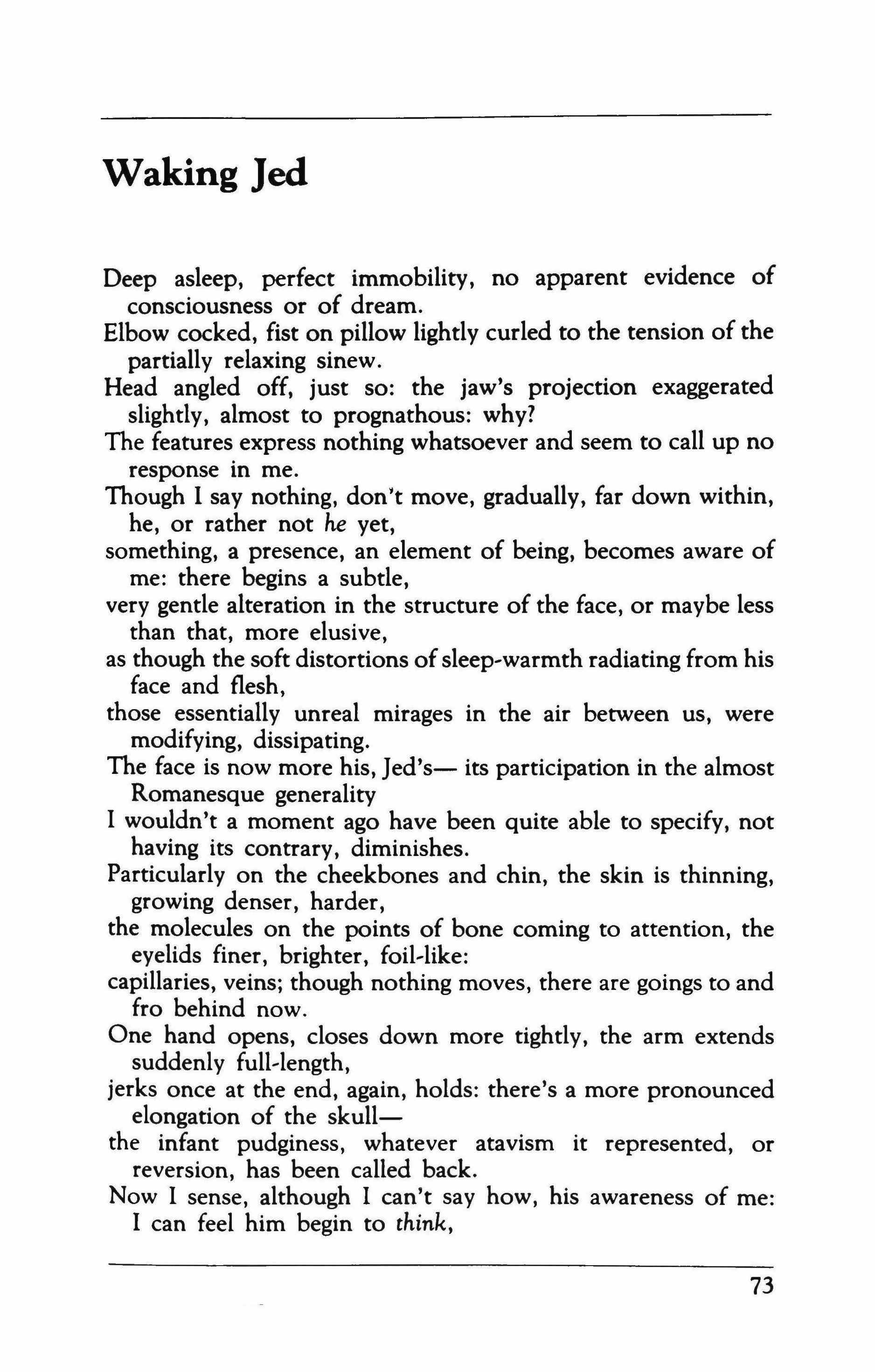
Deep asleep, perfect immobility, no apparent evidence of consciousness or of dream.
Elbow cocked, fist on pillow lightly curled to the tension of the partially relaxing sinew.
Head angled off, just so: the jaw's projection exaggerated slightly, almost to prognathous: why?
The features express nothing whatsoever and seem to call up no response in me.
Though I say nothing, don't move, gradually, far down within, he, or rather not he yet, something, a presence, an element of being, becomes aware of me: there begins a subtle, very gentle alteration in the structure of the face, or maybe less than that, more elusive, as though the soft distortions ofsleep-warmth radiating from his face and flesh, those essentially unreal mirages in the air between us, were modifying, dissipating.
The face is now more his, Jed's- its participation in the almost Romanesque generality
I wouldn't a moment ago have been quite able to specify, not having its contrary, diminishes.
Particularly on the cheekbones and chin, the skin is thinning, growing denser, harder, the molecules on the points of bone coming to attention, the eyelids finer, brighter, foil,like: capillaries, veins; though nothing moves, there are goings to and fro behind now.
One hand opens, closes down more tightly, the arm extends suddenly full,length jerks once at the end, again, holds: there's a more pronounced elongation of the skullthe infant pudginess, whatever atavism it represented, or reversion, has been called back.
Now I sense, although I can't say how, his awareness of me: I can feel him begin to think,
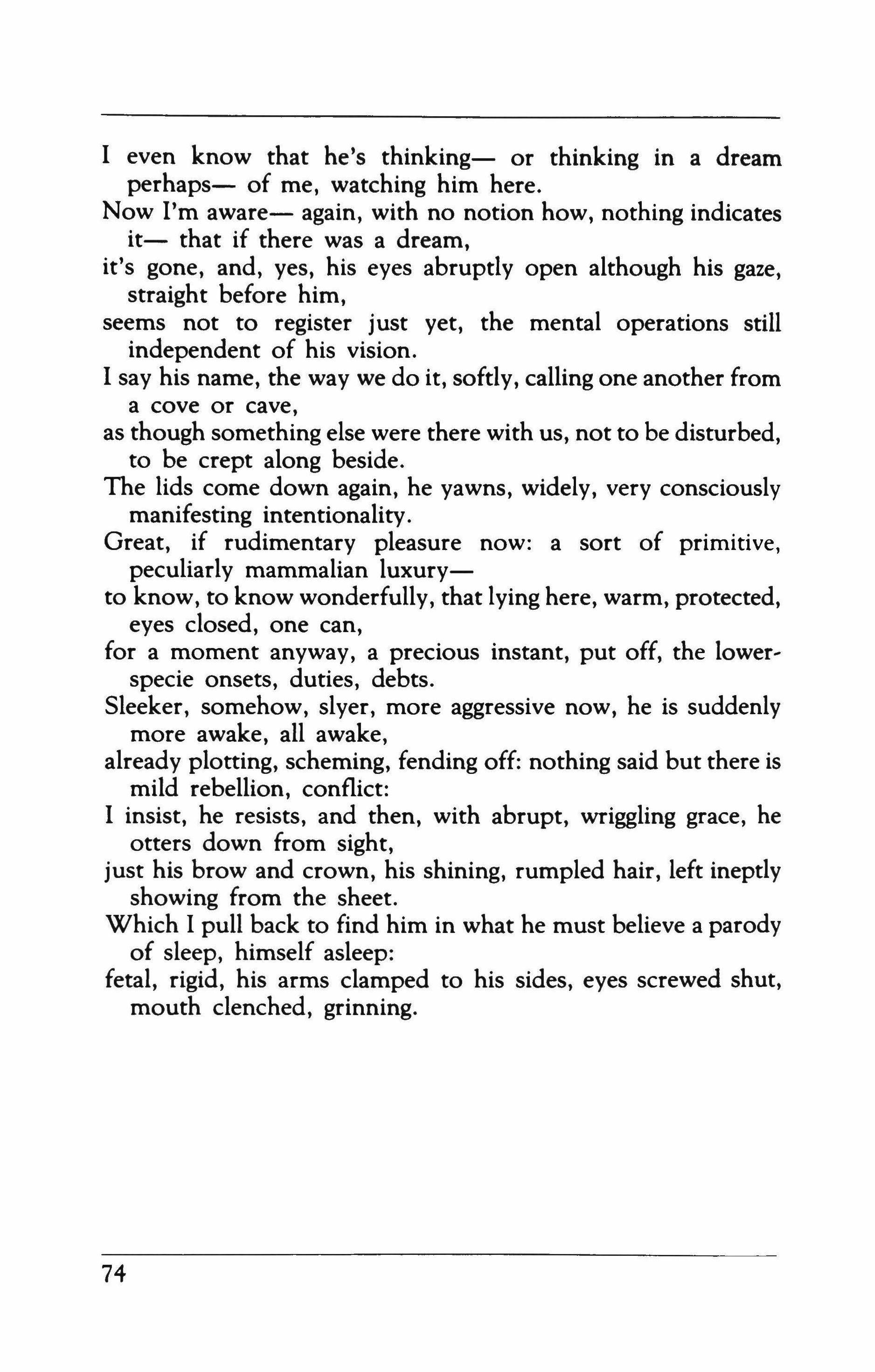
I even know that he's thinking- or thinking in a dream perhaps- of me, watching him here.
Now I'm aware- again, with no notion how, nothing indicates it- that if there was a dream, it's gone, and, yes, his eyes abruptly open although his gaze, straight before him, seems not to register just yet, the mental operations still independent of his vision.
I say his name, the way we do it, softly, calling one another from a cove or cave, as though something else were there with us, not to be disturbed, to be crept along beside.
The lids come down again, he yawns, widely, very consciously manifesting intentionality.
Great, if rudimentary pleasure now: a sort of primitive, peculiarly mammalian luxuryto know, to know wonderfully, that lying here, warm, protected, eyes closed, one can, for a moment anyway, a precious instant, put off, the lower, specie onsets, duties, debts.
Sleeker, somehow, slyer, more aggressive now, he is suddenly more awake, all awake, already plotting, scheming, fending off: nothing said but there is mild rebellion, conflict:
I insist, he resists, and then, with abrupt, wriggling grace, he otters down from sight, just his brow and crown, his shining, rumpled hair, left ineptly showing from the sheet.
Which I pull back to find him in what he must believe a parody of sleep, himself asleep: fetal, rigid, his arms clamped to his sides, eyes screwed shut, mouth clenched, grinning.

In 1943, the boy
hefty waiters swoop and whirl among tables of roaring men, their hands high overhead swinging two or three bottles by the neck, or slicing trays through smoke like river barges laden with merchandise.
Customers, waitersmost wear aprons, full-length and white, some splattered with axle grease, others with flour and blood. All laugh too loudly, faces red and sweaty, bodies pink and hairy-black beneath their clothes. They shout and eat, toast the stuffy room, yell UTo life!" and "God is good!"
eyes gleaming, fingers snatching food from passing trays. Those eyes know wool and grain, plate, silver, oil and leather in the dusty market square, but know the people who shop there even better; know the roads beyond the village and where they lead.

Their cousins cry in the wilderness and it flowers. Their uncles rise suddenly, upsetting tables, and dance in billowing circles their vision of the world that God has promised them. And dein mama and dein tochta scold these drunken boys, or shriek at walls and laundry, pots on the stove: "This can't go on! It's not a life!" They clasp their hands and weep, then sigh and clean the house once more; while in doorways on the market square, squatting on stools, aunts and widows tear feathers from dead hens, and gasp each time the linen grazes a tense nipple inside their clothes.
This is no country for those who cringe and cower.
Ecstasy, reverence-yes: these people understand any excessive gesture, any thought or act that flings the leaping blood through the body's crooked streets, anything that grasps and grasps at life.
Laborers, shopmen, scholars, grandmas, wives and daughterstheir every flourish and shrug, their every toothy grin is done in the sanctity of God's embrace, as if the air that encased them from head to foot, that around them clamped

woods and fields in place, sat on God's desk inside a paperweight:
His will was theirs, and would be done, they thought, if they had the patience to wait for it.
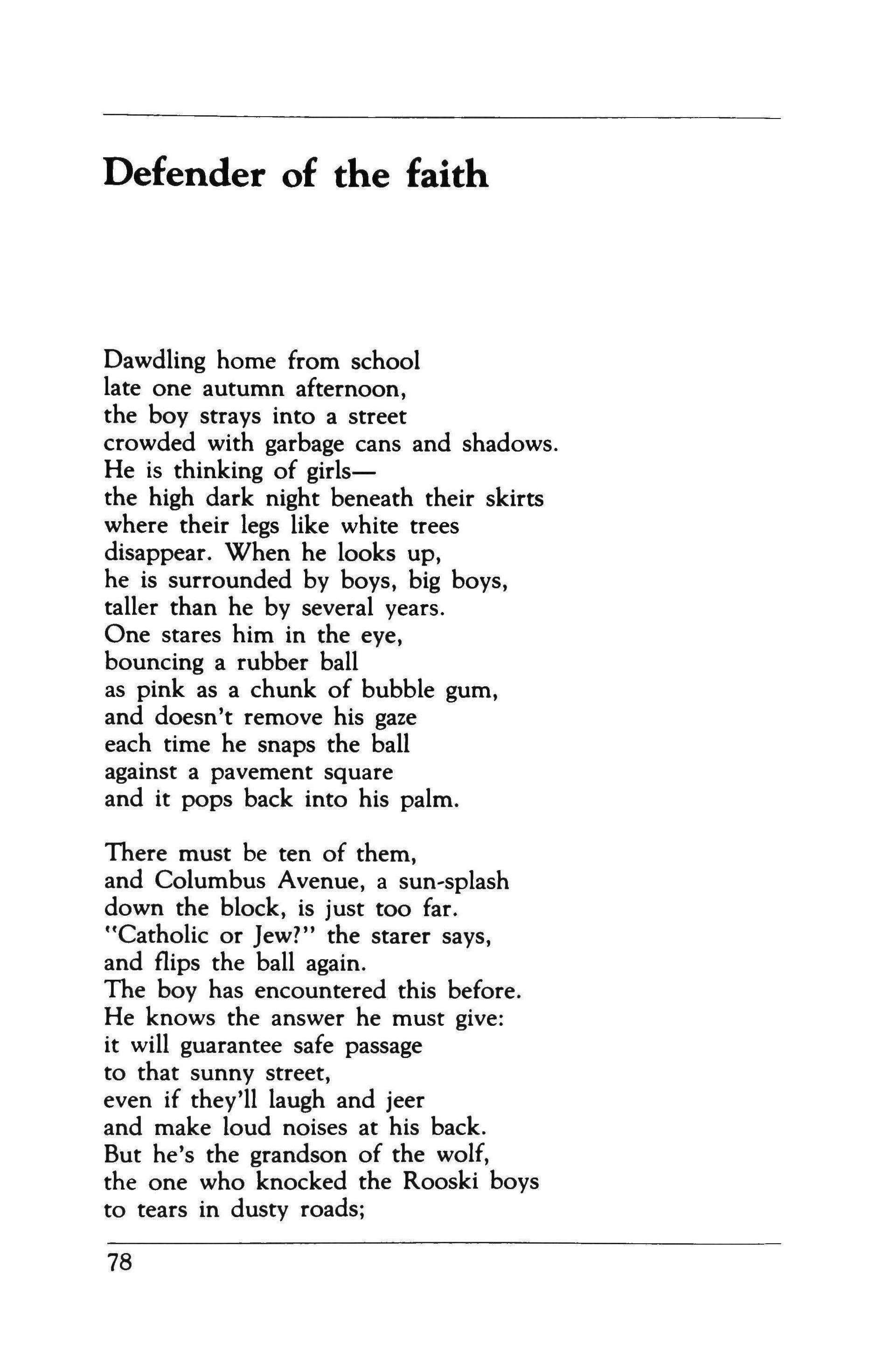
Dawdling home from school late one autumn afternoon, the boy strays into a street crowded with garbage cans and shadows. He is thinking of girlsthe high dark night beneath their skirts where their legs like white trees disappear. When he looks up, he is surrounded by boys, big boys, taller than he by several years. One stares him in the eye, bouncing a rubber ball as pink as a chunk of bubble gum, and doesn't remove his gaze each time he snaps the ball against a pavement square and it pops back into his palm.
There must be ten of them, and Columbus Avenue, a sun-splash down the block, is just too far. "Catholic or Jew?" the starer says, and flips the ball again. The boy has encountered this before. He knows the answer he must give: it will guarantee safe passage to that sunny street, even if they'll laugh and jeer and make loud noises at his back. But he's the grandson of the wolf, the one who knocked the Rooski boys to tears in dusty roads;
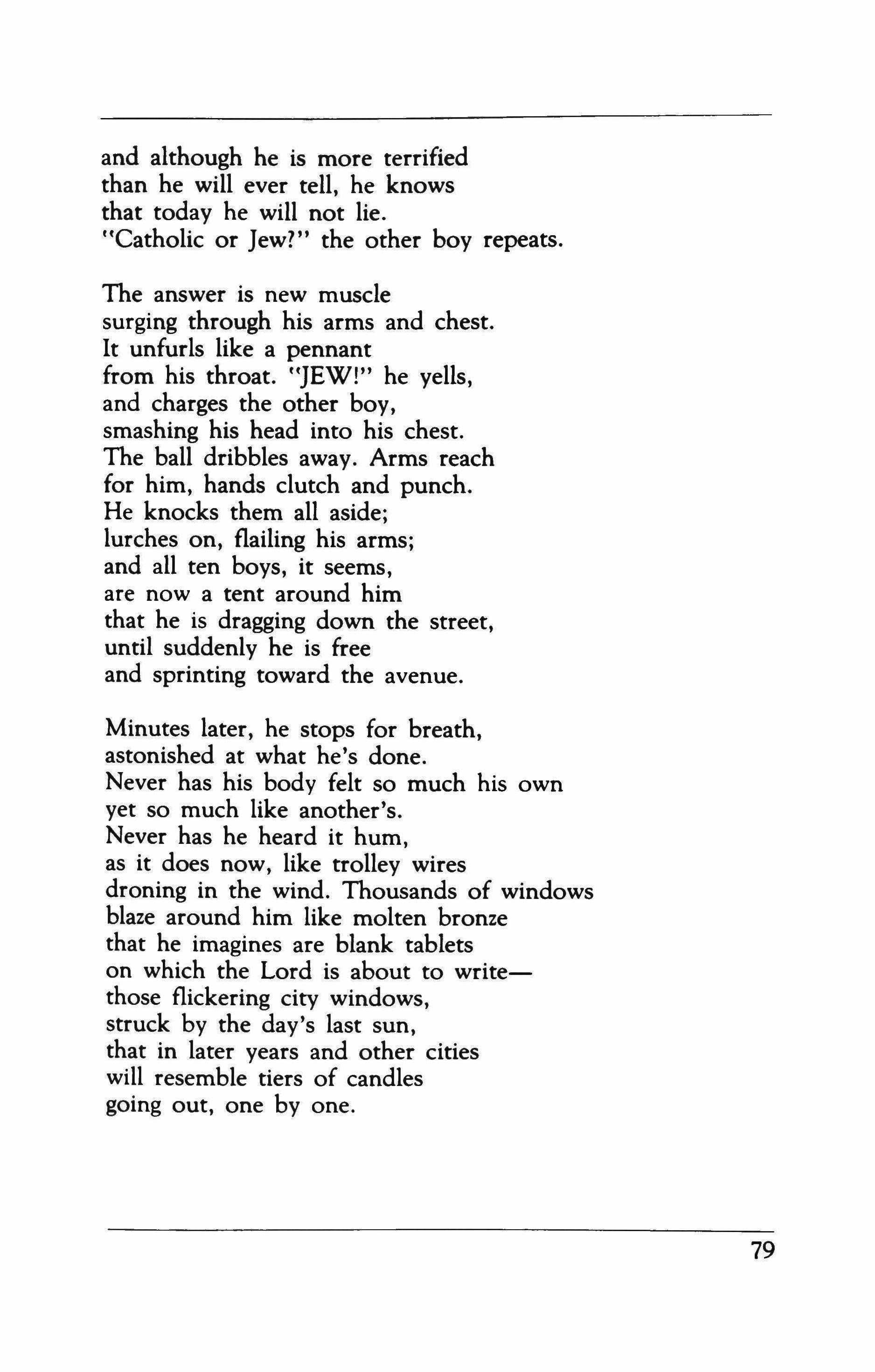
and although he is more terrified than he will ever tell, he knows that today he will not lie. "Catholic or Jew?" the other boy repeats.
The answer is new muscle surging through his arms and chest. It unfurls like a pennant from his throat. "JEW!" he yells, and charges the other boy, smashing his head into his chest. The ball dribbles away. Arms reach for him, hands clutch and punch. He knocks them all aside; lurches on, flailing his arms; and all ten boys, it seems, are now a tent around him that he is dragging down the street, until suddenly he is free and sprinting toward the avenue.
Minutes later, he stops for breath, astonished at what he's done. Never has his body felt so much his own yet so much like another's. Never has he heard it hum, as it does now, like trolley wires droning in the wind. Thousands of windows blaze around him like molten bronze that he imagines are blank tablets on which the Lord is about to writethose flickering city windows, struck by the day's last sun, that in later years and other cities will resemble tiers of candles going out, one by one.
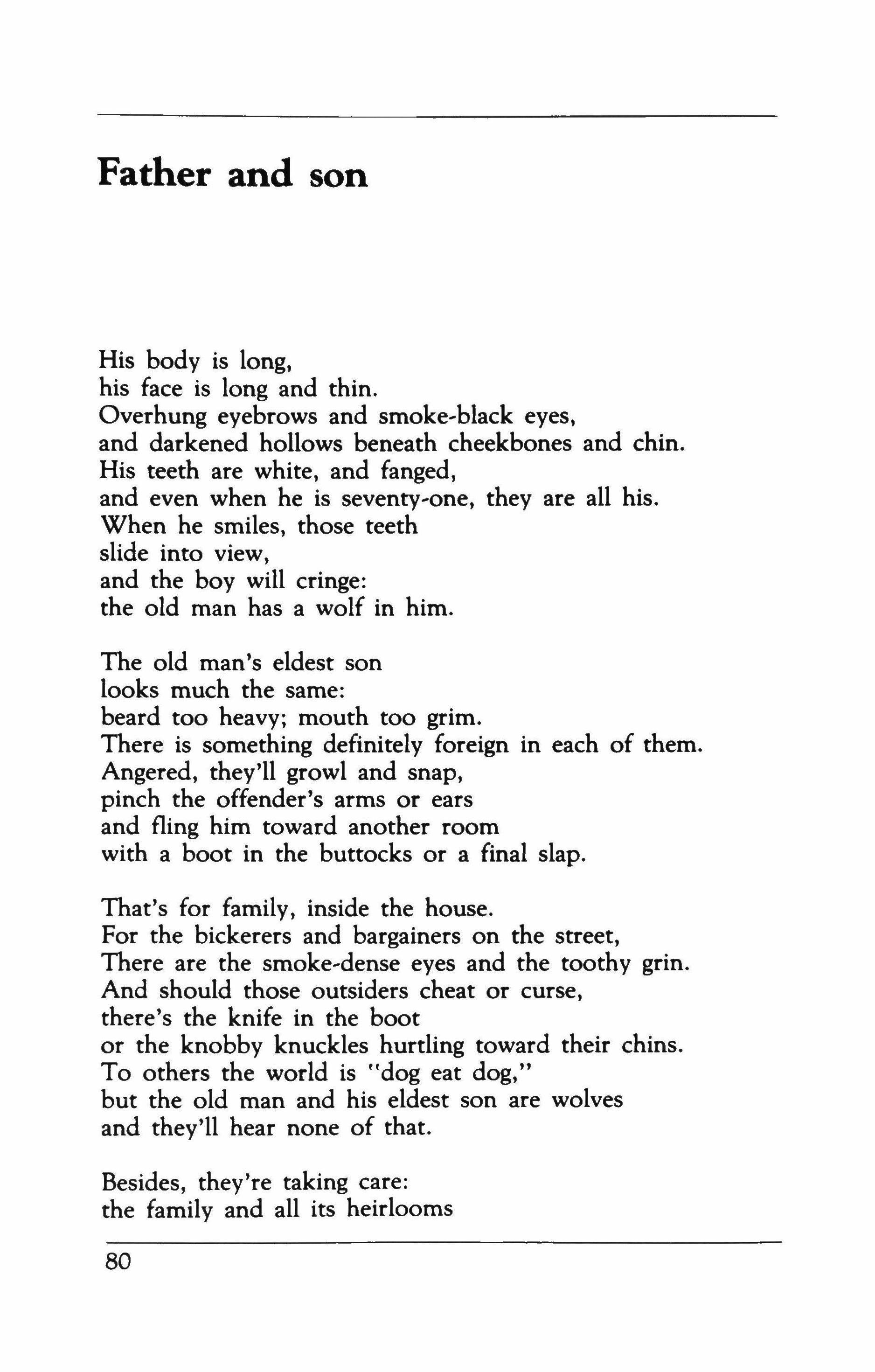
His body is long, his face is long and thin. Overhung eyebrows and smoke-black eyes, and darkened hollows beneath cheekbones and chin. His teeth are white, and fanged, and even when he is seventy-one, they are all his. When he smiles, those teeth slide into view, and the boy will cringe: the old man has a wolf in him.
The old man's eldest son looks much the same: beard too heavy; mouth too grim. There is something definitely foreign in each of them. Angered, they'll growl and snap, pinch the offender's arms or ears and fling him toward another room with a boot in the buttocks or a final slap.
That's for family, inside the house. For the bickerers and bargainers on the street, There are the smoke-dense eyes and the toothy grin. And should those outsiders cheat or curse, there's the knife in the boot or the knobby knuckles hurtling toward their chins. To others the world is "dog eat dog," but the old man and his eldest son are wolves and they'll hear none of that.
Besides, they're taking care: the family and all its heirlooms

are in their charge: brooches and tarnished spoons, a pearl necklace from a great-aunt's will, several silver plates and cups. They are neither kind nor heroic men: They mean to survive.
That's what the old man's parents taught to him, and he teaches it to his daughters and sons with such ferocity, they cannot look him in the eye. Love is not the point, it never was.
Joy and ecstasy are bearded men in black who caper through the streets like laundry flapping on a line. Power, control-that's what he's after.
The saliva sluices through his teeth, his eyes flash. When he dreams of God, he tells his eldest son, he envisions a Hand that holds the world like a rock about to be thrown at a noise in the dark.
The portion of stone covered by this Hand is shadowy: night. The portion that tsn't=all that birdsong and light->"VeIl the old man says, "who cares about dhat."

What needs to be said is fog, or the billows of anesthesia, or each sprig on a juniper leaping into focus as anesthesia burns off by body heat, by time, by that half,life of flesh which is only an idea but for flesh. What needs to be said is all
vowels, or all consonants, I can't remember which. Someone I love is dying and I notice that rage and anger are almost anagrams,
except for the sinister n, peak and valley both. Hang on, don't go, I'll think of what needs to be said. Life, put words in my mouth.
The wafer is fog and salt and air but the wafer is not words. The wafer is the body of cardboard sliced thin, but anyone's body
Vae, puto deus fio. (Alas, I think I am becoming a god.) The Emperor Vespasian
aspires to fog in one direction and leaf mold in another, as if mixed feelings were a religion, and doubt, and delay, and the speed of time. I don't know what to say. The electric typewriter purrs, and the phone and phonograph sputter tinily with surface noise, like a poem or eulogy. Deep, we like to say, and between the lines, and moving. But here we stand on the surface of our stammering lives, and dumb.
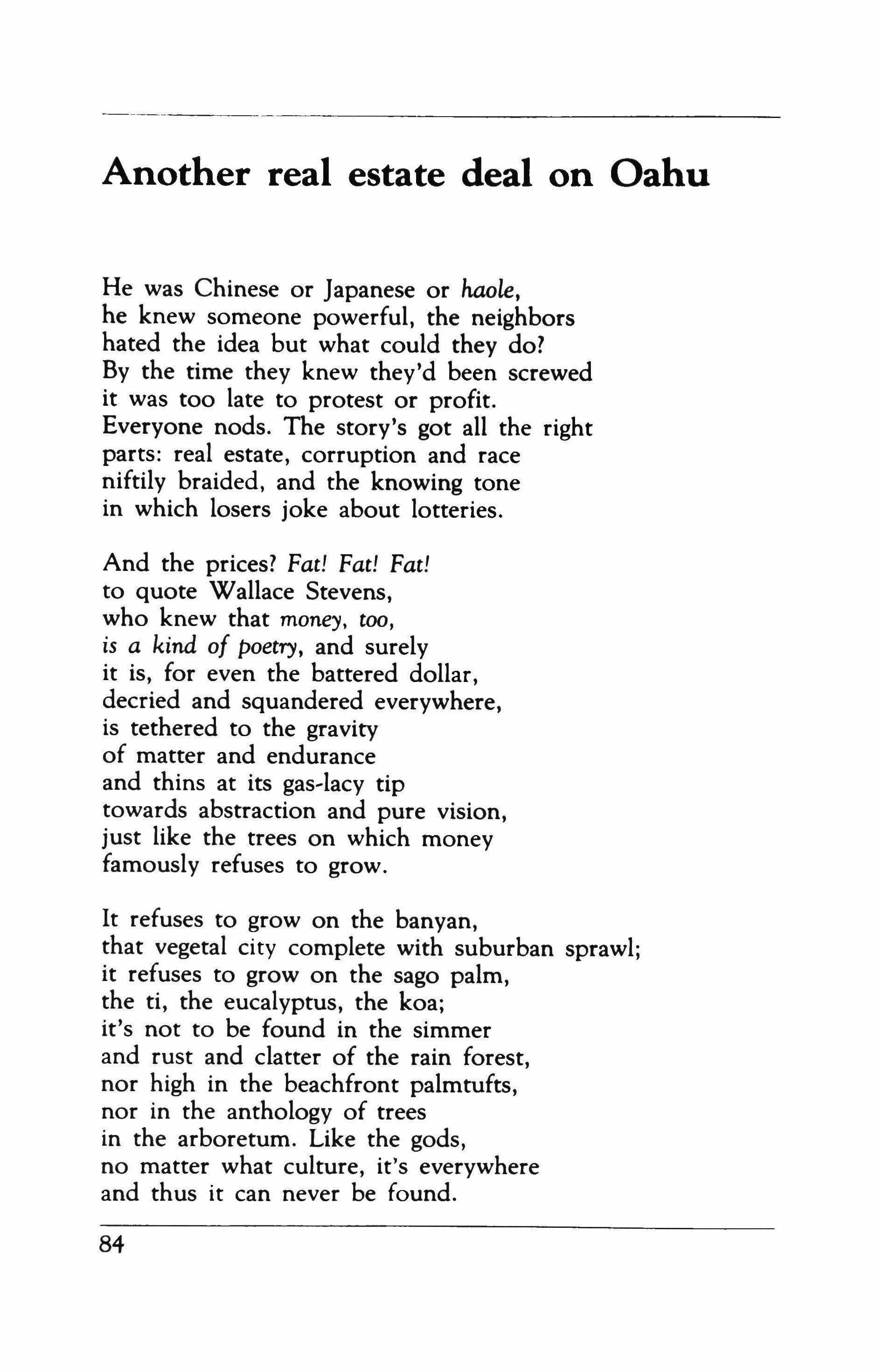
He was Chinese or Japanese or haole, he knew someone powerful, the neighbors hated the idea but what could they do? By the time they knew they'd been screwed it was too late to protest or profit. Everyone nods. The story's got all the right parts: real estate, corruption and race niftilv braided, and the knowing tone in which losers joke about lotteries.
And the prices? Fat! Fat! Fat! to quote Wallace Stevens, who knew that money, too, is a kind of poetry, and surely it is, for even the battered dollar, decried and squandered everywhere, is tethered to the gravity of matter and endurance and thins at its gas-lacy tip towards abstraction and pure vision, just like the trees on which money famously refuses to grow.
It refuses to grow on the banyan, that vegetal city complete with suburban sprawl; it refuses to grow on the sago palm, the ti, the eucalyptus, the koa; it's not to be found in the simmer and rust and clatter of the rain forest, nor high in the beachfront palmtufts, nor in the anthology of trees in the arboretum. Like the gods, no matter what culture, it's everywhere and thus it can never be found.
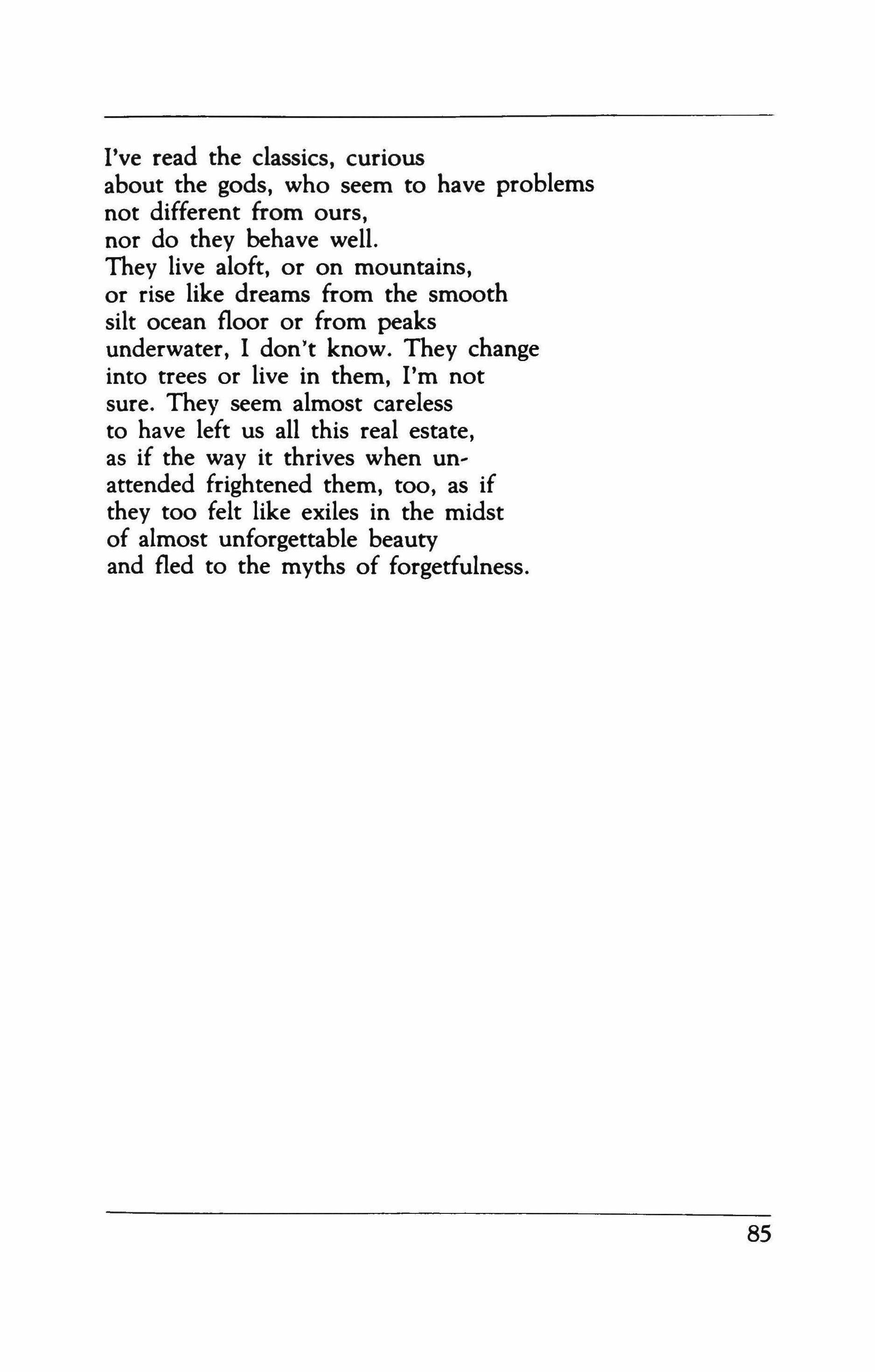
I've read the classics, curious about the gods, who seem to have problems not different from ours, nor do they behave well. They live aloft, or on mountains, or rise like dreams from the smooth silt ocean floor or from peaks underwater, I don't know. They change into trees or live in them, I'm not sure. They seem almost careless to have left us all this real estate, as if the way it thrives when unattended frightened them, too, as if they too felt like exiles in the midst of almost unforgettable beauty and fled to the myths of forgetfulness.
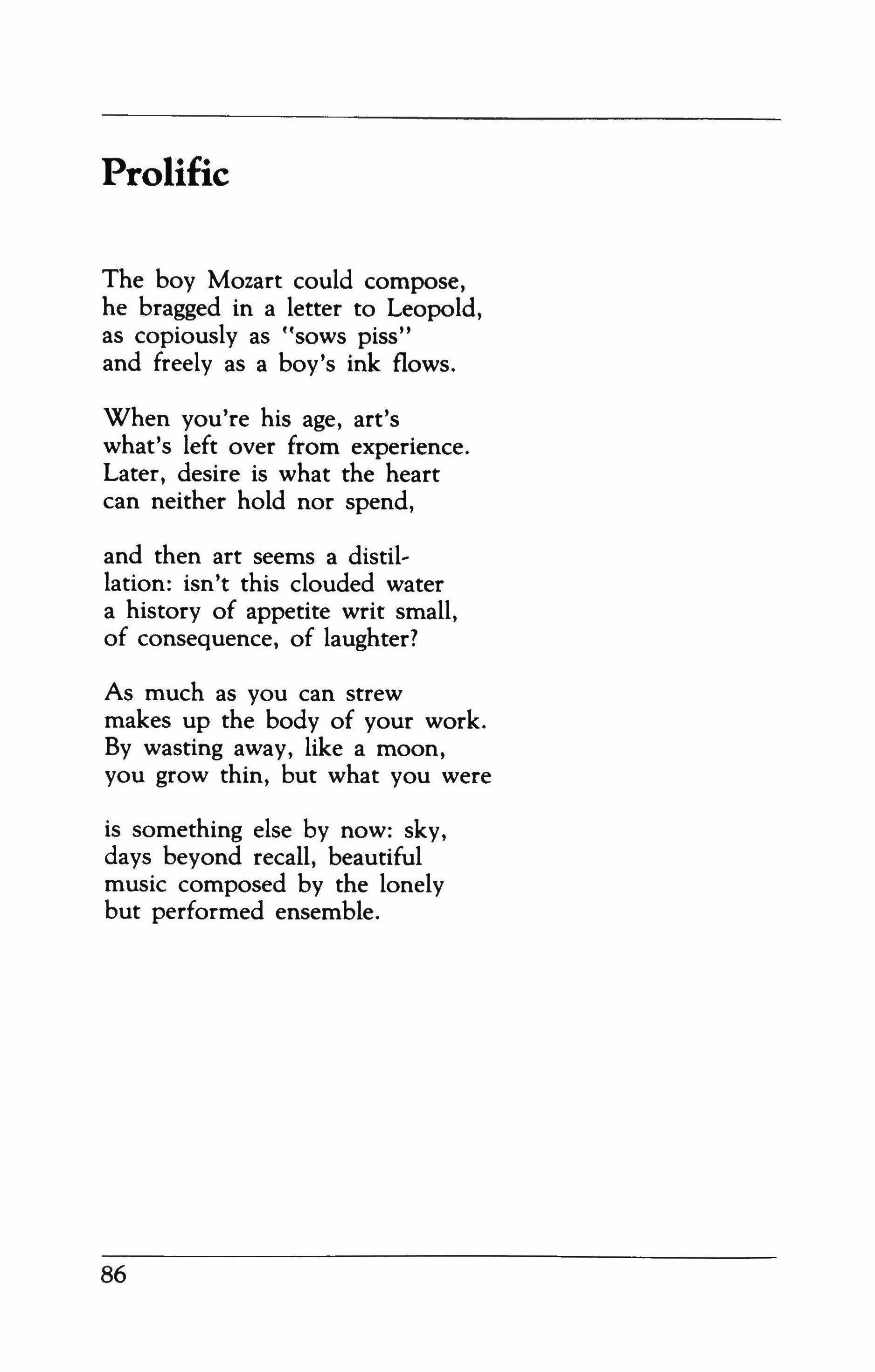
The boy Mozart could compose, he bragged in a letter to Leopold, as copiously as "sows piss" and freely as a boy's ink flows.
When you're his age, art's what's left over from experience. Later, desire is what the heart can neither hold nor spend, and then art seems a distil, lation: isn't this clouded water a history of appetite writ small, of consequence, of laughter?
As much as you can strew makes up the body of your work. By wasting away, like a moon, you grow thin, but what you were is something else by now: sky, days beyond recall, beautiful music composed by the lonely but performed ensemble.

When his mother ends each story the child can hear a bad wind break through the elms. It makes him think the trees, torn up, are going. Hansel and Gretel, Three Little Pigshe wants to crawl up inside them, he wants to be tucked safely in his mother's voice so he can't hear the window shaking, or that new man calling her name out from the other room.
But his mother says, this is the last time, and reads so impatiently, her voice already leaving, that the bad wind carries away the boy and girl and the three pigs, leaving the childwhen the light goes offawake inside another story, where the witch revives and the wolf blows down the walls.

The gregarious dark is shifting when she puts her second drink, the free one, half on the coaster. The tipped wine poised at the brim is the beginning of the bad girl she'll promise never to be again tomorrow, who can taunt him now to prove he doesn't love her and never could: her hand slides up his thigh until he tenses"My little prig, don't you want to fuck mel," the bad girl she couldn't be at home, his wife on ice. All he can do is smile back as though she's made a harmless good-natured joke, and struggle not to look around to see who's heard, who's watching. He wants to smash the wine glass in her face so he can know for once exactly what he's done wrong; but he places it instead back safely on the coaster quickly before she sees. Never cautious enough, he is prepared even if she knocks it over to go down on his hands and knees and wipe it up, kind and forgiving. In all ways careful to acquit himself so that tomorrow when she says she doesn't deserve him, he's too good, he can believe her Tomorrow will be his happy hour. There won't be anything she wouldn't do for him.
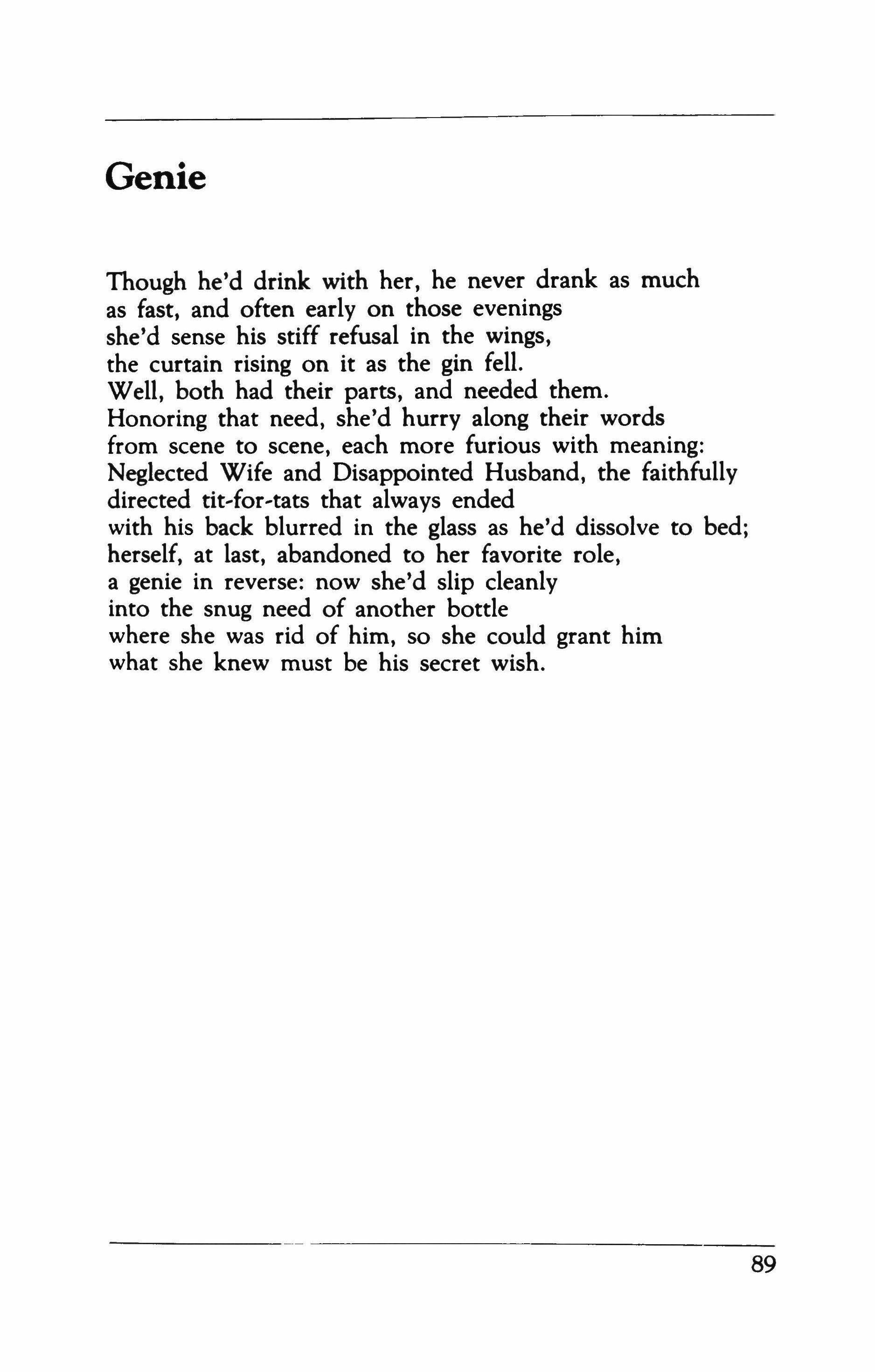
Though he'd drink with her, he never drank as much as fast, and often early on those evenings she'd sense his stiff refusal in the wings, the curtain rising on it as the gin fell. Well, both had their parts, and needed them. Honoring that need, she'd hurry along their words from scene to scene, each more furious with meaning: Neglected Wife and Disappointed Husband, the faithfully directed tit-for-tats that always ended with his back blurred in the glass as he'd dissolve to bed; herself, at last, abandoned to her favorite role, a genie in reverse: now she'd slip cleanly into the snug need of another bottle where she was rid of him, so she could grant him what she knew must be his secret wish.

In London in the early 19005 the music halls were frequently raided, but only for what was going on in the audience.
(Roller coasters, merry-go-rounds-e-we have a lot in common ) Boarding up the sky again, I realize how you tell my time. The nights are gaining on the days. I can't live on nickels much longer; there are more and more things I cannot bear to think when I'm alone: that cornets brought magicians to Bethlehem and persuaded the Chinese to invent mechanical clocks; that animals have no souls.
I've got friends in New York, Tokyo, Bombay, but I still need to know that you are conquering the world each night before you go to sleep. You, too, prefer the dark side of the moon; when I start to speak you touch me silent. This is trust, the place that children should be taken by adults. You point out the revolving bestiary overhead, the carousel of draft animals given evenings off and garlanded with stars. They take the evenings with them like a shipboard orchestra sinking in a storm. The mobility of music! My joyrides would be lost without it. Darkness is a moral lesson; silence, a world that isn't with us.
That's the past breathing behind us. Remember how Einstein fiddled his way across the Atlantic?

The show goes on. The beauty of summer upon us, and something in me is deep into winter, folding circuses, ocean liners frozen in mid-wave. The moon moves over the sun; my hand erases you completely. Have we ever been so close? In this eclipse-like light geese go hysterical and roosters screech at what they think is dawn. What I'd give to make the sun rise!
The first atomic test made blind men think the sun was rising early and in the wrong direction. Fermi collected side bets on the possible incineration of New Mexico. All in all, a working spectacle. Now Japan rocks gently on the Pacific and forgets. The Chinese sleep in their laundries. Boat people wait off every habitable coast. Giants with swollen fingers stare at each other across the oceans, lead their children out of sideshows and disaster movies, blink like animals awakening to warmer atmospheres, stroll through sleeping dormitories and take nocturnal communion with little mouths open like pink shellfish.
I never tire of your visible side, never love you more for your noble philosophy than for your desperado sideburns. You say you'll tell me about your life when it happens in September. I'll be waiting. Though more and more I want to watch your hair grow, your eyes open and shut, something in you becoming part of me, or maybe a fossilized seashell at twelve thousand feet. I can wait. You think you want a woman to ruin herself for you, but I know you protect your conquests as if they were your children and as frail as pure-blooded animals. I'll sleep through my nightmares, show my face in the general spectacle, wait it out. Something in us comes around to a terrible complexity, a thrill of indecipherable blood, the blessing of someone else who makes it possible to measure, sleep, dream, breathe.

The most incomprehensible ching about the universe is that it is comprehensible.
Albert EinsteinLife was good, the best thing that had happened. Theories fell from you in dazzling strokes: the nature of sound, the speed of light, unimagined spectacles far beyond the double dawns and sunsets of Alpha Centauri. You played the radio beautifully, and every morning you got the paper to see what you were worth. You had your disappointments (mirrors; history; the word "incomparably" ). You didn't want to live for sentimental reasons.
You expected nature to be well-intenrioned. She'd given you life, wished you no other calamitywasn't that what you wanted? But impossibilities accumulated. How do you bear your company? How can you make your arrangement of molecules-once a part of an ocean floor, a cumulostratus cloud, the feathering of a tiny coelurosaur-anything but another fossil in the rocks? You searched your mother's address books, but never discovered where you came from. Best to say you were born in an earthquake, certificates lost in the general calamity. You thought the insane were simply the ones who couldn't explain, but all your talk about how Africa made the Alps, India the Himalayas, means as much to the planet as whether or not the pterosaur could sing. It isn't answering. Now nothing you care about seems the slightest bit explicable. Someone brushes your shoulder and suddenly you aren't yourself anymore, only a jagged piece of bottle glass blinking to innumerable souls coming and going. Your passionate rummaging through ruins doesn't tell you

what really comforts the dead. As if another life were comparable!
The incompetencies of imagination! Why does nothing travel faster than the speed of light? How much beautiful music can there be? How much is beyond you is beyond you. Is no one, resting hands upon your shoulder blades, measuring your eventual wingspan, satisfied with you? Doesn't anyone see you as the blueshift of some luminous, approaching thing?
Nobody knows what you know. Remember that. You could look inside yourself one day and discover thirty seconds' worth of beautiful music, more than enough to restore a soul. You'll inherit the green address book, and, like your mother, send relatives of whom you are aware of nothing but explicit hunger, money. You'll undertake the happiness of hundreds, as if life weren't some solitary thing happening in the mind while dressing. You should be proud to share with no one the misfortune of not having been born: neither with conquerors; nor with convicts exchanging clothes with washlines; not with circus ghosts painted over by Picasso; nor even with tiny fish who glow when they feel romantic. And not with the person beside you, delicate, contingent, and with whom you wish to share your life as you remember it. Face to face, as if there were true memories, you ask her how long you have slept. She's been praying for you; she wants you to live forever. Tell her you're already saved. You've got meadowlarks growing in rows in your garden; you don't need stars to tell you they do sing. Face to face, you remember and you forget. You could live forever with outstretched arms if you only knew how the world would start again.
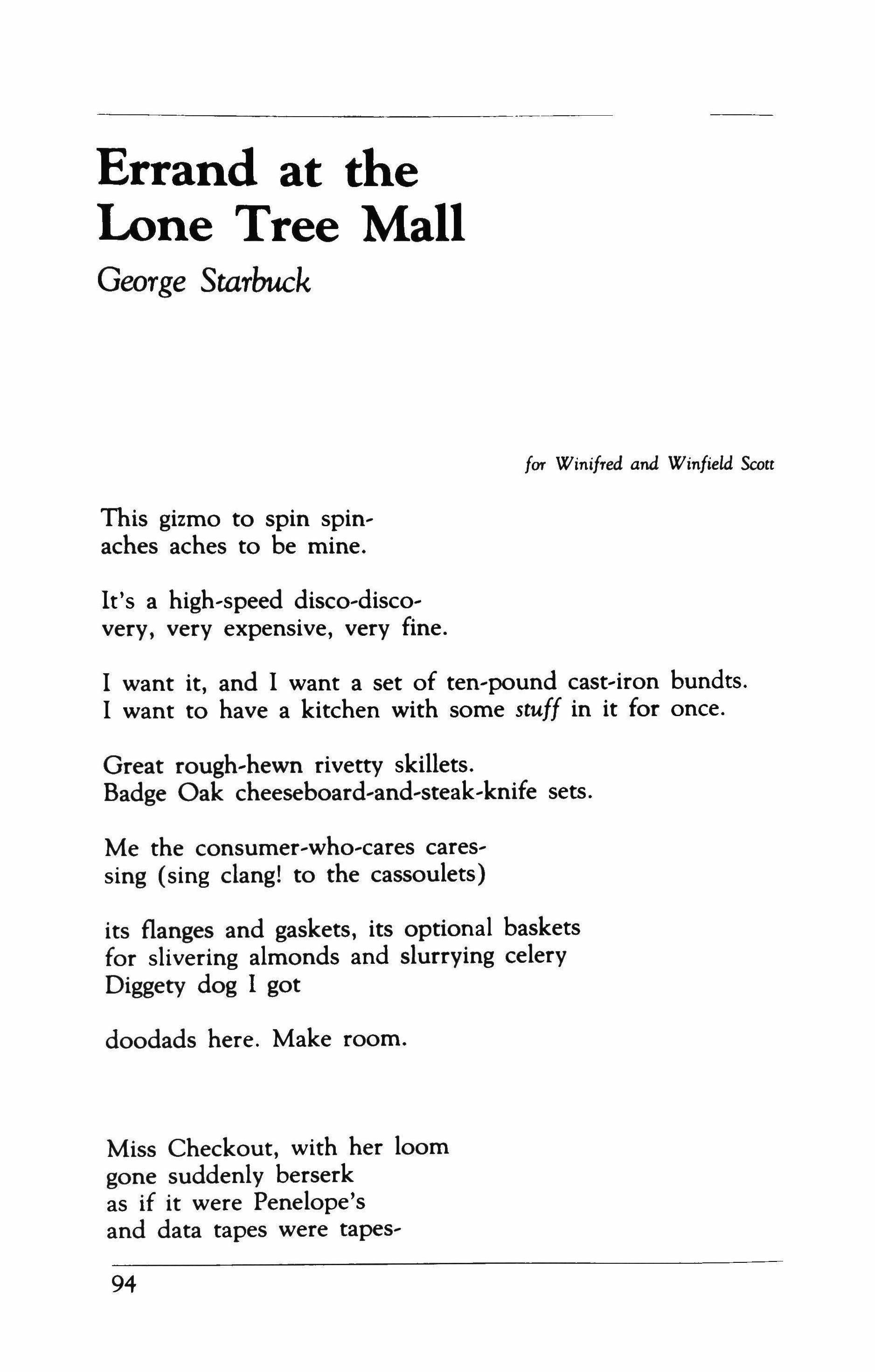
for Winifred and Winfield Scott
This gizmo to spin spin, aches aches to be mine.
It's a high-speed disco-discovery, very expensive, very fine.
I want it, and I want a set of ten-pound cast,iron bundts. I want to have a kitchen with some stuff in it for once.
Great rough-hewn rivetty skillets. Badge Oak cheeseboard-and-steak-knife sets.
Me the consumer-who-cares cares' sing (sing clang! to the cassoulets) its flanges and gaskets, its optional baskets for slivering almonds and slurrying celery Diggetv dog I got doodads here. Make room.
Miss Checkout, with her 100m gone suddenly berserk as if it were Penelope's and data tapes were tapes,
tries tries bonking it but bonking it won't work.
smiles. shrugs. Geez.
a la lavender-vender only wants to tease out and then bestow a beautiful empurpled pale memento.
slams back in a bob-and-weave like some counterpuncher of old. fee fie foe fum rattle-de-bap Behold!
gives me the slip. What then?
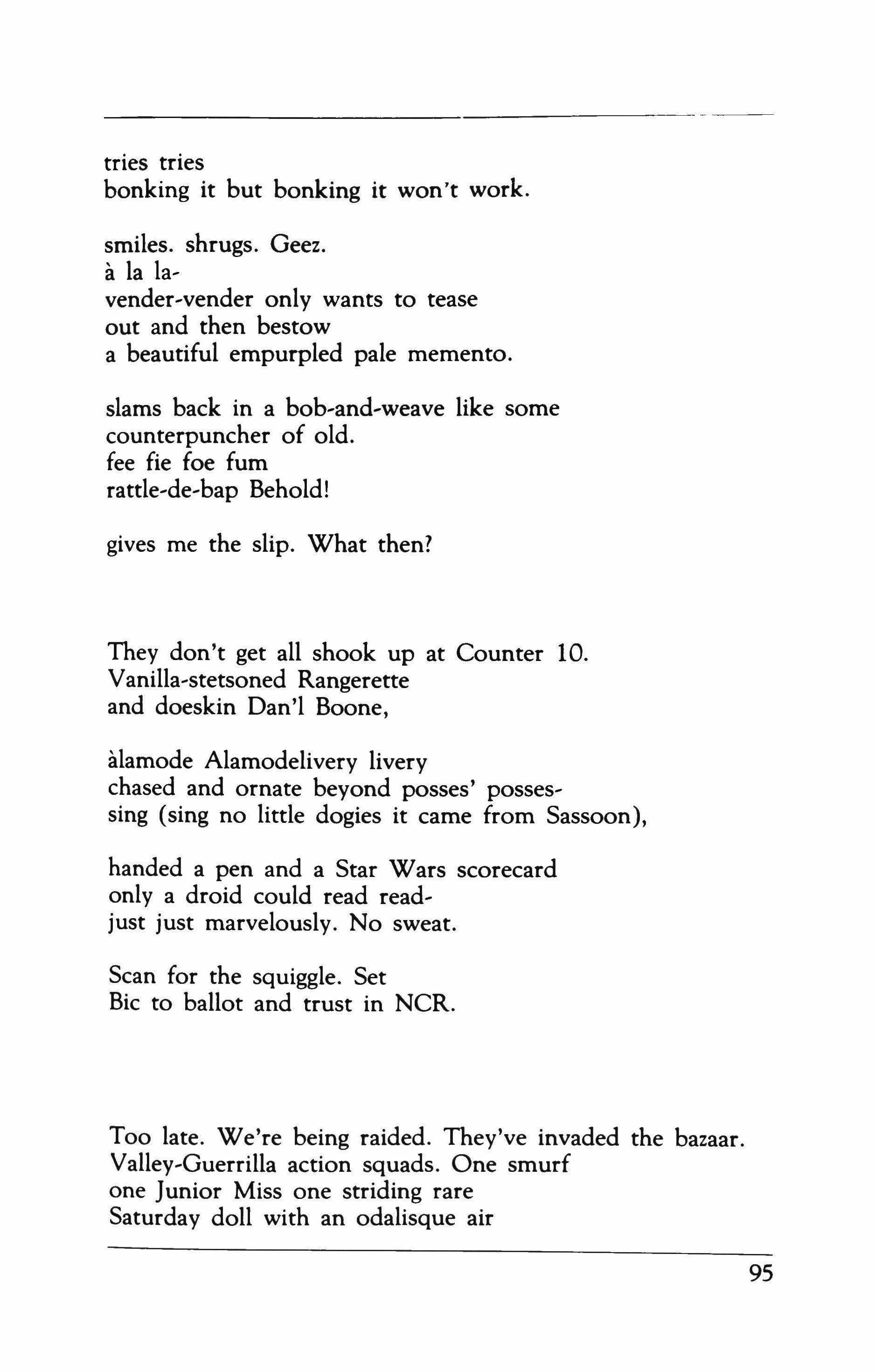
They don't get all shook up at Counter 10. Vanilla-stetsoned Rangerette and doeskin Dan'l Boone,
alamode Alamodelivery livery chased and ornate beyond posses' possessing (sing no little dogies it came from Sassoon),
handed a pen and a Star Wars scorecard only a droid could read readjust just marvelously. No sweat.
Scan for the squiggle. Set Bic to ballot and trust in NCR.
Too late. We're being raided. They've invaded the bazaar. Valley-Guerrilla action squads. One smurf one Junior Miss one striding rare Saturday doll with an odalisque air
and the lacquerwork of an Ingres ingressing confident as gods to where
hawser-humongous cableknit cardigans, Labradorean lobstermen's pullovers, indescribable Gordian oodles of made-in-jamaica macrame-mimicry cry to be hefted and sported and bunched and hugged.
Amazons Half-diaphanous half-shagrugg'd.
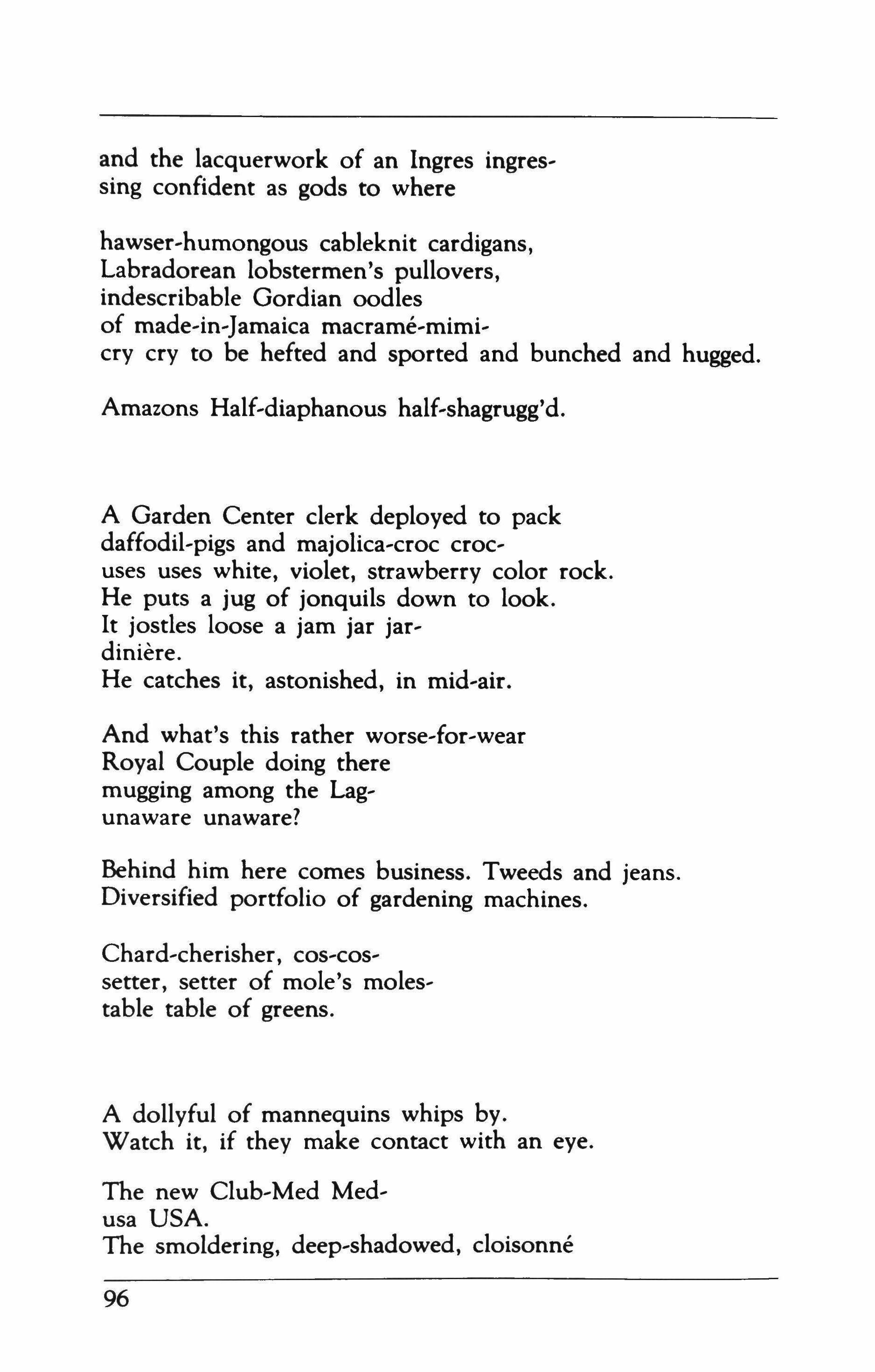
A Garden Center clerk deployed to pack daffodil,pigs and majolica-croc crocuses uses white, violet, strawberry color rock. He puts a jug of jonquils down to look. It jostles loose a jam jar jar' diniere.
He catches it, astonished, in mid-air.
And what's this rather worse'for'wear Royal Couple doing there mugging among the Lag, unaware unaware?
Behind him here comes business. Tweeds and jeans. Diversified portfolio of gardening machines.
Chard-cherisher, cos-cos
setter, setter of mole's molestable table of greens.
A dollvful of mannequins whips by. Watch it, if they make contact with an eye.
The new Club�Med Med� usa USA.
The smoldering, deep-shadowed, cloisonne
look of a ladv-of-Endor endorsing (sing poke it and pack it, punk)
the autosuggestive the autopsychic the seamy the dreamy the demisedated the drunk.
Askance and askancer (don't ask and don't answer) teleportated, they teeter through,
bound for another department. And vanished. Phew.

I look up and I'm there. I'm at my errand.
Blackness where a Krugerrand snuggles on its little mouselike pouch.
But this is where we saw the tiny sun-god.
Token of Incan incandescent descent.
Gone. Spent.
And here the happy affluent are holding Brobdignagian snifters up, deliberately, soberly. Ayup. Depth, body, bouquet. A better terrarium.
Curio-user and curio-user drift outside to the indoor street.
Demonstrators demonstrate devices. Ekco! The last of the Beat Beatrices rices
rutabagas erasers and raw meat. What an amazing feat!
Curio-user and curio-user turn to exchange comments, compare buys. Bango Zowie and Holy Moly the holv-of-holies lies here, in this person's eyes.
Curio-user and curio-user go meditate on that on his, or maybe her, tatami mat.
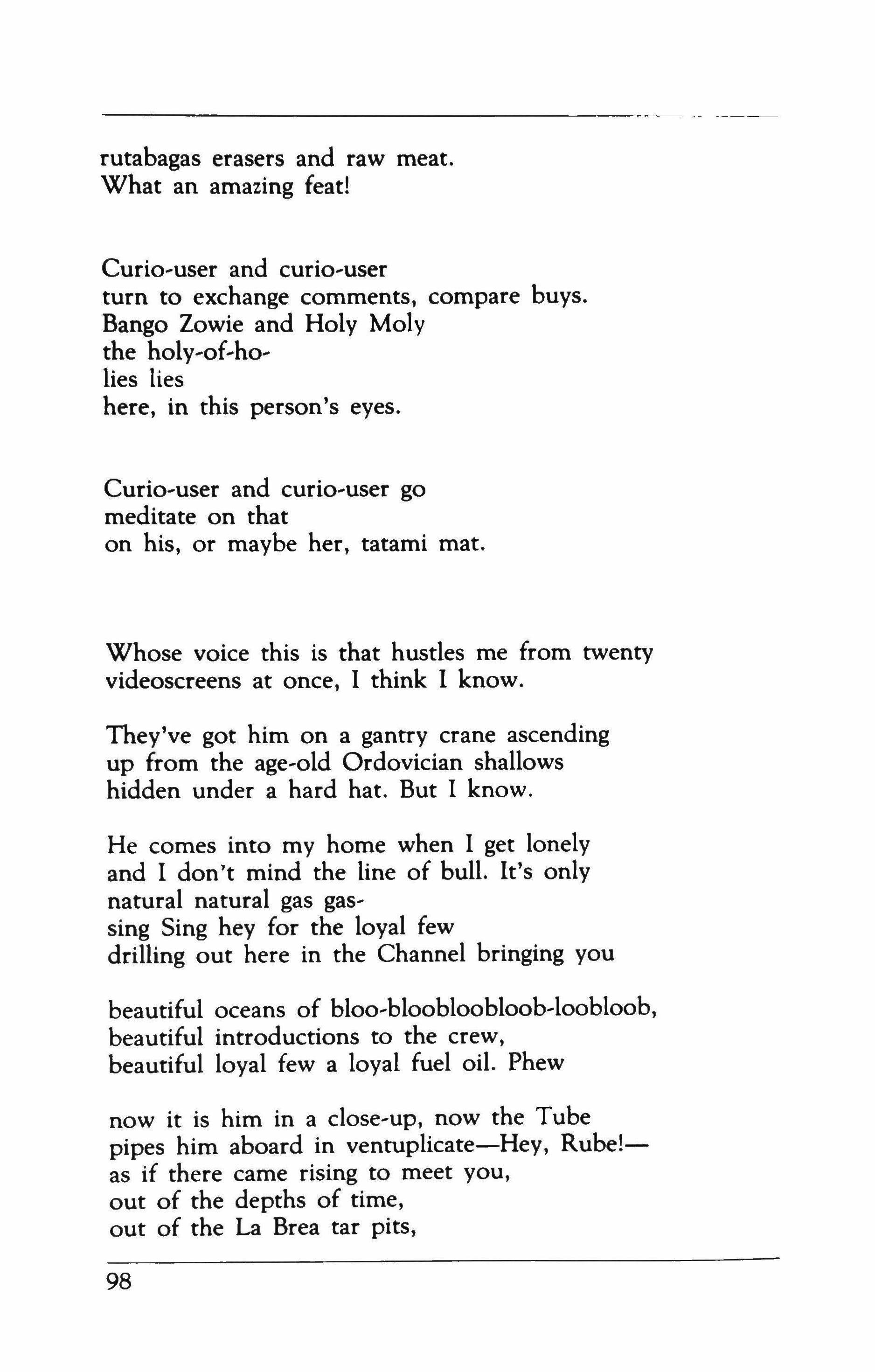
Whose voice this is that hustles me from twenty videoscreens at once, I think I know.
They've got him on a gantry crane ascending up from the age-old Ordovician shallows hidden under a hard hat. But I know.
He comes into my home when I get lonely and I don't mind the line of bull. It's only natural natural gas gassing Sing hey for the loyal few drilling out here in the Channel bringing you
beautiful oceans of bloo-bloobloobloob-loobloob, beautiful introductions to the crew, beautiful loyal few a loyal fuel oil. Phew
now it is him in a close-up, now the Tube pipes him aboard in ventuplicate-Hey, Rube!as if there came rising to meet you, out of the depths of time, out of the La Brea tar pits,
this pained, voracious, brea-breathing Thing.
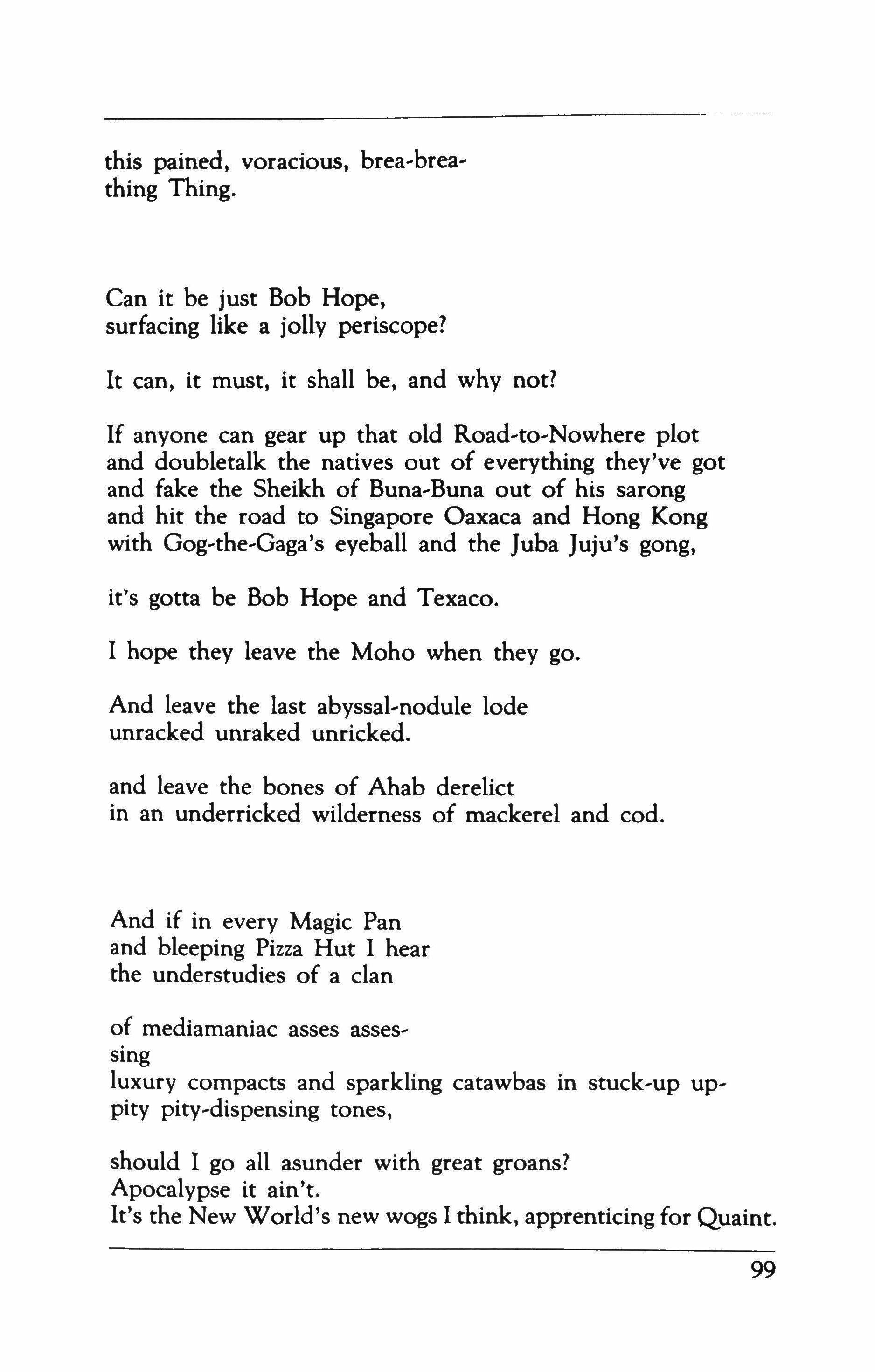
Can it be just Bob Hope, surfacing like a jolly periscope?
It can, it must, it shall be, and why not?
If anyone can gear up that old Road-to-Nowhere plot and doubletalk the natives out of everything they've got and fake the Sheikh of Buna-Buna out of his sarong and hit the road to Singapore Oaxaca and Hong Kong with Gog-the-Gaga's eyeball and the Juba Juju's gong, it's gotta be Bob Hope and Texaco.
I hope they leave the Moho when they go.
And leave the last abyssal-nodule lode unracked unraked unricked.
and leave the bones of Ahab derelict in an underricked wilderness of mackerel and cod.
And if in every Magic Pan and bleeping Pizza Hut I hear the understudies of a clan of mediamaniac asses assessing luxury compacts and sparkling catawbas in stuck-up uppity pity-dispensing tones,
should I go all asunder with great groans? Apocalypse it ain't. It's the New World's new wogs I think, apprenticing for Quaint.
Give us a while to practice up. Land sakes.

When the last of the great makes makes its out-of-gas gasping ping and sputtering clunk,
you'll find me (if I'm still for finding) sunk in a fine paroxysm of relief.
I'll take my feathers like an Injun Chief and join the gurus and conundrum-givers. I'll squat among the ruins of Three Rivers and watch the riffraff driftwood drifting by and spend the end of an era erasing (sing alms-for-the-gaga sing rockbottom souvenir) smudges out of the postcard Pittsburgh sky.
Whole length of the Mall. Individual giftcrafts, stall by stall.
The winking Mona Lisa and the smiling Paul Revere on the almost-pewter cup.
a huckster dressed in buckskins piling triplescoop conestoga-wagons up. A specialist in scrimshaw, done to the scale.
This is the way the whaleroad and the whale, four oarsmen and a peg-leg legend end.
Take notice. Price an item. Be a friend.
Look at us. All this shit. It's downright canny.
100
Our turn to play trinketer and nanny; to kowtow, and keep quipus, and climb ropes.
Our turn to do deep-dyed horoscopes.
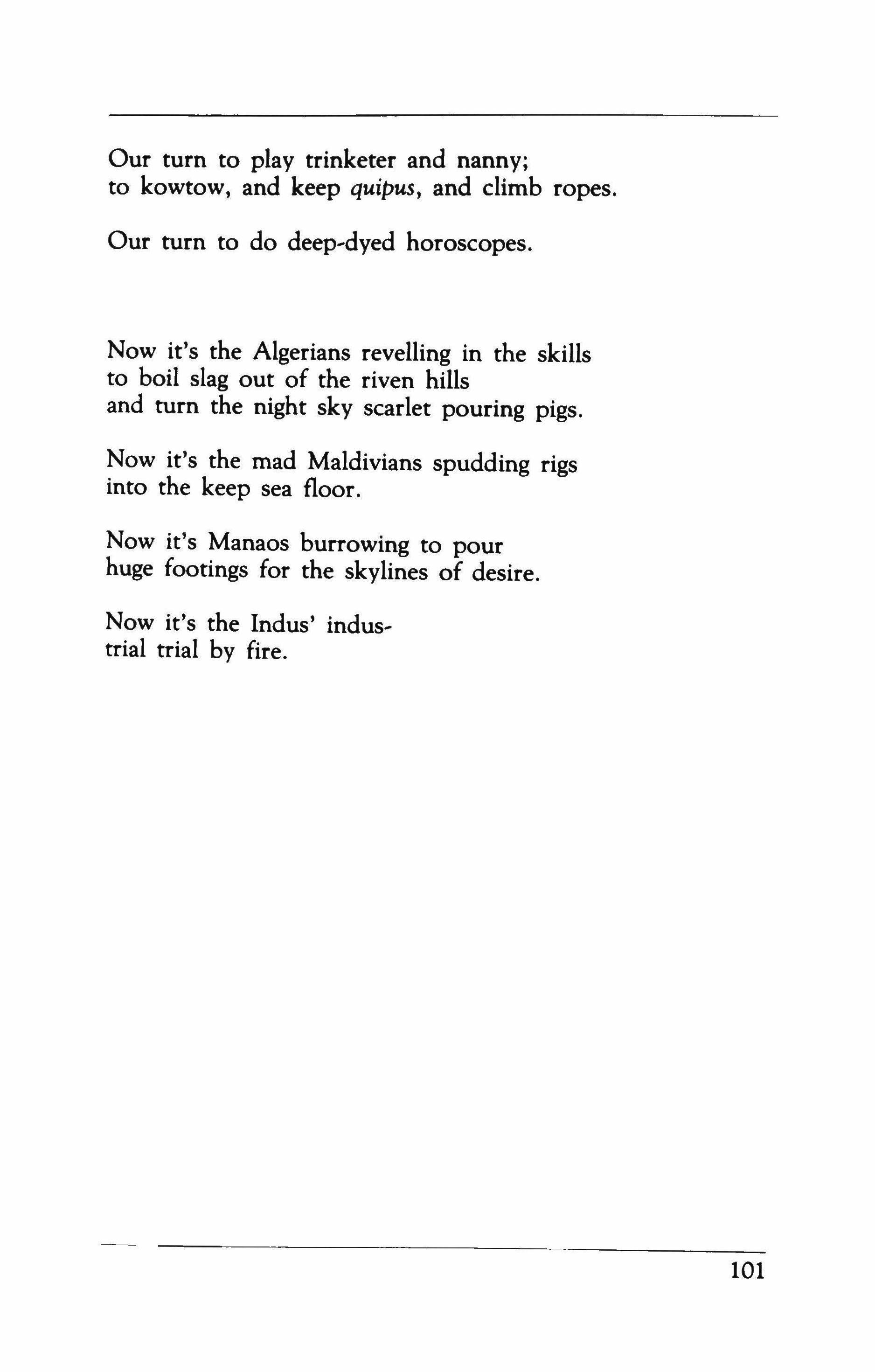
Now it's the Algerians revelling in the skills to boil slag out of the riven hills and turn the night sky scarlet pouring pigs.
Now it's the mad Maldivians spudding rigs into the keep sea floor.
Now it's Manaos burrowing to pour huge footings for the skylines of desire.
Now it's the Indus' indus, trial trial by fire.

Through tall ash, through stunning cidery air, under winesaps bobbing on every hill, past leaf-littered fieldstone walls mute as farmwomen bent in rows, around weathered clapboard barns, those veterans leaning casually, quaint as postcards from the dark drugstore that never closes, catching the sour gargle of trucks headed the other way, we descend
into the Valley, slow, ease our stop-and-go route through painted brick cottages huddled more than a century, and speak of heartpine floors sloped so badly everyone leans toward the fetid creek. Each foundation, like ancestors' hips, is cracked, patched, and recracking, but still holds its house along the street that keeps a false yellow front on the place used by Jackson to plot raids dashing and thunderous as the tattering Bible he slept with. It's darker than a mapcase now, closed.
I promise we'll stop another time, stay long enough to see boots, old orders,
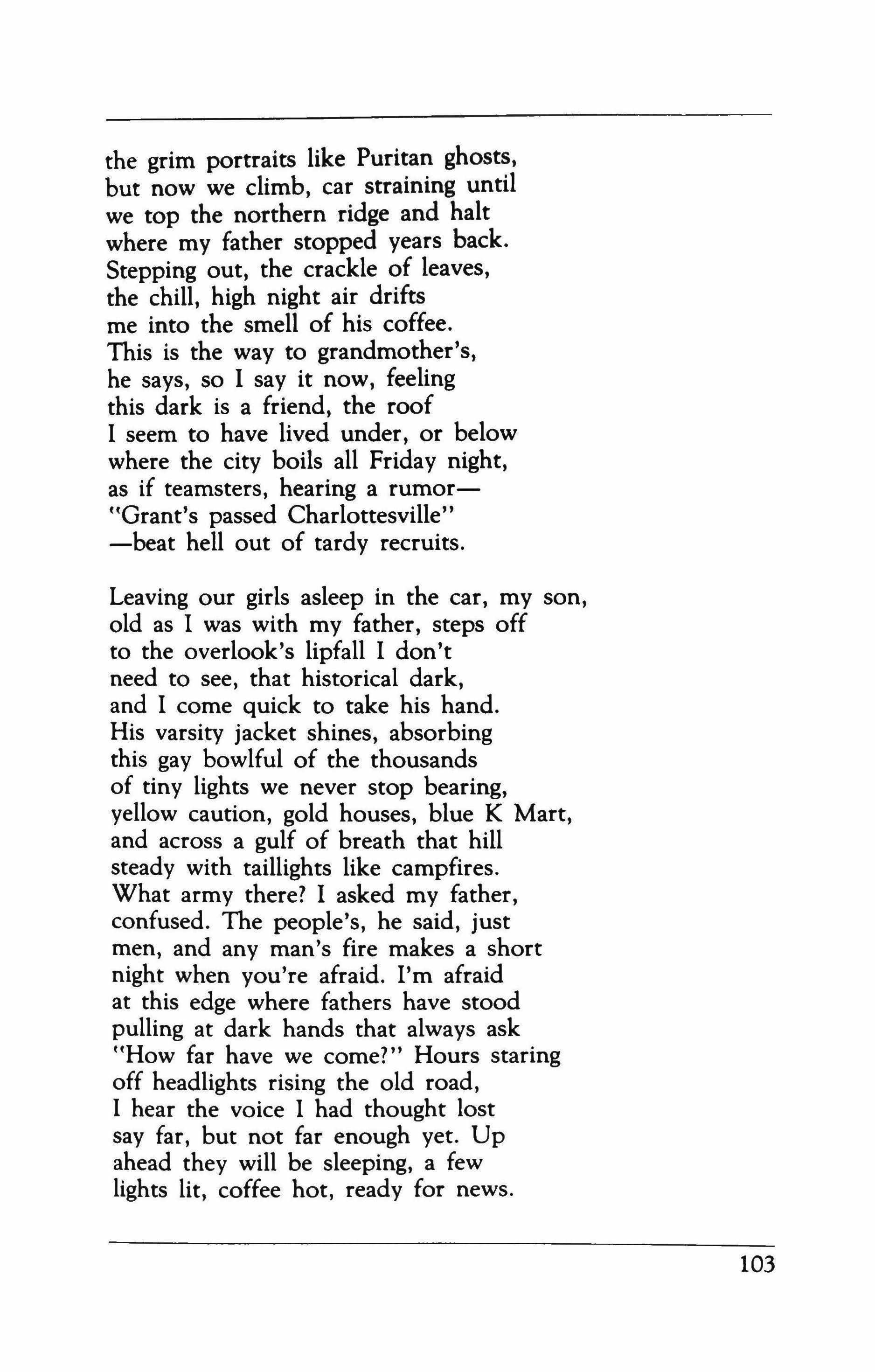
the grim portraits like Puritan ghosts, but now we climb, car straining until we top the northern ridge and halt where my father stopped years back. Stepping out, the crackle of leaves, the chill, high night air drifts me into the smell of his coffee. This is the way to grandmother's, he says, so I say it now, feeling this dark is a friend, the roof I seem to have lived under, or below where the city boils all Friday night, as if teamsters, hearing a rumor"Grant's passed Charlottesville" -beat hell out of tardy recruits.
Leaving our girls asleep in the car, my son, old as I was with my father, steps off to the overlook's lipfall I don't need to see, that historical dark, and I come quick to take his hand. His varsity jacket shines, absorbing this gay bowlful of the thousands of tiny lights we never stop bearing, yellow caution, gold houses, blue K Mart, and across a gulf of breath that hill steady with taillights like campfires. What army there? I asked my father, confused. The people's, he said, just men, and any man's fire makes a short night when you're afraid. I'm afraid at this edge where fathers have stood pulling at dark hands that always ask "How far have we come?" Hours staring off headlights rising the old road, I hear the voice I had thought lost say far, but not far enough yet. Up ahead they will be sleeping, a few lights lit, coffee hot, ready for news.

The sun-bladed cold of winter knifes across his throat and silently his spine bends him with old backache, the bruise of sleeping in stepped doorways, but you have no news, you don't stop at his intersection where the gray cathedral mindlessly tolls and wind plays the black pipes of the spear-headed fence. It isn't that hooking you midstride, but the face flaring, almost boyish, and the supplicant's nails broken with dirt. It's someone wheezing at your breast, head heaved up so the light plays in the beardknots, your brother of the shades, not begging, just letting you know this turf's his, and the sun and the music and the rainbow-tattered coat. He wants you to see how he puffs, how words hurt. Toothache, he says, opening wide, as if he were a lion your head was meant for, then, but I can bite good. This has happened before. He'll let you go, you'll think you understand as you
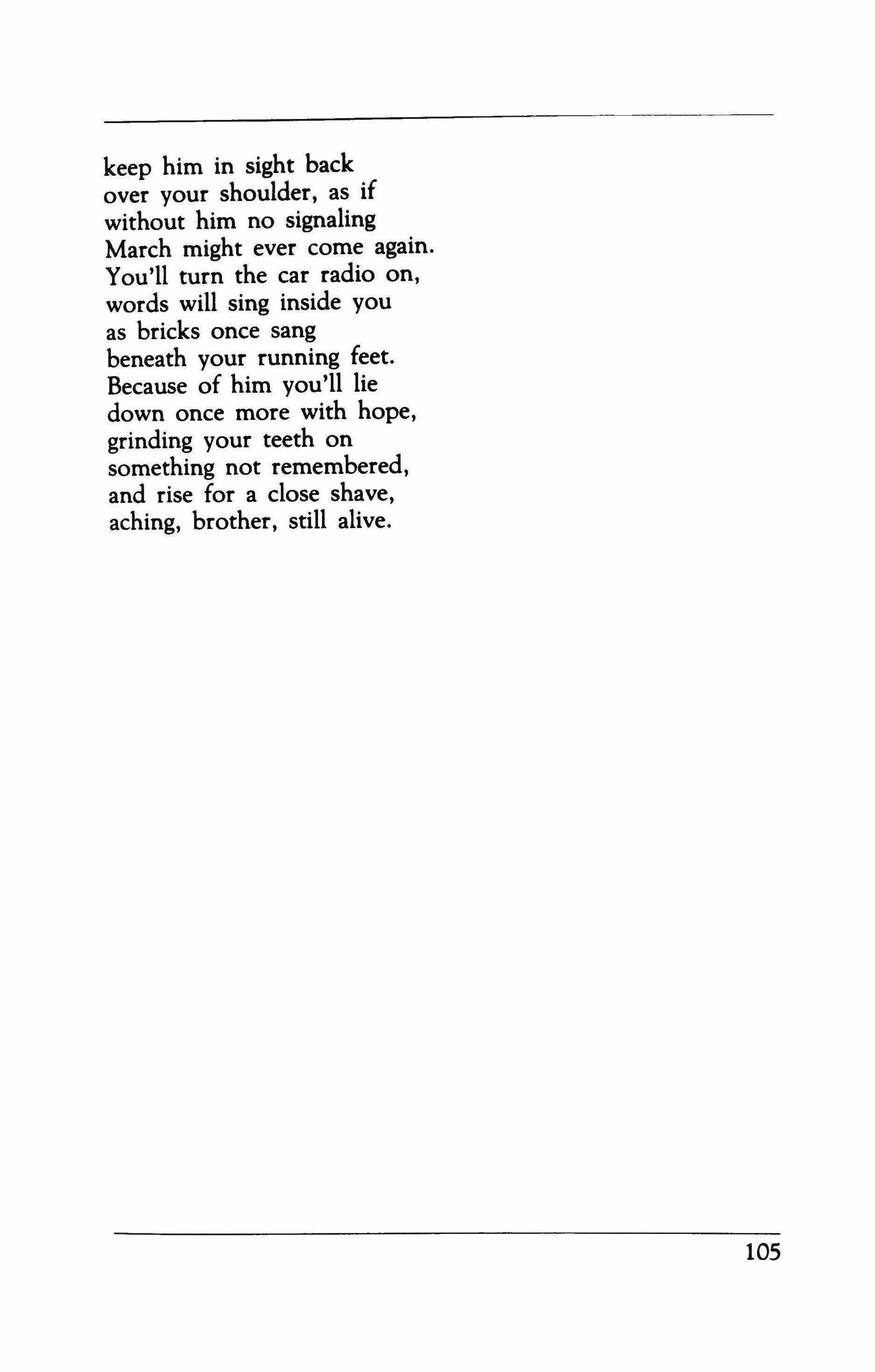
keep him in sight back over your shoulder, as if without him no signaling March might ever come again. You'll turn the car radio on, words will sing inside you as bricks once sang beneath your running feet. Because of him you'll lie down once more with hope, grinding your teeth on something not remembered, and rise for a close shave, aching, brother, still alive.

Seven days out of every June, I lived with my ancestors. Here's my grandfather's block-long La Salle, bright black, the back seat big enough I think I could still lie on my spine like the bumping dead, and touch no door.
Out there in heat's haze, carting the basket, grandfather in front of grandfather walks, dusky, leaf-shadowed through the rows of peaches, overripe, fuzz-gold heads I am going to wash and take to the James River.
He limps, a good man with a nervous tic, who can't forget the black girl on his bumper, that long ago shriek of brakes like cannon before a muffled explosion. His walk is his grandfather's, deliberate and prudent,
as he entered the church, that first day back on the farm, picking through caisson ruts along the Chickahominv, past Allen's orchard where he stopped to lie dreaming peaches he would raise big as melons, his body calm
remembering the blue suit he'd seen starting to bloat. To his grandson he would say, those Yankees at Monroe, what are they but farmers, big-toothed, lonesome boys like us? He is only words to me, as I float
deeper into this summer tale that trembles the flesh of my grandfather's cheeks. «Those blueboys got a taste for peach, and for two girls on our neighbor's farm. These strains were named for them two." I watch juice
slide from his lips, pearly and glistening in the sun. In dark dribbles they'd come, three or four, past the barn-c-t'some randy, abusive, good targets once-." «Harry," my grandmother whines, «don't. He's too young."
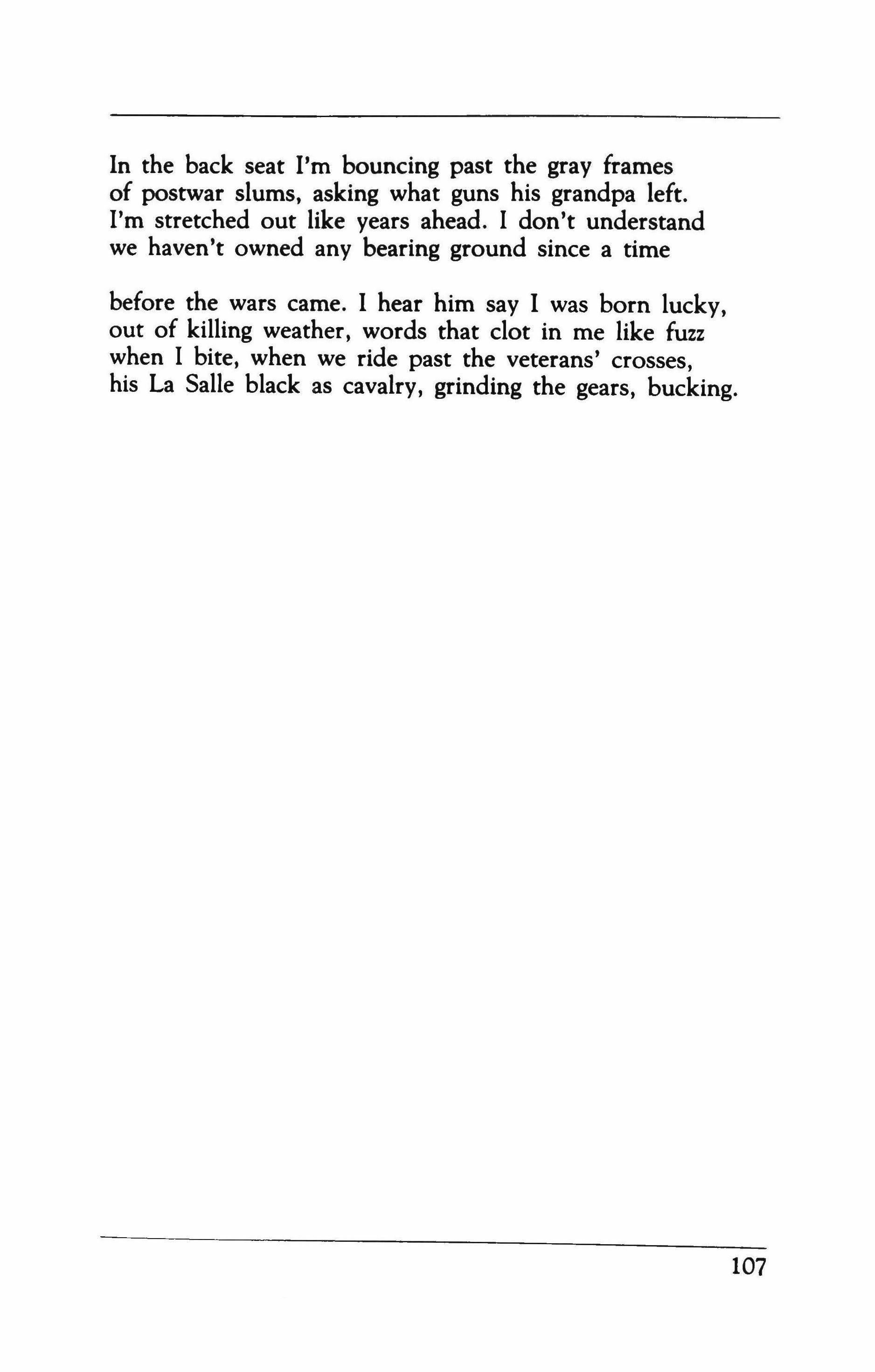
In the back seat I'm bouncing past the gray frames of postwar slums, asking what guns his grandpa left. I'm stretched out like years ahead. I don't understand we haven't owned any bearing ground since a time before the wars came. I hear him say I was born lucky, out of killing weather, words that clot in me like fuzz when I bite, when we ride past the veterans' crosses, his La Salle black as cavalry, grinding the gears, bucking.
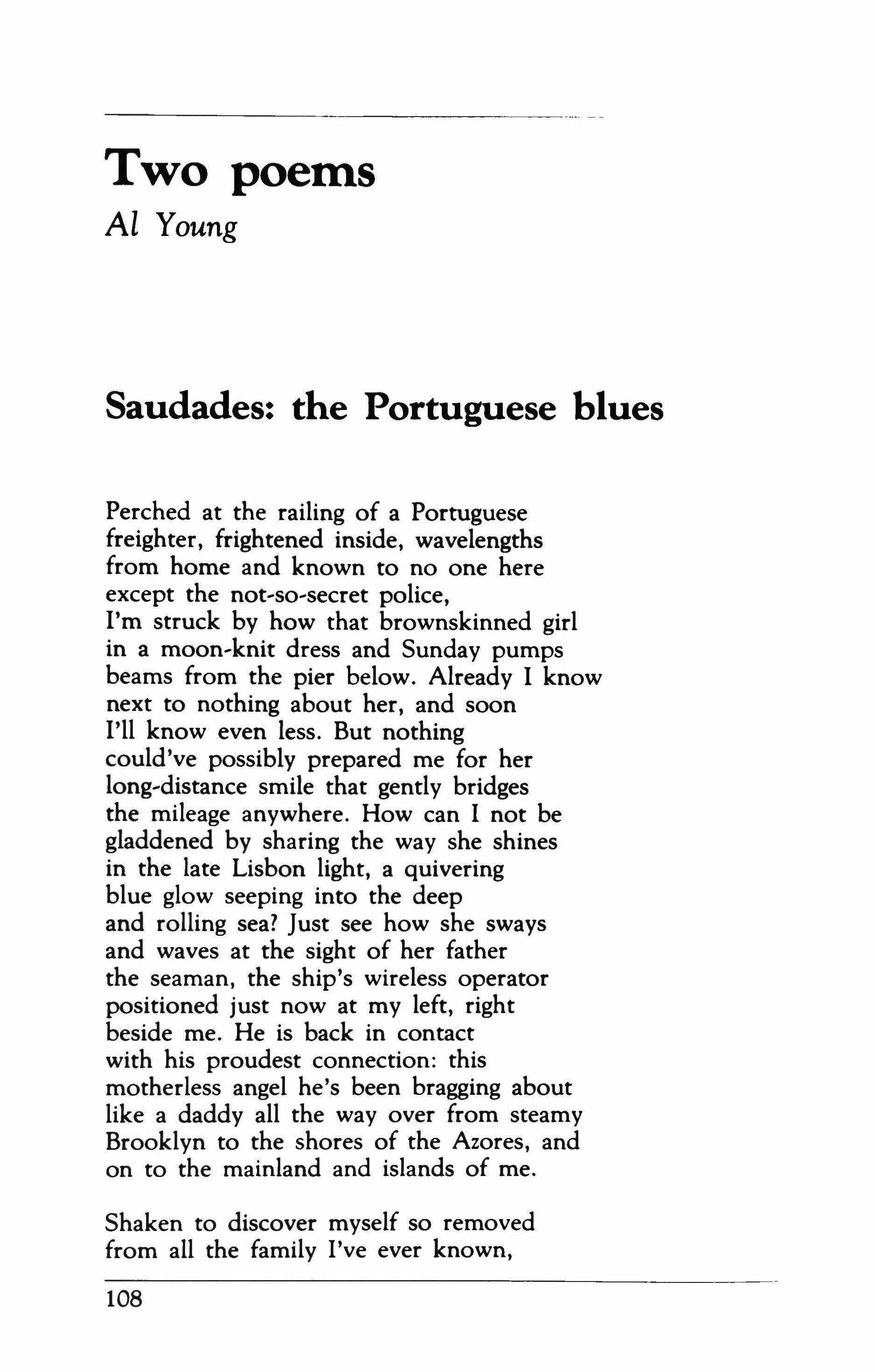
Perched at the railing of a Portuguese freighter, frightened inside, wavelengths from home and known to no one here except the not,so'secret police, I'm struck by how that brownskinned girl in a moon-knit dress and Sunday pumps beams from the pier below. Already I know next to nothing about her, and soon I'll know even less. But nothing could've possibly prepared me for her long-distance smile that gently bridges the mileage anywhere. How can I not be gladdened by sharing the way she shines in the late Lisbon light, a quivering blue glow seeping into the deep and rolling sea? Just see how she sways and waves at the sight of her father the seaman, the ship's wireless operator positioned just now at my left, right beside me. He is back in contact with his proudest connection: this motherless angel he's been bragging about like a daddy all the way over from steamy Brooklyn to the shores of the Azores, and on to the mainland and islands of me.
Shaken to discover myself so removed from all the family I've ever known,
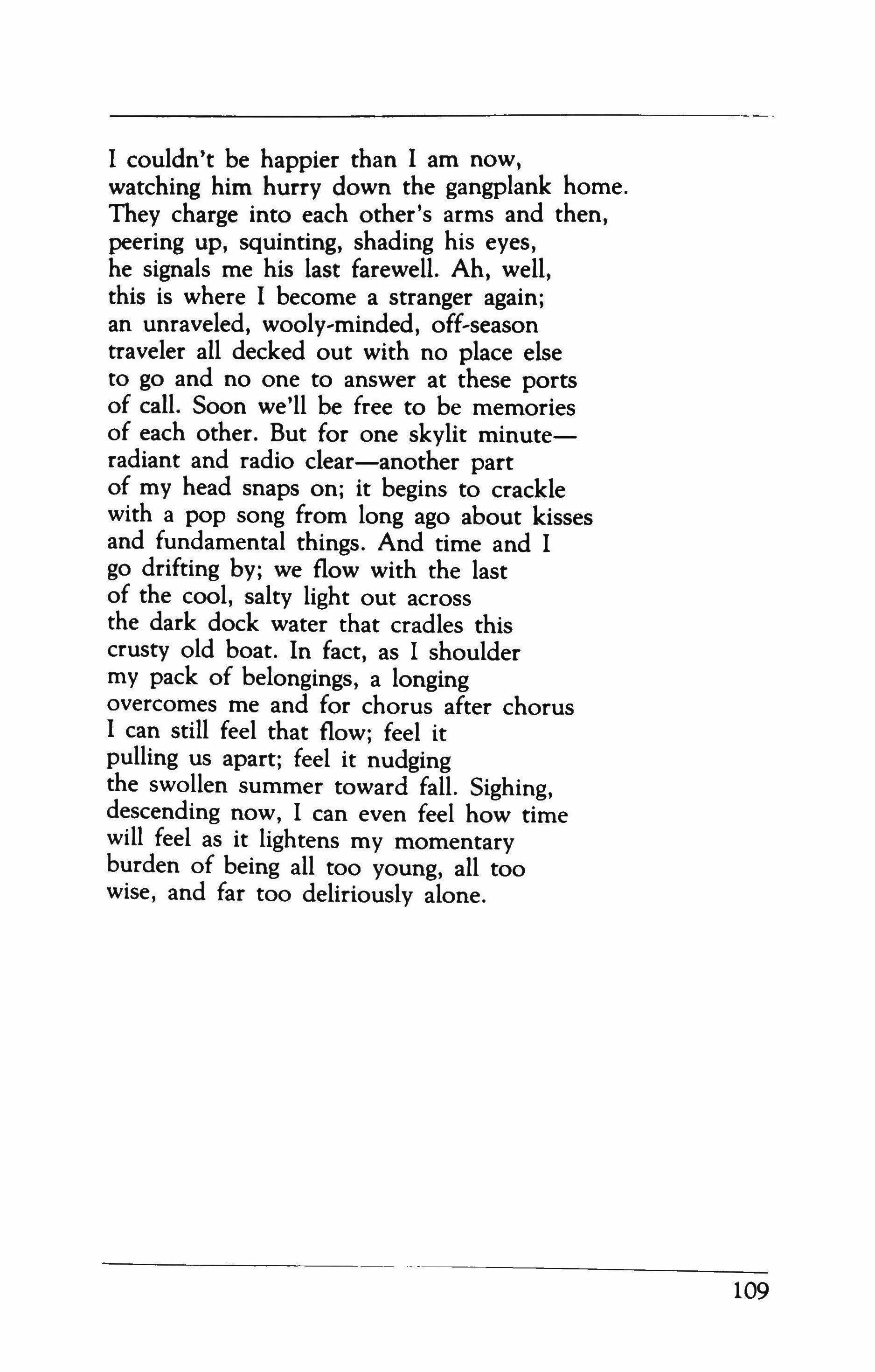
I couldn't be happier than I am now, watching him hurry down the gangplank home. They charge into each other's arms and then, peering up, squinting, shading his eyes, he signals me his last farewell. Ah, well, this is where I become a stranger again; an unraveled, wooly-minded, off-season traveler all decked out with no place else to go and no one to answer at these ports of call. Soon we'll be free to be memories of each other. But for one skvlit minuteradiant and radio clear-another part of my head snaps on; it begins to crackle with a pop song from long ago about kisses and fundamental things. And time and I go drifting by; we flow with the last of the cool, salty light out across the dark dock water that cradles this crusty old boat. In fact, as I shoulder my pack of belongings, a longing overcomes me and for chorus after chorus I can still feel that flow; feel it pulling us apart; feel it nudging the swollen summer toward fall. Sighing, descending now, I can even feel how time will feel as it lightens my momentary burden of being all too young, all too wise, and far too deliriously alone.

You bet it would've made a tender movie! If only someone had been flighty enough to capture the shape of what turned out to be our last days alone, the end of a rough journey that dulled every sense but touch. Heroically juvenile, lighter than light, we talked what we felt, but never thought much. We were Romeo and Juliet night after night. It was like we'd sailed from heaven in a jet, copilots, cool but glorious, and landed our sullen craft too artfully-poets yet; runaways on life's slick runway of expanded unconsciousness. Maybe. Who knows for sure? But Ruby and the Romantics came out that year with a sweet-nothing single: hot, airy and pure enough to hold us aloft by heart and by ear.

It's going to snow in a few days. I remember Last year, I remember my sadnesses In a corner by the fire. If you had asked me then, Whafs wrong? I would have said, Let me be, I would have said, It's nothing. I brooded, all last winter, in my room, While the snow was falling heavily outside, And all that thought was for nothing. Now, as then, I am smoking my favorite pipe, with the amber tip. Myoid oaken cabinet still scents my room. But I was stupid then, because all those things Could not be otherwise, and it is vain
To want to drive out the things that one knows too well. Why then do we think or speak? It still seems odd: Our tears and our kisses say nothing And yet we understand them, and the footsteps Of a friend approaching are sweeter than sweet words. We have even baptized the stars, without thinking That they have no need of our names; and our numbers,
Proving that the beautiful comets into the dark Will surely pass, cannot hasten their passing away And even now I wonder, where are mv old sadnesses

Piled deep with last year's snows? I can scarcely recall them. Now I would say, Let me be, I would say it's nothing, If into my room you came to ask, What's wrong?
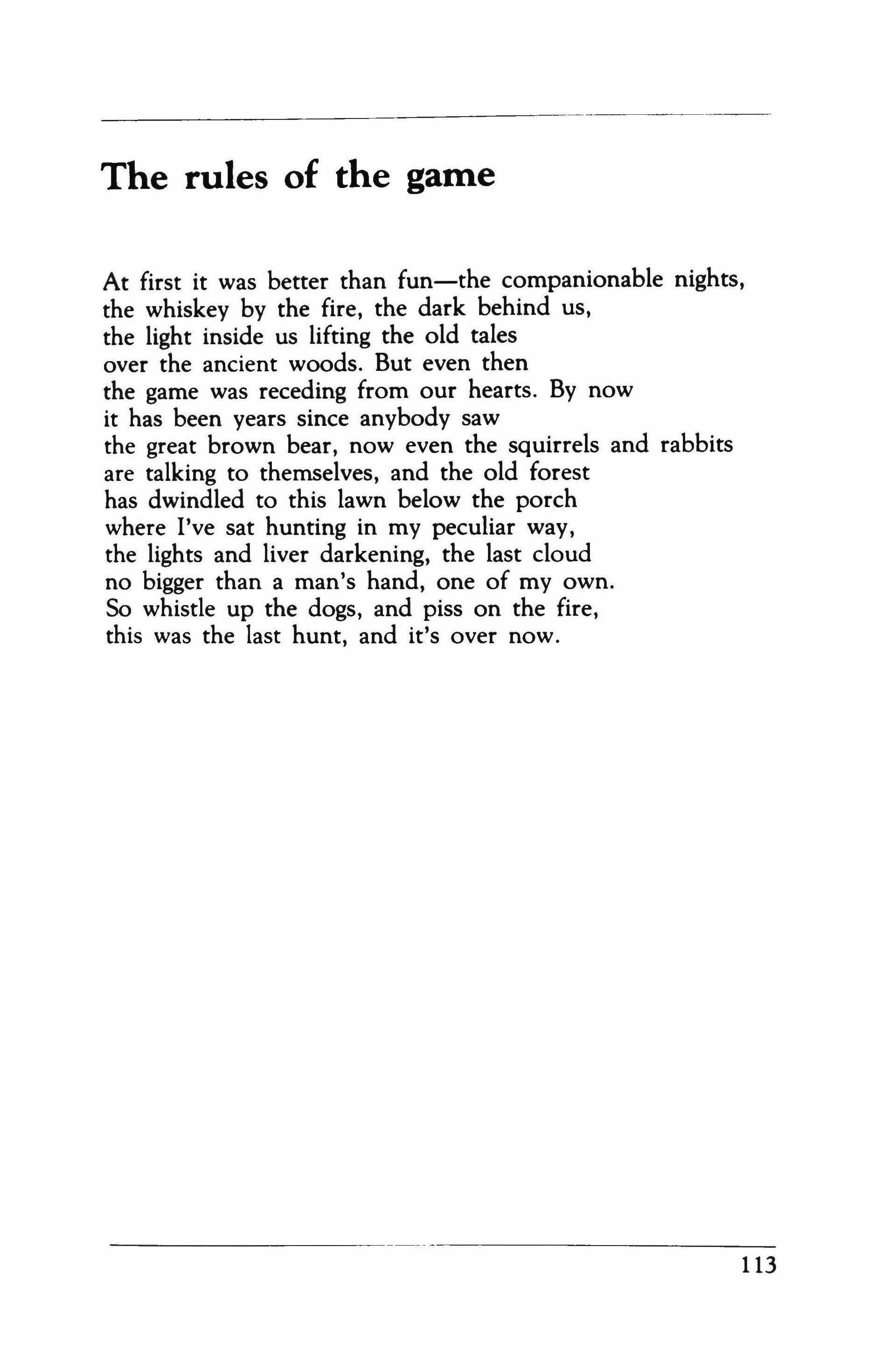
At first it was better than fun-the companionable nights, the whiskey by the fire, the dark behind us, the light inside us lifting the old tales over the ancient woods. But even then the game was receding from our hearts. By now it has been years since anybody saw the great brown bear, now even the squirrels and rabbits are talking to themselves, and the old forest has dwindled to this lawn below the porch where I've sat hunting in my peculiar way, the lights and liver darkening, the last cloud no bigger than a man's hand, one of my own. So whistle up the dogs, and piss on the fire, this was the last hunt, and it's over now.

By imputing none of his miseries to himself, he continued to act upon the same principles, and to follow the same path; was never made wiser by his sufferings, nor preserved by one misfortune from falling into another. He proceeded throughout his life to tread the same steps on the same circle.
-from Johnson'S Life of Savage
He hugged his sorrow like a plot of land, And walked like an assassin through the town, And looked at men and did not like them. But trembled if one passed him with a froum.
-from "The Bard," W. H. Auden
In an interview two years before he killed himself, John Berryman described the lucky artist as one "who is presented with the worst possible ordeal that will not actually kill him. What happens in my poetic work in the future will probably largely depend on being knocked in the face and thrown flat, and given cancer I hope to be nearly crucified." By these standards, Berryman was lucky right from the start. His father committed suicide when he was twelve; his mother was a domineering and possessive woman from whose disruptive influence he was to suffer throughout his life. Manicdepressive and suicidal himself, by his midthirties he was an alcoholic and drug abuser, and this, together with his compulsive womanizing, drove him through two marriages and nearly destroyed a third, turning his life into a monotonous round of crisis, breakdown and hospitalization. By fifty, with the publication of 77 Dream Songs, he was nationally recognized as one of the most distinguished poets of his generation; yet even recognition became another source of pain, one more ordeal to suffer through, causing him to worry over his prestige and reputation like a sweaty broker at the stock exchange.
The myth of the tragic artist, whose unhappiness is the inevitable price he pays for artistic power, was an article of faith for the poets of
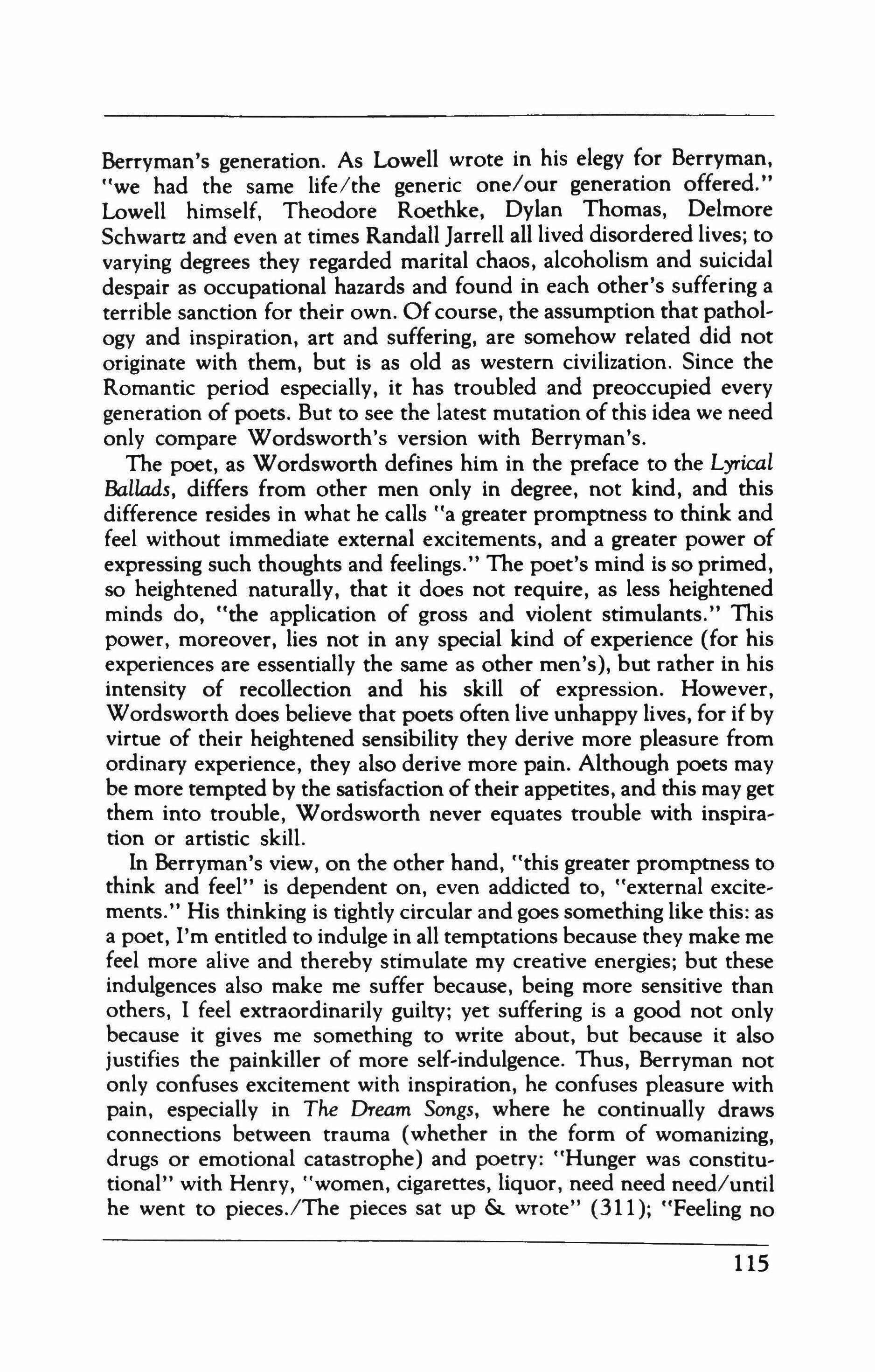
Berryman's generation. As Lowell wrote in his elegy for Berryman, "we had the same life/the generic one/our generation offered." Lowell himself, Theodore Roethke, Dylan Thomas, Delmore Schwartz and even at times Randall Jarrell all lived disordered lives; to varying degrees they regarded marital chaos, alcoholism and suicidal despair as occupational hazards and found in each other's suffering a terrible sanction for their own. Of course, the assumption that pathology and inspiration, art and suffering, are somehow related did not originate with them, but is as old as western civilization. Since the Romantic period especially, it has troubled and preoccupied every generation of poets. But to see the latest mutation of this idea we need only compare Wordsworth's version with Berryman's.
The poet, as Wordsworth defines him in the preface to the Lyrical &llads, differs from other men only in degree, not kind, and this difference resides in what he calls "a greater promptness to think and feel without immediate external excitements, and a greater power of expressing such thoughts and feelings." The poet's mind is so primed, so heightened naturally, that it does not require, as less heightened minds do, "the application of gross and violent stimulants." This power, moreover, lies not in any special kind of experience (for his experiences are essentially the same as other men's), but rather in his intensity of recollection and his skill of expression. However, Wordsworth does believe that poets often live unhappy lives, for if by virtue of their heightened sensibility they derive more pleasure from ordinary experience, they also derive more pain. Although poets may be more tempted by the satisfaction of their appetites, and this may get them into trouble, Wordsworth never equates trouble with inspiration or artistic skill.
In Berryman's view, on the other hand, "this greater promptness to think and feel" is dependent on, even addicted to, "external excite, ments." His thinking is tightly circular and goes something like this: as a poet, I'm entitled to indulge in all temptations because they make me feel more alive and thereby stimulate my creative energies; but these indulgences also make me suffer because, being more sensitive than others, I feel extraordinarily guilty; yet suffering is a good not only because it gives me something to write about, but because it also justifies the painkiller of more self-indulgence. Thus, Berryman not only confuses excitement with inspiration, he confuses pleasure with pain, especially in The Dream Songs, where he continually draws connections between trauma (whether in the form of womanizing, drugs or emotional catastrophe) and poetry: "Hunger was constitutional" with Henry, "women, cigarettes, liquor, need need need/until he went to pieces.lThe pieces sat up & wrote" (311); "Feeling no

pain,/Henry stabbed his arm and wrote a letter" (74); "They are shooting me full of sings" (54). So also in Dream Song 26, he treats poetry and adultery as analogous expressions of criminal behavior in being examples of uncontrollable appetite:
The Glories of the world struck me, made me aria, once.
-What happen then, Mr Bones? if be you cares to say.
-Henry. Henry became interested in women's bodies, his loins were & were the scene of stupendous achievement. Stupor. Knees, dear. Pray.
All the knobs & softnesses of, my God, the ducking & trouble it swarm on Henry, at one time.
-What happen then, Mr Bones? you seems excited-like.
Fell Henry back into the original crime: art, rime
besides a sense of others, my God, my God, and a jealousy for the honour (alive) of his country, what can get more odd? and discontent with the thriving gangs & pride.
-What happen then, Mr Bones?
-I had a most marvelous piece of luck. I died.
The glories of the world struck Henry: they impressed him or seduced him, yes, but they also injured him (perhaps as by a slap in the face). Aria can also be taken two ways: on the one hand, the world provides Henry with an aria, it sings to him and so draws him, siren-like, into experience; but on the other hand the world makes Henry sing an aria and so transforms him into a poet: "What happen then, Mr Bones? Henry." Aesthetic appetite ( "Henry became interested in women's bodies"), sexual excitement ("his loins were & were the scene of stupendous achievement"), fears of sexual failure ("Stupor. Knees, dear. Pray"), and the ducking, trouble and guilt give way to the original crime of poetry, which in turn gives way to the desire for fame and an obsession with the thriving gangs of rival poets. Poetry is the original crime in so far as (like original sin) it is, for Berryman, an inherited disposition which precedes experience and determines the kind of experience one has. Adultery is really just the sexual expression of the poet's artistic needs. It serves those needs by stimulating his imagination and providing it with subject matter. His life, in other words, is merely fodder for his poetry.
The Dream Songs, along with Lowell's Life Studies, have been praised for breaking from what is often called "the fifties poem," a poem of

highly wrought aesthetic surfaces, disciplined, polished, learned and complex in tone and language, and obliquely related, if at all, to personal experience. As A. Alvarez describes it in The Savage God, this overly refined, overly sophisticated poetry could take "no account of the confusions and depressions of a life unredeemed by art." The direct autobiographical style of The Dream Songs represents an effort to "push at the limits of what poetry can be made to bear," to invite into the domain of art "the tentative, flowing, continually improvised balance of life itself." Yet what emerges from a close reading of The Dream Songs, and from John Haffenden's 400,page biography of Berryman, is a portrait of an artist who held mere life in contempt, for whom life had no intrinsic worth except in so far as art could validate it. Since great art demanded, in Berryman's words, "gigantic, unspeakable but articulate disaster," Berryman arranged his circumstances so that he would be bound to suffer. As Haffenden puts it, he resolved "to adopt the mantle of the suffering life, to live intensively and to use his life as discipline in arrogating to himself fundamental exercises in tragic art, he was in a way courting disaster in his personal life." Berryman himself described these aspirations in a poem written on his twenty-second birthday:
What breaks about my head next year or next
Let it be intolerable, let it be Agony's discipline, let it not be strange.
Such ideas are anything but strange in a twentv-two-vear-old poet. When "agony's discipline" is only an imagined, not a real, experience, it is easy to romanticize. The strangeness is that Berryman would adhere so tenaciously to this adolescent program and continue throughout his life to rationalize his own pain and the pain he caused others by claiming they were indispensable conditions ofhis art. So in 1950 he confides to his journal, "My decision last week was not to worry so but to take fucks when they turned up perhaps that is not an abominable programme if it lets me work whereas I otherwise wouldn't" (italics his); likewise, in 1953 he writes to his mother, "Where the rage comes from I don't altogether understand, though I know a good deal about it and I think it may be an unavoidable concomitant of a certain kind of intolerable painful, exalted creation. Any artist not a saint, that is, who loves humanity as much, while torturing himself as much, as I did and was during parts of the composition of the poem, with that intensity over a protracted time, may be bound to take it out on humanity (any specimens that are unlucky enough to be by) afterward." The "unlucky specimen" he
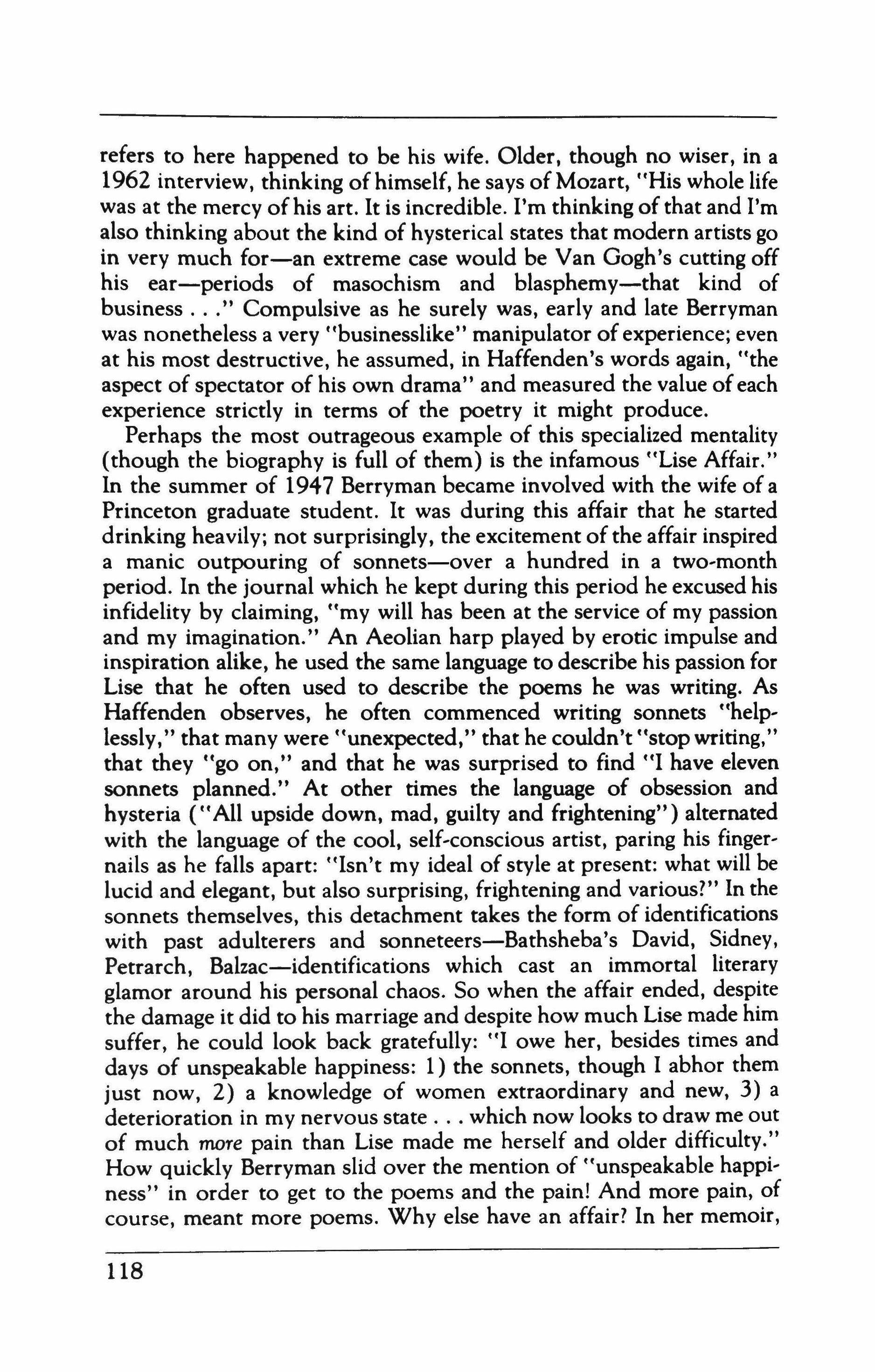
refers to here happened to be his wife. Older, though no wiser, in a 1962 interview, thinking of himself, he says of Mozart, "His whole life was at the mercy ofhis art. It is incredible. I'm thinking of that and I'm also thinking about the kind of hysterical states that modern artists go in very much for-an extreme case would be Van Gogh's cutting off his ear-periods of masochism and blasphemy-that kind of business " Compulsive as he surely was, early and late Berryman was nonetheless a very "businesslike" manipulator of experience; even at his most destructive, he assumed, in Haffenden's words again, "the aspect of spectator of his own drama" and measured the value ofeach experience strictly in terms of the poetry it might produce. Perhaps the most outrageous example of this specialized mentality (though the biography is full of them) is the infamous "Lise Affair." In the summer of 1947 Berryman became involved with the wife of a Princeton graduate student. It was during this affair that he started drinking heavily; not surprisingly, the excitement of the affair inspired a manic outpouring of sonnets-over a hundred in a two-month period. In the journal which he kept during this period he excused his infidelity by claiming, "rny will has been at the service of my passion and my imagination." An Aeolian harp played by erotic impulse and inspiration alike, he used the same language to describe his passion for Lise that he often used to describe the poems he was writing. As Haffenden observes, he often commenced writing sonnets "helplessly," that many were "unexpected," that he couldn't "stop writing," that they "go on," and that he was surprised to find "I have eleven sonnets planned." At other times the language of obsession and hysteria ("All upside down, mad, guilty and frightening") alternated with the language of the cool, self-conscious artist, paring his fingernails as he falls apart: "Isn't my ideal of style at present: what will be lucid and elegant, but also surprising, frightening and various?" In the sonnets themselves, this detachment takes the form of identifications with past adulterers and sonneteers-Bathsheba's David, Sidney, Petrarch, Balzac-identifications which cast an immortal literary glamor around his personal chaos. So when the affair ended, despite the damage it did to his marriage and despite how much Lise made him suffer, he could look back gratefully: "lowe her, besides times and days of unspeakable happiness: 1) the sonnets, though I abhor them just now, 2) a knowledge of women extraordinary and new, 3) a deterioration in my nervous state which now looks to draw me out of much more pain than Lise made me herself and older difficulty." How quickly Berryman slid over the mention of "unspeakable happiness" in order to get to the poems and the pain! And more pain, of course, meant more poems. Why else have an affair? In her memoir,
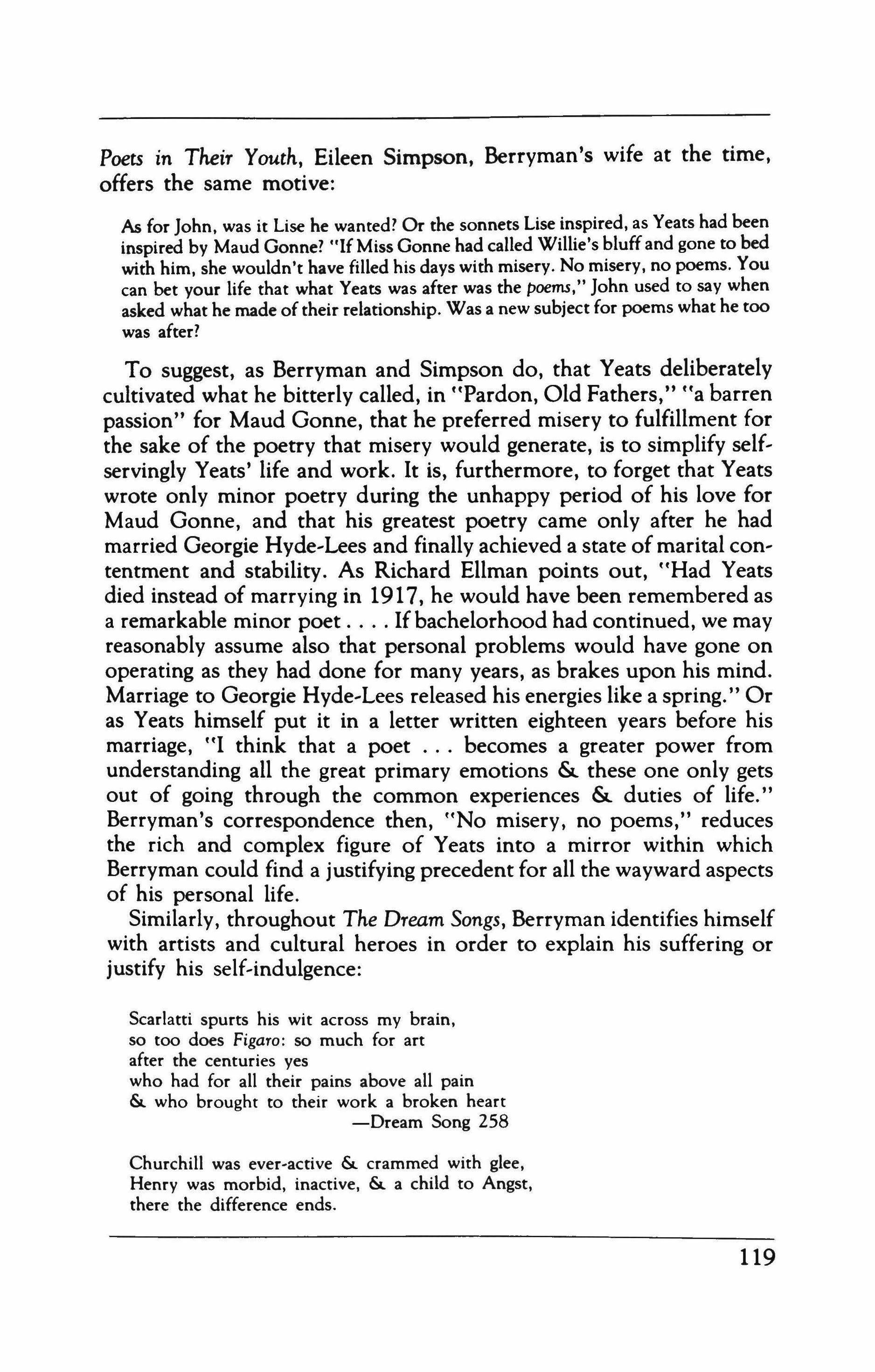
Poets in Their Youth, Eileen Simpson, Berryman's wife at the time, offers the same motive:
As for John, was it Lise he wanted? Or the sonnets Lise inspired, as Yeats had been inspired by Maud Gonnel "If Miss Gonne had called Willie's bluffand gone to bed with him, she wouldn't have filled his days with misery. No misery, no poems. You can bet your life that what Yeats was after was the poems," John used to say when asked what he made of their relationship. Was a new subject for poems what he too was after?
To suggest, as Berryman and Simpson do, that Yeats deliberately cultivated what he bitterly called, in "Pardon, Old Fathers," "a barren passion" for Maud Gonne, that he preferred misery to fulfillment for the sake of the poetry that misery would generate, is to simplify selfservinglv Yeats' life and work. It is, furthermore, to forget that Yeats wrote only minor poetry during the unhappy period of his love for Maud Gonne, and that his greatest poetry came only after he had married Georgie Hyde-Lees and finally achieved a state of marital contentment and stability. As Richard Ellman points out, "Had Yeats died instead of marrying in 1917, he would have been remembered as a remarkable minor poet Ifbachelorhood had continued, we may reasonably assume also that personal problems would have gone on operating as they had done for many years, as brakes upon his mind. Marriage to Georgie Hyde-Lees released his energies like a spring." Or as Yeats himself put it in a letter written eighteen years before his marriage, "I think that a poet becomes a greater power from understanding all the great primary emotions & these one only gets out of going through the common experiences & duties of life." Berryman's correspondence then, "No misery, no poems," reduces the rich and complex figure of Yeats into a mirror within which Berryman could find a justifying precedent for all the wayward aspects of his personal life.
Similarly, throughout The Dream Songs, Berryman identifies himself with artists and cultural heroes in order to explain his suffering or justify his self-indulgence:
Scarlatti spurts his wit across my brain, so too does Figaro: so much for art after the centuries yes who had for all their pains above all pain & who brought to their work a broken heart -Dream Song 258
Churchill was ever-active & crammed with glee, Henry was morbid, inactive, & a child to Angst, there the difference ends.

They both drank, heavily
Both wrote things down, Both thought on their feet, and both spent the bulk of their long lives out of favour disabling their achievement
-Dream Song 323
Yet Berryman is also the master poet of the guilty conscience, tormented by an unrelenting and indefinable sense of sin:
But never did Henry, as he thought he did, end anyone and hacks her body up and hide the pieces, where they may be found. He knows: he went over everyone, &. nobody's missing Nobody is ever missing.
-Dream Song 29
But such self-loathing is often merely self-exaltation in disguise. As an Artist in the Modern World, Henry is a kind of Everyman. His heightened sensibility compels him to respond so fully, so intensely, to the world that he comes to embody, in all aspects ofhis experience, the spirit of his age. This yoking together of public and private experience is, according to A. Alvarez, the crucial feature of the extremist poetry that Berryman and Lowell wrote, a poetry in which "the nihilism and destructiveness of the self turns out to be an accurate reflection of the nihilism of our own violent societies." By identifying Henry with criminals (mass murderers, Nazis, corrupt politicians) to illustrate his violence and rage, or with Jews and blacks to illustrate the intensity of his suffering, Berryman gives Henry eta ruin-prone proud national mind" (77) and thereby tries to tum his personal experience, good and bad, as victim and victimizer, into an internalized expression of his culture:
'All virtues enter into this world:')
A Buddhist, doused in the street, serenely burned. The Secretary of State for War, winking it over, screwed a redhaired whore. Monsignor Capovilla mourned. What a week.
A journalism doggy took a leak
against absconding coon ('but take one virtue, without which a man can hardly hold his own') the sun in the willow shivers itself &. shakes itself green-yellow (Abba Pimen groaned, over the telephone, when asked what that was:)
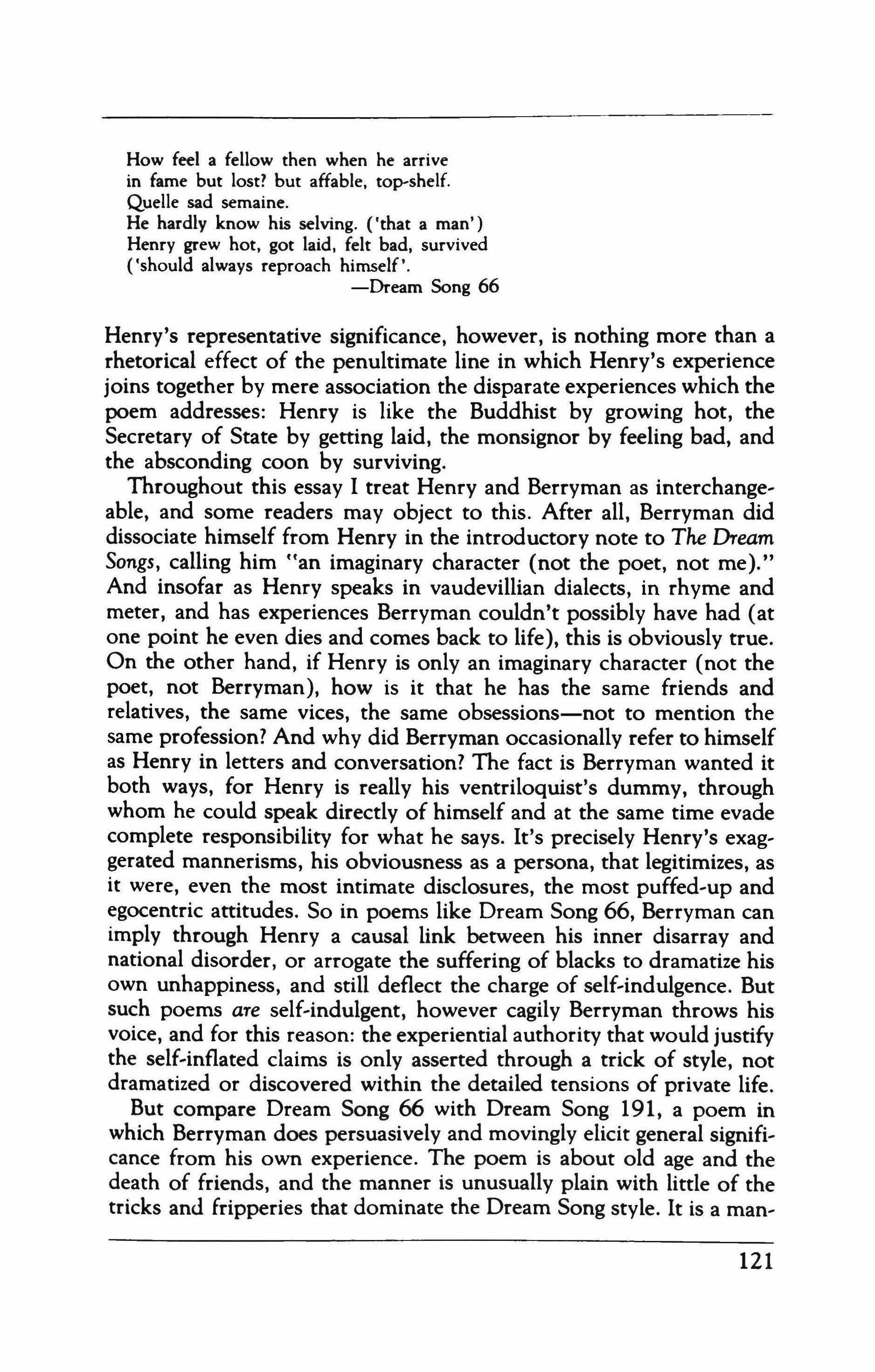
How feel a fellow then when he arrive in fame but lost? but affable, top-shelf.
Quelle sad semaine.
He hardly know his selving. (,that a man') Henry grew hot, got laid, felt bad, survived ('should always reproach himself'.
-Dream Song 66
Henry's representative significance, however, is nothing more than a rhetorical effect of the penultimate line in which Henry's experience joins together by mere association the disparate experiences which the poem addresses: Henry is like the Buddhist by growing hot, the Secretary of State by getting laid, the monsignor by feeling bad, and the absconding coon by surviving.
Throughout this essay I treat Henry and Berryman as interchange, able, and some readers may object to this. After all, Berryman did dissociate himself from Henry in the introductory note to The Dream Songs, calling him "an imaginary character (not the poet, not me)." And insofar as Henry speaks in vaudevillian dialects, in rhyme and meter, and has experiences Berryman couldn't possibly have had (at one point he even dies and comes back to life), this is obviously true. On the other hand, if Henry is only an imaginary character (not the poet, not Berryman), how is it that he has the same friends and relatives, the same vices, the same obsessions-not to mention the same profession? And why did Berryman occasionally refer to himself as Henry in letters and conversation? The fact is Berryman wanted it both ways, for Henry is really his ventriloquist's dummy, through whom he could speak directly of himself and at the same time evade complete responsibility for what he says. It's precisely Henry's exaggerated mannerisms, his obviousness as a persona, that legitimizes, as it were, even the most intimate disclosures, the most puffed-up and egocentric attitudes. So in poems like Dream Song 66, Berryman can imply through Henry a causal link between his inner disarray and national disorder, or arrogate the suffering of blacks to dramatize his own unhappiness, and still deflect the charge of self-indulgence. But such poems are self-indulgent, however cagily Berryman throws his voice, and for this reason: the experiential authority that would justify the self-inflated claims is only asserted through a trick of style, not dramatized or discovered within the detailed tensions of private life. But compare Dream Song 66 with Dream Song 191, a poem in which Berryman does persuasively and movingly elicit general significance from his own experience. The poem is about old age and the death of friends, and the manner is unusually plain with little of the tricks and fripperies that dominate the Dream Song style. It is a man'
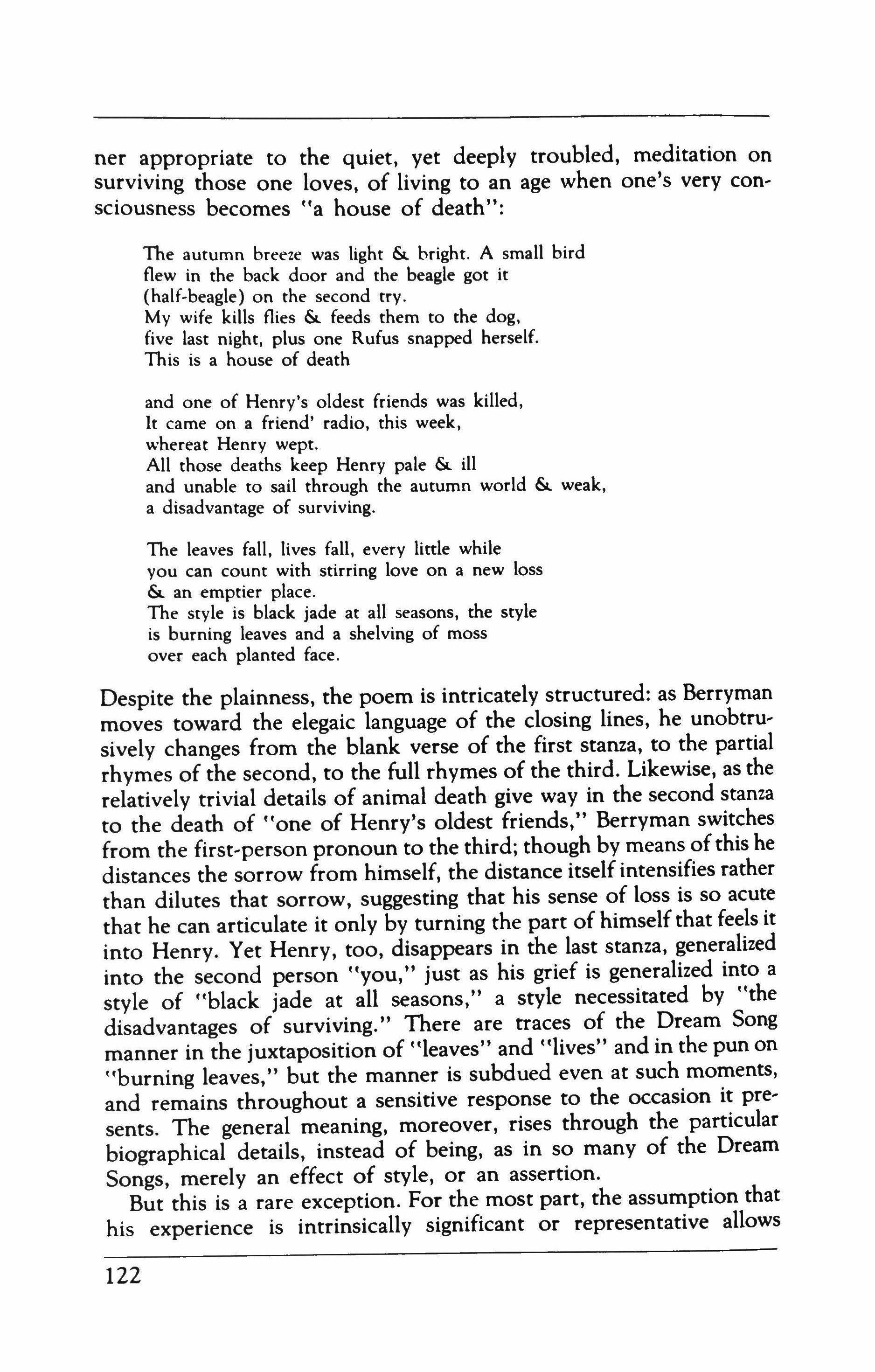
ner appropriate to the quiet, yet deeply troubled, meditation on surviving those one loves, of living to an age when one's very consciousness becomes "a house of death":
The autumn breeze was light & bright. A small bird flew in the back door and the beagle got it (half-beagle) on the second try.
My wife kills flies & feeds them to the dog, five last night, plus one Rufus snapped herself. This is a house of death
and one of Henry's oldest friends was killed, It came on a friend' radio, this week, whereat Henry wept.
All those deaths keep Henry pale & ill and unable to sail through the autumn world & weak, a disadvantage of surviving.
The leaves fall, lives fall, every little while you can count with stirring love on a new loss & an emptier place.
The style is black jade at all seasons, the style is burning leaves and a shelving of moss over each planted face.
Despite the plainness, the poem is intricately structured: as Berryman moves toward the elegaic language of the closing lines, he unobtrusively changes from the blank verse of the first stanza, to the partial rhymes of the second, to the full rhymes of the third. Likewise, as the relatively trivial details of animal death give way in the second stanza to the death of "one of Henry's oldest friends," Berryman switches from the first-person pronoun to the third; though by means ofthis he distances the sorrow from himself, the distance itself intensifies rather than dilutes that sorrow, suggesting that his sense of loss is so acute that he can articulate it only by turning the part of himselfthat feels it into Henry. Yet Henry, too, disappears in the last stanza, generalized into the second person "you," just as his grief is generalized into a style of "black jade at all seasons," a style necessitated by "the disadvantages of surviving." There are traces of the Dream Song manner in the juxtaposition of "leaves" and "lives" and in the pun on "burning leaves," but the manner is subdued even at such moments, and remains throughout a sensitive response to the occasion it pre� sents. The general meaning, moreover, rises through the particular biographical details, instead of being, as in so many of the Dream Songs, merely an effect of style, or an assertion.
But this is a rare exception. For the most part, the assumption that his experience is intrinsically significant or representative allows
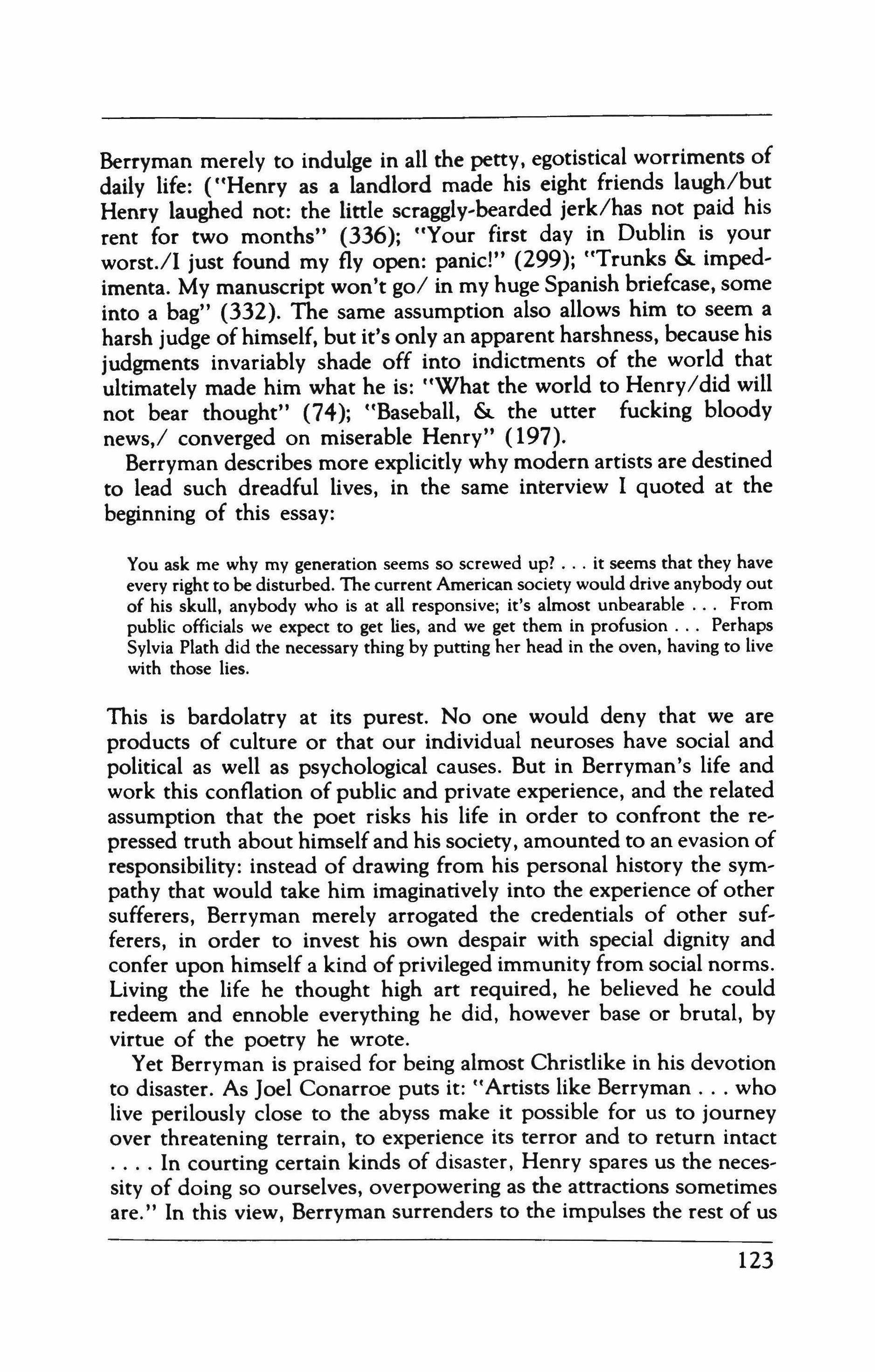
Berryman merely to indulge in all the petty, egotistical worriments of daily life: ("Henry as a landlord made his eight friends laugh/but Henry laughed not: the little scraggly-bearded jerk/has not paid his rent for two months" (336); "Your first day in Dublin is your worst.!l just found my fly open: panic!" (299); "Trunks & impedimenta. My manuscript won't gol in my huge Spanish briefcase, some into a bag" (332). The same assumption also allows him to seem a harsh judge of himself, but it's only an apparent harshness, because his judgments invariably shade off into indictments of the world that ultimately made him what he is: "What the world to HenryIdid will not bear thought" (74); "Baseball, & the utter fucking bloody news,1 converged on miserable Henry" (197).
Berryman describes more explicitly why modern artists are destined to lead such dreadful lives, in the same interview I quoted at the beginning of this essay:
You ask me why my generation seems so screwed up? it seems that they have every right to be disturbed. The current American society would drive anybody out of his skull, anybody who is at all responsive; it's almost unbearable From public officials we expect to get lies, and we get them in profusion Perhaps Sylvia Plath did the necessary thing by putting her head in the oven, having to live with those lies.
This is bardolatry at its purest. No one would deny that we are products of culture or that our individual neuroses have social and political as well as psychological causes. But in Berryman's life and work this conflation of public and private experience, and the related assumption that the poet risks his life in order to confront the re� pressed truth about himselfand his society, amounted to an evasion of responsibility: instead of drawing from his personal history the svmpathy that would take him imaginatively into the experience of other sufferers, Berryman merely arrogated the credentials of other sufferers, in order to invest his own despair with special dignity and confer upon himself a kind of privileged immunity from social norms. Living the life he thought high art required, he believed he could redeem and ennoble everything he did, however base or brutal, by virtue of the poetry he wrote.
Yet Berryman is praised for being almost Christlike in his devotion to disaster. As Joel Conarroe puts it: "Artists like Berryman who live perilously close to the abyss make it possible for us to journey over threatening terrain, to experience its terror and to return intact
In courting certain kinds of disaster, Henry spares us the necessity of doing so ourselves, overpowering as the attractions sometimes are." In this view, Berryman surrenders to the impulses the rest of us
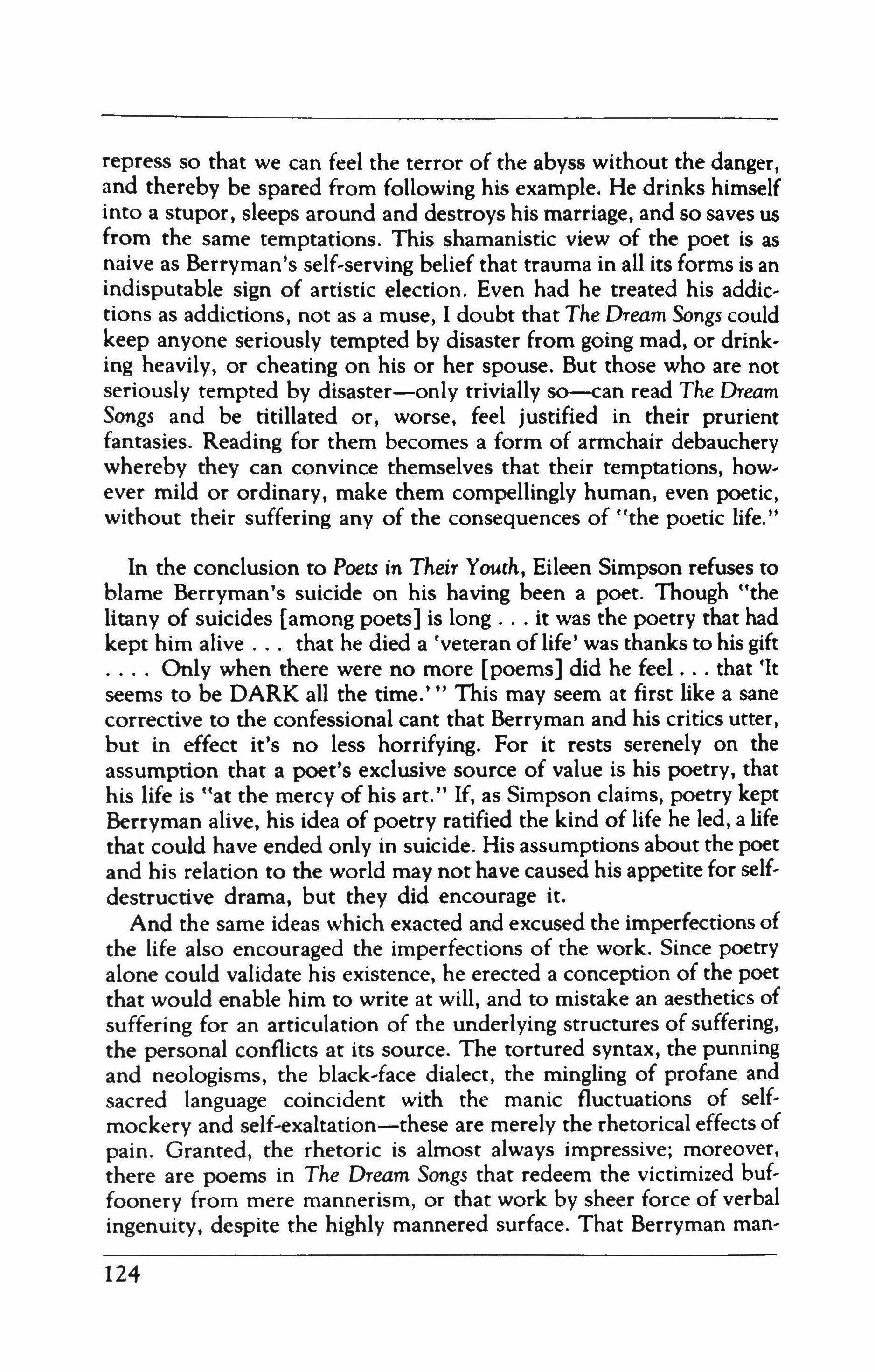
repress so that we can feel the terror of the abyss without the danger, and thereby be spared from following his example. He drinks himself into a stupor, sleeps around and destroys his marriage, and so saves us from the same temptations. This shamanistic view of the poet is as naive as Berryman's self-serving belief that trauma in all its forms is an indisputable sign of artistic election. Even had he treated his addictions as addictions, not as a muse, I doubt that The Dream Songs could keep anyone seriously tempted by disaster from going mad, or drinking heavily, or cheating on his or her spouse. But those who are not seriously tempted by disaster-only trivially so-can read The Dream Songs and be titillated or, worse, feel justified in their prurient fantasies. Reading for them becomes a form of armchair debauchery whereby they can convince themselves that their temptations, however mild or ordinary, make them compellingly human, even poetic, without their suffering any of the consequences of "the poetic life."
In the conclusion to Poets in Their Youth, Eileen Simpson refuses to blame Berryman's suicide on his having been a poet. Though "the litany of suicides [among poets] is long it was the poetry that had kept him alive. that he died a 'veteran of life' was thanks to his gift
Only when there were no more [poems] did he feel that tit seems to be DARK all the time.' " This may seem at first like a sane corrective to the confessional cant that Berryman and his critics utter, but in effect it's no less horrifying. For it rests serenely on the assumption that a poet's exclusive source of value is his poetry, that his life is "at the mercy of his art." If, as Simpson claims, poetry kept Berryman alive, his idea of poetry ratified the kind of life he led, a life that could have ended only in suicide. His assumptions about the poet and his relation to the world may not have caused his appetite for selfdestructive drama, but they did encourage it.
And the same ideas which exacted and excused the imperfections of the life also encouraged the imperfections of the work. Since poetry alone could validate his existence, he erected a conception of the poet that would enable him to write at will, and to mistake an aesthetics of suffering for an articulation of the underlying structures of suffering, the personal conflicts at its source. The tortured syntax, the punning and neologisms, the black-face dialect, the mingling of profane and sacred language coincident with the manic fluctuations of selfmockery and self-exaltation-e-these are merely the rhetorical effects of pain. Granted, the rhetoric is almost always impressive; moreover, there are poems in The Dream Songs that redeem the victimized buffoonery from mere mannerism, or that work by sheer force of verbal ingenuity, despite the highly mannered surface. That Berryman man-
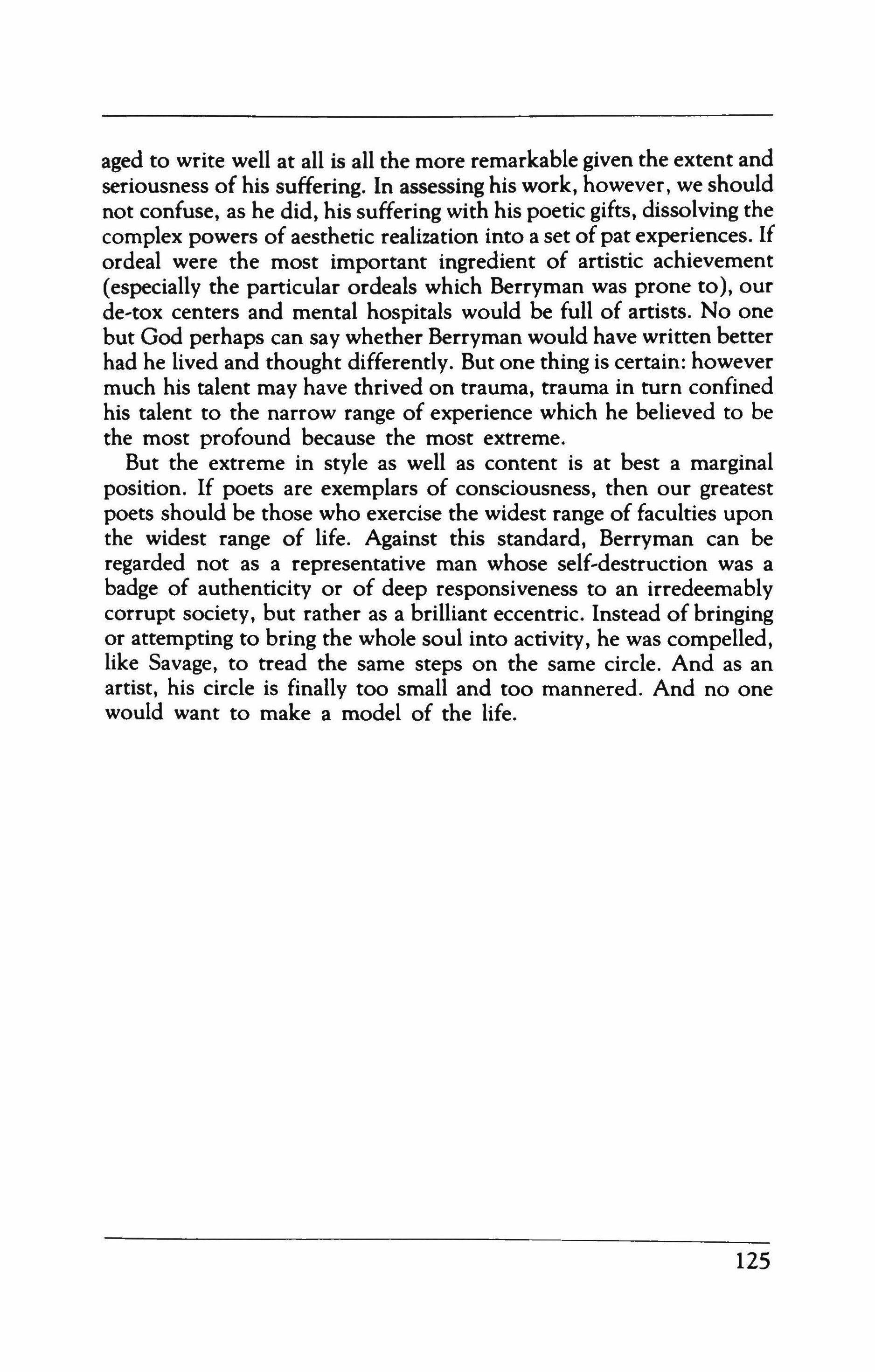
aged to write well at all is all the more remarkable given the extent and seriousness of his suffering. In assessing his work, however, we should not confuse, as he did, his suffering with his poetic gifts, dissolving the complex powers of aesthetic realization into a set ofpat experiences. If ordeal were the most important ingredient of artistic achievement (especially the particular ordeals which Berryman was prone to), our de-tox centers and mental hospitals would be full of artists. No one but God perhaps can say whether Berryman would have written better had he lived and thought differently. But one thing is certain: however much his talent may have thrived on trauma, trauma in turn confined his talent to the narrow range of experience which he believed to be the most profound because the most extreme.
But the extreme in style as well as content is at best a marginal position. If poets are exemplars of consciousness, then our greatest poets should be those who exercise the widest range of faculties upon the widest range of life. Against this standard, Berryman can be regarded not as a representative man whose self-destruction was a badge of authenticity or of deep responsiveness to an irredeemably corrupt society, but rather as a brilliant eccentric. Instead of bringing or attempting to bring the whole soul into activity, he was compelled, like Savage, to tread the same steps on the same circle. And as an artist, his circle is finally too small and too mannered. And no one would want to make a model of the life.
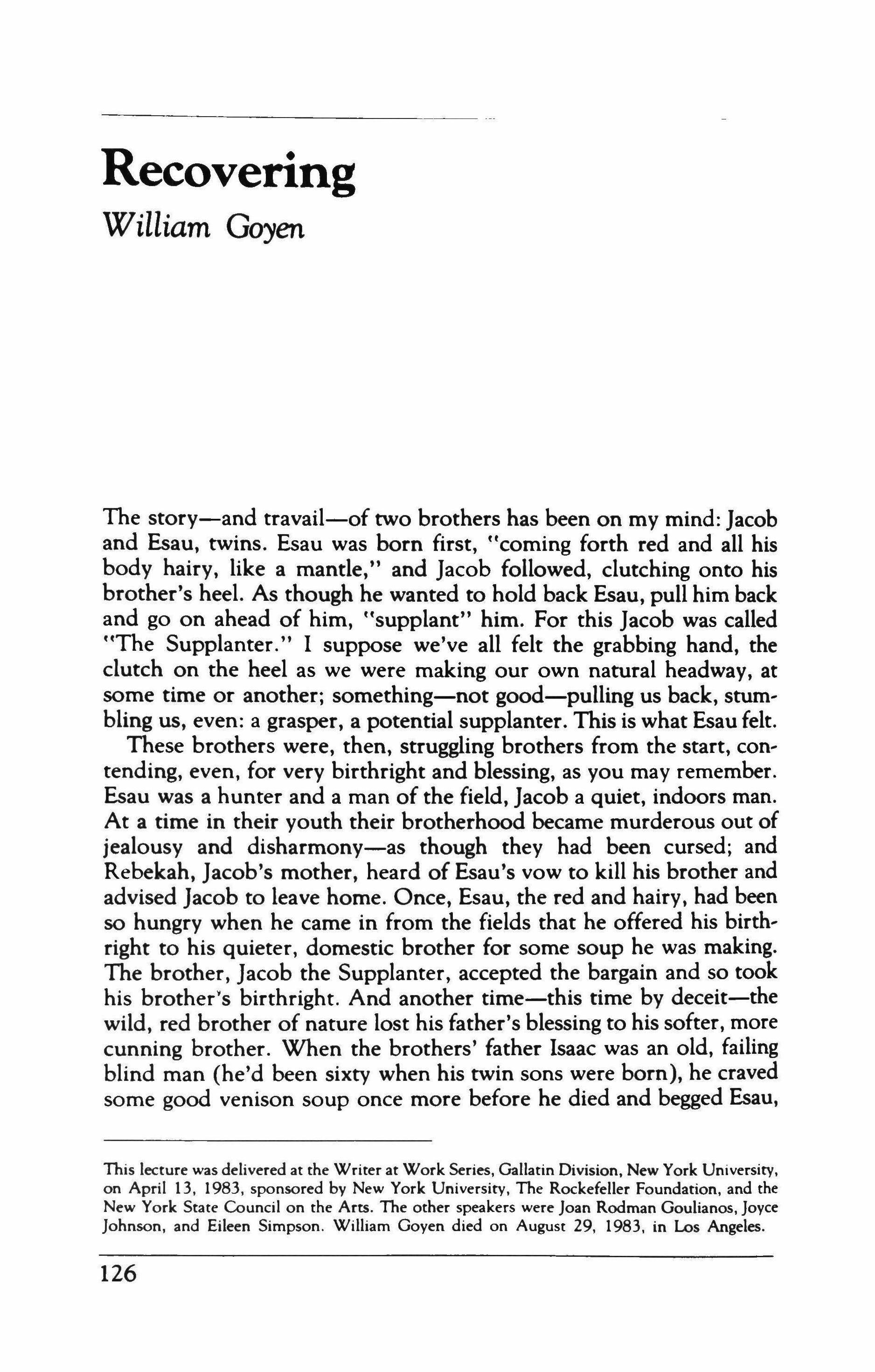
The story-and travail-of two brothers has been on my mind: Jacob and Esau, twins. Esau was born first, "coming forth red and all his body hairy, like a mantle," and Jacob followed, clutching onto his brother's heel. As though he wanted to hold back Esau, pull him back and go on ahead of him, "supplant" him. For this Jacob was called "The Supplanter." I suppose we've all felt the grabbing hand, the clutch on the heel as we were making our own natural headway, at some time or another; something-not good-pulling us back, stumbling us, even: a grasper, a potential supplanter. This is what Esau felt. These brothers were, then, struggling brothers from the start, contending, even, for very birthright and blessing, as you may remember. Esau was a hunter and a man of the field, Jacob a quiet, indoors man. At a time in their youth their brotherhood became murderous out of jealousy and disharmony-as though they had been cursed; and Rebekah, Jacob's mother, heard of Esau's vow to kill his brother and advised Jacob to leave home. Once, Esau, the red and hairy, had been so hungry when he came in from the fields that he offered his birthright to his quieter, domestic brother for some soup he was making. The brother, Jacob the Supplanter, accepted the bargain and so took his brother's birthright. And another time-this time by deceit-the wild, red brother of nature lost his father's blessing to his softer, more cunning brother. When the brothers' father Isaac was an old, failing blind man (he'd been sixty when his twin sons were born), he craved some good venison soup once more before he died and begged Esau,
This lecture was delivered at the Writer at Work Series, Gallatin Division, New York University, on April 13, 1983, sponsored by New York University, The Rockefeller Foundation, and the New York State Council on the Arts. The other speakers were Joan Rodman Goulianos, Joyce Johnson, and Eileen Simpson. William Goyen died on August 29, 1983, in Los Angeles.

his favorite, to provide it. Esau's mother, Rebekah, whose favorite was Jacob, overheard the request and made the soup herself. Take the soup to your father, she urged, and thereby gain his blessing. A blessing was a powerful gift and coming from venerable beings or from certain people of unusual power was carried by the blessed person for a lifetime like an anointing, a protective benediction, a redemption, sacred. So Rebekah, Jacob's mother, hoping for the blessing of Isaac upon her favorite son, made this suggestion to Jacob. "But he'll feel my hands and see that they are smooth where my brother's are hairy," said Jacob, "and know that I am not his beloved Esau; and then he'll curse me instead of bless me." "We'll dress you in Esau's clothes and cover your hands and neck with the bristling skin of an animal," the mother said. When Jacob brought the soup to his father, his father said, "The voice is Jacob's voice but the hands are the hands of Esau." So Jacob ate the venison and gave his impersonating son the vaunted blessing: it said that nations might serve him and peoples bow before him, receiving obeisance from his mother's sons. Jacob, again the supplanter, had stolen his brother's blessing.
But soon came Esau with his dish of venison. "Bless me, father," asked Esau. "Who are you?" cried his father. "Who was it who has already brought me venison? I've eaten my fill and given that one my blessing, and on him the blessing will come. Thy brother, coming in disguise, has snatched thy blessing from thee." "He's rightly named the Supplanter!" cried Esau. "First he took away my birthright and now he has stolen my blessing. Father," he implored, "have you no blessing left for me?" "No," answered Isaac, "I have designated your brother your master, I have condemned all his brothers to do him service; I have assured him of corn and wine; what claim have I left myself to make for you, my son?" "But," Esau pled, "have you only one blessing to give, father?" Esau wept. Then Isaac was moved and said, "All thy blessings shall come from earth's fruitfulness, and from the dew of heaven. Thy sword shall be the breath of life to thee, but thou shall be subject to thy brother until the day comes when thou wilt rebel and wilt shake off his yoke from thy neck." Esau begrudged this blessing and made a plan to kill his brother as soon as his father died. When Jacob's mother heard of this threat, she sent her son Jacob away from home. Thus the hostile separation of the two brothers began, fed by deceit and jealousy and contention. But Jacob, the heeldutcher, had got ahead of his brother.
Years passed and Jacob had seen the fruits of his blind father's misplaced blessing: he was very rich with cattle and sheep, wives and servants and eleven children. He had not seen his estranged brother Esau for a long time, but now a meeting was at hand. It was time to go

home again, to reenter the promised land of home and to meet his brother, to make amends. Jacob was returning as a prosperous and successful man and sent ahead to Esau gifts of abundance, cattle and sheep and camels and corn and oil. This returning home again is hard when there has been no increase, no fulfillment, no "success"; it is often bitter; as such a returnee I remember well some empty-handed homecomings; but Jacob came back covered in glory. But his fear was great. He had wronged his brother and was afraid of him and had amends to make. His brother had vowed to kill him. He hoped to disarm his anger with gifts sent ahead, but he was going to have to face his brother whom he had cheated, deceived, swindled, impersonated, "supplanted. "
The story, in the book of Genesis (32: 22-32), of Jacob's return home to meet his brother, encloses the ancient and beautiful incident of an angelic encounter by a river. It is concerned with the themes of loss and recovering of self, of wounding and healing, of discovery of true self through spiritual struggle. It is about an all-night, mysterious wrestling between two silent men, opponents; or one silent man, himself his own contestant: which is it? The silent wrestling is broken only by the approaching dawn, when each asks the other's name and by one wounding, crippling-"halting"-the other in order to subdue him, and by the subduer asking the subdued to bless him! The passage reads: "The same night Jacob arose and took his two wives, his two maids, and his eleven children, and crossed the ford of the Jabbok river. He took them and sent them across the stream, and likewise everything that he had. And Jacob was left alone; and a man wrestled with him until the breaking of the day. When the man saw that he did not prevail against Jacob, he touched the hollow of Jacob's thigh; and Jacob's thigh was put out of joint as he wrestled with him. Then the man said, 'Let me go, for the day is breaking.' But Jacob said, 'I will not let you go, unless you bless me.' And the man said to him, 'What is your name?' And he said, 'Jacob.' Then the man said, 'Your name shall no more be called Jacob, but Israel; that is, He who strives with God and prevails. For if you have held your own with God, how much will you prevail over men?' Then Jacob asked him, 'Tell me, I pray, your name.' But he said, 'Why is it that you ask my name?' And there he blessed him. So Jacob called the name of the place Phenuel (that is, the face of God), saying, 'For I have seen God face to face, and yet my life is preserved.' The sun rose upon him as he passed Phenuel, limping because of his thigh."
Jacob's recovering his name and spirit, his redemption by the night river, is one of the most mysterious and enigmatic scenes of literature and has meant a great deal to me in the experience of recovering.
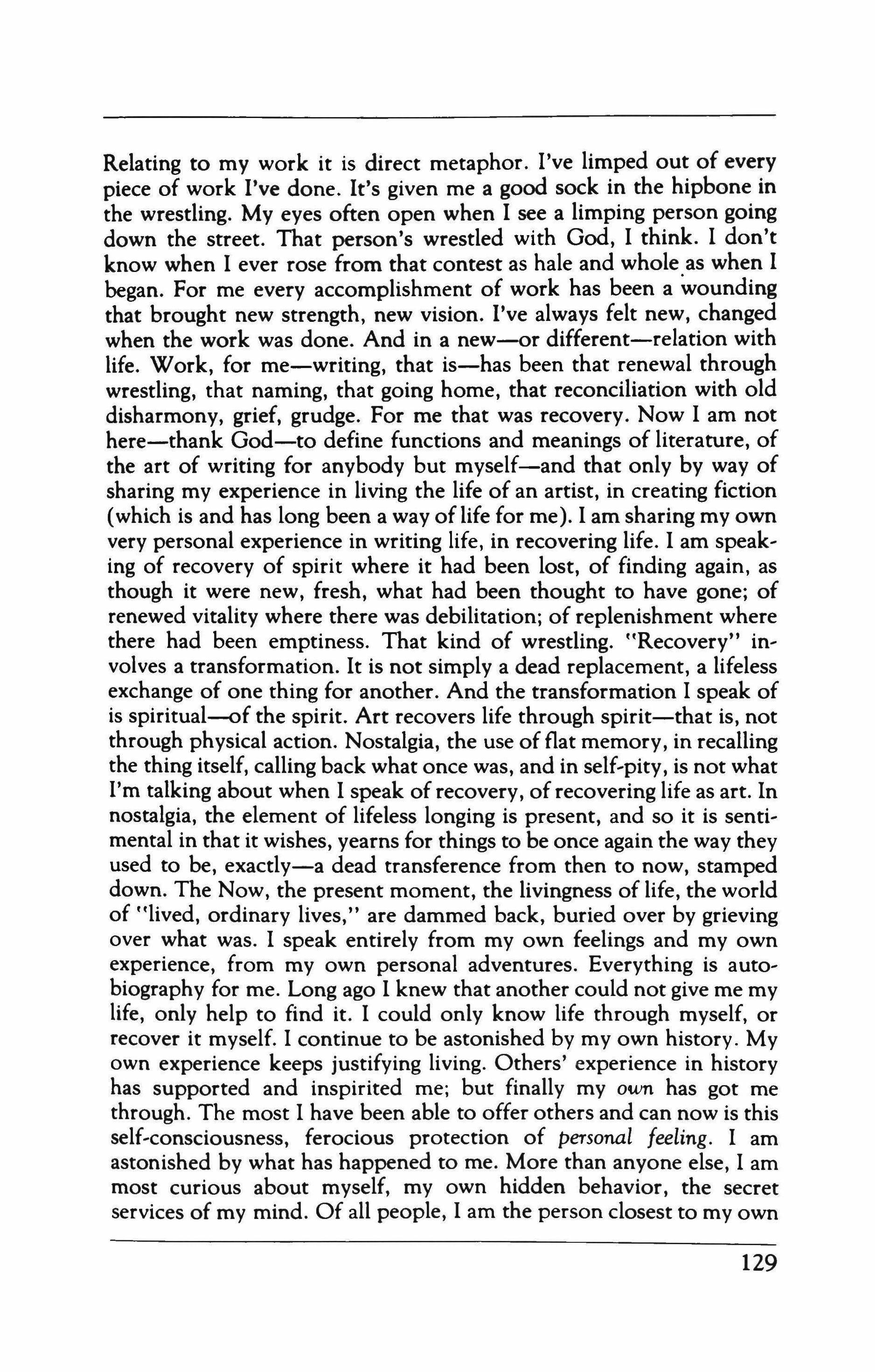
Relating to my work it is direct metaphor. I've limped out of every piece of work I've done. It's given me a good sock in the hipbone in the wrestling. My eyes often open when I see a limping person going down the street. That person's wrestled with God, I think. I don't know when I ever rose from that contest as hale and whole as when I began. For me every accomplishment of work has been a wounding that brought new strength, new vision. I've always felt new, changed when the work was done. And in a new-or different-relation with life. Work, for me-writing, that is-has been that renewal through wrestling, that naming, that going home, that reconciliation with old disharmony, grief, grudge. For me that was recovery. Now I am not here-thank God-to define functions and meanings of literature, of the art of writing for anybody but myself-and that only by way of sharing my experience in living the life of an artist, in creating fiction (which is and has long been a way of life for me). I am sharing my own very personal experience in writing life, in recovering life. I am speaking of recovery of spirit where it had been lost, of finding again, as though it were new, fresh, what had been thought to have gone; of renewed vitality where there was debilitation; of replenishment where there had been emptiness. That kind of wrestling. "Recovery" involves a transformation. It is not simply a dead replacement, a lifeless exchange of one thing for another. And the transformation I speak of is spiritual-of the spirit. Art recovers life through spirit-that is, not through physical action. Nostalgia, the use of flat memory, in recalling the thing itself, calling back what once was, and in self-pity, is not what I'm talking about when I speak of recovery, of recovering life as art. In nostalgia, the element of lifeless longing is present, and so it is sentimental in that it wishes, yearns for things to be once again the way they used to be, exactly-a dead transference from then to now, stamped down. The Now, the present moment, the livingness of life, the world of "lived, ordinary lives," are dammed back, buried over by grieving over what was. I speak entirely from my own feelings and my own experience, from my own personal adventures. Everything is autobiography for me. Long ago I knew that another could not give me my life, only help to find it. I could only know life through myself, or recover it myself. I continue to be astonished by my own history. My own experience keeps justifying living. Others' experience in history has supported and inspirited me; but finally my own has got me through. The most I have been able to offer others and can now is this self-consciousness, ferocious protection of personal feeling. I am astonished by what has happened to me. More than anyone else, I am most curious about myself, my own hidden behavior, the secret services of my mind. Of all people, I am the person closest to my own

feelings. It is, above all, my journey, that long and close association with myself that has been the signal value of my existence. The journey with myself is more remarkable than any other journey I have ever taken. Therefore, writing life for me is (and has been) a spiritual endeavor, and is transforming and redemptive. Wrestling and getting named and demanding "blessing," I limp.
In speaking of the writer recovering, one can ask, why recover? Why not just give back what was, as it was, what is as it is? Why recover? Why not just let everything alone? Why wrestle, why not surrender; why not die? The unhealed must think this. In the fifties there was a vogue of the unhealed and unhealable. The poet was mad and lost. Some feared that "getting well" might mean the loss of poetry. If addictions were removed, by the grace of God, would art be removed along with them? Did a poet's songs live in speed and gin? These poets were exalted as lost and damned. Could writing heal them? Were poems cures? The recovering poet was the creating poet, the fertile, producing poet. I've sat in university halls and listened to visiting unrecovering poets who could not be understood behind drunkenness and dope. Could new poems heal them? If they could again in clear head write their poems, would they get well? Could the will, the willingness to make new poems, heal them? Ex opera operandis. In the power of the work itself, the power of the person.
The unhealed. I have not only known the unhealed but have been among them and one of them. The unhealed will not let go of the sickness, that is, come awake. The unhealed choose the hypnotism of illness and will not only not wrestle with it but certainly not ask a blessing of it. But pain and affliction do carry a blessing in them, I believe. Illness is a spiritual condition. It brings us to see something we had not seen before-seeing the meaning of our suffering. Thus, being healed-recovering-in this manner can cause great joy and even gratitude over having been sick. "Ordinarily, people feel sorry for themselves for having suffered," writes Dr. Thomas Hora in Dialogues in Metapsychiatry; "but in cases where real healing takes place, there is a sense of gratitude for the experience because it has brought about a realization which is of great value to the individual. Once we under, stand the true nature of healing, there is a valuable lesson in it for us all. If we have a problem, we do not have to seek fast relief, or even a quick healing to get rid of the problem as soon as possible. We may embrace the problem and say the same thing that Jacob said: 'I will not let thee go, except thou bless me.' If we quickly get rid of a problem and find relief, we are missing an opportunity to learn something vitally important. The mode of being-in-the-world changes and our character undergoes a transformation. That's the greatest healing." I

will not let thee go, except thou bless me. Dr. Hora and others have shown me that in my stricken life and in my recovering life there has been a deep change within me; I am no longer the same person; I am somewhere made new. And I make new things out of this vision and out of this reality. In no longer holding onto my sickness in isolation and self-nursing, I have let go and have found new prowess, a new relationship to life and to others.
Which brings to mind, again, my friend the Greek archer: Philoctetes, about whom I have spoken before. Philoctetes was, you'll remember, given a bow ofgreat power-a blessing in terms of what we have been saying. On a wild island where he and his fellow warriors had stopped to pray to a local god, Philoctetes was bitten by a snake. A person with a magical gift had been wounded, lamed, "halted." The wound was incurable, and what's more, gave off an unbearable odor, which drove the gifted youth's friends from him. More than that, seizures periodically rendered Philoctetes frightening-he looked and acted crazy. He was abandoned on the forlorn island. He hid himself further away from the world in a cave by the ocean. He limped. Philoctetes was so concerned with his wound that he forgot his bow. He knew utter loneliness. But he had his wound, morbid companion. Years passed. Suddenly he was urgently needed by others: a crucial war could be won if he would come again among his family and his fellows, return to his homeland with his bow. But, the young man reasoned with himself, there is this wound. Philoctetes refused to return; he was of no use. A famous doctor was offered. He would heal the wound. He asked to be left alone; he rejected the healing physician. Philoctetes was now in a position of power. A person with a handicapping wound and a priceless gift in demand by his society! He could sleep on, in self-pity and sickness, or accept healing and come back to the use of his gift, doubly empowered by his long suffering, by the long contest with himself, by his wrestling. You know the rest of the story, or can find it. It is the situation of the unhealed that serves us here.
For as I see it, the singer is the song; the poetry is the poet; the archer is the bow. In the power of the work itself, the power of the person. The two conditions are inseparable. I do not mean that a person must be wounded in order to use his gift. Isolate either the bow or the archer and you have no whole, a fatal division, a fragment. A person who sees life and others exclusively in terms of his own affliction is out of a literature we all know, and a seductive literature at that: we can name poets and novelists who have lured us into the darkness, given us opiate visions that have seemed to be life itself. Exclusive self-nursing, tending the "curse," the "difference" that sep-

arates, produces darkness, a sunless, festering creation. Exclusive magic produces sentimentality, heartlessness, silvery confection, a doll. At any rate, there is a conversation I must have with Philoctetes, my brother. For it is clear that he and I have met with the same choice, suffered together that crucial struggle, lain day after day, night after night, in the same haunted cave, "unhealable," dozing undelivered in the uterine glow, held by sucking death from pushing out into the explosion of life, heel in the grasp of a seductive supplanter. The deadly wound was all. The life-robber, the death sore, had taken over life. The radiant, the ltfe-thrusting=-the bow-lay untouched in the darkness. But brother Philoctetes, your healer arrived, the wound was closed, the bow won the battle; and 0 brother of the cave and the pain, I too have once again shaken free, flipped like a fish from the hand that stretches toward me; I kick towards light, but the finger, touch is on my heel. Lend me your bow! Come before me!
From what I have said, it is clear that writing-recovering life-for me is a spiritual task. No matter what the craft of it, writing for me is the work of the spirit. Style for me is the spiritual experience of the material of my work.
Art and Spirit endure together. Art heals, puts the precious bow in our hands again; binds up and reconciles; recovers the dignity and the beauty in us that keep getting wounded by the wrestling with the angel in us, with the God in us, or-in the absence of angels or God-with the mystery in each of us, waiting in the night by the river that we shall surely come to, on our way home to meet our brother.
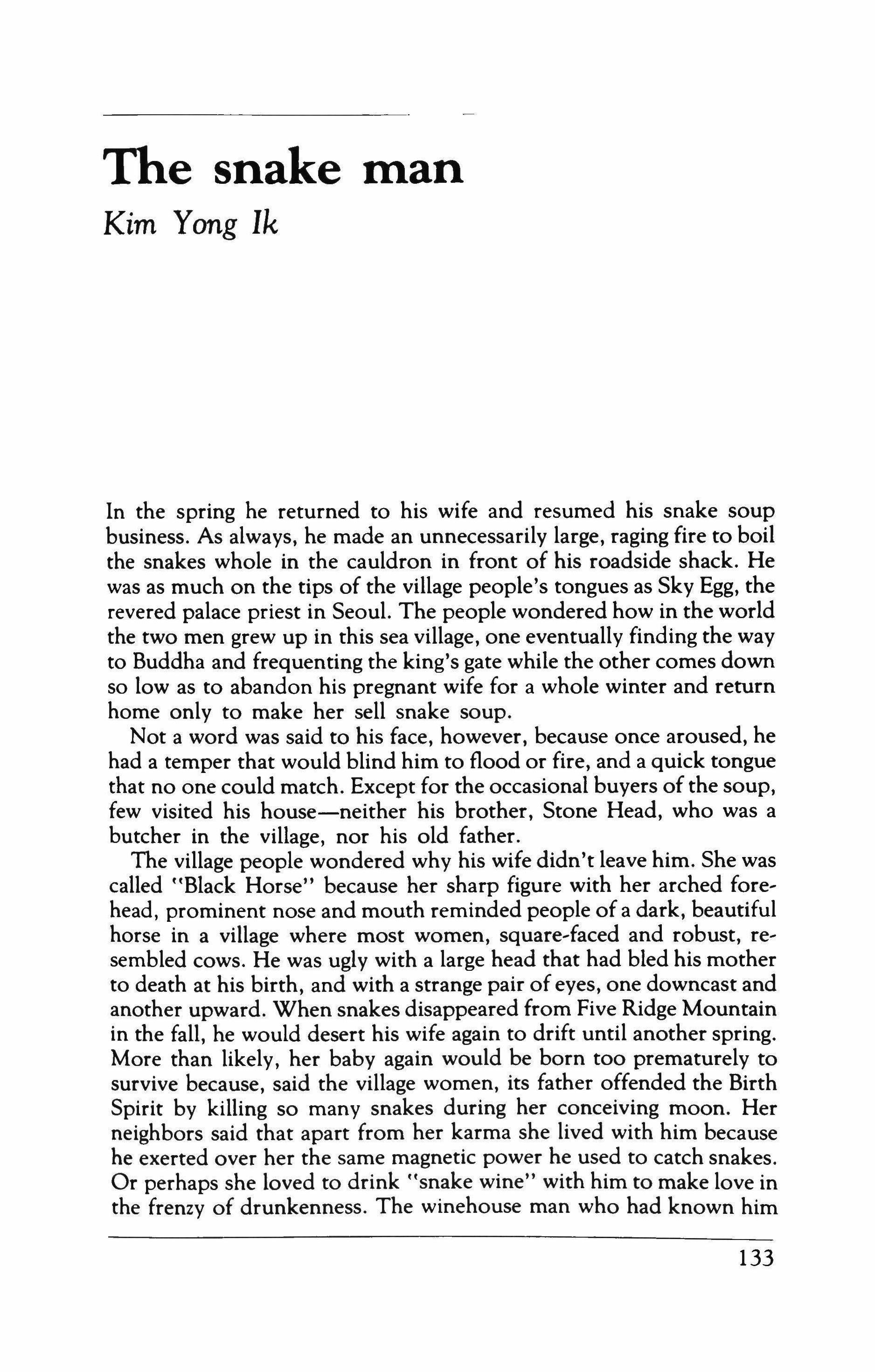
In the spring he returned to his wife and resumed his snake soup business. As always, he made an unnecessarily large, raging fire to boil the snakes whole in the cauldron in front of his roadside shack. He was as much on the tips of the village people's tongues as Sky Egg, the revered palace priest in Seoul. The people wondered how in the world the two men grew up in this sea village, one eventually finding the way to Buddha and frequenting the king's gate while the other comes down so low as to abandon his pregnant wife for a whole winter and return home only to make her sell snake soup.
Not a word was said to his face, however, because once aroused, he had a temper that would blind him to flood or fire, and a quick tongue that no one could match. Except for the occasional buyers of the soup, few visited his house-neither his brother, Stone Head, who was a butcher in the village, nor his old father.
The village people wondered why his wife didn't leave him. She was called "Black Horse" because her sharp figure with her arched fore' head, prominent nose and mouth reminded people of a dark, beautiful horse in a village where most women, square-faced and robust, resembled cows. He was ugly with a large head that had bled his mother to death at his birth, and with a strange pair of eyes, one downcast and another upward. When snakes disappeared from Five Ridge Mountain in the fall, he would desert his wife again to drift until another spring. More than likely, her baby again would be born too prematurely to survive because, said the village women, its father offended the Birth Spirit by killing so many snakes during her conceiving moon. Her neighbors said that apart from her karma she lived with him because he exerted over her the same magnetic power he used to catch snakes. Or perhaps she loved to drink "snake wine" with him to make love in the frenzy of drunkenness. The winehouse man who had known him


since his naked days always said, however, that he had a good-sized mole at the tip of his cock, which would tickle her inside. Mention of the mole drew laughter from the drinkers, who knew that a mole between the eyebrows was called "Buddha's halo"-good luck.
Shortly before the eighth day of fourth moon, the birthday of Buddha, word reached the village that Sky Egg was accompanying the king and queen on a spring tour in the Imperial Dragon Boat along their scenic coastal channel, stopping at the priest's home village. With the approval of the Region Magistrate, they quickly agreed to change their village name from "Five Ridge Village" to "Dragon Port" and to name the mountain's highest ridge facing the sea "Dragon Head." They argued endlessly to decide whose rice, fish and ginseng roots should go up to the Dragon Table. When it came to selecting a butcher, the people chose the snake man's brother at once, in the hope that he would tell his younger brother to stop killing snakes for food during the royal visit.
Stone Head came to his brother's home, a place he rarely visited, and, with his pug nose tilted upward, bragged about how he could choose whichever cow he saw fit to kill for the king. Then after some tongue-tied hesitation, he brought up the snake matter haltingly. The younger one was at once furious. "Just because you kill animals for the king, do you think you are better than I am? You don't even deserve the smell of my good food. II
"You don't call those dirty, ugly things crawling on the ground good food?"
"Ugly? Dirty?" His one eye grew much larger than the other as he glared at his brother. "Are you telling me they are ugly and dirtythose fresh, clean creatures which shed their skins every couple of moons?" Reaching for his snake stick at the porch, he shouted, "I'll haul you out of my house if you say one more word about my food business. II His voice was so loud that his yellow dog howled. The people began to gather.
The butcher, knowing he would gain nothing if he stayed on to fight, fled back home, chased by his brother's angry words.
Hearing the loud talk, their old father came and scolded his younger son. "How could you raise such a harsh voice mountain high against your older brother who will serve the Golden Crown? What you did amounts to throwing dung at your father's face."
"Do you call yourself 'father' when you side with one son against another because of gold and power?" White froth oozed out of his trembling mouth. "It's really a dirty, ugly world!" He spat on the old man's face.
With the spit dripping to his jowl, the father's face turned dead
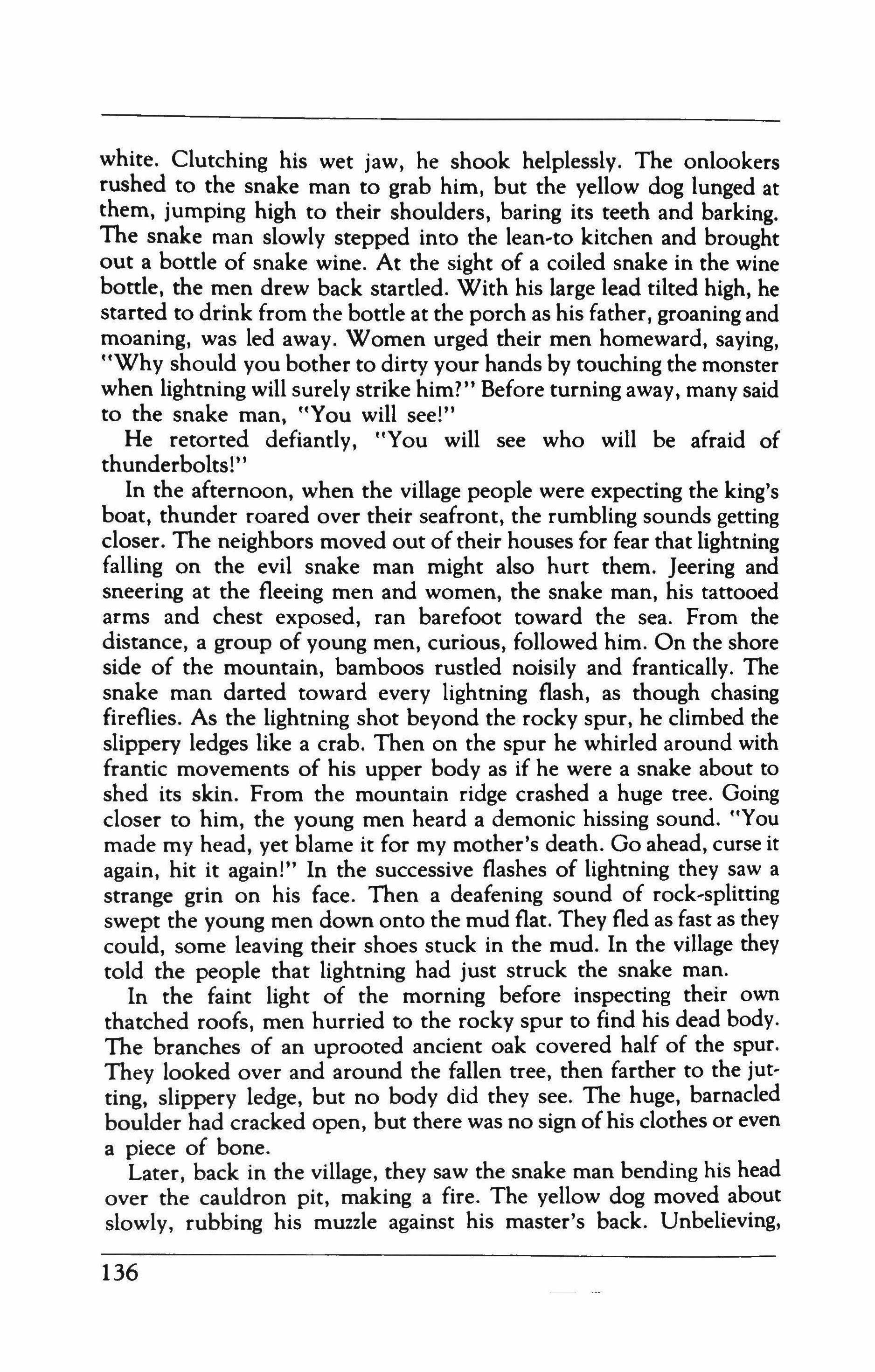
white. Clutching his wet jaw, he shook helplessly. The onlookers rushed to the snake man to grab him, but the yellow dog lunged at them, jumping high to their shoulders, baring its teeth and barking. The snake man slowly stepped into the lean-to kitchen and brought out a bottle of snake wine. At the sight of a coiled snake in the wine bottle, the men drew back startled. With his large lead tilted high, he started to drink from the bottle at the porch as his father, groaning and moaning, was led away. Women urged their men homeward, saying, "Why should you bother to dirty your hands by touching the monster when lightning will surely strike him?" Before turning away, many said to the snake man, "You will see!"
He retorted defiantly, "You will see who will be afraid of thunderbolts! "
In the afternoon, when the village people were expecting the king's boat, thunder roared over their seafront, the rumbling sounds getting closer. The neighbors moved out of their houses for fear that lightning falling on the evil snake man might also hurt them. Jeering and sneering at the fleeing men and women, the snake man, his tattooed arms and chest exposed, ran barefoot toward the sea. From the distance, a group of young men, curious, followed him. On the shore side of the mountain, bamboos rustled noisily and frantically. The snake man darted toward every lightning flash, as though chasing fireflies. As the lightning shot beyond the rocky spur, he climbed the slippery ledges like a crab. Then on the spur he whirled around with frantic movements of his upper body as if he were a snake about to shed its skin. From the mountain ridge crashed a huge tree. Going closer to him, the young men heard a demonic hissing sound. "You made my head, yet blame it for my mother's death. Go ahead, curse it again, hit it again!" In the successive flashes of lightning they saw a strange grin on his face. Then a deafening sound of rock-splitting swept the young men down onto the mud flat. They fled as fast as they could, some leaving their shoes stuck in the mud. In the village they told the people that lightning had just struck the snake man.
In the faint light of the morning before inspecting their own thatched roofs, men hurried to the rocky spur to find his dead body. The branches of an uprooted ancient oak covered half of the spur. They looked over and around the fallen tree, then farther to the jutting, slippery ledge, but no body did they see. The huge, barnacled boulder had cracked open, but there was no sign of his clothes or even a piece of bone.
Later, back in the village, they saw the snake man bending his head over the cauldron pit, making a fire. The yellow dog moved about slowly, rubbing his muzzle against his master's back. Unbelieving,

some went as close as to the jub-jub tree. In the reflection of the flickering fire, his ill-matching eyes unblinking like those of a snake, his face glowed, as if he had drawn new power from the lightning.
At noon an imperial messenger arrived, announcing that the king's boat had left Crane Neck, and should enter Dragon Port by sundown. Inspecting the special big room added to the Village House for the king and queen, he said that the queen had decided not to continue the channel tour because of seasickness, and that Sky Egg was guiding her to one of the mountain temples where she would pray for a long' awaited child. Although disappointed, the people were excited enough over the impending visit by the king. Hurriedly they cleaned themselves and their children in the streams and put on the best clothes they could possibly find to greet the king. But the snake man, as they saw with relief, took his snake stick and collection bag and left the village.
The king's boat finally arrived, sails fluttering in the sundown wind. Surrounded by ceremoniously dressed attendants, the king in finest grass linen as light as cicada wings, stepped down onto the special landing platform over which homespun silk had been spread. The Region Magistrate knelt at the farthest corner of the platform.
Facing the folds of the mountain against the early evening sky, the king said admiringly, "Those ridges look like heads of animals."
"Yes, Your Highness." The magistrate in his horsehair hat and outer gown crawled forward, so as not to step on the king's shadow. "The one right above our village closest to you is Dragon Head whose open sea view is good enough for a royal pavilion site, and the rest are merely holding up their unworthy snake heads."
Ahead of the imperial procession, the magistrate hurried toward the village, announcing repeatedly the king's arrival: "Sang Gang Ma Ma Nirnl" The people flung themselves on the roadside and knelt low, their heads to the ground. The king, mounted on his horse and gazing at the mountain, scarcely returned their deep bows.
By the jub-jub tree at the bend of the road, a yellow dog rushed out, challenging the king's horse. An imperial attendant raised a ship to chase him away, but the dog kept on barking in the middle of the road. Then Black Horse, dressed for the king in her wedding-day finery, caught the dog up in her arms and, retreating to her house, looked up at the king. The magistrate rushed back and mumbled his apology breathlessly. The king, unperturbed, sniffed. "What is this odor?" he asked.
Not wanting to displease the king, the magistrate answered, "It must be the fragrance of ten thousand mountain flowers from which our bees make our Dragon Village honey."

"Don't I know the scent of wild flowers?" the king said, and watched Black Horse scolding the dog by the steaming cauldron.
The magistrate quickly answered, pointing at the foot of third ridge of the mountain, "It may be the scent coming from those five leaves of ginseng roots or those mulberry leaves with which we feed our silkworms, Your Highness."
The king jerked his head irritably, his gaze still on Black Horse, who was putting a bowl of snake soup before her dog to silence him. Under the stare of the king, she blinked quietly. Beads of sweat stood on the magistrate's forehead. Finally he said, "Your highness is smelling the odor of poor folk's health tonic."
"Health tonic?"
"Yes, these poor people use it before the summer barley harvest and they do nothing but bring out strings of babies."
The king asked, "What is the food?"
"It is s-snake, your highness," the magistrate stuttered. "They boil the creatures whole."
The Imperial horse turned away to move on. At the shadow edge of the jub-jub tree the king halted abruptly. "What is the name of the woman seller?"
The magistrate said apologetically, "A lowly woman like that doesn't have a name. Everyone calls her 'Black Horse,' Your Highness. "
The king laughed heartily. "Where is her master?" he asked. "He is a hunk of human driftwood, Your Highness, not much of a husband," the magistrate said. "When he comes home, all he does is catch vicious snakes for food, drink snake wine and make the poor woman conceive an unwanted child."
"I should try the food and wine he takes," the king said. "Have the woman bring me some this evening," he ordered and rode on.
In the evening the magistrate himselfbrought her a silver bowl and a silver jar to hold the soup and the wine, and she carried them to the king. The snake man was kept busy selling soup to an unexpectedly large number of buyers. After the soup was sold out, when she still didn't return, he went to the Village House where the king was staying. At the tile-roofed gate he was told by a servant woman that she was not there and that he should be quiet and not disturb sleeping royal guests. As he demanded loudly to be allowed through the gate, the magistrate came out and said that His Majesty was spending the hot night at sea. When the snake man insisted that he was not asking about the king's whereabouts but his wife's, the magistrate said ingratiatingly, "His Majesty loves horses so much that he has taken a fancy to your wife. She will probably stroke the Majesty's tired limbs and when he falls asleep, she will return."

Furious, the snake man ran to the bay, shouting for his wife, but the imperial guards at the pier did not let him row out to sea, their dogs tearing his trousers with their claws and teeth. It was not until the early morning that she returned with a gold hairpin in her hand, her face haggard and sad, her eyes avoiding her husband's.
Following the king's departure at noon, the people whispered about how the snake man had looked for his wife at midnight. Many asked her neighbor, who had seen the hairpin, "Was it really gold?" Women were sorry for the queen praying to Buddha somewhere in the mountain, completely ignorant of the king's affair. They speculated as to what temple Sky Egg had led her to and whether he would be able to come to visit them before returning to Seoul.
As though the wind had carried the people's wishes, Sky Egg came to the village in the late afternoon. Learning that the king had already left the village, he went directly to his family's house on the breezy pumpkin slope at the edge of the village. The people hurried to greet the priest. Although past his sixty-vear cycle, he stood erect, no visible wrinkles on his clean skin, just like the last time they saw him, except for a gold tooth at the corner of his mouth. The people asked how long he could stay, and he answered vaguely but politely, "Not as long as I wish because I have to assist the queen, who is praying at a temple." He didn't mention which temple, and no one dared to ask, knowing that the queen needed to be alone with Buddha. Black Horse came, but without talking to the priest; she just stood, letting out occasional sighs.
The people nudged their neighbors, whispering. The snake man, red-faced from drinking, was staggering forward, using his snake stick as a cane. Instead of turning to his wife, he went to Sky Egg. The priest put his palms together before him to receive him. The snake man, his long chin thrust out, did not greet him but paused. The priest managed to smile. Pointing his stick at the corner of the monk's mouth, the snake man snarled, "Is this real gold, too?"
The priest's smile froze at once, his complexion turning pale. Looking toward the mountain, he soon regained his poise and dignity, moving his prayer beads in his hands.
"Of course it's gold. As real as the Golden Buddha," shouted a fish peddler, her fury mottling her pox-scarred face. "Go away, you snake killer." As the crowd began to curse him, he moved slowly away, like a snake driven from a nest by birds' screeches.
The priest excused himself by saying that he wanted to rest, to prepare himself for his meditative walk at dawn, and walked away to the brook by the road. As the people left quietly, he bent over the water's edge, washing one ear then the other repeatedly, as though cleansing himself of what he had heard.
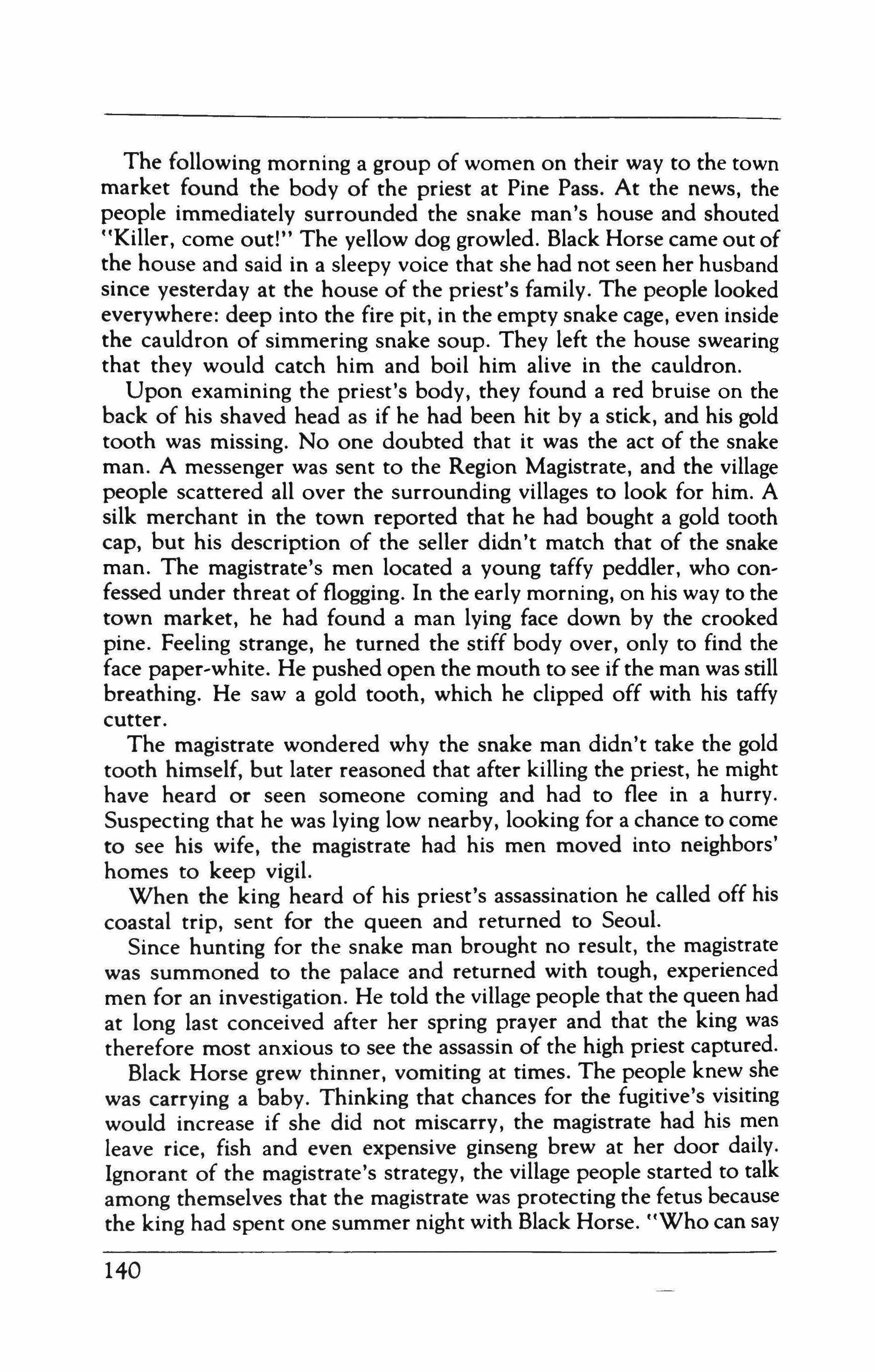
The following morning a group of women on their way to the town market found the body of the priest at Pine Pass. At the news, the people immediately surrounded the snake man's house and shouted "Killer, corne out!" The yellow dog growled. Black Horse carne out of the house and said in a sleepy voice that she had not seen her husband since yesterday at the house of the priest's family. The people looked everywhere: deep into the fire pit, in the empty snake cage, even inside the cauldron of simmering snake soup. They left the house swearing that they would catch him and boil him alive in the cauldron.
Upon examining the priest's body, they found a red bruise on the back of his shaved head as if he had been hit by a stick, and his gold tooth was missing. No one doubted that it was the act of the snake man. A messenger was sent to the Region Magistrate, and the village people scattered all over the surrounding villages to look for him. A silk merchant in the town reported that he had bought a gold tooth cap, but his description of the seller didn't match that of the snake man. The magistrate's men located a young taffy peddler, who con' fessed under threat of flogging. In the early morning, on his way to the town market, he had found a man lying face down by the crooked pine. Feeling strange, he turned the stiff body over, only to find the face paper-white. He pushed open the mouth to see if the man was still breathing. He saw a gold tooth, which he clipped off with his taffy cutter.
The magistrate wondered why the snake man didn't take the gold tooth himself, but later reasoned that after killing the priest, he might have heard or seen someone corning and had to flee in a hurry. Suspecting that he was lying low nearby, looking for a chance to come to see his wife, the magistrate had his men moved into neighbors' homes to keep vigil.
When the king heard of his priest's assassination he called off his coastal trip, sent for the queen and returned to Seoul.
Since hunting for the snake man brought no result, the magistrate was summoned to the palace and returned with tough, experienced men for an investigation. He told the village people that the queen had at long last conceived after her spring prayer and that the king was therefore most anxious to see the assassin of the high priest captured.
Black Horse grew thinner, vomiting at times. The people knew she was carrying a baby. Thinking that chances for the fugitive's visiting would increase if she did not miscarry, the magistrate had his men leave rice, fish and even expensive ginseng brew at her door daily. Ignorant of the magistrate's strategy, the village people started to talk among themselves that the magistrate was protecting the fetus because the king had spent one summer night with Black Horse. "Who can say
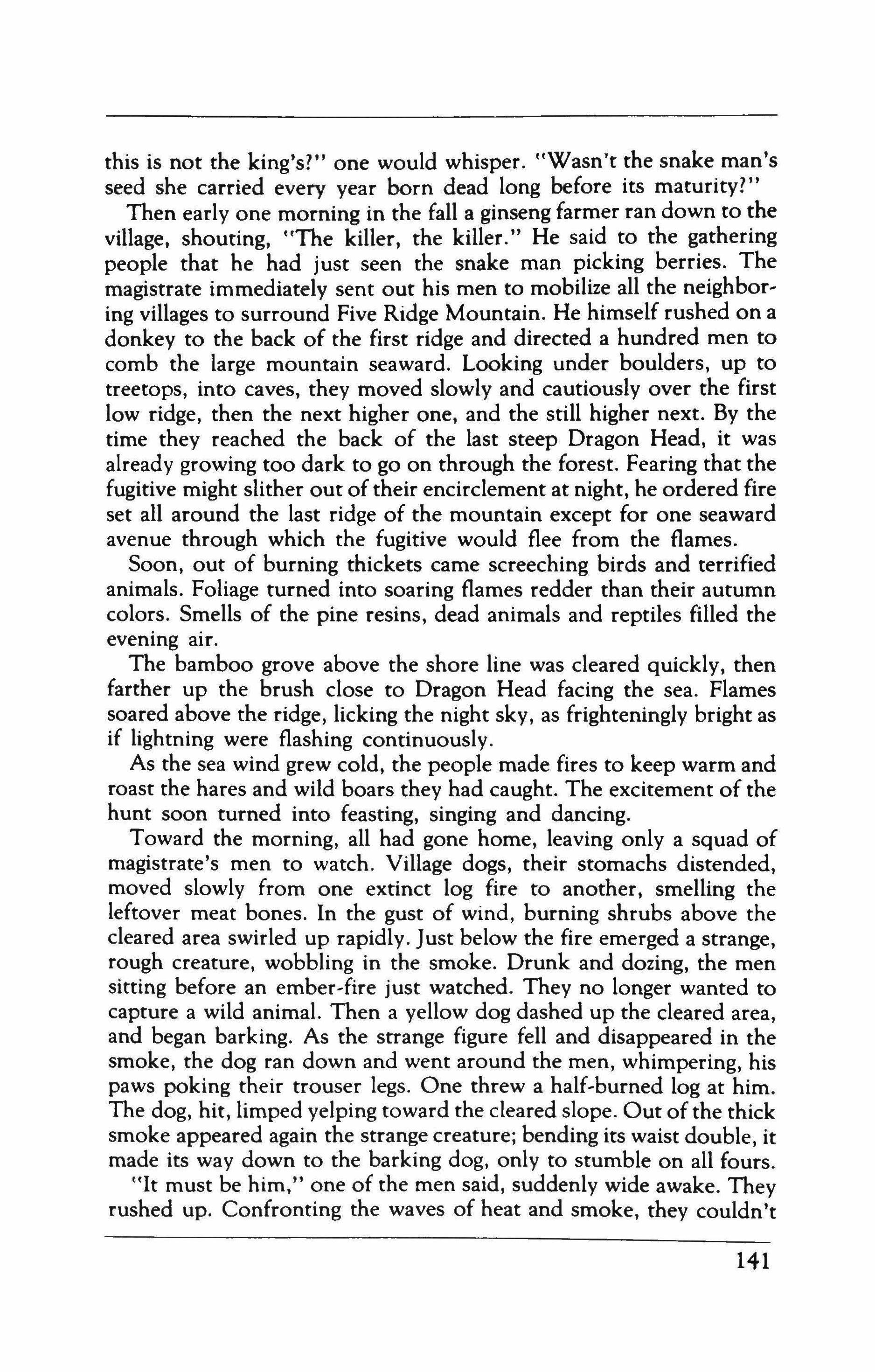
this is not the king's?" one would whisper. "Wasn't the snake man's seed she carried every year born dead long before its maturity?"
Then early one morning in the fall a ginseng farmer ran down to the village, shouting, "The killer, the killer." He said to the gathering people that he had just seen the snake man picking berries. The magistrate immediately sent out his men to mobilize all the neighbor, ing villages to surround Five Ridge Mountain. He himself rushed on a donkey to the back of the first ridge and directed a hundred men to comb the large mountain seaward. Looking under boulders, up to treetops, into caves, they moved slowly and cautiously over the first low ridge, then the next higher one, and the still higher next. By the time they reached the back of the last steep Dragon Head, it was already growing too dark to go on through the forest. Fearing that the fugitive might slither out of their encirclement at night, he ordered fire set all around the last ridge of the mountain except for one seaward avenue through which the fugitive would flee from the flames.
Soon, out of burning thickets came screeching birds and terrified animals. Foliage turned into soaring flames redder than their autumn colors. Smells of the pine resins, dead animals and reptiles filled the evening air.
The bamboo grove above the shore line was cleared quickly, then farther up the brush close to Dragon Head facing the sea. Flames soared above the ridge, licking the night sky, as frighteningly bright as if lightning were flashing continuously.
As the sea wind grew cold, the people made fires to keep warm and roast the hares and wild boars they had caught. The excitement of the hunt soon turned into feasting, singing and dancing.
Toward the morning, all had gone home, leaving only a squad of magistrate's men to watch. Village dogs, their stomachs distended, moved slowly from one extinct log fire to another, smelling the leftover meat bones. In the gust of wind, burning shrubs above the cleared area swirled up rapidly. Just below the fire emerged a strange, rough creature, wobbling in the smoke. Drunk and dozing, the men sitting before an ember-fire just watched. They no longer wanted to capture a wild animal. Then a yellow dog dashed up the cleared area, and began barking. As the strange figure fell and disappeared in the smoke, the dog ran down and went around the men, whimpering, his paws poking their trouser legs. One threw a half-burned log at him. The dog, hit, limped yelping toward the cleared slope. Out of the thick smoke appeared again the strange creature; bending its waist double, it made its way down to the barking dog, only to stumble on all fours.
"It must be him," one of the men said, suddenly wide awake. They rushed up. Confronting the waves of heat and smoke, they couldn't
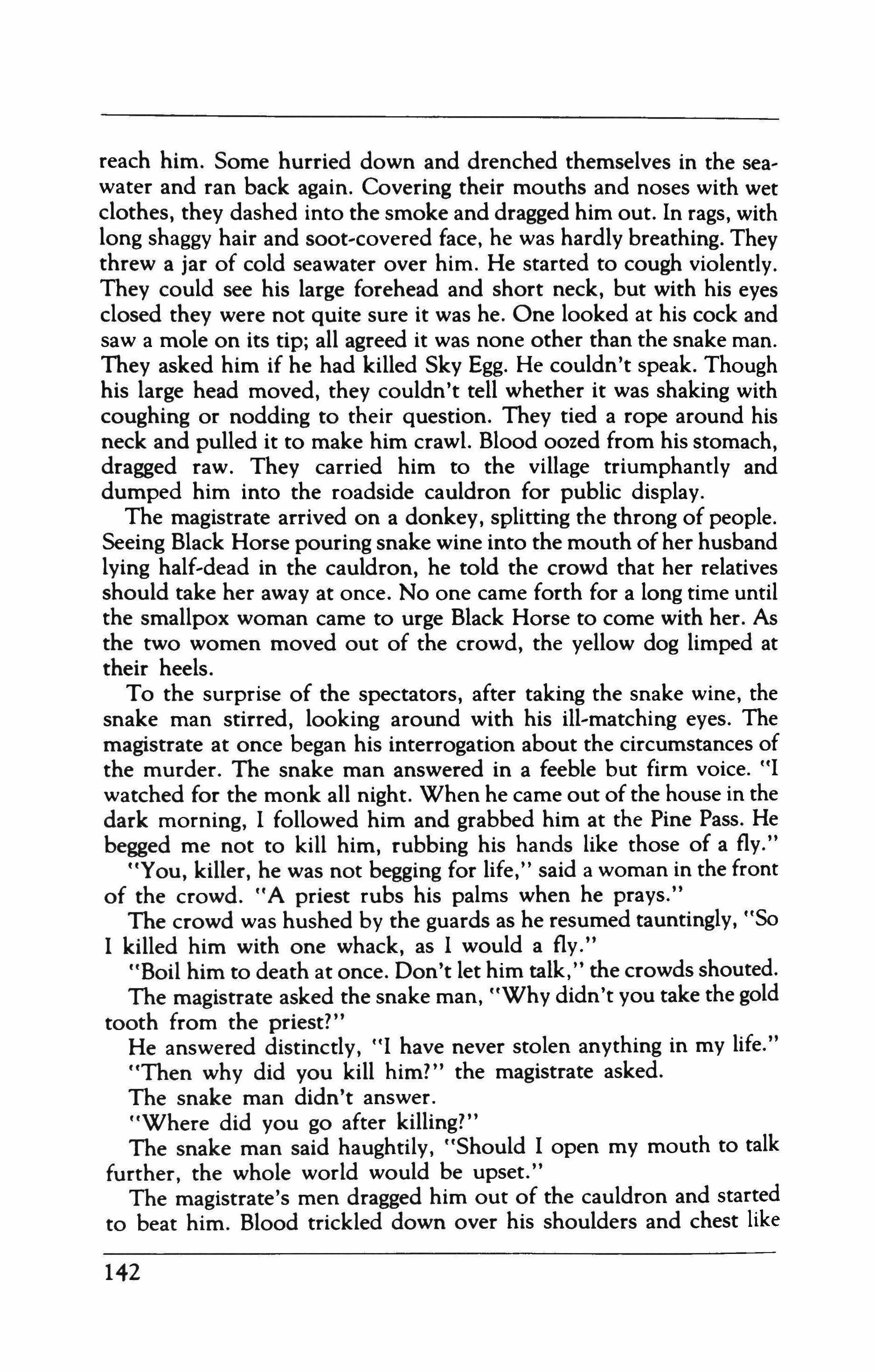
reach him. Some hurried down and drenched themselves in the seawater and ran back again. Covering their mouths and noses with wet clothes, they dashed into the smoke and dragged him out. In rags, with long shaggy hair and soot-covered face, he was hardly breathing. They threw a jar of cold seawater over him. He started to cough violently. They could see his large forehead and short neck, but with his eyes closed they were not quite sure it was he. One looked at his cock and saw a mole on its tip; all agreed it was none other than the snake man. They asked him if he had killed Sky Egg. He couldn't speak. Though his large head moved, they couldn't tell whether it was shaking with coughing or nodding to their question. They tied a rope around his neck and pulled it to make him crawl. Blood oozed from his stomach, dragged raw. They carried him to the village triumphantly and dumped him into the roadside cauldron for public display.
The magistrate arrived on a donkey, splitting the throng of people. Seeing Black Horse pouring snake wine into the mouth ofher husband lying half-dead in the cauldron, he told the crowd that her relatives should take her away at once. No one came forth for a long time until the smallpox woman came to urge Black Horse to come with her. As the two women moved out of the crowd, the yellow dog limped at their heels.
To the surprise of the spectators, after taking the snake wine, the snake man stirred, looking around with his ill-matching eyes. The magistrate at once began his interrogation about the circumstances of the murder. The snake man answered in a feeble but firm voice. "I watched for the monk all night. When he came out of the house in the dark morning, I followed him and grabbed him at the Pine Pass. He begged me not to kill him, rubbing his hands like those of a fly."
"You, killer, he was not begging for life," said a woman in the front of the crowd. "A priest rubs his palms when he prays."
The crowd was hushed by the guards as he resumed tauntingly, "So I killed him with one whack, as I would a fly."
"Boil him to death at once. Don't let him talk," the crowds shouted.
The magistrate asked the snake man, "Why didn't you take the gold tooth from the priest?"
He answered distinctly, "I have never stolen anything in my life."
"Then why did you kill him?" the magistrate asked.
The snake man didn't answer.
"Where did you go after killing?"
The snake man said haughtily, "Should I open my mouth to talk further, the whole world would be upset."
The magistrate's men dragged him out of the cauldron and started to beat him. Blood trickled down over his shoulders and chest like
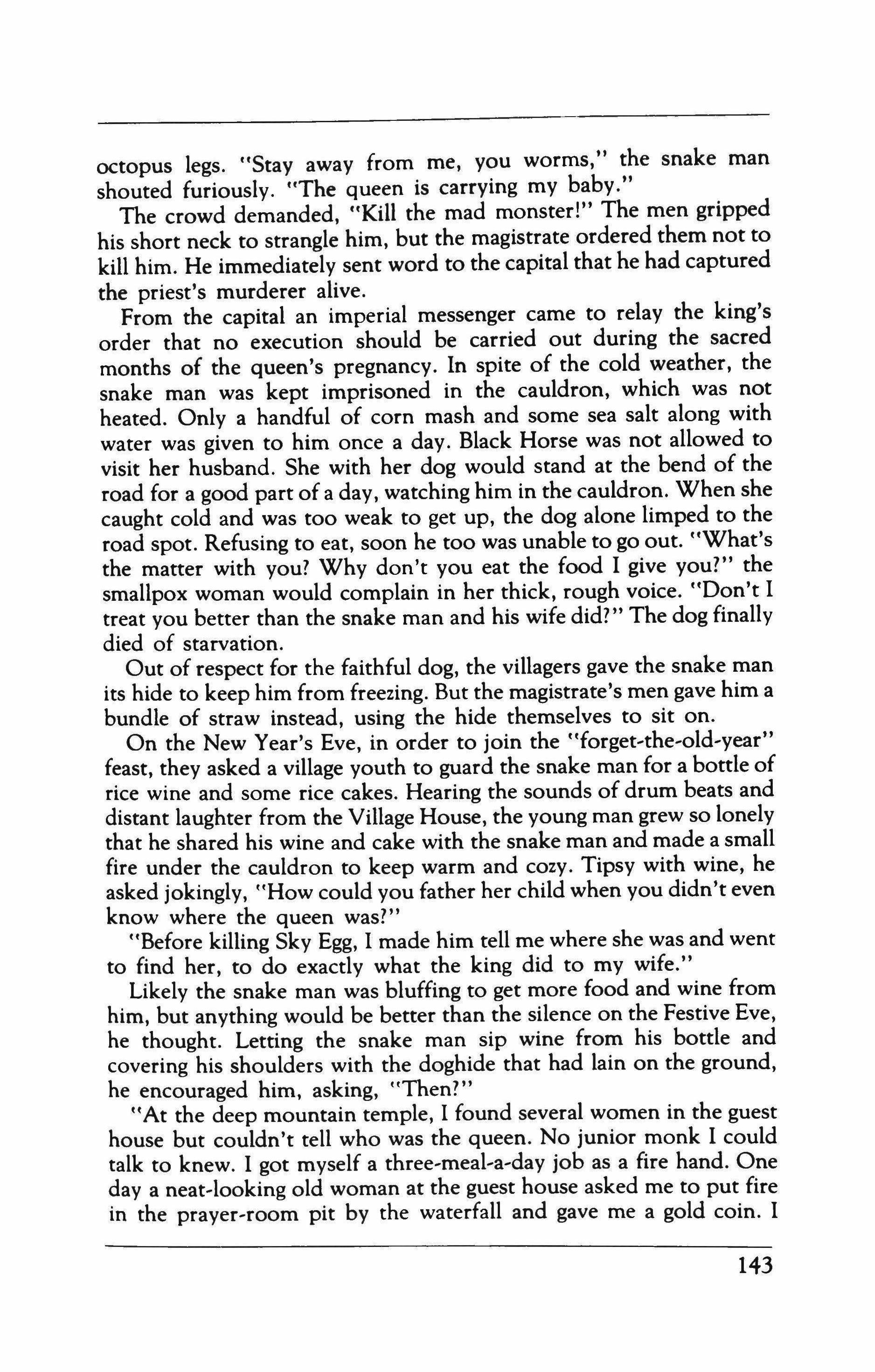
octopus legs. "Stay away from me, you worms," the snake man shouted furiously. "The queen is carrying my baby."
The crowd demanded, "Kill the mad monster!" The men gripped his short neck to strangle him, but the magistrate ordered them not to kill him. He immediately sent word to the capital that he had captured the priest's murderer alive.
From the capital an imperial messenger came to relay the king's order that no execution should be carried out during the sacred months of the queen's pregnancy. In spite of the cold weather, the snake man was kept imprisoned in the cauldron, which was not heated. Only a handful of corn mash and some sea salt along with water was given to him once a day. Black Horse was not allowed to visit her husband. She with her dog would stand at the bend of the road for a good part of a day, watching him in the cauldron. When she caught cold and was too weak to get up, the dog alone limped to the road spot. Refusing to eat, soon he too was unable to go out. "What's the matter with you? Why don't you eat the food I give you?" the smallpox woman would complain in her thick, rough voice. "Don't I treat you better than the snake man and his wife did?" The dog finally died of starvation.
Out of respect for the faithful dog, the villagers gave the snake man its hide to keep him from freezing. But the magistrate's men gave him a bundle of straw instead, using the hide themselves to sit on.
On the New Year's Eve, in order to join the "forger-the-old-year" feast, they asked a village youth to guard the snake man for a bottle of rice wine and some rice cakes. Hearing the sounds of drum beats and distant laughter from the Village House, the young man grew so lonely that he shared his wine and cake with the snake man and made a small fire under the cauldron to keep warm and cozy. Tipsy with wine, he asked jokingly, "How could you father her child when you didn't even know where the queen was?"
"Before killing Sky Egg, I made him tell me where she was and went to find her, to do exactly what the king did to my wife."
Likely the snake man was bluffing to get more food and wine from him, but anything would be better than the silence on the Festive Eve, he thought. Letting the snake man sip wine from his bottle and covering his shoulders with the doghide that had lain on the ground, he encouraged him, asking, "Then?"
"At the deep mountain temple, I found several women in the guest house but couldn't tell who was the queen. No junior monk I could talk to knew. I got myself a three-meal-a-day job as a fire hand. One day a neat,looking old woman at the guest house asked me to put fire in the prayer-room pit by the waterfall and gave me a gold coin. I
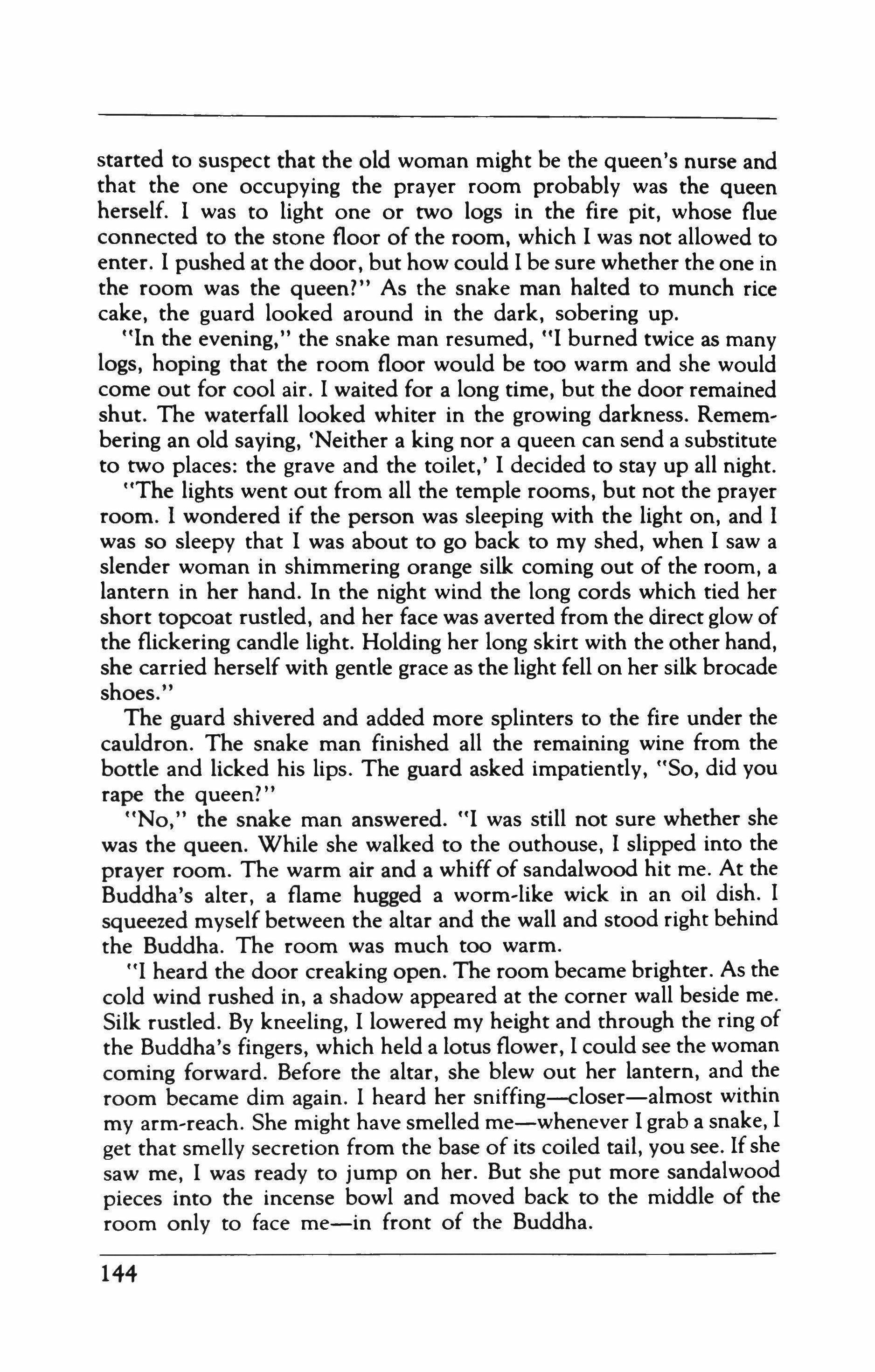
started to suspect that the old woman might be the queen's nurse and that the one occupying the prayer room probably was the queen herself. I was to light one or two logs in the fire pit, whose flue connected to the stone floor of the room, which I was not allowed to enter. I pushed at the door, but how could I be sure whether the one in the room was the queen?" As the snake man halted to munch rice cake, the guard looked around in the dark, sobering up.
"In the evening," the snake man resumed, "I burned twice as many logs, hoping that the room floor would be too warm and she would come out for cool air. I waited for a long time, but the door remained shut. The waterfall looked whiter in the growing darkness. Rernernbering an old saying, 'Neither a king nor a queen can send a substitute to two places: the grave and the toilet,' I decided to stay up all night.
"The lights went out from all the temple rooms, but not the prayer room. I wondered if the person was sleeping with the light on, and I was so sleepy that I was about to go back to my shed, when I saw a slender woman in shimmering orange silk coming out of the room, a lantern in her hand. In the night wind the long cords which tied her short topcoat rustled, and her face was averted from the direct glow of the flickering candle light. Holding her long skirt with the other hand, she carried herself with gentle grace as the light fell on her silk brocade shoes."
The guard shivered and added more splinters to the fire under the cauldron. The snake man finished all the remaining wine from the bottle and licked his lips. The guard asked impatiently, "So, did you rape the queen?"
"No," the snake man answered. "I was still not sure whether she was the queen. While she walked to the outhouse, I slipped into the prayer room. The warm air and a whiff of sandalwood hit me. At the Buddha's alter, a flame hugged a worm-like wick in an oil dish. I squeezed myself between the altar and the wall and stood right behind the Buddha. The room was much too warm.
"I heard the door creaking open. The room became brighter. As the cold wind rushed in, a shadow appeared at the corner wall beside me. Silk rustled. By kneeling, I lowered my height and through the ring of the Buddha's fingers, which held a lotus flower, I could see the woman coming forward. Before the altar, she blew out her lantern, and the room became dim again. I heard her sniffing-closer-almost within my arm-reach. She might have smelled me-whenever I grab a snake, I get that smelly secretion from the base of its coiled tail, you see. Ifshe saw me, I was ready to jump on her. But she put more sandalwood pieces into the incense bowl and moved back to the middle of the room only to face me-in front of the Buddha.
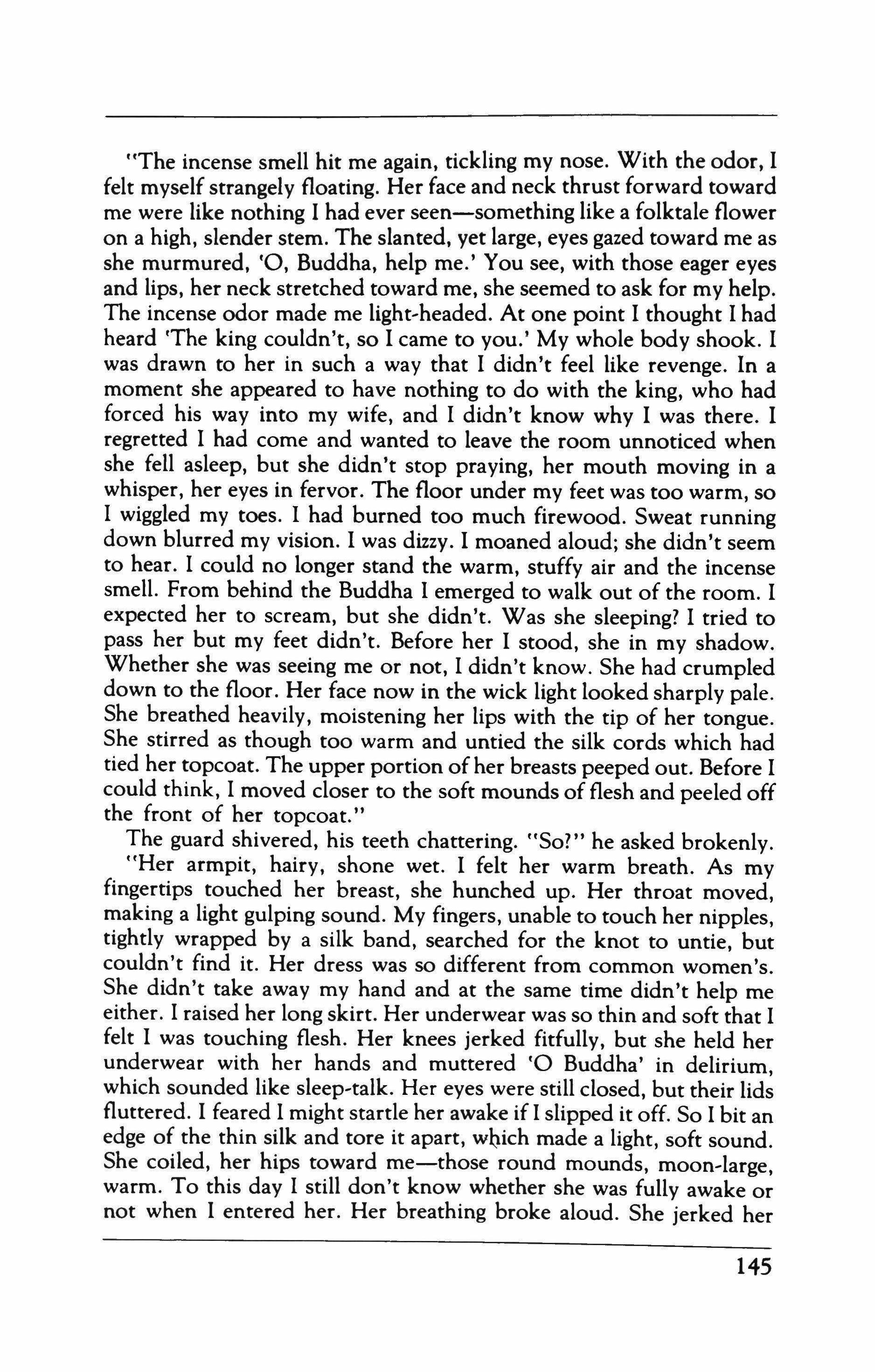
"The incense smell hit me again, tickling my nose. With the odor, I felt myself strangely floating. Her face and neck thrust forward toward me were like nothing I had ever seen-something like a folktale flower on a high, slender stem. The slanted, yet large, eyes gazed toward me as she murmured, '0, Buddha, help me.' You see, with those eager eyes and lips, her neck stretched toward me, she seemed to ask for my help. The incense odor made me light-headed. At one point I thought I had heard 'The king couldn't, so I came to you.' My whole body shook. I was drawn to her in such a way that I didn't feel like revenge. In a moment she appeared to have nothing to do with the king, who had forced his way into my wife, and I didn't know why I was there. I regretted I had come and wanted to leave the room unnoticed when she fell asleep, but she didn't stop praying, her mouth moving in a whisper, her eyes in fervor. The floor under my feet was too warm, so I wiggled my toes. I had burned too much firewood. Sweat running down blurred my vision. I was dizzy. I moaned aloud; she didn't seem to hear. I could no longer stand the warm, stuffy air and the incense smell. From behind the Buddha I emerged to walk out of the room. I expected her to scream, but she didn't. Was she sleeping? I tried to pass her but my feet didn't. Before her I stood, she in my shadow. Whether she was seeing me or not, I didn't know. She had crumpled down to the floor. Her face now in the wick light looked sharply pale. She breathed heavily, moistening her lips with the tip of her tongue. She stirred as though too warm and untied the silk cords which had tied her topcoat. The upper portion of her breasts peeped out. Before I could think, I moved closer to the soft mounds of flesh and peeled off the front of her topcoat."
The guard shivered, his teeth chattering. "So?" he asked brokenly. "Her armpit, hairy, shone wet. I felt her warm breath. As my fingertips touched her breast, she hunched up. Her throat moved, making a light gulping sound. My fingers, unable to touch her nipples, tightly wrapped by a silk band, searched for the knot to untie, but couldn't find it. Her dress was so different from common women's. She didn't take away my hand and at the same time didn't help me either. I raised her long skirt. Her underwear was so thin and soft that I felt I was touching flesh. Her knees jerked fitfully, but she held her underwear with her hands and muttered '0 Buddha' in delirium, which sounded like sleep-talk. Her eyes were still closed, but their lids fluttered. I feared 1 might startle her awake if I slipped it off. So I bit an edge of the thin silk and tore it apart, which made a light, soft sound. She coiled, her hips toward me-those round mounds, moon-large, warm. To this day I still don't know whether she was fully awake or not when I entered her. Her breathing broke aloud. She jerked her

hips, but I was still inside her. Her eyes, wide open, saw me on the top of her. 'You are not the Buddha,' she pulled my hair, uttering, 'not even a monk.' She slapped me on the face. 'How dare you!'
"Her dignified words gave me a chill, so I came out of her. I saw it still nodding against her thigh, wetting the very flesh near a couple of blue spots, the color of my tattoo. If she had kept still, I could have peaked right there, but she breathed roughly and irritably, her body curling up, twisting. I couldn't. I was ready to give up the whole thing and put my trousers back on when she said, 'Now that you have started, you might as well finish it, you bastard!'"
Word got around as quickly as supper smoked merging above the cluster of houses, and by the following evening, under the oil lamps, village men got together at homes to talk about what they had heard. A joker would end with "The queen liked his mole, eh?," some even howling, "Oho, I wish I had that magic mole." Old men would say, "When he slithered out from behind the altar, she, praying day and night without sleep, took him for her Buddha, and his for Buddha's mole."

No one took the story seriously, however, until a junior monk came to the village after the birthday of Buddha, visiting from house to house for alms. At the gate of the wine-house when the monk said proudly that he was from the Eternal Wheel Temple, where the queen had conducted her rewarding prayer, one of the drinking men asked him jokingly if the snake killer had been at his temple while the queen was there. "How could a temple of Buddha keep anyone who makes his living by killing?" the young monk replied coldly. Later, after seeing the snake man in the roadside cauldron, the monk said in great dismay that he had been a fire hand while the queen was at the Eternal Wheel Temple. That rekindled the "mole tale." Woman, too, started to whisper that no smoke comes out of an unburned pit.
In early spring Black Horse delivered her child and under the eaves the smallpox peddler hung a string of red peppers, whose shape announced the birth of a boy. And within a moon after, the country announced that a prince was born. Everyone was connecting the two births, one sky-high, another earth-low. Finally the tale reached the ear of the magistrate. Finding out what the snake man had said, the magistrate decided that the only way to stop the whisper in the wind would be to have the snake man himself retract his words before a large crowd. Thus, the magistrate gathered all the people from the surrounding villages and proceeded to make the snake man say "right words." He was stripped of his odorous rags, except the doghide that covered his groin, and was tied upside down by his feet on the [ub-jub tree. A few steps from him, the young guard who had been with him on the New Year's Eve knelt on the ground as a witness. The magistrate talked to the witness in a voice loud enough to be heard by the crowd: "State what you heard from him."
Like a stutterer, the young man's jaw moved without forming a single word. The magistrate said, "You cannot repeat those terrible things he said, right?"
The young witness repeatedly touched his forehead to the ground. The magistrate turned to the snake man and raised his voice. "We all know that even an imperial doctor might not touch the queen's skin, but puts silk on Her Highness' wrists to feel her pulse to prescribe the right medicine. How dare you utter such evil thoughts about Her Majesty's jade body? Speak your apologies distinctly for the false words you must have babbled aloud in your evil dream, so that the sky and the earth can hear."
The magistrate's men thrashed his body all over as hard as they could, but the snake man, mouth clamped tight, wouldn't talk. By closing his nose, they forced open his mouth into which they began to pour water. Every time after making him swallow a gourdful of water,
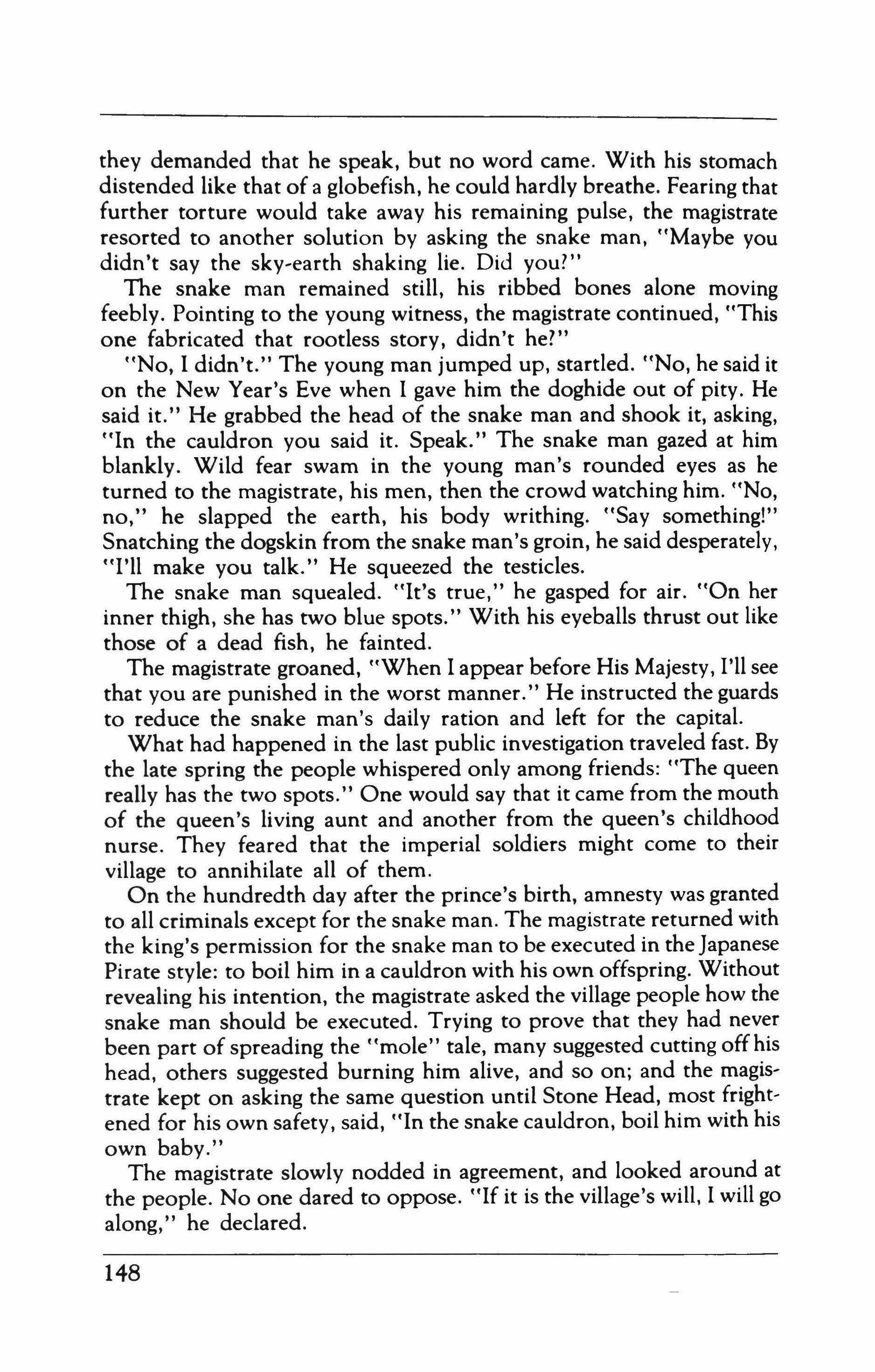
they demanded that he speak, but no word came. With his stomach distended like that of a globefish, he could hardly breathe. Fearing that further torture would take away his remaining pulse, the magistrate resorted to another solution by asking the snake man, "Maybe you didn't say the sky-earth shaking lie. Did you?"
The snake man remained still, his ribbed bones alone moving feebly. Pointing to the young witness, the magistrate continued, "This one fabricated that rootless story, didn't he?"
"No, I didn't." The young man jumped up, startled. "No, he said it on the New Year's Eve when I gave him the doghide out of pity. He said it." He grabbed the head of the snake man and shook it, asking, "In the cauldron you said it. Speak." The snake man gazed at him blankly. Wild fear swam in the young man's rounded eyes as he turned to the magistrate, his men, then the crowd watching him. "No, no," he slapped the earth, his body writhing. "Say something!" Snatching the dogskin from the snake man's groin, he said desperately, "I'll make you talk." He squeezed the testicles.
The snake man squealed. "It's true," he gasped for air. "On her inner thigh, she has two blue spots." With his eyeballs thrust out like those of a dead fish, he fainted.
The magistrate groaned, "When I appear before His Majesty, I'll see that you are punished in the worst manner." He instructed the guards to reduce the snake man's daily ration and left for the capital. What had happened in the last public investigation traveled fast. By the late spring the people whispered only among friends: "The queen really has the two spots." One would say that it came from the mouth of the queen's living aunt and another from the queen'5 childhood nurse. They feared that the imperial soldiers might come to their village to annihilate all of them.
On the hundredth day after the prince's birth, amnesty was granted to all criminals except for the snake man. The magistrate returned with the king's permission for the snake man to be executed in the Japanese Pirate style: to boil him in a cauldron with his own offspring. Without revealing his intention, the magistrate asked the village people how the snake man should be executed. Trying to prove that they had never been part of spreading the "mole" tale, many suggested cutting offhis head, others suggested burning him alive, and so on; and the magis, trate kept on asking the same question until Stone Head, most fright, ened for his own safety, said, "In the snake cauldron, boil him with his own baby."
The magistrate slowly nodded in agreement, and looked around at the people. No one dared to oppose. "If it is the village's will, I will go along," he declared.
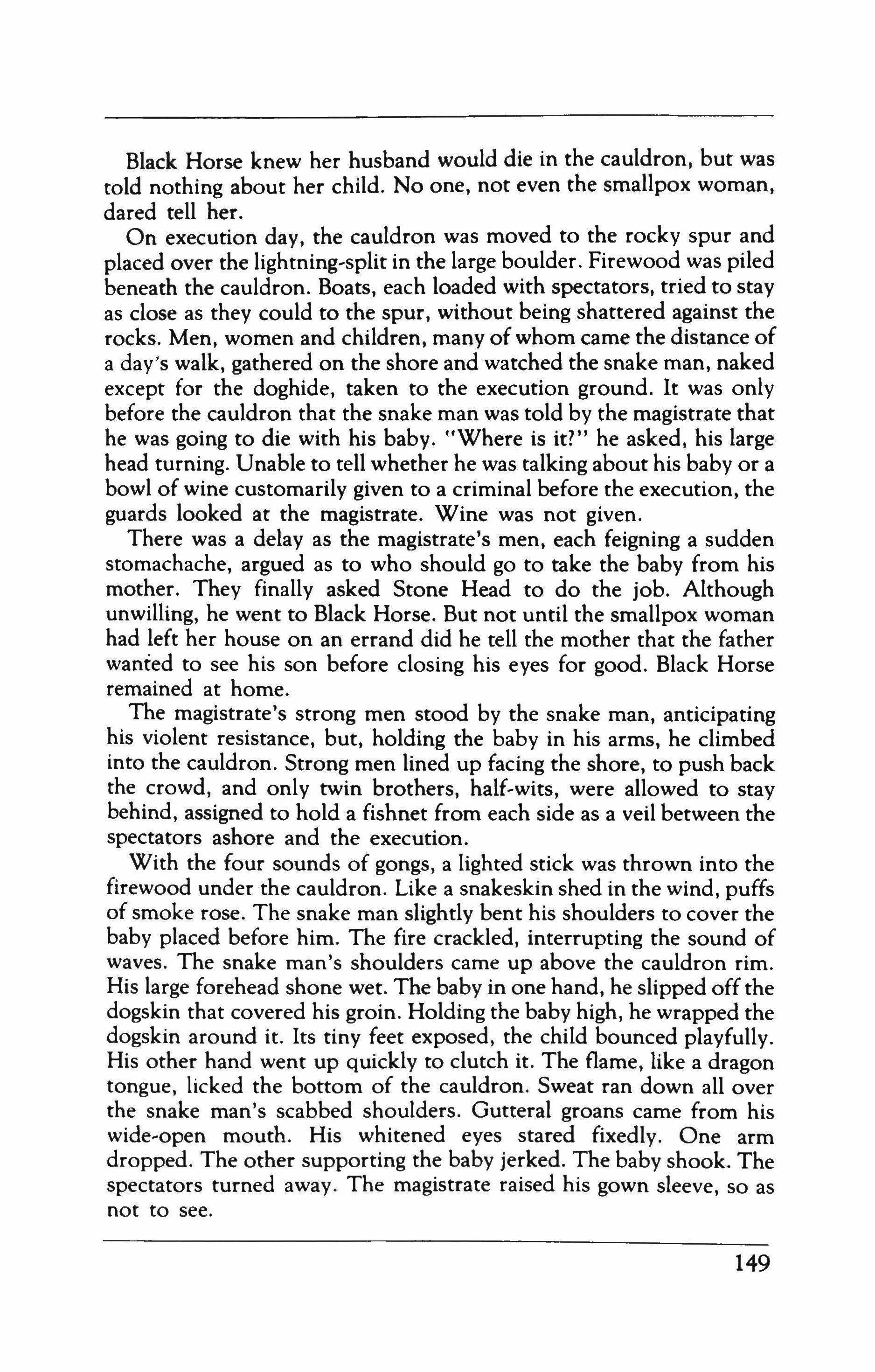
Black Horse knew her husband would die in the cauldron, but was told nothing about her child. No one, not even the smallpox woman, dared tell her.
On execution day, the cauldron was moved to the rocky spur and placed over the lightning-split in the large boulder. Firewood was piled beneath the cauldron. Boats, each loaded with spectators, tried to stay as close as they could to the spur, without being shattered against the rocks. Men, women and children, many of whom came the distance of a day's walk, gathered on the shore and watched the snake man, naked except for the doghide, taken to the execution ground. It was only before the cauldron that the snake man was told by the magistrate that he was going to die with his baby. "Where is it?" he asked, his large head turning. Unable to tell whether he was talking about his baby or a bowl of wine customarily given to a criminal before the execution, the guards looked at the magistrate. Wine was not given.
There was a delay as the magistrate's men, each feigning a sudden stomachache, argued as to who should go to take the baby from his mother. They finally asked Stone Head to do the job. Although unwilling, he went to Black Horse. But not until the smallpox woman had left her house on an errand did he tell the mother that the father wanted to see his son before closing his eyes for good. Black Horse remained at home.
The magistrate's strong men stood by the snake man, anticipating his violent resistance, but, holding the baby in his arms, he climbed into the cauldron. Strong men lined up facing the shore, to push back the crowd, and only twin brothers, half-wits, were allowed to stay behind, assigned to hold a fishnet from each side as a veil between the spectators ashore and the execution.
With the four sounds of gongs, a lighted stick was thrown into the firewood under the cauldron. Like a snakeskin shed in the wind, puffs of smoke rose. The snake man slightly bent his shoulders to cover the baby placed before him. The fire crackled, interrupting the sound of waves. The snake man's shoulders came up above the cauldron rim. His large forehead shone wet. The baby in one hand, he slipped off the dogskin that covered his groin. Holding the baby high, he wrapped the dogskin around it. Its tiny feet exposed, the child bounced playfully. His other hand went up quickly to clutch it. The flame, like a dragon tongue, licked the bottom of the cauldron. Sweat ran down all over the snake man's scabbed shoulders. Gutteral groans came from his wide-open mouth. His whitened eyes stared fixedly. One arm dropped. The other supporting the baby jerked. The baby shook. The spectators turned away. The magistrate raised his gown sleeve, so as not to see.

"It's the king's seed!" A piercing voice rose from the shore. "Take the baby out!" The smallpox woman dashed from the crowd, scream, ing and struggling with the magistrate's men. Cries sprang from all directions. "It's the king's, the king's, the king'sl"
The twins hauled in their net, catching the baby from the snake man's hand and, in a whirling motion, releasing it further down on the sea below the spur. Men in a boat scooped up the tangled net, unfolding it. The doghide-wrapping was quickly removed from the small thing. The naked baby went up in a fisherman's arm, letting out a loud, frightened cry.
Women wailed. The twins stood dazed.
The magistrate looked the other way, toward the burned, black mountain, and, with an audible sigh, turned to walk to his sedan chair.
The snake man lay still, his massive head flung back over the edge of the cauldron. In his clean, radiant face his eyes were open, one downward toward the earth, the other toward the empty sky. Village men picked up the body and carried it in a coarse straw mat to the mountain to bury. Looking for a site to bury him, they went up and up the mountain. Yellow butterflies flew over the black, bare slope. At a

blue patch of tiny sprouting grasses on the mountain forehead, the butterflies lighted on burned tree stumps to hatch their eggs. The men chose the site for his burial ground.
As the earth was opened to receive the snake man, an old man bade him a farewell. "At your painful end, you helped save a new life. May you rest on this Dragon place-like a middle mole between Buddha's eyes, overlooking the village and the distant sea."
No one wanted to move the cauldron. It lay tilted, barnacled, harboring the mountain shadow of Dragon Head on which the snake man lay and the reflections of the curious faces of the people who began to call him Dragon Man.
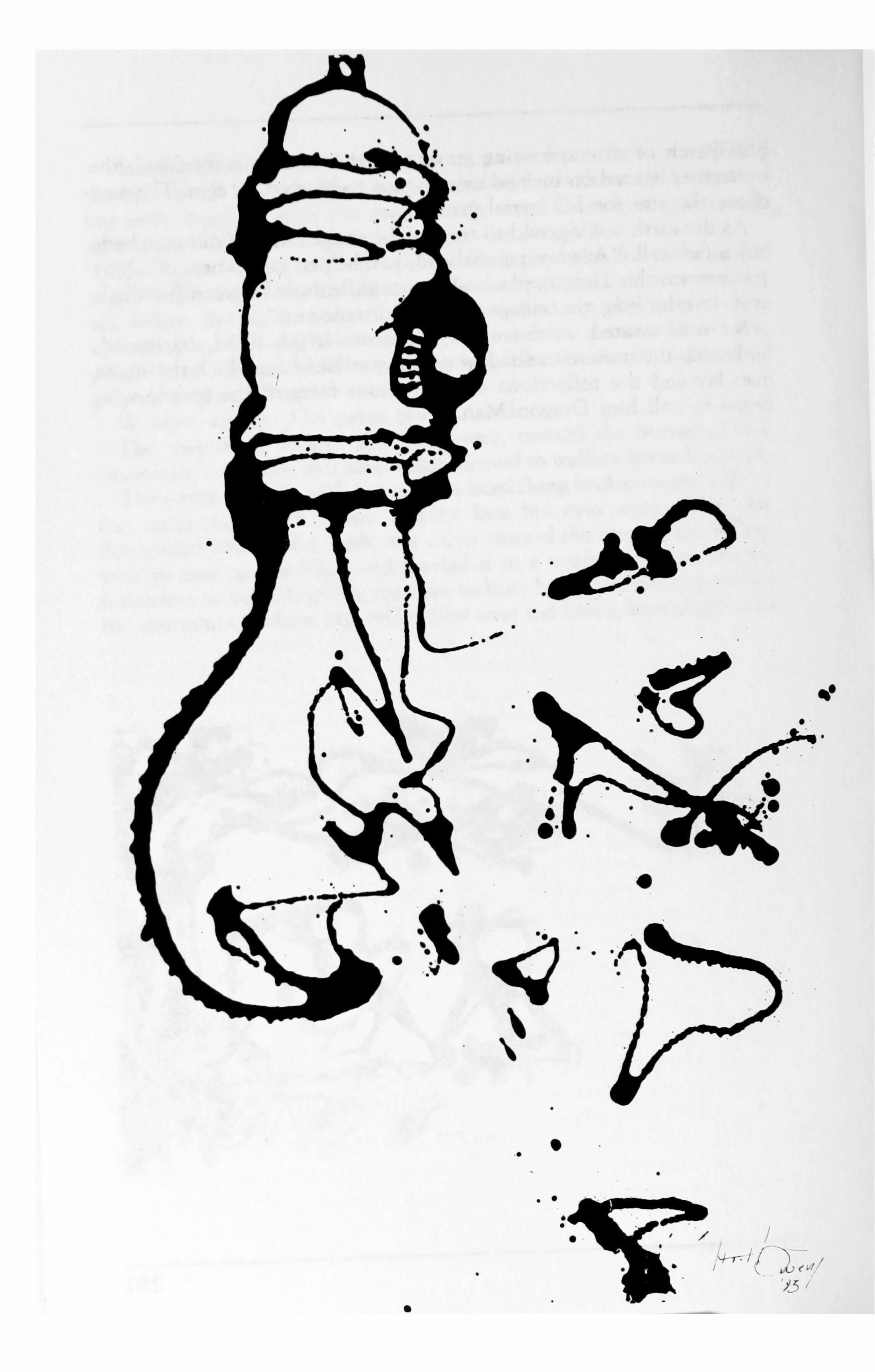

1968
Like myself, Barry Weinstein has this safe, ordinary name, the kind that in a few years should be molded into a plastic plaque followed by a few validating letters, D.D.S. perhaps, C.P.A. at least, M.D. if he works as hard as his mother wants him to. So it is with some surprise I witness him at near three a.m. stagger into the bunkhouse, wind up from his ankles, and swing his fist through the bare light bulb. He is, of course, badly cut. Blood trickles freely from his knuckles, spattering the wooden floor. Later, while I wrap his hand with a sweatsock, he gently explains to me that the light bulb had offended his sensibilities.
Though his breath is winey, we are enough weeks into summer camp for me to know my co-counselor is not drunk. The next day he is fired, naturally, and I think that is a good thing because three of the nine-vear-olds in our bunk are quick to tell me of the odd tricks Barry plays on them when he sprays their buns with Right Guard. Barry is hustled onto the first bus headed for the city and so I pack his bags for him. As I expect, I discover all his black pills are gone. Also his green pills and his red pills. Two white pills are all that are left, and for a moment like Alice beside the mushroom I think of nibbling them just to see how I will grow, but then I am overwhelmed by a wave ofgood sense and I leave my body chemistry undisturbed. I do keep Barry's blue-and-gold football jersey.
This is not a story about Barry Weinstein, who for all I know becomes a respected surgeon in Honolulu, on weekends and Wed� nesdays sailing his catamaran in the shadow of Diamond Head, his life complete but for a long lost football jersey, but I begin with Barry Weinstein because I so clearly remember the dark furrows grooving his brow, his face glistening foul sweat, my immediate intuition he might be criminally violent, the popping of the bulb and the room's

blink into blackness, and I remember my two initial thoughts: that if he were to endanger the sleeping boys I would have to do something, and that there was an excellent probability that he would hurt me when I did. But mostly I begin with Barry Weinstein because I so vividly remember how I rolled to one shoulder and feigned sleep-not from fear, mind you, but as a reasonable response to the craziness at large in the bunkhouse. What can you say to a man punching out a light?
Three weeks go by. While one night some of us hang around a netless ping-pong table and countless moths flutter up the cone of light cast by the spot over the On-Duty shack, we listen to a radio account of the mayhem in Chicago. We flick Marlboros into the damp grass and watch the orange glow grow dim and then extinguish. We talk of the girls back in the city we will see in just a week. And while we trade lies we are also informed of rioting cops, a crazed Mayor, dogs, gas, and what in the cool August Catskill night likely seems the beginning of a New American Revolution. There are no clouds or moon, so there are many, many stars. I am twenty. Against the cold I drink Southern Comfort, not only because Janis Joplin drinks the stuff, but because it is raw and sweet and makes me think I breathe fire and smoke. Also, it knots my guts and makes me want to puke. Innocent and confessional, I tell a guy of how four years before, a bright and eager high school senior in a government class, I debate with a similar fool on the school's stage the relative merits of Lyndon Johnson and Barry Goldwater. That sixteenth summer, the last I believe our actions have consequences significant to our lives, I ring doorbells and collar shoppers adrift in malls for the peace candidate, LBJ. And so while we listen to reports of Allen Ginsberg chanting hoarse in the park and Hubert Humphrey parroting policy in the hall, I am able to remain calm, at twenty already a man who appreciates betrayal and the creation of small ironies. Craziness is at large in Chicago.
But this is not a political memoir, either. If you cannot see the connection between Barry Weinstein duking out a light and the soonto-follow Democratic Convention of 1968, then perhaps if I tell you that that is also the summer I meet the girl-in those times it is O.K. to say "girl'-c-whom I eventually marry, you may then understand. We work together that summer. At nights, with a blanket, we slip into the woods to squeeze and grope, but we never then completely make love. I am urgent with a twenty-year-old's need, but she is frightened of doing it outdoors for fear of being discovered. Though in a year I am eligible to be meat in Westmoreland's grinder, she has no pity. I burn

my draft card and she does not come across. Though I am legendarythe man who stopped Mad Berserker Weinstein, drug-crazed and horrible-she does not share the camp's admiration. Her, Weinstein and Chicago. There ate patterns that can be perceived.
1975
We sit in a redwood hot-tub, steamy with chlorinated mist, beneath a clouded California night sky. From the valley below us the soft glow of city lights disperses in the humid air. I am slightly stoned on two shared joints and so very mellow, but nevertheless troubled I might be betrayed by an errant splinter finding its way into my bare ass. The woman I married is close beside me, the water bubbling just at the level of her nipples, her breasts afloat and not quite freely bobbing on the surface. Green bubbles rise and fizz all about her. My leg touches hers. The skin of her calf is slippery and smooth. Also in this close hot-tub are Jeremy and Bobbie, who are not married to each other, though both have been married. Jeremy is hollow-chested, hairy, and hung like a squirrel. Bobbie's hair is ridiculously long, blond and tightly wavy, something like Rapunzel's. Bobbie's reddened mouth opens wide when she laughs, which is too often, frequently when there is nothing funny. Briefly while we disrobe on the deck I am able to see her now-submerged crotch, and I am puzzled at the sparsity and odd distribution of her pubic hair until after several minutes of our being parboiled together I figure out that she must shave herself at Jeremy's request. I look to Jeremy with fresh insight.
I have served time as a teacher, failed at two retail businesses, fathered one girl and one boy, had one petty affair, and am now again a student, this time at the western end of the continent, this time for something practical called Human Resource Management. After a year I am not as certain as is the Graduate Catalog about the degree's practicality, but it is a pleasant enough time in our lives with few demands, so why should I rock the hot-tub!
To explain how it comes to be that my wife and I discover ourselves naked at night floating in a small hot-tub with two recent acquaintances is no easy task. You have your choice of explanations: we migrate to California because my wife's people have returned to a condominium near San Diego and help us with our bills and the tuition for my perpetual education, in return for which we guarantee proximity to their grandchildren; we migrate to California because we are captured in the Brownian movement of American lives. The
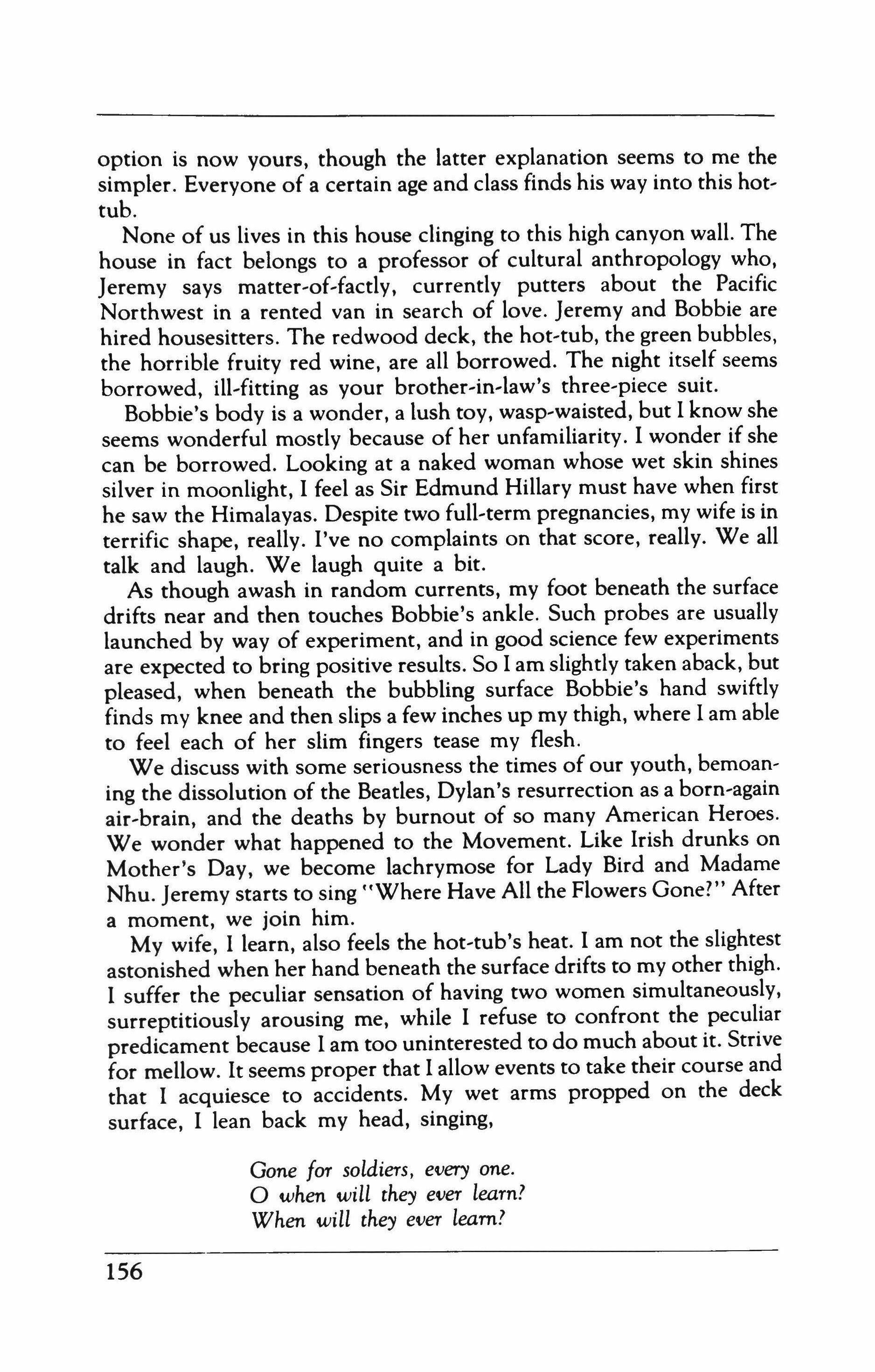
option is now yours, though the latter explanation seems to me the simpler. Everyone of a certain age and class finds his way into this hot, tub.
None of us lives in this house clinging to this high canyon wall. The house in fact belongs to a professor of cultural anthropology who, Jeremy says matter-of-factlv, currently putters about the Pacific Northwest in a rented van in search of love. Jeremy and Bobbie are hired housesitters. The redwood deck, the hot-tub, the green bubbles, the horrible fruity red wine, are all borrowed. The night itself seems borrowed, ill-fitting as your brother-in-law's three-piece suit.
Bobbie's body is a wonder, a lush toy, wasp-waisted, but I know she seems wonderful mostly because of her unfamiliarity. I wonder if she can be borrowed. Looking at a naked woman whose wet skin shines silver in moonlight, I feel as Sir Edmund Hillary must have when first he saw the Himalayas. Despite two full-term pregnancies, my wife is in terrific shape, really. I've no complaints on that score, really. We all talk and laugh. We laugh quite a bit.
As though awash in random currents, my foot beneath the surface drifts near and then touches Bobbie's ankle. Such probes are usually launched by way of experiment, and in good science few experiments are expected to bring positive results. So I am slightly taken aback, but pleased, when beneath the bubbling surface Bobbie's hand swiftly finds my knee and then slips a few inches up my thigh, where I am able to feel each of her slim fingers tease my flesh.
We discuss with some seriousness the times of our youth, bemoan' ing the dissolution of the Beatles, Dylan's resurrection as a born-again air-brain, and the deaths by burnout of so many American Heroes. We wonder what happened to the Movement. Like Irish drunks on Mother's Day, we become lachrymose for Lady Bird and Madame Nhu. Jeremy starts to sing "Where Have All the Flowers Gone?" After a moment, we join him.
My wife, I learn, also feels the hot-tub's heat. I am not the slightest astonished when her hand beneath the surface drifts to my other thigh. I suffer the peculiar sensation of having two women simultaneously, surreptitiously arousing me, while I refuse to confront the peculiar predicament because I am too uninterested to do much about it. Strive for mellow. It seems proper that I allow events to take their course and that I acquiesce to accidents. My wet arms propped on the deck surface, I lean back my head, singing,
Gone for soldiers, every one.
o when will they ever learn? When will they ever learn?
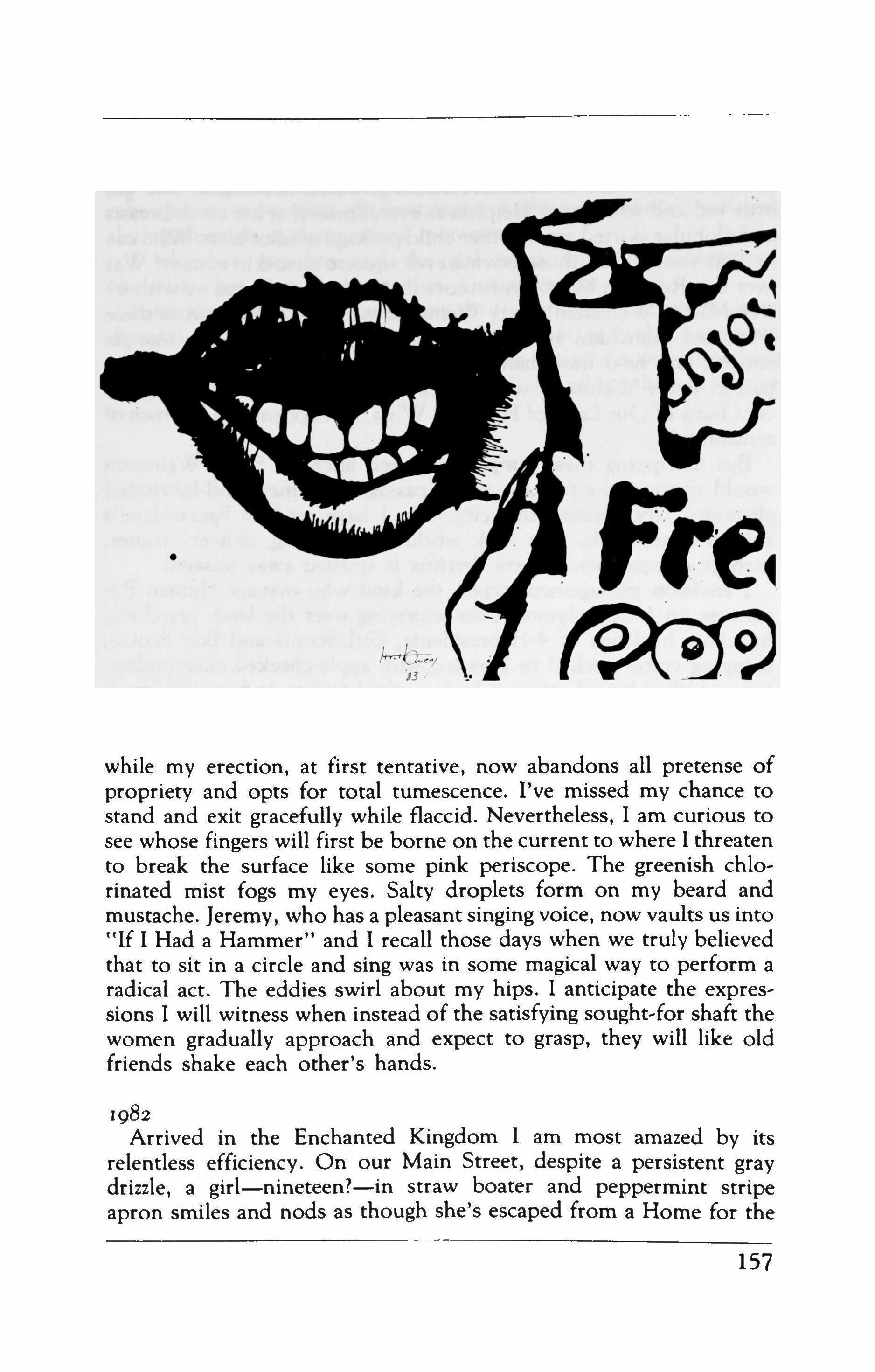
while my erection, at first tentative, now abandons all pretense of propriety and opts for total tumescence. I've missed my chance to stand and exit gracefully while flaccid. Nevertheless, I am curious to see whose fingers will first be borne on the current to where 1 threaten to break the surface like some pink periscope. The greenish chlorinated mist fogs my eyes. Salty droplets form on my beard and mustache. Jeremy, who has a pleasant singing voice, now vaults us into "If 1 Had a Hammer" and I recall those days when we truly believed that to sit in a circle and sing was in some magical way to perform a radical act. The eddies swirl about my hips. I anticipate the expressions I will witness when instead of the satisfying sought-for shaft the women gradually approach and expect to grasp, they will like old friends shake each other's hands.
Arrived in the Enchanted Kingdom I am most amazed by its relentless efficiency. On our Main Street, despite a persistent gray drizzle, a girl-nineteen?-in straw boater and peppermint stripe apron smiles and nods as though she's escaped from a Home for the

Incurably Simple. Amazed, I watch her scoop popcorn from what is meant to look like a miniature steam-powered fire-engine into gay little red-and-white bags. Helpless as ever, I marvel at her conic breasts and globular skirted ass, another child package of idiot bliss. Who can be that young? Can those bovine eyes squeeze closed in ecstasy? Was ever this Rotarian Main Street more than a dream of what we wish we were? Barry Weinstein. Barry Weinstein would with joy uproot these truncated munchkin streetlights (cunningly shaped to seem like gas lamps), and he'd hurl them through the windows of the ice-cream parlor. Barry Weinstein would spray with Right Guard the magnificent buns of Our Lady of Popcorn. What has happened to our men of sensibility?
But in ripping these lamps from their anchors, Barry Weinstein would uncover the tunnels, pipes, passageways, metal, oil-lubricated glistening city beneath this city. Oh, I have read of Fantasyland's subterranean levels. The dark world of plumbing, delivery routes, garbage compactors. Where detritus is spirited away unseen.
I envision management types, the kind who manage Human Resources, in blue polyester suits scurrying over the land, searching, hijacking busloads of 4�H presidents, Girl Scouts and Boy Scouts, shipping crates packed to bursting with apple-cheeked cheerleaders, tawny vellow-haired refugees from surfer beaches, and square-jawed, firm-handshaking, All-State halfbacks, packed in excelsior, shipped unspoiled and unsullied direct to you from America's heartland, to this place, to join as one with the other members of the Legions of the Hopelessly Wholesome, fellow travelers on our baroque American Odyssey masterminded by a mouse and a duck.
Everyone knows that deep within those tunnels beneath the land, hunchbacked, drooling, mangy trolls keep the wheels oiled, for who can say what reason maintaining the machinery that operates the dream on the surface above. And though we walk among the robust inhabitants of our surface dream, through the soles of our feet we cannot help but feel the trembling, slow, tectonic changes of our continental nightmare, irresistible and awesome.
My son and I wander through the American Dream made manifest in Orlando. Coming here is a mistake, though I fear no place else is any better. At ten, already he is encased in the carapace of American ennui. For three days we stroll through a miracle of imagination wedded to technology, but his only moment of visible pleasure is when with laser and cannon he eradicates wave upon wave ofcornputerized aliens. I cannot fault the woman to whom I once was married, she, too, afloat in the colloid suspension of American history. What can she do but waver like a reed in the tide of events? Craziness is

abroad in the land. My daughter this year chooses not to accompany her brother, and I am as relieved as I am saddened. We collide, we rebound, we grow apart, discreet motes, atomic, inured and insulated, sliding through our unnoticed moments.
I take her popcorn and the girl takes my coin. Commerce. Naturally, her eyes are clear blue. Our fingertips touch.
Later that night, after my son by the flickering TV screen has been drugged comatose, I lie in the darkness and am actually able once again to convince myself that in her eyes and in her touch was something very special, something of desire and need, something she had just for me.
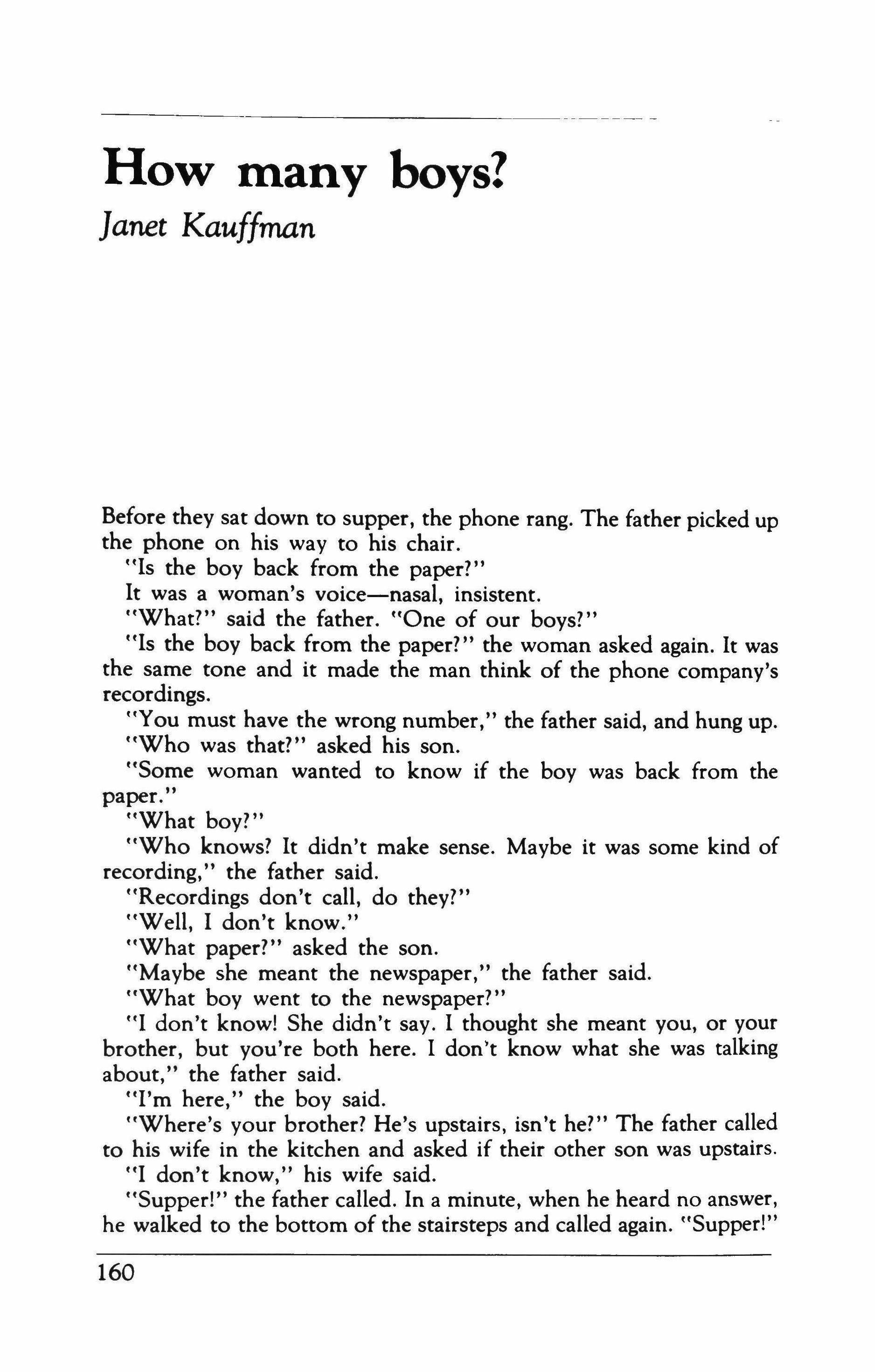
Before they sat down to supper, the phone rang. The father picked up the phone on his way to his chair.
"Is the boy back from the paper?"
It was a woman's voice-nasal, insistent.
"What?" said the father. "One of our boys?"
"Is the boy back from the paper?" the woman asked again. It was the same tone and it made the man think of the phone company's recordings.
"You must have the wrong number," the father said, and hung up.
"Who was that?" asked his son.
"Some woman wanted to know if the boy was back from the paper."
"What boy?"
"Who knows? It didn't make sense. Maybe it was some kind of recording," the father said.
"Recordings don't call, do they?"
"Well, I don't know."
"What paper?" asked the son.
"Maybe she meant the newspaper," the father said.
"What boy went to the newspaper?"
"I don't know! She didn't say. I thought she meant you, or your brother, but you're both here. I don't know what she was talking about," the father said.
"I'm here," the boy said.
"Where's your brother? He's upstairs, isn't he?" The father called to his wife in the kitchen and asked if their other son was upstairs.
"I don't know," his wife said.
"Supper!" the father called. In a minute, when he heard no answer, he walked to the bottom of the stairsteps and called again. "Supper!"
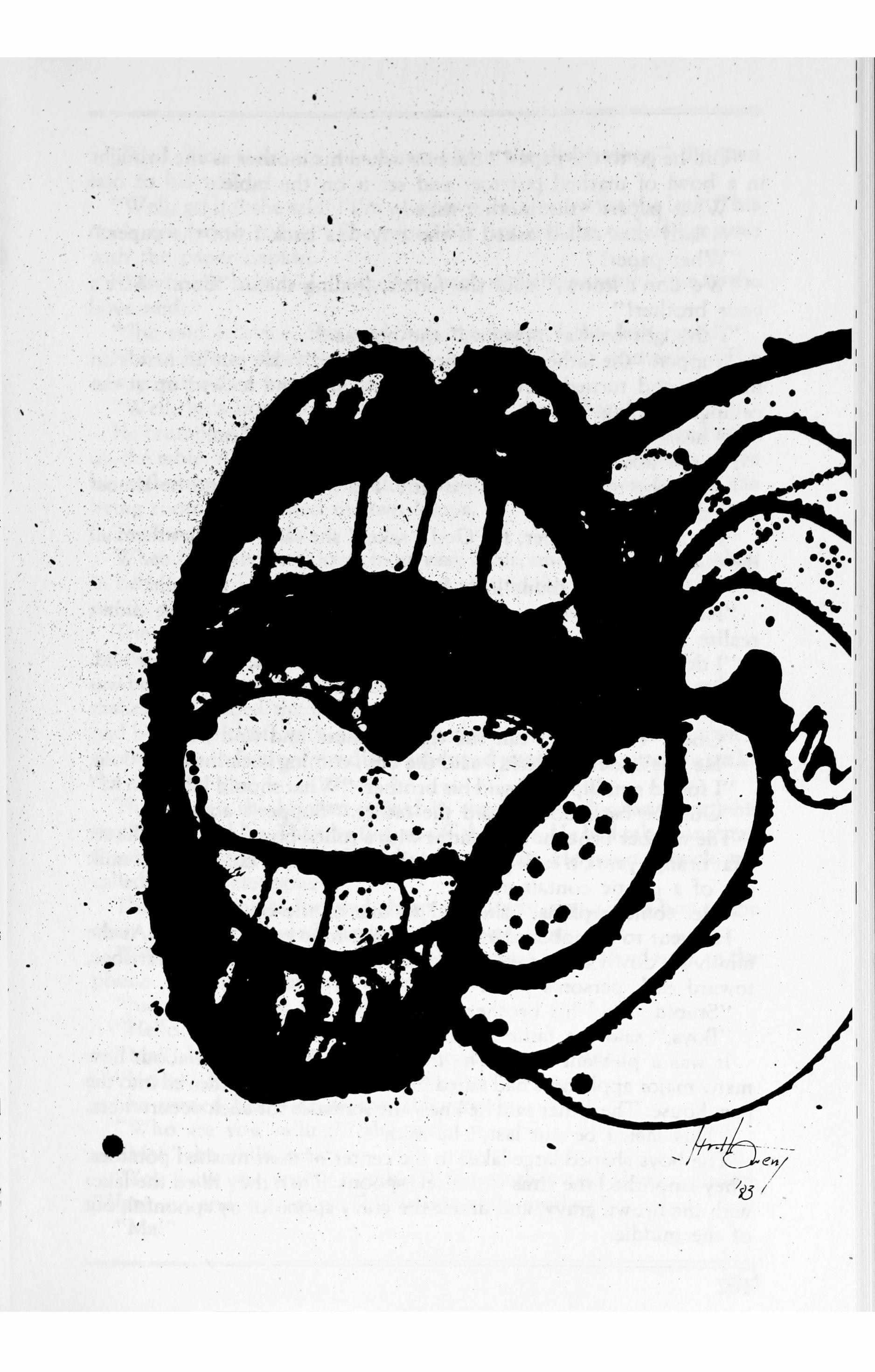

"Did he go to the paper?" the boy asked his mother as she brought in a bowl of mashed potatoes and set it on the table.
"What paper?" the mother asked.
"A lady that called asked if the boy was back from the paper."
"What paper?"
"We don't know," said the father, joining them. "Son, where's your brother?"
"I thought he was upstairs," the boy said.
"Supper!" the father called once more, loudly. He put his hands on his hips and turned slowly from side to side and looked up at the ceiling, listening.
"I heard something!" said the brother. "I'll get him."
He ran upstairs, two steps at a time.
"Ah!" the man sighed to his wife. His lips parted and he almost smiled.
"It's a wrong number, for God's sake," she said. "We get them all the time."
ttyou get called about little boys, out on errands at night?"
"No, but it's always something. People just start in. She didn't realize you were a wrong number," the mother said.
"I don't sound like somebody else. She was upset," the father said. "She called whoever she called because she was worried the boy was late."
"Good. Then she'll call the right number and find out."
"He was under his desk," said the boy, coming back into the room.
"1 found a millipede," said his brother. "What should I do with it?"
"Out the back door," said the father. "Supper's about set."
The mother brought in a platter with a rolled boneless roast. She set a fat orange yam on each plate, and then she poured tall glasses ofmilk out of a plastic container.
"Get some napkins," she said to one of the boys.
He went to a cupboard and picked out four paper napkins. As the family sat down at the table, he tossed a napkin, sidearm like a frisbee, toward each person's plate.
"Stupid," said his brother.
"Boys," said the father. "Just eat."
It was a pleasant meal. The mother and father talked about how many major appliances had failed in the year since they moved into the new house. The father said he knew the statistics for such occurrences.
"This should be out last," he said.
The boys shaped large lakes in the center of their mashed potatoes. They smoothed the rims with their spoons. Then they filled the lakes with the brown gravy, and drank the gravy spoonful by spoonful, out of the middle.
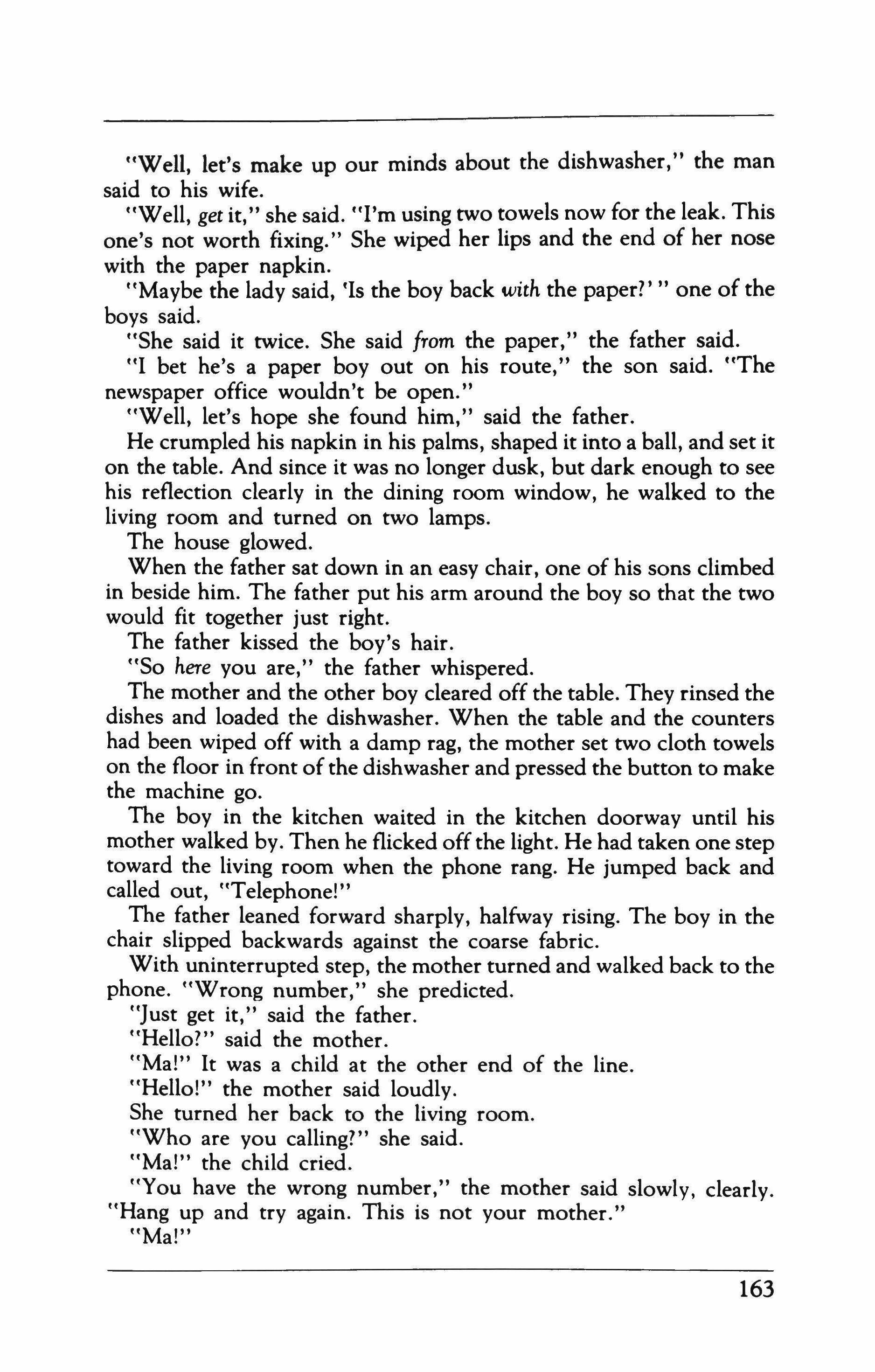
"Well, let's make up our minds about the dishwasher," the man said to his wife.
"Well, get it," she said. "I'm using two towels now for the leak. This one's not worth fixing." She wiped her lips and the end of her nose with the paper napkin.
"Maybe the lady said, 'Is the boy back with the paper?' one of the boys said.
"She said it twice. She said from the paper," the father said.
"I bet he's a paper boy out on his route," the son said. "The newspaper office wouldn't be open."
"Well, let's hope she found him," said the father.
He crumpled his napkin in his palms, shaped it into a ball, and set it on the table. And since it was no longer dusk, but dark enough to see his reflection clearly in the dining room window, he walked to the living room and turned on two lamps.
The house glowed.
When the father sat down in an easy chair, one of his sons climbed in beside him. The father put his arm around the boy so that the two would fit together just right.
The father kissed the boy's hair.
"So here you are," the father whispered.
The mother and the other boy cleared off the table. They rinsed the dishes and loaded the dishwasher. When the table and the counters had been wiped off with a damp rag, the mother set two cloth towels on the floor in front of the dishwasher and pressed the button to make the machine go.
The boy in the kitchen waited in the kitchen doorway until his mother walked by. Then he flicked off the light. He had taken one step toward the living room when the phone rang. He jumped back and called out, "Telephone! "
The father leaned forward sharply, halfway rising. The boy in the chair slipped backwards against the coarse fabric.
With uninterrupted step, the mother turned and walked back to the phone. "Wrong number," she predicted.
"Just get it," said the father.
"Hello?" said the mother.
"Ma!" It was a child at the other end of the line.
"Hello!" the mother said loudly.
She turned her back to the living room.
"Who are you calling?" she said.
"Ma!" the child cried.
"You have the wrong number," the mother said slowly, clearly. "Hang up and try again. This is not your mother."
"Ma!"

"You must hang up the phone now and dial again. All right?"
The child cried, "Ma!"
"You must hang up the phone. Just dial the telephone again. I'm hanging up now. Goodbye," the mother said.
"The boy! Was it the boy?" the boy in the kitchen asked.
"It sounded like a baby," the mother said. "Some baby dialed a number."
"It was crying?" asked the father.
"It sounded like crying. It just said the same thing," the mother said.
"Call the police!" said the boy in the kitchen.
"What?" said the mother. "What for? They don't trace calls that have already hung up. How could they find the baby? Maybe it just plays with the phone."
"You said it was crying," said the father.
"It said 'Ma,'" the mother said.
"A child knows how to dial for help," said the father. "Maybe it was hurt. Couldn't it talk?"
"I don't know how to dial for help," said the boy in the chair. He sat up and looked around.
"The kid was trying to call its mother and it got the wrong number. That's all," said the mother. "He'll dial again and get her."
"Maybe he's lost at the paper!" said the boy in the kitchen. He looked out toward the window, out toward the night.
"This was a baby," said the mother.
"It dialed a phone," said the boy. "Maybe he's at the paper, and it's closed up."
"Babies don't go on errands to the paper," said the father. "People shouldn't leave a baby alone like that."
"It's probably in its parents' room, thinking it'll call them up on the other phone," said the mother.
"They'd hear it!" one son said.
"Of course," said the father, nodding to his boy. "I think if the baby was crying, it was trying to call its mother."
"That's certainly all that he said," said the mother.
"Was the baby a boy baby?" one son asked.
"I don't know," said the mother. "It sounded like a boy."
"Maybe it couldn't turn on the lights," the other son said.
The family was quiet for a time. One boy went to look out the window. The mother went into the living room. She straightened cushions and sat down in the middle of the red sofa. A hearty smell of beef and gravy layover the air in the rooms.
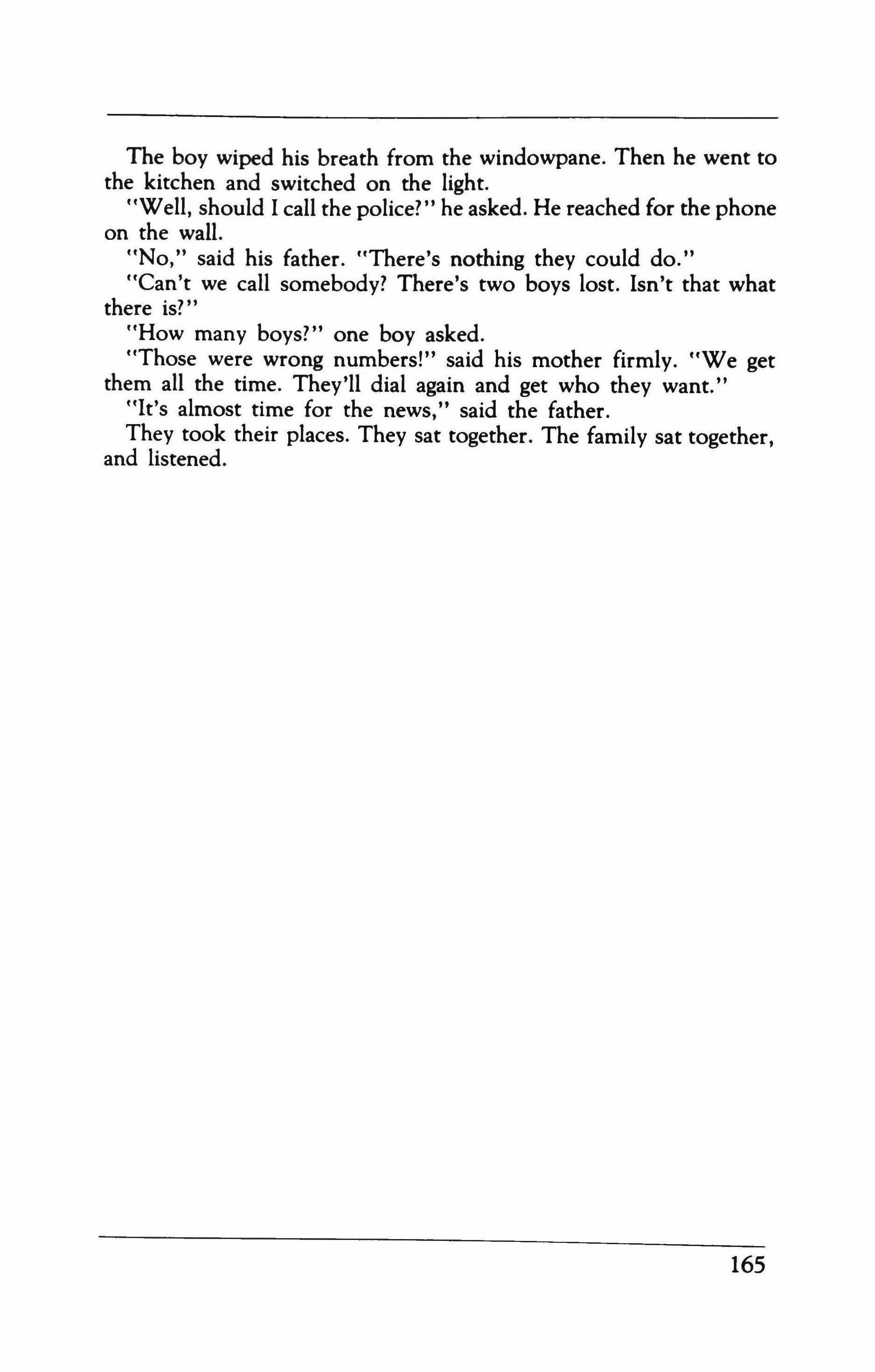
The boy wiped his breath from the windowpane. Then he went to the kitchen and switched on the light.
"Well, should I call the police?" he asked. He reached for the phone on the wall.
"No," said his father. "There's nothing they could do."
"Can't we call somebody? There's two boys lost. Isn't that what there is?"
"How many boys?" one boy asked.
"Those were wrong numbers!" said his mother firmly. "We get them all the time. They'll dial again and get who they want."
"It's almost time for the news," said the father.
They took their places. They sat together. The family sat together, and listened.
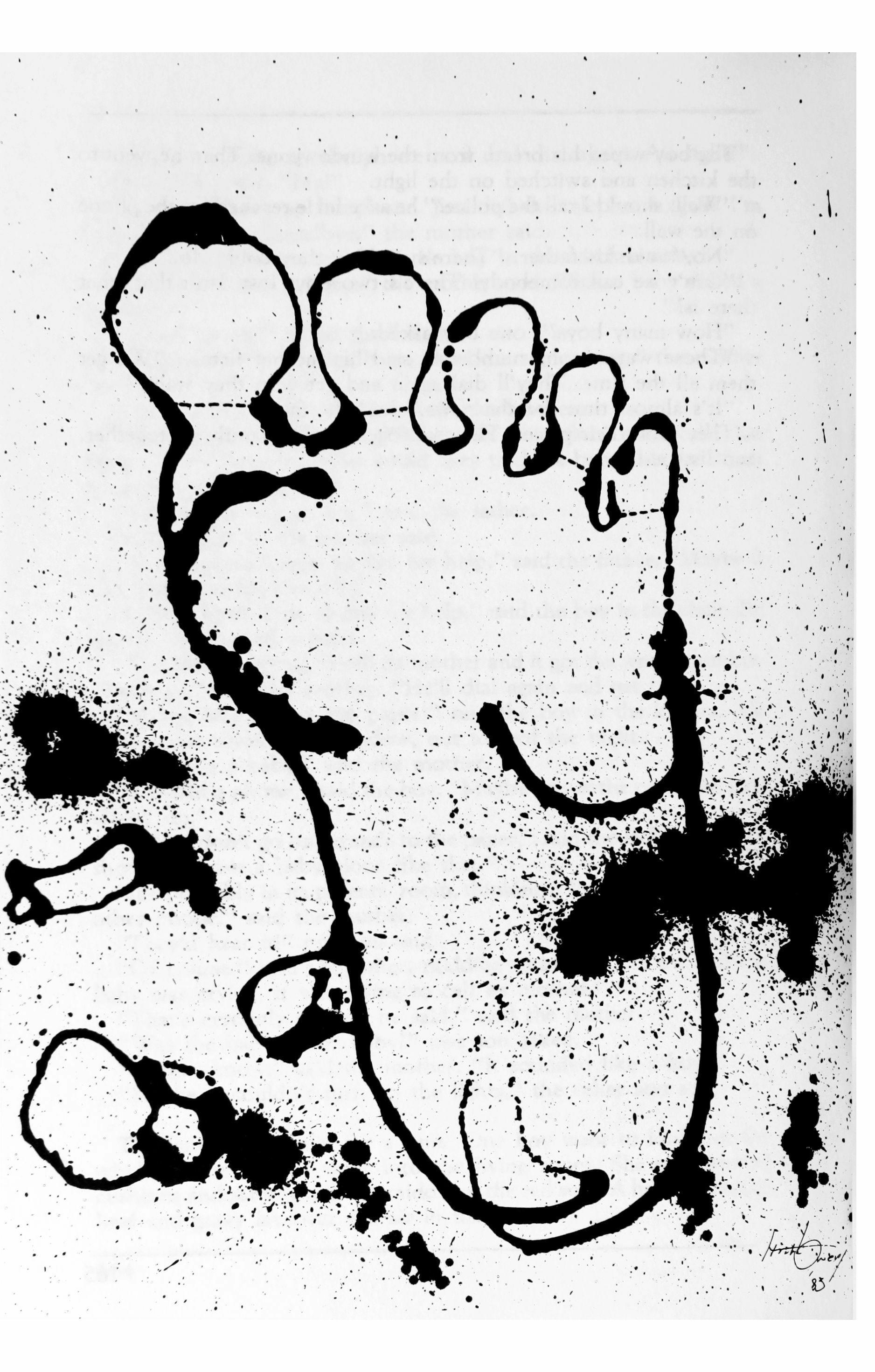

You lost em? All eleven?
Toes necsary. Toes keep you standin Up, not com crashin down like XVI Tower.
But lets be constructive. Didv ou look in your shoes? Down im thee bed? Last seen dancing with clumsys? Ina elevator full of crowded people?
They got bobbed, yo say? By a bobber? Cause yu neverwoulda give em aways, anyways.
So now You sa its me. I pulled em offwith my so active egotoes? Bit em each and everlitty won wit my sharp ouch teeeth night wild predatarsal love?
Hey! Wheres my teeeth?
If yo uthingk that, go finda woman somewhere with growing in her mouth, a set of bran knew toes (she oughto at least be better than mee at keeping quiet).
Yo uant me toe help because you dont want me toe help? alright. Thingk. Wher yo last scene em:
1. Keeep dis stance between someone elses shoes anyer own?
3. Times or more, play litty piggys on solar plexus ova foreign woman, confid in me so in timate y ou dint wanto play with me, or anywon??
4. Fending off slugs an hard knrocks???
2. Kick with.
S. I know. Maybe y oulost em On Thee Path Out Of Thee Grate Karmick W Q '"
a, Maybe so!
b. toemanipullating a calculator, count howmany spiritual extrasizes you perform correctly.
c! gret advances!
d. Inner Toes, or Outer Shoews?
m. W.hatever i.t t.akes?
f. Yo kno whut? I think y oujust kurled all your litty toes under so we wouldnt sea em.
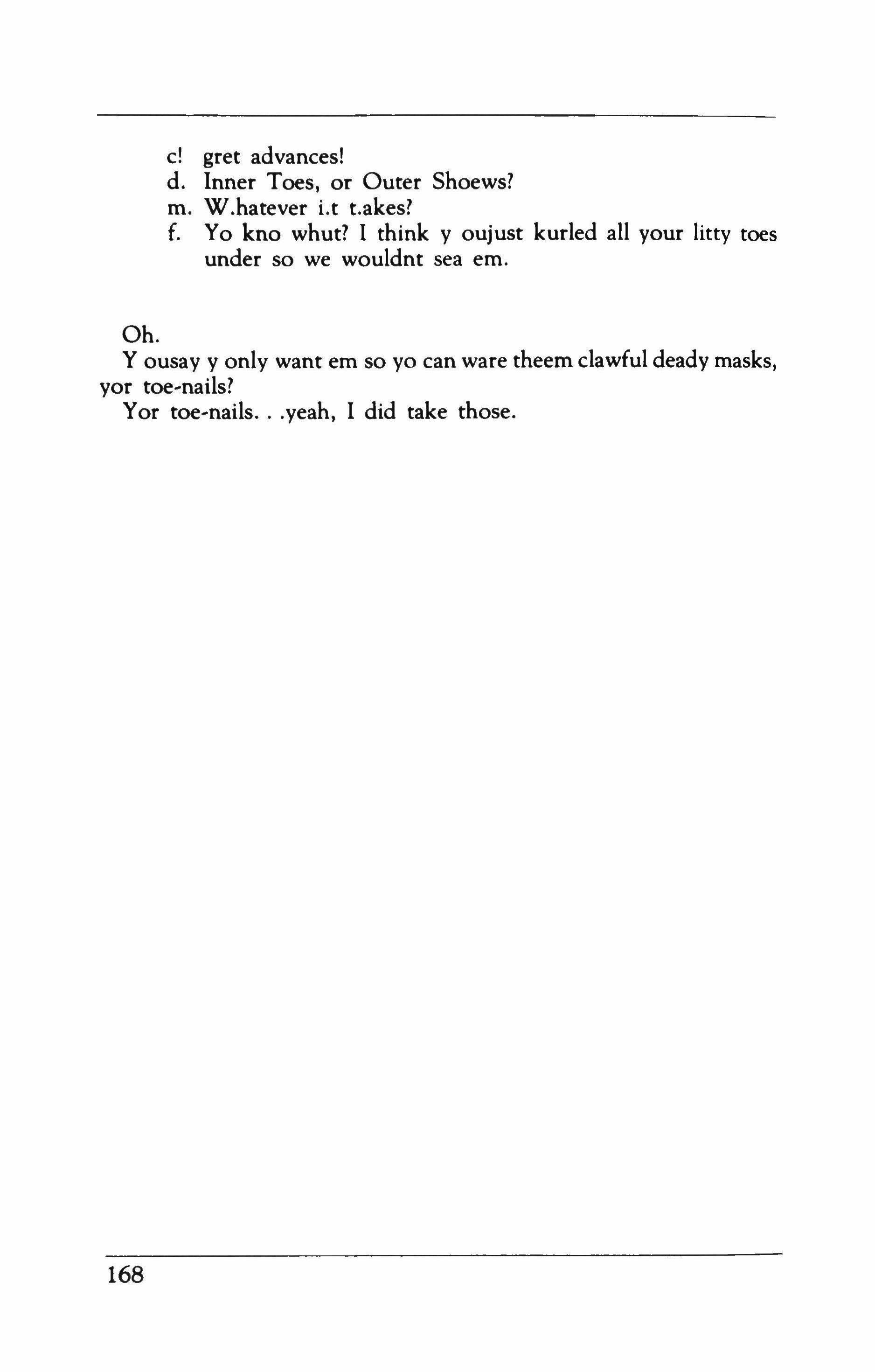
Oh.
Y ousay y only want em so yo can ware theem clawful deadv masks, yor toe-nails!
Yor toe-nails yeah, I did take those.
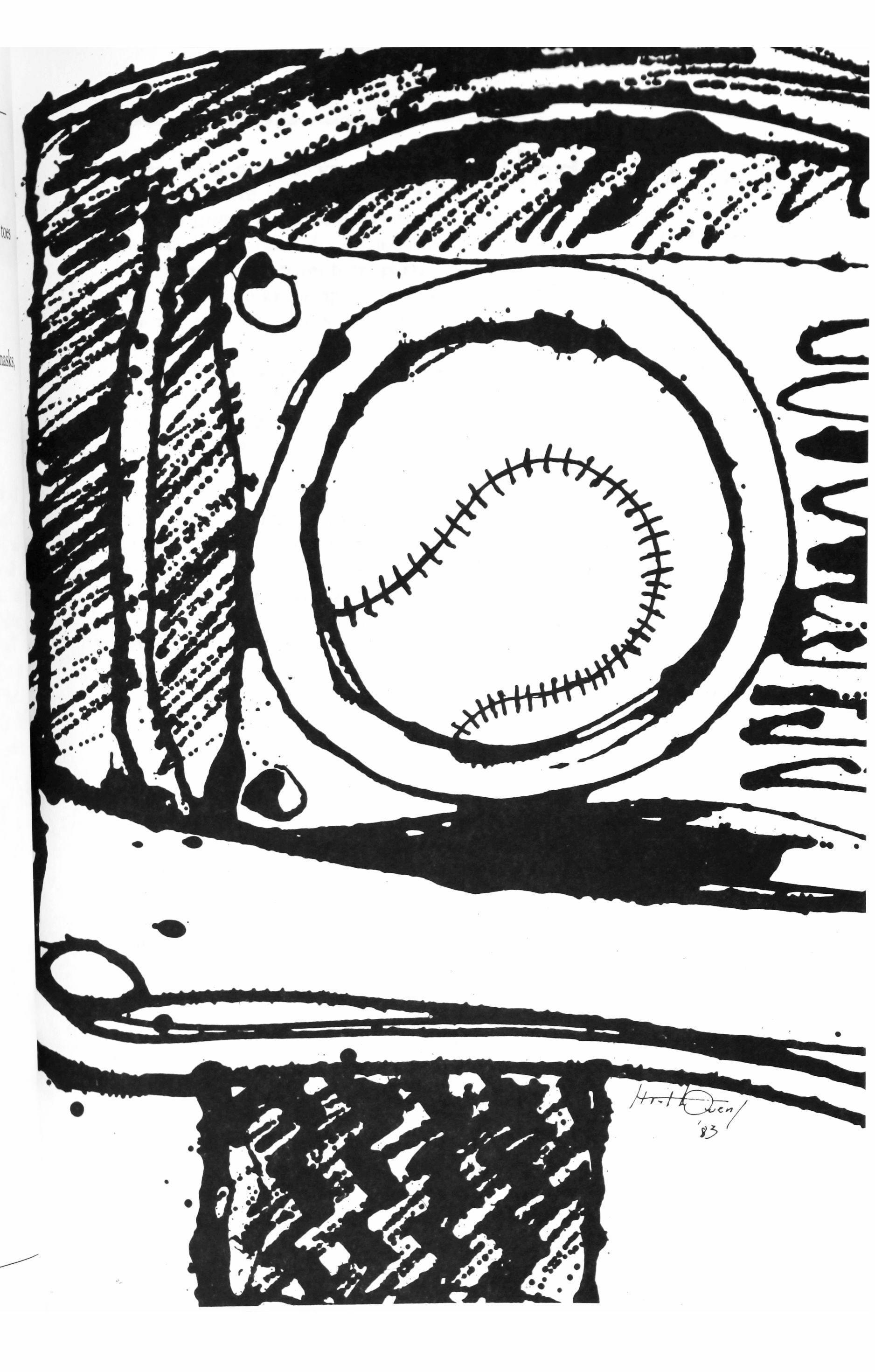
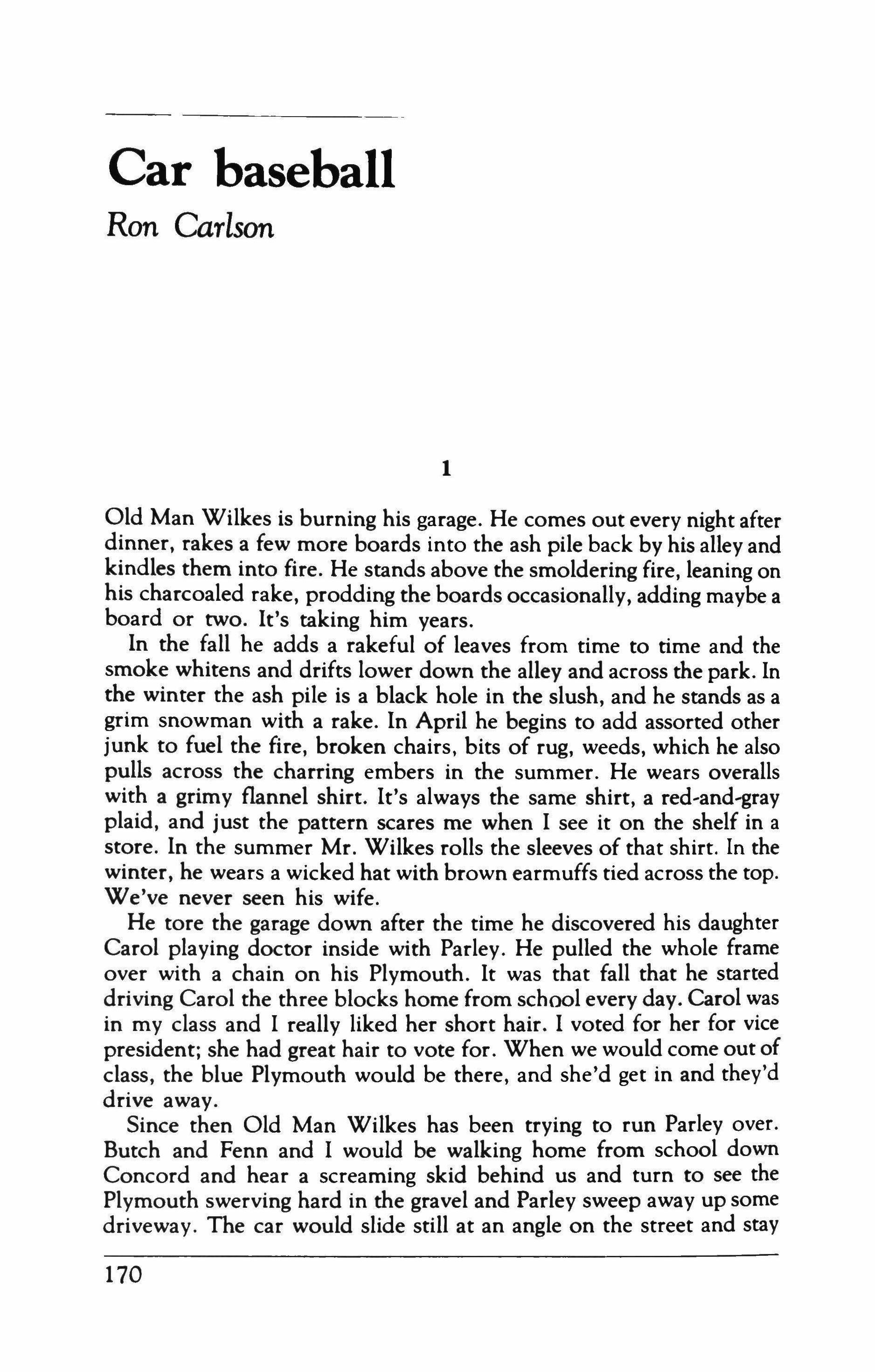
Old Man Wilkes is burning his garage. He comes out every night after dinner, rakes a few more boards into the ash pile back by his alley and kindles them into fire. He stands above the smoldering fire, leaning on his charcoaled rake, prodding the boards occasionally, adding maybe a board or two. It's taking him years.
In the fall he adds a rakeful of leaves from time to time and the smoke whitens and drifts lower down the alley and across the park. In the winter the ash pile is a black hole in the slush, and he stands as a grim snowman with a rake. In April he begins to add assorted other junk to fuel the fire, broken chairs, bits of rug, weeds, which he also pulls across the charring embers in the summer. He wears overalls with a grimy flannel shirt. It's always the same shirt, a red-and-gray plaid, and just the pattern scares me when I see it on the shelf in a store. In the summer Mr. Wilkes rolls the sleeves of that shirt. In the winter, he wears a wicked hat with brown earmuffs tied across the top. We've never seen his wife.
He tore the garage down after the time he discovered his daughter Carol playing doctor inside with Parley. He pulled the whole frame over with a chain on his Plymouth. It was that fall that he started driving Carol the three blocks home from school every day. Carol was in my class and I really liked her short hair. I voted for her for vice president; she had great hair to vote for. When we would come out of class, the blue Plymouth would be there, and she'd get in and they'd drive away.
Since then Old Man Wilkes has been trying to run Parley over. Butch and Fenn and I would be walking home from school down Concord and hear a screaming skid behind us and turn to see the Plymouth swerving hard in the gravel and Parley sweep away up some driveway. The car would slide still at an angle on the street and stay
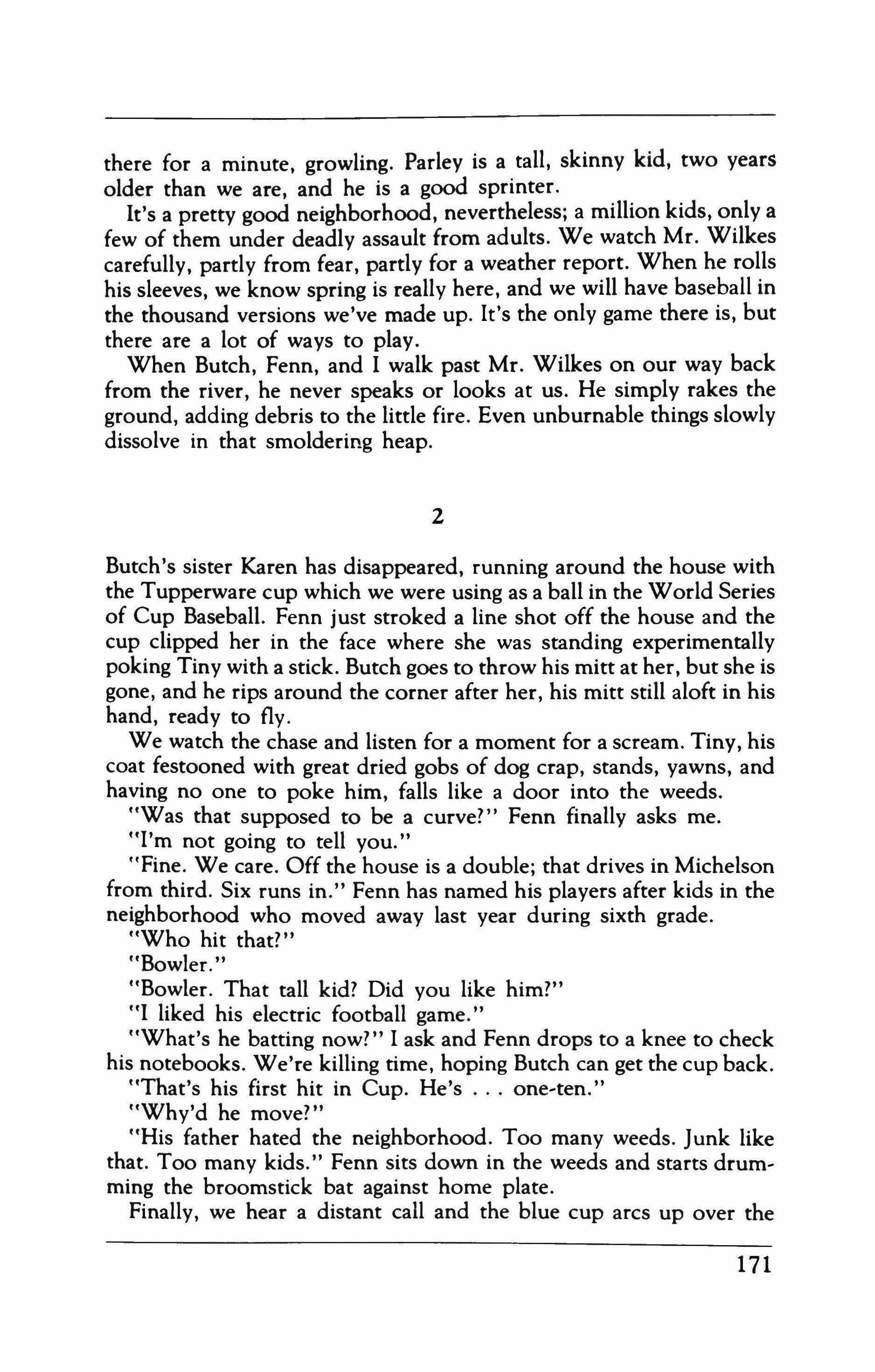
there for a minute, growling. Parley is a tall, skinny kid, two years older than we are, and he is a good sprinter.
It's a pretty good neighborhood, nevertheless; a million kids, only a few of them under deadly assault from adults. We watch Mr. Wilkes carefully, partly from fear, partly for a weather report. When he rolls his sleeves, we know spring is really here, and we will have baseball in the thousand versions we've made up. It's the only game there is, but there are a lot of ways to play.
When Butch, Fenn, and I walk past Mr. Wilkes on our way back from the river, he never speaks or looks at us. He simply rakes the ground, adding debris to the little fire. Even unburnable things slowly dissolve in that smoldering heap.
2
Butch's sister Karen has disappeared, running around the house with the Tupperware cup which we were using as a ball in the World Series of Cup Baseball. Fenn just stroked a line shot off the house and the cup clipped her in the face where she was standing experimentally poking Tiny with a stick. Butch goes to throw his mitt at her, but she is gone, and he rips around the corner after her, his mitt still aloft in his hand, ready to fly.
We watch the chase and listen for a moment for a scream. Tiny, his coat festooned with great dried gobs of dog crap, stands, yawns, and having no one to poke him, falls like a door into the weeds.
"Was that supposed to be a curve?" Fenn finally asks me.
"I'm not going to tell you."
"Fine. We care. Off the house is a double; that drives in Michelson from third. Six runs in." Fenn has named his players after kids in the neighborhood who moved away last year during sixth grade.
"Who hit that?"
"Bowler."
"Bowler. That tall kid? Did you like him?"
"I liked his electric football game."
"What's he batting now?" I ask and Fenn drops to a knee to check his notebooks. We're killing time, hoping Butch can get the cup back.
"That's his first hit in Cup. He's one-ten."
"Why'd he move?"
"His father hated the neighborhood. Too many weeds. Junk like that. Too many kids." Fenn sits down in the weeds and starts drum, ming the broomstick bat against home plate.
Finally, we hear a distant call and the blue cup arcs up over the

house and falls in the litter of Butch's wrecked backyard. Tiny opens an eye, but isn't up for trouble and goes back into his dog coma. Butch comes around the house and takes his place in centerfield under the bathroom window.
"Let's go."
I stretch and check second, lean and deliver: change up. Fenn swings way too hard and pops up to shallow right. Butch is there for the out.
As we rotate and I go to the plate, I see Karen march back into the yard. She has not been crying, although Butch has obviously pounded her, as he does every time she takes the cup and runs. Her set mouth and stubborn face are as tough as anything in this neighborhood.
Butch feeds me two fast balls, and I foul off the third. The broom, stick doesn't feel right and my confidence is shot. I step out of the box.
"This is Elston Howard," I say, tapping my tennis shoes with the broom handle. "He never strikes out."
"Yeah, yeah," Butch says, leaning in. I want to slap one out to Fenn, who can't see a thing. Butch winds up and throws: a slide-spinning curve, too slow, and I tap it with the end of the stick in a loopy fly into deep right-center.
Butch narrates: "It's going to be off the roof. Fenn is back to make the catch. Can he play it off the roof?"
I watch the cup slip down the shingles. Fenn has his back to us looking up at the eaves. The cup is swinging down the roof, spinning. It tips a standpipe and rolls right into the rain gutter. We've seen it before. Fenn is at the ready, legs spread, arms up, staring into the sky. He dances a little along the edge of the house. I walk out to Butch on the mound and we watch how ready Fenn is. We sit down with our feet in a hole and watch him hop around.
"Did it go over?" Fenn hollers without looking back.
"No," Butch says. "Get ready!"
Fenn redoubles his hopping. To his left, Karen watches him shaking her head. She is sitting on Tiny, the wonder dog.
"Where is it?"
"Get ready!"
Fenn is a frenzy of readiness.
"On the roof's a triple," I say to Butch. "That puts Howard on third, with Slaughter at the plate." I put Enos Slaughter on my team because his name is etched on my mitt.
"Yeah, well, write it in your book. This game is suspended. I can't take another cup for a few days."
Fenn is now only standing still, looking up, his arms at his sides.
"Is it coming?" He sounds annoyed.
"Sometime," Butch says. "Come on, let's hit the pharmacy."
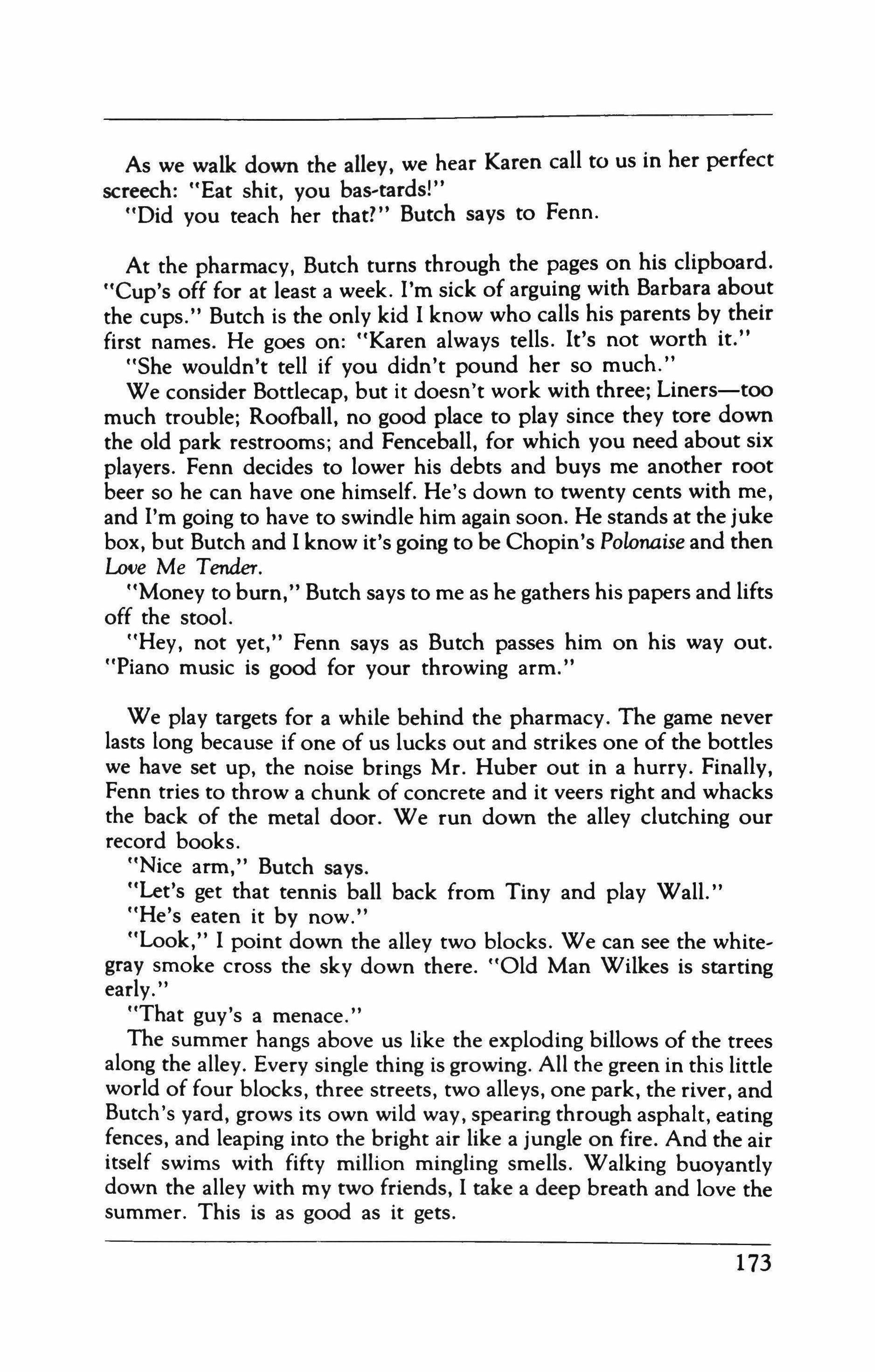
As we walk down the alley, we hear Karen call to us in her perfect screech: "Eat shit, you bas-tards!"
"Did you teach her that?" Butch says to Fenn.
At the pharmacy, Butch turns through the pages on his clipboard. "Cup's off for at least a week. I'm sick of arguing with Barbara about the cups." Butch is the only kid I know who calls his parents by their first names. He goes on: "Karen always tells. It's not worth it."
"She wouldn't tell if you didn't pound her so much."
We consider Bottlecap, but it doesn't work with three; Liners-too much trouble; Roofball, no good place to play since they tore down the old park restrooms; and Fenceball, for which you need about six players. Fenn decides to lower his debts and buys me another root beer so he can have one himself. He's down to twenty cents with me, and I'm going to have to swindle him again soon. He stands at the juke box, but Butch and I know it's going to be Chopin's Polonaise and then Love Me Tender.
"Money to burn," Butch says to me as he gathers his papers and lifts off the stool.
"Hey, not yet," Fenn says as Butch passes him on his way out. "Piano music is good for your throwing arm."
We play targets for a while behind the pharmacy. The game never lasts long because if one of us lucks out and strikes one of the bottles we have set up, the noise brings Mr. Huber out in a hurry. Finally, Fenn tries to throw a chunk of concrete and it veers right and whacks the back of the metal door. We run down the alley clutching our record books.
"Nice arm," Butch says.
"Let's get that tennis ball back from Tiny and play Wall."
"He's eaten it by now."
"Look," I point down the alley two blocks. We can see the whitegray smoke cross the sky down there. "Old Man Wilkes is starting early.
"That guy's a menace."
The summer hangs above us like the exploding billows of the trees along the alley. Every single thing is growing. All the green in this little world of four blocks, three streets, two alleys, one park, the river, and Butch's yard, grows its own wild way, spearing through asphalt, eating fences, and leaping into the bright air like a jungle on fire. And the air itself swims with fifty million mingling smells. Walking buoyantly down the alley with my two friends, I take a deep breath and love the summer. This is as good as it gets.
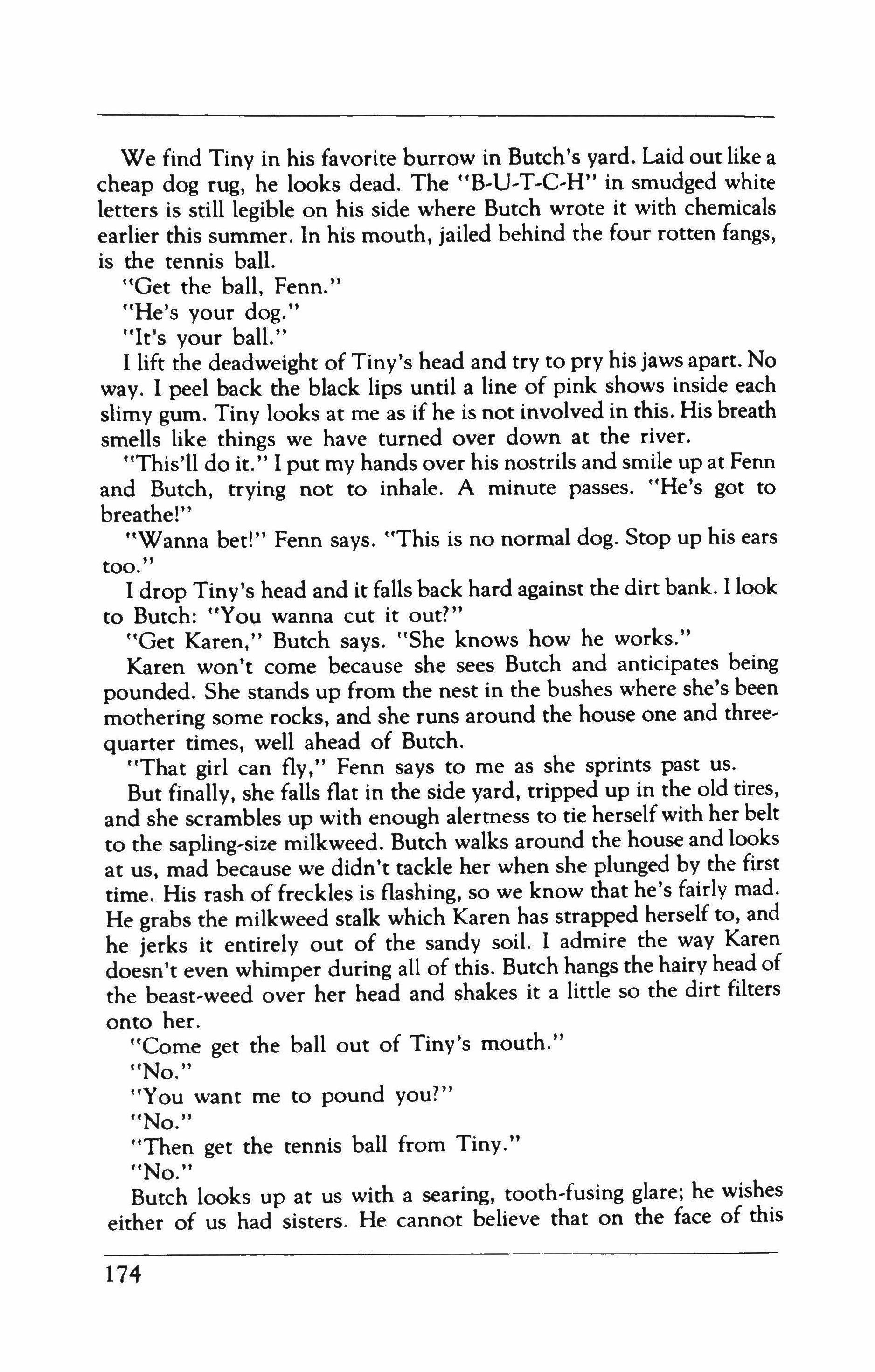
We find Tiny in his favorite burrow in Butch's yard. Laid out like a cheap dog rug, he looks dead. The uB,U,T,C,H" in smudged white letters is still legible on his side where Butch wrote it with chemicals earlier this summer. In his mouth, jailed behind the four rotten fangs, is the tennis ball.
"Get the ball. Fenn."
"He's your dog."
"It's your ball."
I lift the deadweight of Tiny's head and try to pry his jaws apart. No way. I peel back the black lips until a line of pink shows inside each slimy gum. Tiny looks at me as if he is not involved in this. His breath smells like things we have turned over down at the river.
"This'll do it." I put my hands over his nostrils and smile up at Fenn and Butch, trying not to inhale. A minute passes. "He's got to breathe!"
ItWanna bet!" Fenn says. "This is no normal dog. Stop up his ears too."
I drop Tiny's head and it falls back hard against the dirt bank. I look to Butch: "You wanna cut it out?"
"Get Karen," Butch says. "She knows how he works."
Karen won't come because she sees Butch and anticipates being pounded. She stands up from the nest in the bushes where she's been mothering some rocks, and she runs around the house one and three, quarter times, well ahead of Butch.
"That girl can fly," Fenn says to me as she sprints past us.
But finally, she falls flat in the side yard, tripped up in the old tires, and she scrambles up with enough alertness to tie herself with her belt to the sapling-size milkweed. Butch walks around the house and looks at us, mad because we didn't tackle her when she plunged by the first time. His rash of freckles is flashing, so we know that he's fairly mad. He grabs the milkweed stalk which Karen has strapped herself to, and he jerks it entirely out of the sandy soil. I admire the way Karen doesn't even whimper during all of this. Butch hangs the hairy head of the beast-weed over her head and shakes it a little so the dirt filters onto her.
"Corne get the ball out of Tiny's mouth." "No."
"You want me to pound you?" "No."
"Then get the tennis ball from Tiny." "No."
Butch looks up at us with a searing, tooth-fusing glare; he wishes either of us had sisters. He cannot believe that on the face of this
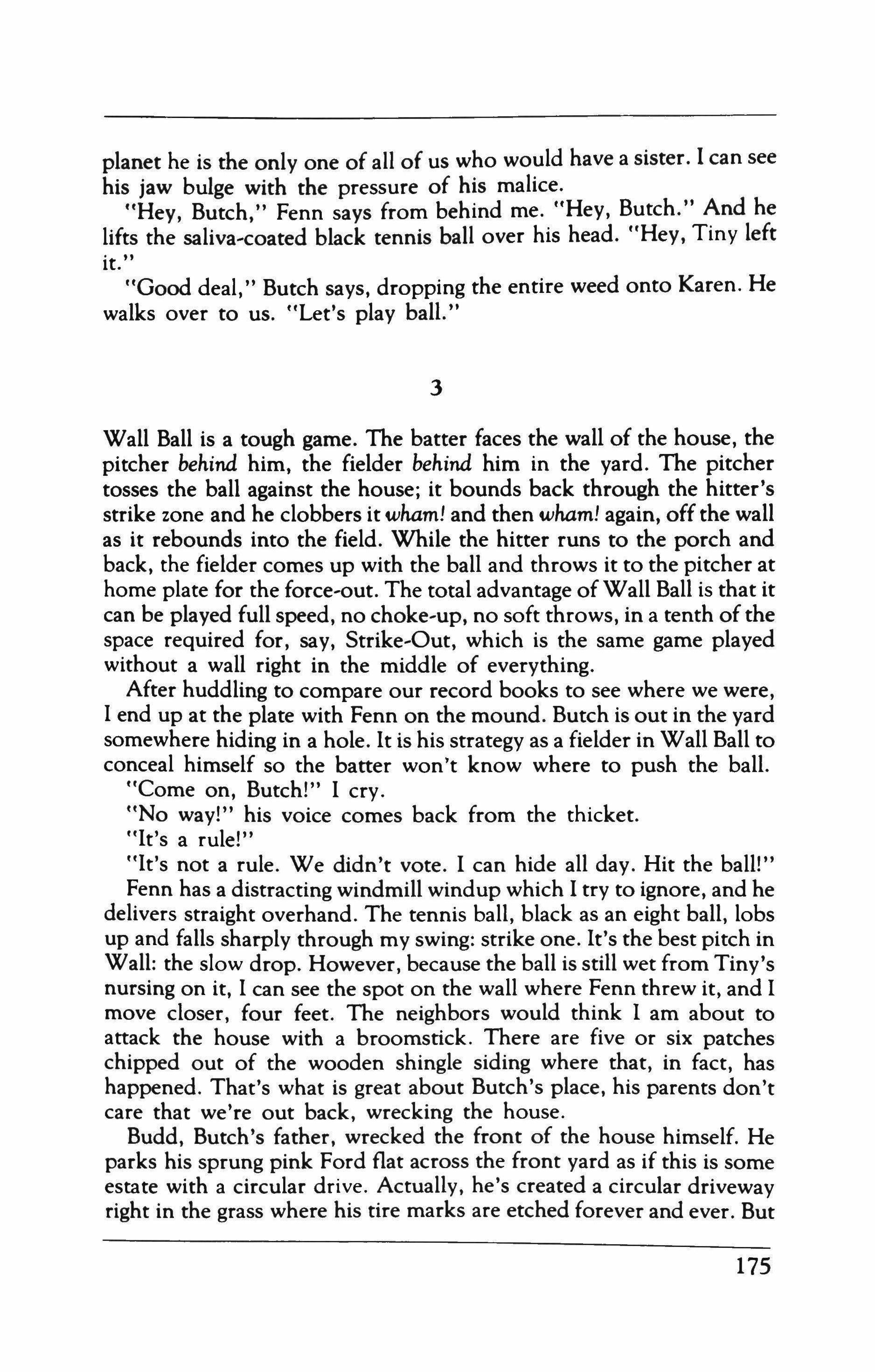
planet he is the only one of all of us who would have a sister. I can see his jaw bulge with the pressure of his malice.
"Hey, Butch," Fenn says from behind me. "Hey, Butch." And he lifts the saliva-coated black tennis ball over his head. "Hey, Tiny left it.
"Good deal," Butch says, dropping the entire weed onto Karen. He walks over to us. "Let's play ball."
Wall Ball is a tough game. The batter faces the wall of the house, the pitcher behind him, the fielder behind him in the yard. The pitcher tosses the ball against the house; it bounds back through the hitter's strike zone and he clobbers it wham! and then wham! again, offthe wall as it rebounds into the field. While the hitter runs to the porch and back, the fielder comes up with the ball and throws it to the pitcher at home plate for the force-out. The total advantage of Wall Ball is that it can be played full speed, no choke-up, no soft throws, in a tenth of the space required for, say, Strike-Out, which is the same game played without a wall right in the middle of everything.
After huddling to compare our record books to see where we were, I end up at the plate with Fenn on the mound. Butch is out in the yard somewhere hiding in a hole. It is his strategy as a fielder in Wall Ball to conceal himself so the batter won't know where to push the ball.
"Come on, Butch!" I cry.
"No way!" his voice comes back from the thicket.
"It's a rule!"
"It's not a rule. We didn't vote. I can hide all day. Hit the ball!"
Fenn has a distracting windmill windup which I try to ignore, and he delivers straight overhand. The tennis ball, black as an eight ball, lobs up and falls sharply through my swing: strike one. It's the best pitch in Wall: the slow drop. However, because the ball is still wet from Tiny's nursing on it, I can see the spot on the wall where Fenn threw it, and I move closer, four feet. The neighbors would think I am about to attack the house with a broomstick. There are five or six patches chipped out of the wooden shingle siding where that, in fact, has happened. That's what is great about Butch's place, his parents don't care that we're out back, wrecking the house.
Budd, Butch's father, wrecked the front of the house himself. He parks his sprung pink Ford flat across the front yard as if this is some estate with a circular drive. Actually, he's created a circular driveway right in the grass where his tire marks are etched forever and ever. But
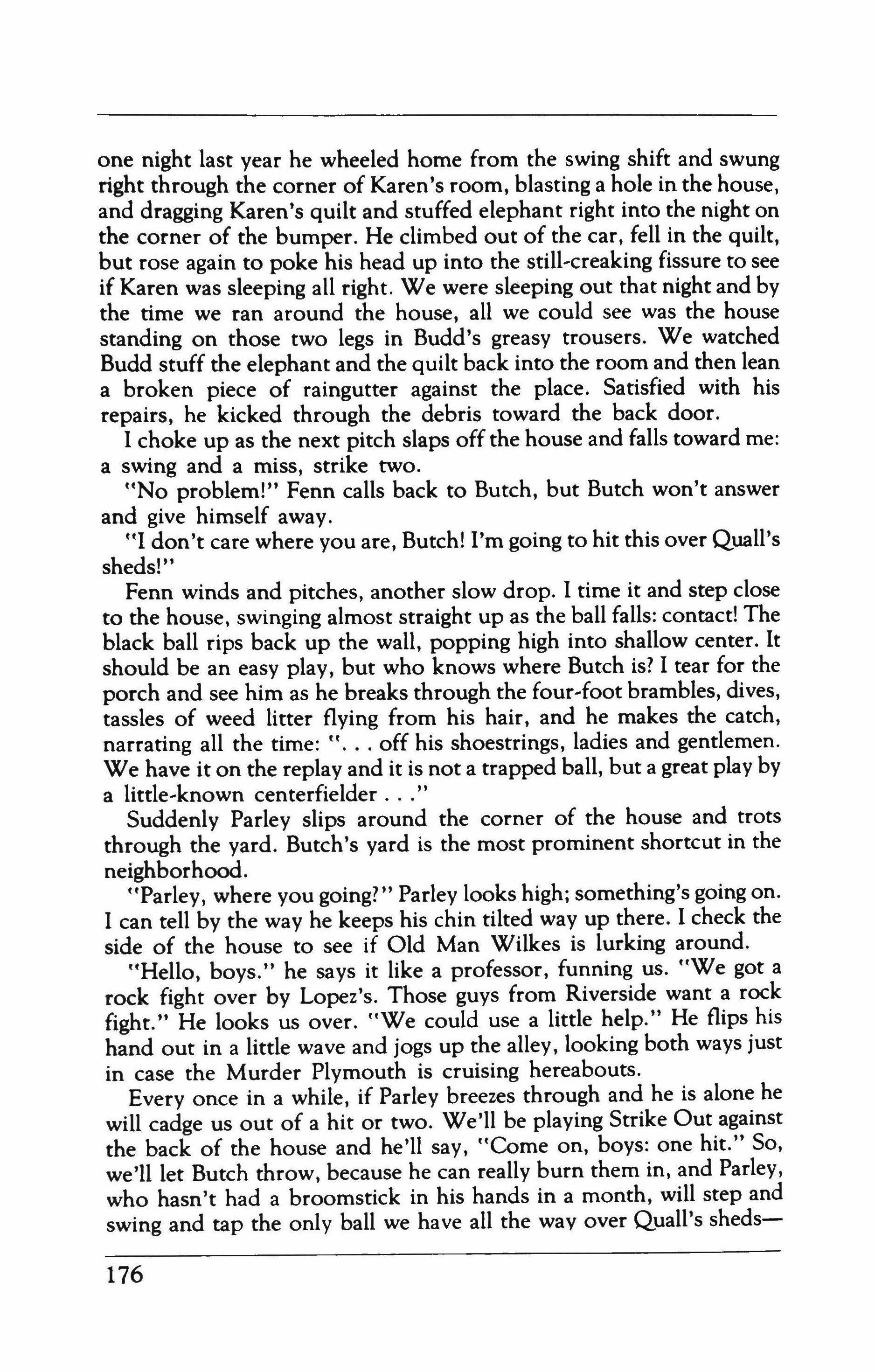
one night last year he wheeled home from the swing shift and swung right through the corner of Karen's room, blasting a hole in the house, and dragging Karen's quilt and stuffed elephant right into the night on the corner of the bumper. He climbed out of the car, fell in the quilt, but rose again to poke his head up into the still-creaking fissure to see if Karen was sleeping all right. We were sleeping out that night and by the time we ran around the house, all we could see was the house standing on those two legs in Budd's greasy trousers. We watched Budd stuff the elephant and the quilt back into the room and then lean a broken piece of raingutter against the place. Satisfied with his repairs, he kicked through the debris toward the back door.
I choke up as the next pitch slaps off the house and falls toward me: a swing and a miss, strike two.
"No problem!" Fenn calls back to Butch, but Butch won't answer and give himself away.
"I don't care where you are, Butch! I'm going to hit this over Quall's sheds!"
Fenn winds and pitches, another slow drop. I time it and step close to the house, swinging almost straight up as the ball falls: contact! The black ball rips back up the wall, popping high into shallow center. It should be an easy play, but who knows where Butch is? I tear for the porch and see him as he breaks through the four,foot brambles, dives, tassles of weed litter flying from his hair, and he makes the catch, narrating all the time: ft off his shoestrings, ladies and gentlemen. We have it on the replay and it is not a trapped ball, but a great play by a little-known centerfielder
Suddenly Parley slips around the corner of the house and trots through the yard. Butch's yard is the most prominent shortcut in the neighborhood.
"Parley, where you going?" Parley looks high; something's going on. I can tell by the way he keeps his chin tilted way up there. I check the side of the house to see if Old Man Wilkes is lurking around.
"Hello, boys." he says it like a professor, funning us. "We got a rock fight over by Lopez's. Those guys from Riverside want a rock fight." He looks us over. "We could use a little help." He flips his hand out in a little wave and jogs up the alley, looking both ways just in case the Murder Plymouth is cruising hereabouts. Every once in a while, if Parley breezes through and he is alone he will cadge us out of a hit or two. We'll be playing Strike Out against the back of the house and he'll say, "Come on, boys: one hit." So, we'll let Butch throw, because he can really burn them in, and Parley, who hasn't had a broomstick in his hands in a month, will step and swing and tap the only ball we have all the way over Quall's sheds-
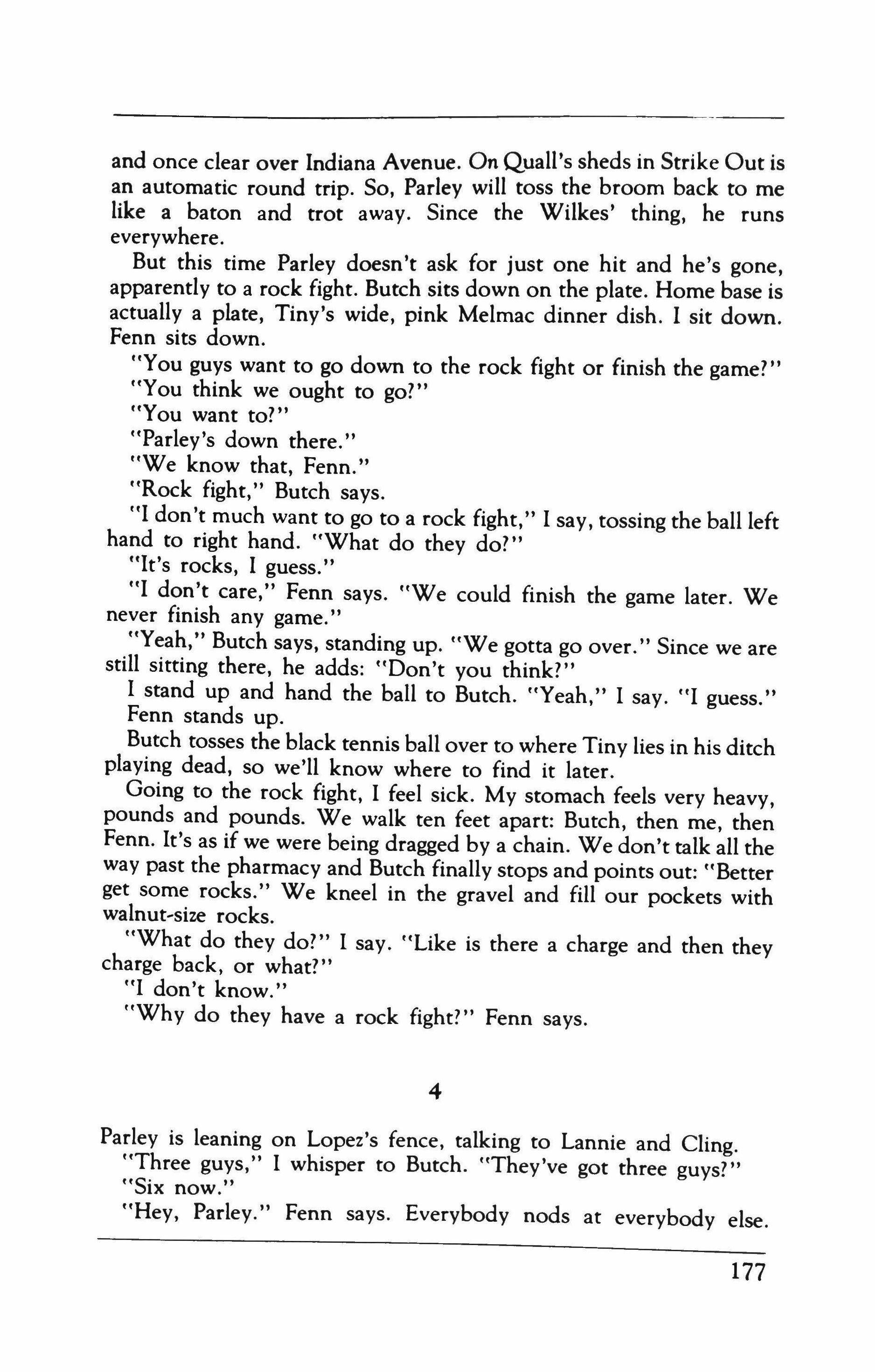
and once clear over Indiana Avenue. On Quall's sheds in Strike Out is an automatic round trip. So, Parley will toss the broom back to me like a baton and trot away. Since the Wilkes' thing, he runs everywhere.
But this time Parley doesn't ask for just one hit and he's gone, apparently to a rock fight. Butch sits down on the plate. Home base is actually a plate, Tiny's wide, pink Melmac dinner dish. I sit down. Fenn sits down.
"You guys want to go down to the rock fight or finish the game?"
ttyou think we ought to go?"
"You want to?"
"Parley's down there."
"We know that, Fenn."
"Rock fight," Butch says.
"I don't much want to go to a rock fight," I say, tossing the ball left hand to right hand. "What do they do?"
"It's rocks, I guess."
"I don't care," Fenn says. "We could finish the game later. We never finish any game."
"Yeah," Butch says, standing up. "We gotta go over." Since we are still sitting there, he adds: "Don't you think?"
I stand up and hand the ball to Butch. "Yeah," I say. "I guess." Fenn stands up.
Butch tosses the black tennis ball over to where Tiny lies in his ditch playing dead, so we'll know where to find it later.
Going to the rock fight, I feel sick. My stomach feels very heavy, pounds and pounds. We walk ten feet apart: Butch, then me, then Fenn. It's as if we were being dragged by a chain. We don't talk all the way past the pharmacy and Butch finally stops and points out: "Better get some rocks." We kneel in the gravel and fill our pockets with walnut-size rocks.
"What do they do?" I say. "Like is there a charge and then they charge back, or what?"
"I don't know."
"Why do they have a rock fight?" Fenn says.
4
Parley is leaning on Lopez's fence, talking to Lannie and Cling. "Three guys," I whisper to Butch. "They've got three guys?" "Six now."
"Hey, Parley." Fenn says. Everybody nods at everybody else.

Parley's chin is still way out there. Then we don't know what to do: there's no more room on the fence. Finally we sit in the ditch bank. The clump of rocks in my pocket gouges at my leg; this is so obviously a mistake.
"Hey, Lannie. Hey, Cling," I say. Cling is dangerous; he barks at cars. No one knows where he lives. You never see him on the same bike. He's got a tattoo on his neck, the left side. It's just a circle, but every time I see it I think of a bolt and just how his head is fastened on. I'm scared of Cling. He's always looking at my clothes.
Lannie comes over. He falls on the grass. A slash of black hair falls across his eyes. He and Cling are the only guys we know who smoke. "You guys ready?"
Butch says: "Sure." I shrug a who knows, which means: not really. Lannie sharpens the hot cone of his cigarette on a blade of grass, and offers: "Throw low, that's all you gotta do." His head swivels freely. Lannie speaks from way back in his throat. "Get it to skip off the road." He leans back on an elbow and gurgles a low laugh: "Throw low. Bother them."
For the first time in a long time, first time this summer, I'm sick. My throat is closed and I cannot swallow. I sit stock-still, though I am slowly turning inside out in a very sickening way. Parley leans against the fence like a young cowboy, lean and loose, ready to rock-fight, Then we hear the call. It's the tall kid named Chambers, and he's calling from the corner of Tabish's alley. He wants to talk to Parley. Parley pushes himself up off the fence, lazily, and takes those long strides out over the street, into the field, which is no man's land, to the mouth of the alley.
"They don't got nobody," Cling grunts. But I can see a number of shirts behind Chambers. Eight, nine, ten. Parley walks right up to all of them, straight up, and talks to Chambers. From here I can see his hands in his back pockets. Then I see him point back at us and draw a line with his hand between the two groups.
"What's going on?" Fenn says, peering in the general direction of the field. Fenn does things in the general direction without his glasses; that's why he's really no threat in Cup or Wall.
"Nothing yet, except that big rock sailing right at your head," Butch says.
"Is it started? Are they really gonna have it?"
I stand up, placing my hand over the bulging rocks in my pocket. I don't want any of the other gang to see them and consider me dangerous, or even vaguely hostile. I stand on one leg, hoping I can be interpreted-from their distance-as being simply some dumb guy who came over to watch. I know if there weren't six of us, there would be no fight; we should never have come.

What really makes me ache is the way Parley lifts his chin and smiles at Chambers before he turns and walks slowly across the field and back across the road to us.
"Yeah?" Lannie asks.
Parley smiles. HIt's just Chambers and some assholes from Riverside.
"Yeahl
"They'll stay in the field. We'll stay on the road. That's it." Lannie salutes Parley with a jagged piece of quartzite.
"How many guys they got?" Butch asks Parley. "A few."
Chambers disappears and then dances out of the alley ahead of the pack of at least a dozen kids. I can't count, I'm so sick. They spread and mill about the field.
"Let's go," Parley says. "Throw some rocks."
I can't move. I've never been in a fight. I've never even heard of a rock fight. Butch and Fenn stand and move up onto the old road where Cling and Lannie hunker like apes; their hands dangle full of rocks, waiting for the signal. I hear Fenn say to Butch, HO.K., O.K.: no problem. I can see them. I can see where they are."
Behind me a block and a half is my own home. I could be sitting in the old swing set, dragging my shoes in the dirt. I should really spend more time at home. My feet haven't moved, and then I'm surprised as I shift my weight to see my shoes move forward, out onto the street. I feel exactly like someone else, someone I don't know and don't like very much. When I move into our line beside Fenn, all I hear myself say is: "Fenn and Butch-you bastards." Just as I realize there is a rock in my throwing hand, I see that my other hand is full too.
"Do we get a couple of throws to warm up?" Butch says and Parley laughs. Over our heads Old Man Wilkes' garage drifts as a gray rash of smoke; the whole world is doom.
Chambers suddenly runs out to the edge of the field, thirty feet from Parley, and he stands there dancing like a boxer. The rock in his right hand is the size of a coffee cup.
"Parley!"
"Yeah, Chambers."
"You're a fucking asshole and you smell like shit!"
"Is that it?" Parley sounds bored.
"You're a pussy, Fuckhead!"
Parley stands, one hand in a pocket, his feet spread, his head cocked over. He looks at Chambers with nothing but flat curiosity.
"Well?" Chambers yells. "What do you think of that, Parley Fuckhead? "
"I hate to kill you for that trite shit."

This sets Chambers off and he runs clear back to Tabish's alley, spitting and tearing at the shirts of the members of his gang. I can feel a hard raining of rocks at any minute. Then Chambers stops, he thumbs his jeans back up around his waist, and he walks back toward us. He is really built; clearly he is strong enough to kill us all. At the edge of the road he stops and says quietly to Parley: "Carol Wilkes eats it raw."
I don't see Parley throw. I suspect it is his sidearm sling which has no visible wind up or backswing; it just whips forward with a swift side snap of the elbow and then the wrist: flick. I do see the flat rock he hurls rise and take Chambers in the neck, just below the jawbone and rip his head back in a wicked snap so that he staggers and then steps out nowhere, into air, and falls on his face like a bag of rocks.
No one moves for a minute, not even Chambers. Then a howl rises from him, cracking as he turns and begins to roll in pain. The little gang folds from the back, running back into the alley as Cling throws boulders at them as fast as he can. Butch, Fenn, and I have not really moved.
uWhere'd they go?" Fenn says. Butch looks behind him at me with a full, frank look of relief on his face. Their gang has left Chambers on his back, groaning at the sky. I see Parley go to him and bend over. I do not want to see Chambers or his new wound. He couldn't even really swear very well.
On the way back to Butch's, we explain what happened to Fenn. He nods excitedly, as we're all high, high from having our lives spared, our bodies still intact. I still have a pocket full of lethal rocks. I'm considering taking them home as souvenirs, putting them on my bookcase. Fenn keeps repeating: "Those suckers sure can run, right?" Then he laughs and laughs.
We're flying when we cruise into the back lot at Butch's house. My ears are roaring and I'm shot with that high happiness in my lungs, which means I better not laugh because I could cry. We're all pushing and hauling each other around and I have the feeling that if we knew a song, we'd sing. Butch pushes Fenn into a hole, and then we find the ball where we left it, untouched by Tiny, but it is just too exciting to play Wall or anything else. We're just not on the ground.
Butch throws a couple of rocks over the Qualls' roof, three, four, five, until we hear glass break, and we dive into the large foxhole and hide, muffling our racing laughter in the weeds. We've gone crazy.
5
When the sun falls below Qualls' sheds, it is time for me to go home and check in and have dinner. If I'm lucky, when I cross Concord

Avenue, my father will be rounding the park in his green Chevrolet pickup and he will slow, so I can step onto the bumper plate like a fireman. I love the two-block ride, the wind taking my hair, my arms stretched straight before me, my hands gripping the tailgate. Mr. Wilkes is always out at this time, working his fire, and my father always honks once and waves.
"Always wave at Mr. Wilkes," he tells me. "He's one of our neighbors.
"He never waves back."
"That doesn't matter. He knows what a wave is and he appreciates it."
So, I, too, lift a hand toward Mr. Wilkes, who turns his head up a moment and stirs his rake again.
"Poor old coot," my father will say over dinner. "He could haul it all to the dump in one trip. I should probably offer to help him."
But, as I lift my fork, I know better. Mr. Wilkes has a pickup like everybody else in our neighborhood. It's a pale International. Mr. Wilkes doesn't want to haul his garage away to the dump. He wants to be outside, burning it so that the smoke can rise through this neighborhood like a warning: DON'T TOUCH MY DAUGHTER. And: I'M GOING TO KILL YOUNG PARLEY. He rakes and rakes in the smoldering dusk.
At dinner in my house, we are asked to account for our day.
"Played ball," I say.
"All day?"
"Pretty much."
"Where at?"
"Down at Butch's."
"Did they ever fix that hole in Karen's room?"
"Not yet." I am not surprised anymore when my parents read my mind. I expect a rock fight question at any minute.
"Wouldn't take much to fix that," my father says, and I can see he's already thinking about the whole thing. It comes up once a week: the neighborhood. "There's another car dumped in front ofHarper's," he says, looking out the window. Without moving his head he can see three abandoned vehicles: two in the vacant lot and one behind Wilkes'. That one had been in the garage, which is now burning.
My father pushes his chair away from the table. Then he frowns and clucks disappointment at the world outside the window. As he rises, my father smiles and leans forward to twist Bob's ear lightly as a joke. Bobby is stirring his ice cream into a creamy paste; it's his favorite way to eat it. My father stands behind me a moment, pretending my head is a leaning post. His hand is as big as a baseball mitt. "He could haul all that mess away with one load." He pushes me playfully. Outside, the
smoke begins to merge with the first purple skies of the great, neverending summer twilight.

I see Fenn straggle toward my house through the vacant lot. He is walking backwards, dragging his tattered sleeping bag, watching Mr. Wilkes. I don't know how Fenn can be here already; he must never get any dinner. It is a rumor that he can sleep out so much because his mother doesn't want him at home. Mornings he sure eats bowls and bowls ofcereal. Fenn eats dinner with us too sometimes, but my father disapproves, not of sharing what we have with him, but of not giving Fenn's family a chance to share dinner with him.
Fenn doesn't fall down, and he crosses into our yard as I step out to meet him.
"Old Man Wilkes is a long-term weirdo." Fenn is still looking over there. I know he can't see the dark figure of Mr. Wilkes; he must just be smelling the smoke. "If I grow up and tear my garage down and burn it day by day, I hope somebody puts me away."
"What about chasing kids with your car, trying to run them down?"
"Yeah," Fenn turns to me at last. "Well, that part might not be too bad!" Fenn gathers his sleeping bag up from where he's dragged it on the ground and leads me into the backyard, where he throws it against the fence. I like that about him: he may be nearsighted, but he still acts like king of the gypsies. He sits down and opens his statistics notebook.
"Look at this," he says. He's made a three-color crayon chart of all of his hitters in Wall Ball. I sit down with him to go over his batting averages and wait for Butch.
Fenn and I are on our backs, floating in the near dark, when Butch sneaks across the field and rakes the fence with a stick so hard that Fenn screams and throws his hands across his face to protect himself from the crashing Plymouth.
Butch wears a high grin, an expression he always has after slipping away from home at night. Budd, Butch's father, expects Butch to stay home and, being the oldest, protect the property, such as it is. Never mind that Budd himself has ruined three vehicles, one by ramming the corner of his house, nor that he has ruined the yard by ditching three vehicles in it. Nor that there's no back door, bathroom window, domestic shrubbery, or anything. But Butch is supposed to protect it. I guess somebody could steal Tiny, thinking that he was a rare breed.

No matter-as soon as Barbara calls him, Butch answers, goes down the hall into Karen's room, pounds her once, and slips out the hole where his father crashed into the house. He dives out head first, squirms to his feet, jumps on his waiting bike-which has two different wheels, one the size of a hubcap, the other actually a regular tire-and he careens down to my house.
Butch grins; he's already thought of his challenge in Initials. "M.M." He unfurls his bag and flops down. "Go ahead: M.M."
"Ice cream," Fenn says. "Mickey Mantle."
"Don't be stupid."
"Mickey Mouse."
"Marilyn Monroe."
"Now, we hope that you guys will dig just a bit deeper."
I'm thinking about Chambers. The rock fight is over, but I know I'm going to see Chambers again. I see him every couple ofweeks. He's going to remember me, that I was standing on that street, that I saw him take a rock in the throat; he's going to hate me. It is exhilarating in a sad way, knowing that the next time you'll see some kid, he's going to throw a rock at your head. But that's the kind of neighborhood it is, and that is the kind of night it is: from time to time tonight, as we talk in the promising dark, a nice danger touches my heart again.
Butch closes his mouth, twists one corner up and one corner down, and finally says only: "M.M."
"Yeah, yeah," Fenn says, "We'll get it."
At full dark, my father comes out of the house and tells us: now settle down, boys. He leans on the fence and talks to my friends. As I listen, I realize he is the only parent in the whole neighborhood who talks to the kids. He guesses Mitch Miller when he hears of the game, and he stands to go in, looking over our heads at the dark world. Sometimes I wonder what he is thinking, but he just says, "Now settle down, boys," and goes in the house.
The nights we sleep out at Butch's no one comes out to see us, and we sleep back, way back past the small ditch in the weeds. Early in the summer I can barely stand to sleep down there, the smell of the weeds is so powerful it seems dangerous. When we do sleep out there, all night the house rumbles, rocking with light and a variety of bangings. They should really get a back door. One night as we lay suffocating in the underbrush, I heard a crash and rose to my elbows to see a man fall out of the back of the house followed closely by a flying shovel and then Budd. The man ran around and around the old Studebaker racked on blocks in the driveway while Budd tried to put him out with the flat side of the shovel, banging and banging it off the old car. Inside the house, Barbara, Butch's mother, could be heard singing along with
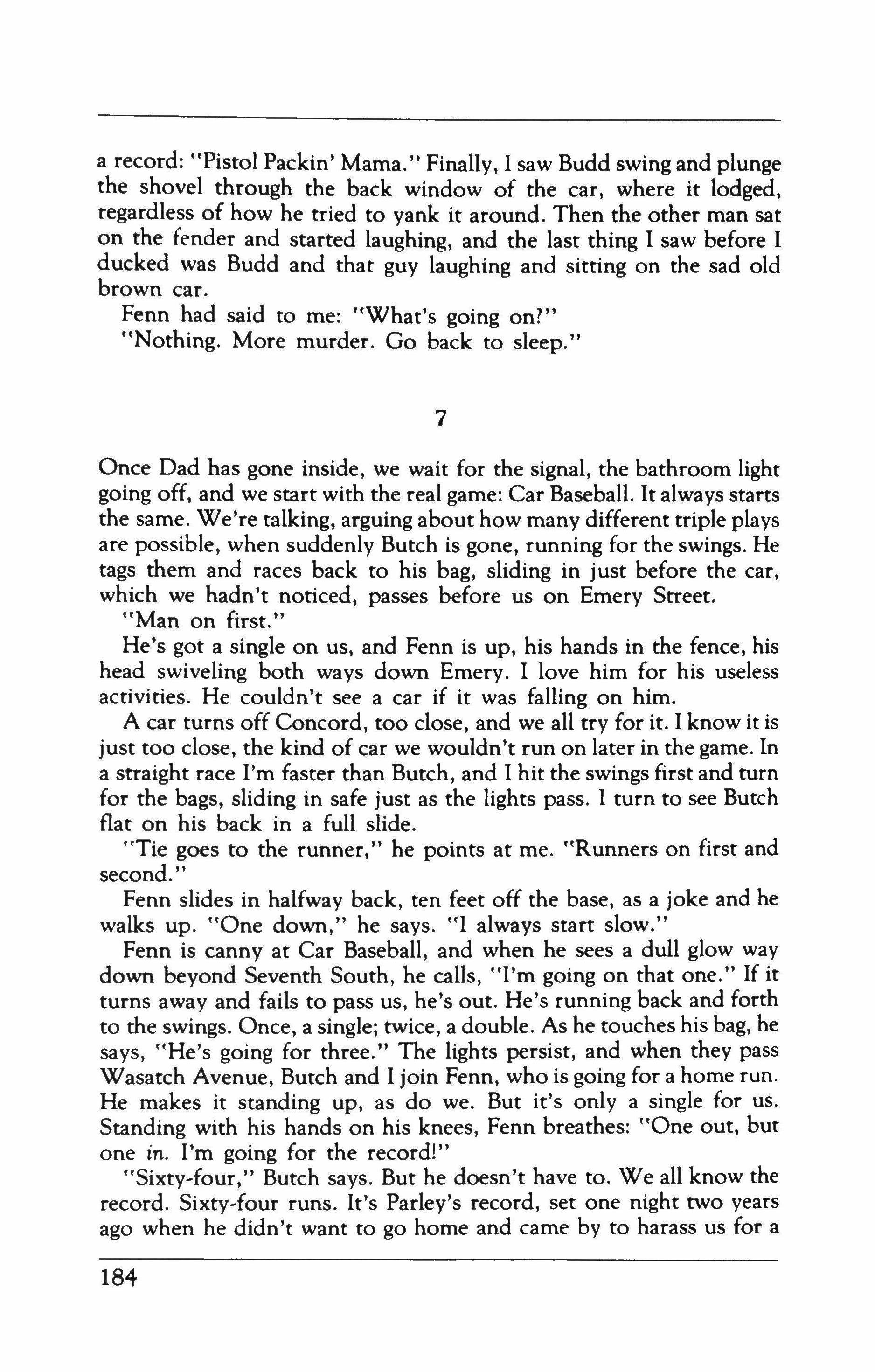
a record: "Pistol Packin' Mama." Finally, I saw Budd swing and plunge the shovel through the back window of the car, where it lodged, regardless of how he tried to yank it around. Then the other man sat on the fender and started laughing, and the last thing I saw before I ducked was Budd and that guy laughing and sitting on the sad old brown car.
Fenn had said to me: "What's going on?"
"Nothing. More murder. Go back to sleep."
7
Once Dad has gone inside, we wait for the signal, the bathroom light going off, and we start with the real game: Car Baseball. It always starts the same. We're talking, arguing about how many different triple plays are possible, when suddenly Butch is gone, running for the swings. He tags them and races back to his bag, sliding in just before the car, which we hadn't noticed, passes before us on Emery Street.
"Man on first."
He's got a single on us, and Fenn is up, his hands in the fence, his head swiveling both ways down Emery. I love him for his useless activities. He couldn't see a car if it was falling on him.
A car turns off Concord, too close, and we all try for it. I know it is just too close, the kind of car we wouldn't run on later in the game. In a straight race I'm faster than Butch, and I hit the swings first and turn for the bags, sliding in safe just as the lights pass. I turn to see Butch flat on his back in a full slide.
"Tie goes to the runner," he points at me. "Runners on first and second."
Fenn slides in halfway back, ten feet off the base, as a joke and he walks up. "One down," he says. "I always start slow."
Fenn is canny at Car Baseball, and when he sees a dull glow way down beyond Seventh South, he calls, "I'm going on that one." If it turns away and fails to pass us, he's out. He's running back and forth to the swings. Once, a single; twice, a double. As he touches his bag, he says, "He's going for three." The lights persist, and when they pass Wasatch Avenue, Butch and I join Fenn, who is going for a home run. He makes it standing up, as do we. But it's only a single for us. Standing with his hands on his knees, Fenn breathes: "One out, but one in. I'm going for the record!"
"Sixty-four," Butch says. But he doesn't have to. We all know the record. Sixty-four runs. It's Parley's record, set one night two years ago when he didn't want to go home and came by to harass us for a
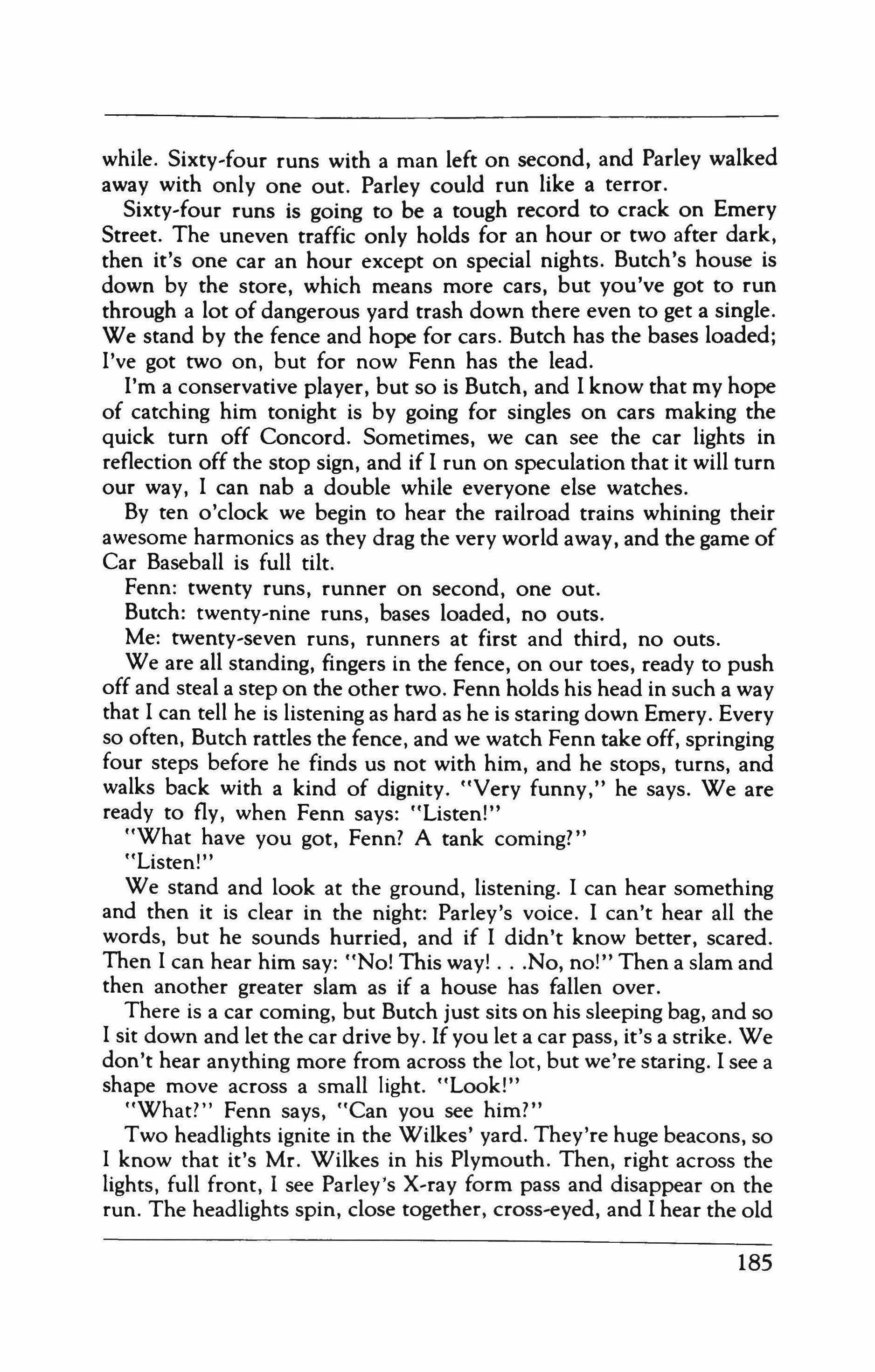
while. Sixtv-four runs with a man left on second, and Parley walked away with only one out. Parley could run like a terror.
Sixty-four runs is going to be a tough record to crack on Emery Street. The uneven traffic only holds for an hour or two after dark, then it's one car an hour except on special nights. Butch's house is down by the store, which means more cars, but you've got to run through a lot of dangerous yard trash down there even to get a single. We stand by the fence and hope for cars. Butch has the bases loaded; I've got two on, but for now Fenn has the lead.
I'm a conservative player, but so is Butch, and I know that my hope of catching him tonight is by going for singles on cars making the quick turn off Concord. Sometimes, we can see the car lights in reflection off the stop sign, and if I run on speculation that it will turn our way, I can nab a double while everyone else watches.
By ten o'clock we begin to hear the railroad trains whining their awesome harmonics as they drag the very world away, and the game of Car Baseball is full tilt.
Fenn: twenty runs, runner on second, one out.
Butch: twenty-nine runs, bases loaded, no outs.
Me: twenty-seven runs, runners at first and third, no outs.
We are all standing, fingers in the fence, on our toes, ready to push off and steal a step on the other two. Fenn holds his head in such a way that I can tell he is listening as hard as he is staring down Emery. Every so often, Butch rattles the fence, and we watch Fenn take off, springing four steps before he finds us not with him, and he stops, turns, and walks back with a kind of dignity. "Very funny," he says. We are ready to fly, when Fenn says: "Listen!"
"What have you got, Fenn? A tank coming?"
"Listen!"
We stand and look at the ground, listening. I can hear something and then it is clear in the night: Parley's voice. I can't hear all the words, but he sounds hurried, and if I didn't know better, scared. Then I can hear him say: "No! This way! No, no!" Then a slam and then another greater slam as if a house has fallen over.
There is a car coming, but Butch just sits on his sleeping bag, and so I sit down and let the car drive by. If you let a car pass, it's a strike. We don't hear anything more from across the lot, but we're staring. I see a shape move across a small light. "Look!"
"What?" Fenn says, "Can you see him?"
Two headlights ignite in the Wilkes' yard. They're huge beacons, so I know that it's Mr. Wilkes in his Plymouth. Then, right across the lights, full front, I see Parley's Xvrav form pass and disappear on the run. The headlights spin, close together, cross-eyed, and I hear the old

growl of that terrible car as it swings out onto the street. Another car runs right around the Concord corner and in front of us before we move. "Strike two." Fenn says. "Right?"
He gets up. Butch and I do too, but Butch says, "Something's going on." We both know it is not right that Old Man Wilkes would be up so late. Suddenly, in fact, everything is beginning to seem late.
"He's going to kill Parley," Fenn says. It sounds pretty bad the way he says it: information. "But I'm going on Old Man Wilkes. This is going to put me back in the ball game."
It almost does. We watch the Plymouth clear across the field. It's swinging through the signs, cruising for murder, and Fenn only has time to nab a double-and he has to hit the dirt with that. Butch and I duck as the old Plymouth sweeps by; we take the strike.
"Strike three, boys," Fenn says. "It's one out all around. How can you guys strike out like that?"
Butch is biting his lower lip.
"There's nothing we can do, Butch," I say. "Parley's O.K.; he can run."
Butch stands with his fists in the fence. He turns to me: "Twentynine runs, bases loaded, one out." And he's gone, running for the swings on a car I finally see, coming down from Indiana Avenue. He takes a double to my single, and we all settle to the game.
Butch takes off his shoes and his shirt, and poses as a sprinter, one fingertip touching the fence. The cars are backed up at the Seventh South stop sign; we'll be running for a long time tonight. The air is bright, and there's a whole run of stars over our heads that will only move much later and then as one big wheel. The Milky Way is so thick it looks like smoke. 8
At night, on a fine strange night after a day of baseball and a rock fight, on a night so strange it is like night on another planet, with your shoes off running in the new dew, with bare feet at an hour that is so far beyond late that it is no time, on a night like that a person can run a long time. It is no trouble. The car lights swing onto your street, and you fly around for a while, back and forth, doubles, triples, home runs, sliding in safely each time. The bright night air will sparkle in your throat when you slide on your back, and you won't remember standing again, being ready, and launching at the next lights, trying and making a double into a triple, sliding again, your bare back against the grass where that electric itch will grow like burning wings as you fly into the next run.
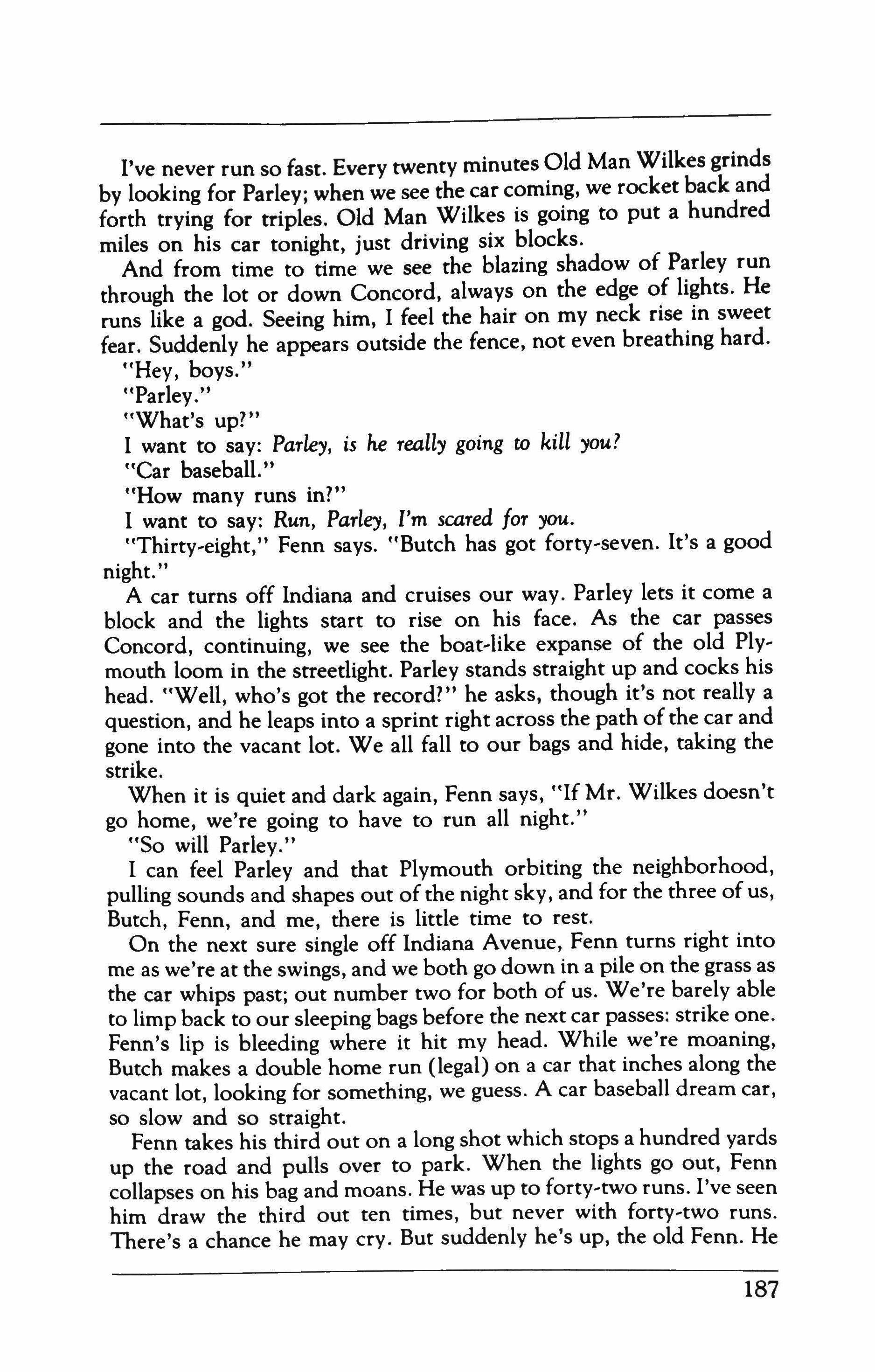
I've never run so fast. Every twenty minutes Old Man Wilkes grinds by looking for Parley; when we see the car coming, we rocket back and forth trying for triples. Old Man Wilkes is going to put a hundred miles on his car tonight, just driving six blocks.
And from time to time we see the blazing shadow of Parley run through the lot or down Concord, always on the edge of lights. He runs like a god. Seeing him, I feel the hair on my neck rise in sweet fear. Suddenly he appears outside the fence, not even breathing hard.
"Hey, boys."
"Parley. "
"What's up?"
I want to say: Parley, is he really going to kill you?
"Car baseball."
"How many runs in?"
I want to say: Run, Parley, I'm scared for you.
"Thirty-eight," Fenn says. "Butch has got forty-seven. It's a good night."
A car turns off Indiana and cruises our way. Parley lets it come a block and the lights start to rise on his face. As the car passes Concord, continuing, we see the boat'like expanse of the old Ply, mouth loom in the streetlight. Parley stands straight up and cocks his head. "Well, who's got the record?" he asks, though it's not really a question, and he leaps into a sprint right across the path of the car and gone into the vacant lot. We all fall to our bags and hide, taking the strike.
When it is quiet and dark again, Fenn says, "If Mr. Wilkes doesn't go home, we're going to have to run all night."
"So will Parley."
I can feel Parley and that Plymouth orbiting the neighborhood, pulling sounds and shapes out of the night sky, and for the three of us, Butch, Fenn, and me, there is little time to rest.
On the next sure single off Indiana Avenue, Fenn turns right into me as we're at the swings, and we both go down in a pile on the grass as the car whips past; out number two for both of us. We're barely able to limp back to our sleeping bags before the next car passes: strike one. Fenn's lip is bleeding where it hit my head. While we're moaning, Butch makes a double home run (legal) on a car that inches along the vacant lot, looking for something, we guess. A car baseball dream car, so slow and so straight.
Fenn takes his third out on a long shot which stops a hundred yards up the road and pulls over to park. When the lights go out, Fenn collapses on his bag and moans. He was up to forty-two runs. I've seen him draw the third out ten times, but never with forty-two runs. There's a chance he may cry. But suddenly he's up, the old Fenn. He
says to us: "No outs, no runs." He's starting over. He runs with us, as wired as before, for five more runs, when suddenly that parked car jumps to life. The lights flash and the car springs past us before we can even take a step. Fenn is saved! An out becomes a double for him. He's back in it at forty-seven runs, man on second, and he's talking all the time, tighter and higher than I've ever seen him.
"That is total skill," he's laughing. "Take the chance, have the faith.
"Yeah, you're a genius at this game," Butch says. "I wonder what makes some guy park with a date for four minutes." He shakes his head.
It is clearly later, stranger than we've ever played this game. I've sneaked in three singles when I caught Butch standing, but otherwise it's all neck-and-neck, He's two runs in the lead: fifty-five to fifty, three. My runners are at second and third.
As I stand ready, waiting for cars, I stare across the lot, past the dark hulks of the abandoned cars, hoping to see Mr. Wilkes pull into the yard and end tonight's rampage. We've all made twelve or fifteen runs off his car alone, but it is enough. We want him to go home now. I've run so much I'm dizzy. Sometimes one of us sits, taking two strikes before rising and nailing a single, then sitting again. Late, late into the night, there is a long, long period of no cars, and then a short period of cars all in a hurry, rounding the comers wide, racing away. And then the whole night changes and I realize I've never been up so late before in my life. The dark is thicker than it was, the few stars now fuzzy.

9
"What is that?" I hear later. "Butch, what is that?" I wake, knowing what it is: the acrid cinder smoke from Mr. Wilkes' garage fire. I roll over. Across the field, the fire is starting again. "Have there been any cars?"
"That guy has flipped right out."
"Naw, he's not even there. You know what time it is? That fire started by itself."
The sky has changed into something I've never seen before: not night, not day; too dark to see, too light not to try. And through everything: the heavy smell of smoke.
"Have there been any cars?"
"None."
"Are we still playing?"
But Butch and Fenn are gone, running on a station wagon, and I

follow them to a single. The three trails from our bags to the swings are distinct in the small strange gray light. After that, it picks up. We run on several people we know who are going to work. We run on the garbage truck, though it feels unfair, because we know where it's going, and it goes real slow.
Across the way, the fire swells into a yellow blossom as big as a milk truck. And in front of it, passing through from time to time is the wavering little silhouette of Mr. Wilkes. Outlines of the wrecks in the weed field are rising through the new light. And a general friction is rising in the air as well, the sound of traffic pressing around and through the neighborhood. The fire rips straight up, and for the first time ever we can hear it roaring over there.
I'm on my hands and knees, staring. Fenn has collapsed against the fence, his fingers in the links, staring. Butch stands at the end of his bag, hands on his hips, eyes lost in the fire.
"How many runs?" I ask him.
"Sixty-three, man on second. Isn't that what you've got?"
"Yeah, but man on first."
There is a car coming up from Seventh. "You want to quit?"
"You?"
Fenn runs, returns standing for the single.
The car, the first with its lights out in the new day, passes us for a strike.
"A double and you've tied the record," Fenn says. "And I'm only six runs down. What a night!"
"I'll quit if you'll quit," I offer. "It's Parley's record."
Butch says, "Jesus, sixty-three runs."
"Man on second," Fenn adds.
"If he burns that whole damn garage tonight, he's going to be sorry." Butch says. "He won't have anything to burn tomorrow."
"It is tomorrow."
In the clear dawn, an empty bus rattles past, and we take the strike. We take on Quall's truck, strike two, and we flop out on our bags and take the third strike, Fenn's father's Buick, lying down.
My mouth tastes funny from being awake so long, but it is undeniably morning. We can see the ashen edge of the trees and the birds are going out of control. Mr. Wilkes' fire has shrunk and he has gone inside. There is no more garage to burn. The last of the smoke trails above us in tatters.
"What a night," Fenn repeats. "This night."
"We could get that ball before Tiny wakes up," I say.
"I could get another cup," Butch says. "Before Barbara gets up."
I smile: "Howard's on third with Slaughter at the plate. And he is one steady hitter."
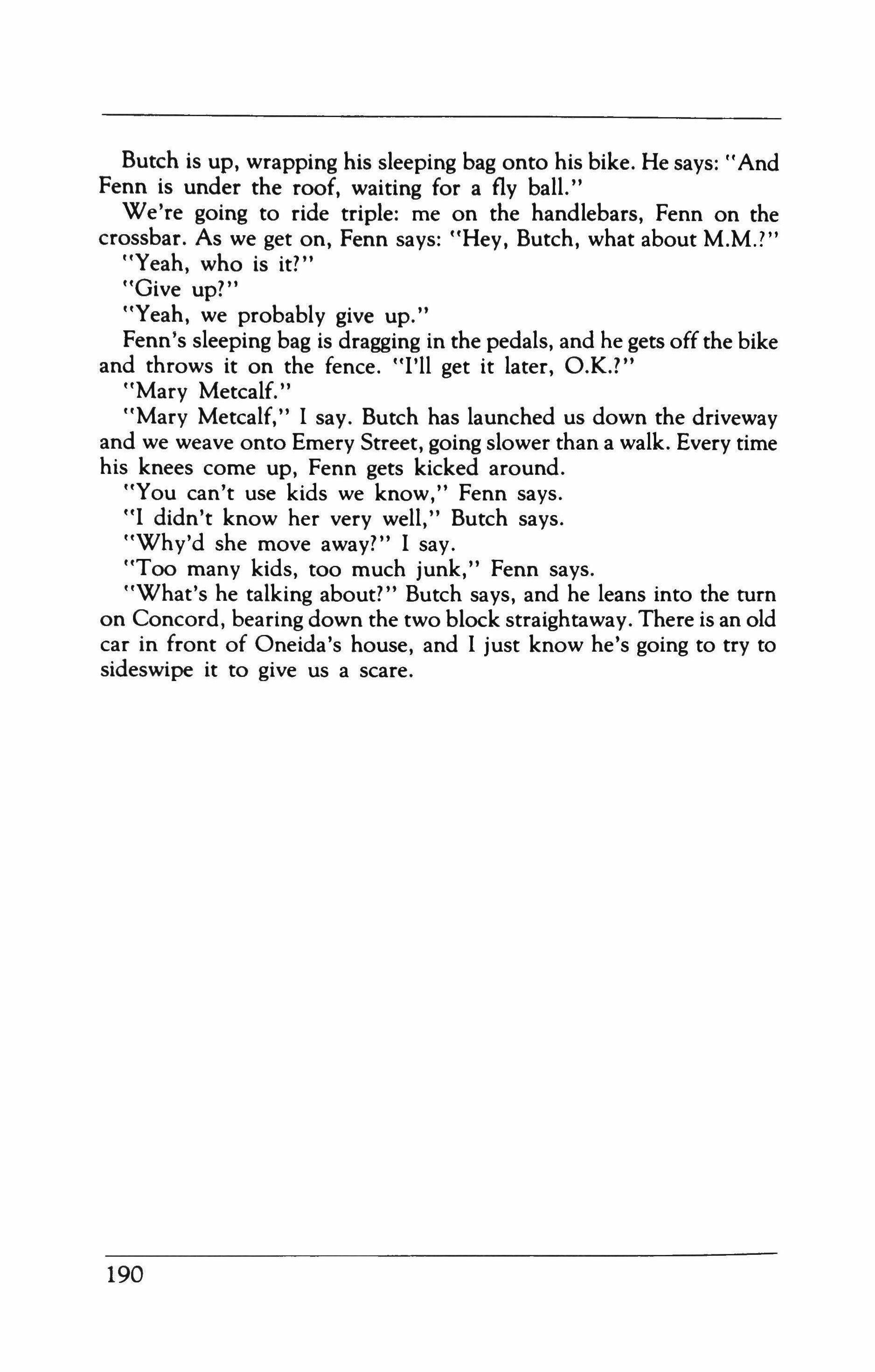
Butch is up, wrapping his sleeping bag onto his bike. He says: And Fenn is under the roof, waiting for a fly ball."
We're going to ride triple: me on the handlebars, Fenn on the crossbar. As we get on, Fenn says: "Hey, Butch, what about M.M.?"
"Yeah, who is it?"
"Give up?"
"Yeah, we probably give up."
Fenn's sleeping bag is dragging in the pedals, and he gets off the bike and throws it on the fence. "I'll get it later, O.K.?"
"Mary Metcalf."
"Mary Metcalf," I say. Butch has launched us down the driveway and we weave onto Emery Street, going slower than a walk. Every time his knees come up, Fenn gets kicked around.
"You can't use kids we know," Fenn says.
"I didn't know her very well," Butch says.
"Why'd she move away?" I say.
"Too many kids, too much junk," Fenn says.
"What's he talking about?" Butch says, and he leans into the turn on Concord, bearing down the two block straightaway. There is an old car in front of Oneida's house, and I just know he's going to try to sideswipe it to give us a scare.
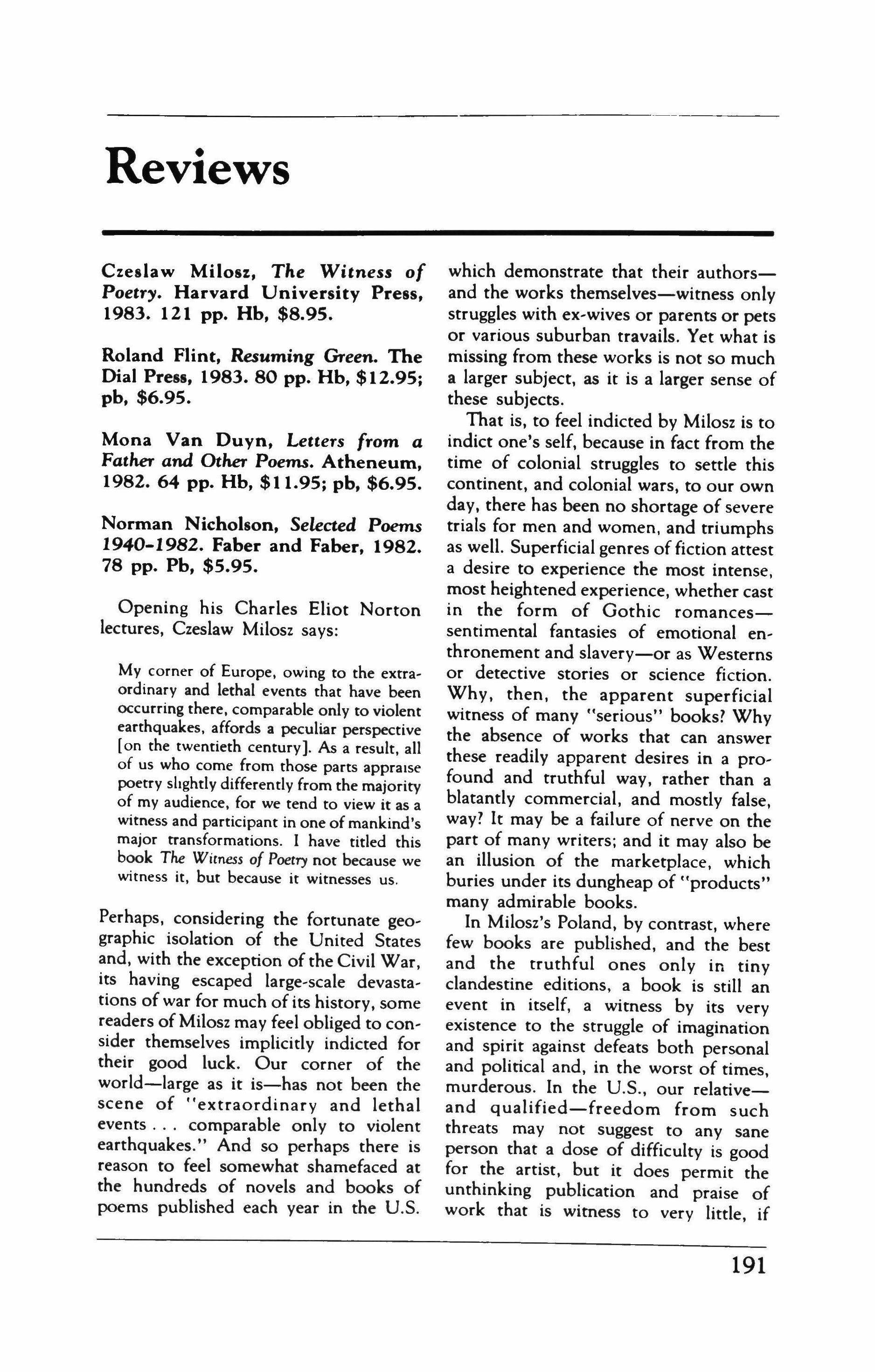
Czeslaw Mitose, The Witness of Poetry. Harvard University Press, 1983. 121 pp. Hb, $8.95.
Roland Flint, Resuming Green. The Dial Press, 1983.80 pp. Hb, $12.95; pb, $6.95.
Mona Van Duvn, Letters from a Father and Other Poems. Atheneum, 1982.64 pp. Hb, $11.95; pb, $6.95.
Norman Nicholson. Selected Poems 1940-1982. Faber and Faber. 1982. 78 pp. Pb. $5.95.
Opening his Charles Eliot Norton lectures, Czeslaw Milosz says:
My corner of Europe, owing to the extraordinary and lethal events that have been occurring there, comparable only to violent earthquakes. affords a peculiar perspective [on the twentieth centuryJ. As a result, all of us who come from those parts appraise poetry slightly differently from the majoriry of my audience, for we tend to view it as a witness and participant in one of mankind's major transformations. I have titled this book The Witness of Poetry not because we witness it, but because it witnesses us.
Perhaps, considering the fortunate geographic isolation of the United States and, with the exception of the Civil War, its having escaped large-scale devastations of war for much of its history, some readers of Milosz may feel obliged to consider themselves implicitly indicted for their good luck. Our corner of the world-large as it is-has not been the scene of "extraordinary and lethal events comparable only to violent earthquakes." And so perhaps there is reason to feel somewhat shamefaced at the hundreds of novels and books of poems published each year in the U.S.
which demonstrate that their authorsand the works themselves-witness only struggles with ex-wives or parents or pets or various suburban travails. Yet what is missing from these works is not so much a larger subject, as it is a larger sense of these subjects.
That is, to feel indicted by Milosz is to indict one's self, because in fact from the time of colonial struggles to settle this continent, and colonial wars, to our own day, there has been no shortage of severe trials for men and women, and triumphs as well. Superficial genres of fiction attest a desire to experience the most intense, most heightened experience, whether cast in the form of Gothic romancessentimental fantasies of emotional enthronement and slavery-or as Westerns or detective stories or science fiction. Why, then, the apparent superficial witness of many "serious" books? Why the absence of works that can answer these readily apparent desires in a profound and truthful way, rather than a blatantly commercial, and mostly false, way? It may be a failure of nerve on the part of many writers; and it may also be an illusion of the marketplace, which buries under its dungheap of "products" many admirable books.
In Milosz's Poland, by contrast, where few books are published, and the best and the truthful ones only in tiny clandestine editions, a book is still an event in itself, a witness by its very existence to the struggle of imagination and spirit against defeats both personal and political and, in the worst of times, murderous. In the U.S., our relativeand qualified-freedom from such threats may not suggest to any sane person that a dose of difficulty is good for the artist, but it does permit the unthinking publication and praise of work that is witness to very little, if
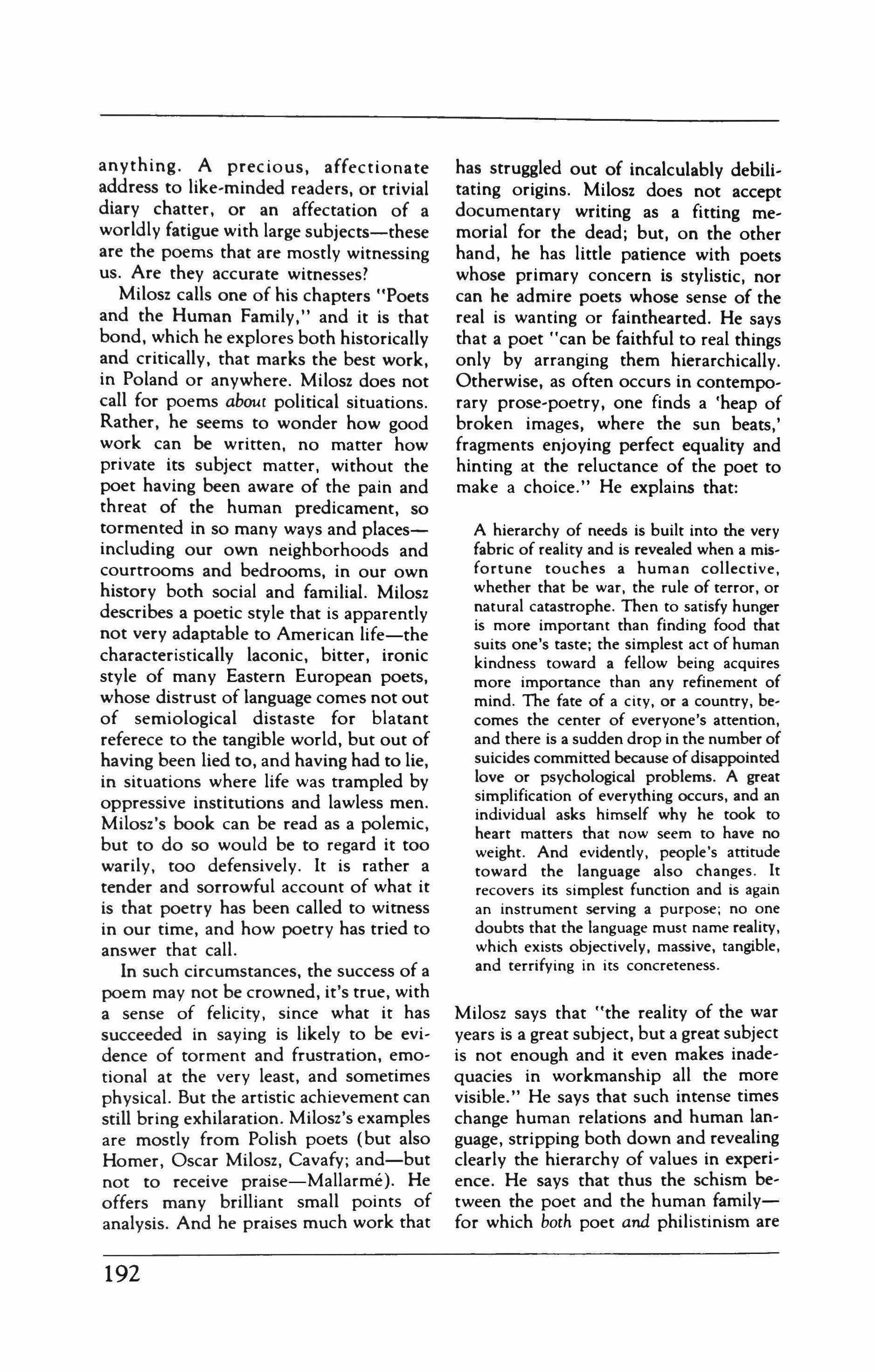
anything. A precious, affectionate address to like-minded readers, or trivial diary chatter, or an affectation of a worldly fatigue with large subjects-these are the poems that are mostly witnessing us. Are they accurate witnesses?
Milosz calls one of his chapters "Poets and the Human Family," and it is that bond, which he explores both historically and critically, that marks the best work, in Poland or anywhere. Milosz does not call for poems about political situations. Rather, he seems to wonder how good work can be written, no matter how private its subject matter, without the poet having been aware of the pain and threat of the human predicament, so tormented in so many ways and placesincluding our own neighborhoods and courtrooms and bedrooms, in our own history both social and familial. Milosz describes a poetic style that is apparently not very adaptable to American life-the characteristically laconic, bitter, ironic style of many Eastern European poets, whose distrust of language comes not out of semiological distaste for blatant referece to the tangible world, but out of having been lied to, and having had to lie, in situations where life was trampled by oppressive institutions and lawless men. Milosz's book can be read as a polemic, but to do so would be to regard it too warily, too defensively. It is rather a tender and sorrowful account of what it is that poetry has been called to witness in our time, and how poetry has tried to answer that call.
In such circumstances, the success of a poem may not be crowned, it's true, with a sense of felicity, since what it has succeeded in saying is likely to be evidence of torment and frustration, emotional at the very least, and sometimes physical. But the artistic achievement can still bring exhilaration. Milosz's examples are mostly from Polish poets (but also Homer, Oscar Milosz, Cavafv: and-but not to receive praise-e-Mallarrne). He offers many brilliant small points of analysis. And he praises much work that
has struggled out of incalculably debilitating origins. Milosz does not accept documentary writing as a fitting memorial for the dead; but, on the other hand, he has little patience with poets whose primary concern is stylistic, nor can he admire poets whose sense of the real is wanting or fainthearted. He says that a poet "can be faithful to real things only by arranging them hierarchically. Otherwise, as often occurs in contemporary prose-poetry, one finds a 'heap of broken images, where the sun beats,' fragments enjoying perfect equality and hinting at the reluctance of the poet to make a choice." He explains that:
A hierarchy of needs is built into the very fabric of reality and is revealed when a misfortune touches a human collective, whether that be war, the rule of terror, or natural catastrophe. Then to satisfy hunger is more important than finding food that suits one's taste; the simplest act of human kindness toward a fellow being acquires more importance than any refinement of mind. The fate of a city, or a country, becomes the center of everyone's attention, and there is a sudden drop in the number of suicides committed because ofdisappointed love or psychological problems. A great simplification of everything occurs, and an individual asks himself why he took to heart matters that now seem to have no weight. And evidentlv, people's attitude toward the language also changes. It recovers its simplest function and is again an instrument serving a purpose; no one doubts that the language must name reality, which exists objectively, massive, tangible, and terrifying in its concreteness.
Milosz says that "the reality of the war years is a great subject, but a great subject is not enough and it even makes inadequacies in workmanship all the more visible." He says that such intense times change human relations and human language, stripping both down and revealing clearly the hierarchy of values in experience. He says that thus the schism between the poet and the human familyfor which both poet and philistinism are

to blame-is sometimes healed. And he laments that such extremity should be required for the healing. He says that the assumption of Symbolism. from which most modern poetry derives. that society is "endowed with the firm. settled existence of nineteenth century bourgeois France." has been fatal in much poetry of the twentieth century. when it has been proven repeatedly-and is being proven again today in many places-that society is in fact extraordinarily fragile, and can come apart quickly under the pressure of extremity. He says that "Polish poets may reproach their Western colleagues who generally repeat the thought patterns proper to the isolated poet." like the French Symbolist. with his hatred of the philistine and his air of bohemia. his vaunted separation from the rest of humanity. He adds that the Polish reproach against poets of the West would be for lacking a sense of reality, that is, of hierarchy. "All reality is hierarchical simply because human needs and the dangers threatening people are arranged on a scale. No easy agreement can be reached as to what should occupy first place. It is not always bread; often it is the word. And death is not always the greatest menace; often slavery is. Nevertheless. anyone who accepts the existence of such a scale behaves differently from someone who denies it. The poetic act changes with the amount of background reality embraced by the poet's consciousness. In our century. that background is, in my opinion. related to the fragility of those things we call civilization or culture."
Perhaps I will be forgiven for quoting at such length, if I admit that to summarize Milosz is difficult because of the unusual conciseness and trenchancy of what he says. This is, in other words, a book of the rarest and most valuable kind of criticism. and an example of the very best of that kind. It creates a perspective from which to view poems. and while Milosz's point of view may have limits or blind spots. or may see
sometimes only what is harshly illuminated, he offers a profound corrective to many of the current assumptions not so much of criticism but of poetry itself. (Contemporary criticism, with rare exceptions. can scarcely be said to concern itself very intelligently or profoundly with contemporary poetry, except to point out and admire stylistic finish and philosophical curiosities, for a primarily academic audience.)
It is the quality of what Milosz calls the background reality that calls our attention to three recent books by mature poets. Or rather, the quality of their consciousness of a background reality, not their explicit treatment of it. In the case of Roland Flint. whose Resuming Green is a volume of selected poems, the consciousness is not of the largest outward signs of civilization and culture, as Milosz prefers, but rather of the extraordinary fragility of domestic culture-the bedroom, the playground, fathers and children. Flint conveys. as few can, a sense of the largeness of this realm, when it is seen by a generous compassion. And when he roams through landscapes and barrooms, from North Dakota to Bulgaria, he carries with him a hierarchy of values that derives from bed and hearth: the sweetness and doom love goes through, the lives of children, the common bonds between people of different sorts, bonds based on their common experience of home and labor and love. Flint has what Seamus Heaney has called a technique rather than a mere craft: "Technique, as I would define it," Heaney wrote, "involves not only a poet's way with words. his management of meter, rhythm, and verbal texture; it involves also a definition of his stance toward life, a definition of his own reality." It is the poet's technique. in other words. which offers us the witness Milosz speaks of.
It is one of the hardest things for a poet to do, to get a recognizable and compelling, authoritative voice-the voice of

true witness, whether of reality or vision-into the printed line of words, beyond the influence of mere personality and without the gimmicks of quirkiness, archness, mannered idiosyncrasy masquerading as originality or melodrama. But Flint has done this, and the accomplishment of his poems seems to lie in the sheer force of his emotional intelligence, his unwillingness to settle for anything but a clean, true record, authoritative and honest, whatever the hidden poetic devices of his invention. On each small thing he observes, he knows, large things depend. He commits himself to making sense out of something, rather than adorning it for presentation. So his sense of form is particularly interesting, for some of his best poems are in prose, a peculiarly, inescapably spoken prose, with cadences unlike those of poems in lines, and certainly more concentrated and intense than the cadences of everydayeven impassioned everyday-speech. "Purity of feeling" is the phrase James Wright once used to describe Flint's poems. If by that he meant a kind of cleanliness of feeling, then the description seems both accurate and just.
It is not so much in lines here and there as it is in the dramatic shape of each poem that he has stamped it with his unmistakable signature. "Shim," "His Oyster," "Say It" (the title poem of an earlier book), "His Good Time," "Follow," "Glen Allen Delvo" and "Varna Snow" are poems of a certain length which proceed through details in order to recreate a certain memorializing sequence of feelings. Even the poems of death have mostly a consoling power, thanks to this sensitivity to the drama and mystery in each event. Perhaps the poems are too unguarded for some readers-each poem implicates the reader in its sorrow, or in helplessness against defeat by age or death or both, and in the joy, too, of a readiness for the intensest pleasures and the triumphs of survival and love.
Here is one of the shorter prose poems:
After she had witnessed and somehow survived her twin brother's death, my daughter Pamela and I would lie across the bed, staring out the window at dusk, and see what human faces and animal shapes we could see or make in the waving green tops of the darkening trees.
When the streetlights came on, It was different, and beautiful still: the leaves, resuming green, were on our side of the lamp, the light lighting the tree and shining through to us, like daytime--cleaner, though, and greener.
But it was best just before the lights came on: we would be there and talk and wait for a little dark and a little wind to make the trees move and sough and whisper as they rearranged the human faces and animal shapes of night-an elephant nodding, a dog wagging or leaping, Mr. Bishop's face in Mr. Bishop's tree.
It's been three years and I don't remember now if I knew those nights I was leaving, I don't think so. But we had already left the happy shouting, the dancing, wrestling and marching games before bed.
And we were looking for a quiet way to translate night into the green human faces and animal shapes we knew to move in the sun all day and to wait all night for our return, resuming green.
The longer poems I cited earlier (seventy lines or more) defy our impulse to quote the quotable, to reduce the poem to memorable lines and ingenious effects. This is so because of the distinction between craft and technique, in Heaney's terms, or between poetry with a consciousness of background reality and poetry without it, in Milosz's terms. In an age dominated by short poems and small ingenuities-which, though stretched to make a whole poem by some poets, would serve more substantial poets for a line or two-we are lucky to have poets whose imagination is capable of an entirely different sort of poem, in which choices both artistic and temperamental have been forcefully made, and a hierarchy of values is indeed established. In Flint's case the hierarchy takes shape out
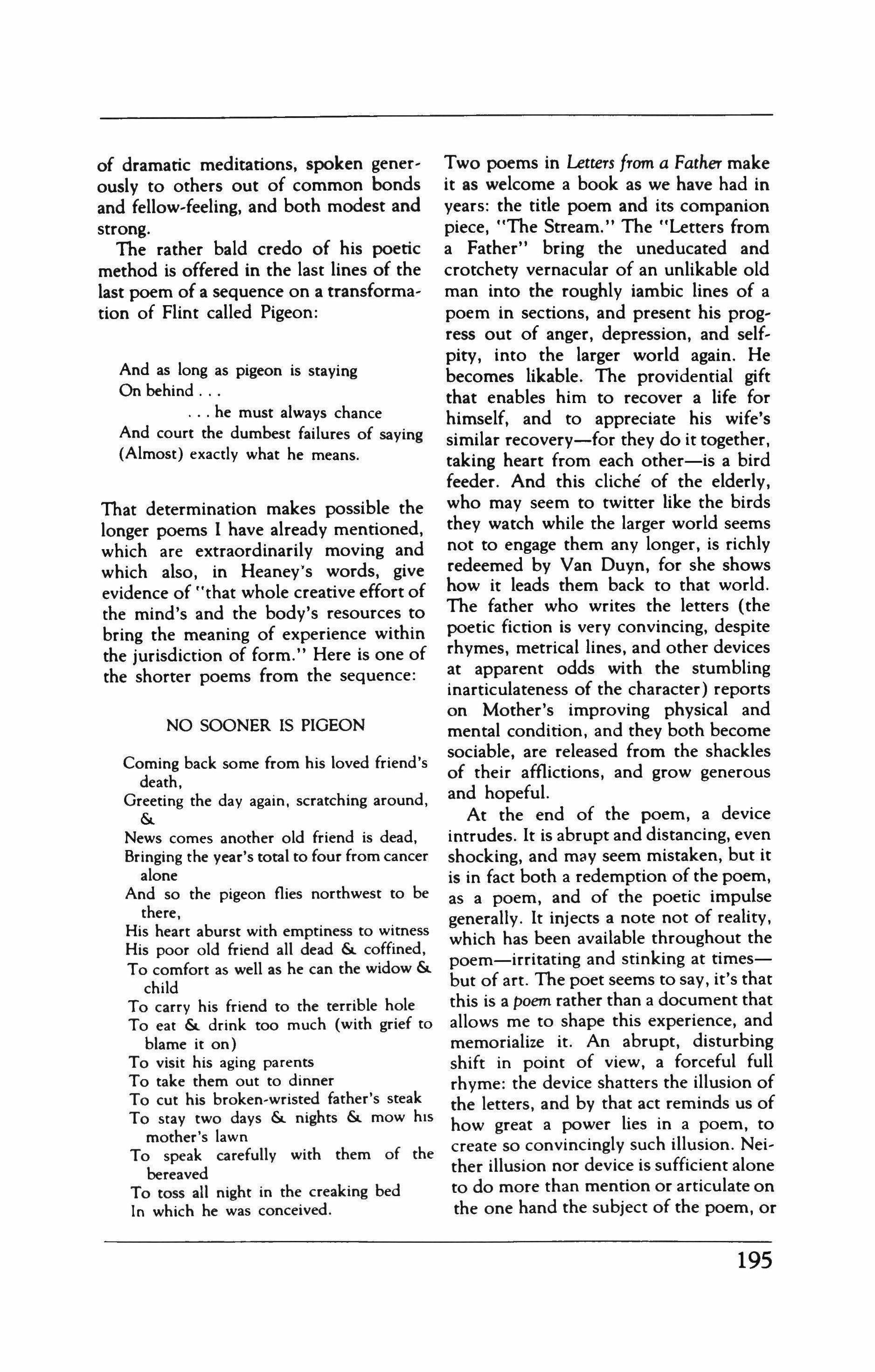
of dramatic meditations, spoken generously to others out of common bonds and fellow-feeling, and both modest and strong.
The rather bald credo of his poetic method is offered in the last lines of the last poem of a sequence on a transformation of Flint called Pigeon:
And as long as pigeon is staying
On behind he must always chance
And court the dumbest failures of saying (Almost) exactly what he means.
That determination makes possible the longer poems I have already mentioned, which are extraordinarily moving and which also, in Heaney's words, give evidence of "that whole creative effort of the mind's and the body's resources to bring the meaning of experience within the jurisdiction of form." Here is one of the shorter poems from the sequence:
Coming back some from his loved friend's death,
Greeting the day again, scratching around, s,
News comes another old friend is dead,
Bringing the year's total to four from cancer alone
And so the pigeon flies northwest to be there,
His heart aburst with emptiness to witness
His poor old friend all dead & coffined,
To comfort as well as he can the widow & child
To carry his friend to the terrible hole
To eat & drink too much (with grief to blame it on)
To visit his aging parents
To take them out to dinner
To cut his broken-wrisred father's steak
To stay two days & nights & mow his mother's lawn
To speak carefully with them of the bereaved
To toss all night in the creaking bed
In which he was conceived.
Two poems in Letters [ram a Father make it as welcome a book as we have had in years: the title poem and its companion piece, "The Stream." The "Letters from a Father" bring the uneducated and crotchety vernacular of an unlikable old man into the roughly iambic lines of a poem in sections, and present his progress out of anger, depression, and selfpity, into the larger world again. He becomes likable. The providential gift that enables him to recover a life for himself, and to appreciate his wife's similar recovery-for they do it together, taking heart from each other-is a bird feeder. And this cliche of the elderly, who may seem to twitter like the birds they watch while the larger world seems not to engage them any longer, is richly redeemed by Van Duyn, for she shows how it leads them back to that world. The father who writes the letters (the poetic fiction is very convincing, despite rhymes, metrical lines, and other devices at apparent odds with the stumbling inarticulateness of the character) reports on Mother's improving physical and mental condition, and they both become sociable, are released from the shackles of their afflictions, and grow generous and hopeful.
At the end of the poem, a device intrudes. It is abrupt and distancing, even shocking, and m3Y seem mistaken, but it is in fact both a redemption of the poem, as a poem, and of the poetic impulse generally. It injects a note not of reality, which has been available throughout the poem-irritating and stinking at timesbut of art. The poet seems to say, it's that this is a poem rather than a document that allows me to shape this experience, and memorialize it. An abrupt, disturbing shift in point of view, a forceful full rhyme: the device shatters the illusion of the letters, and by that act reminds us of how great a power lies in a poem, to create so convincingly such illusion. Neither illusion nor device is sufficient alone to do more than mention or articulate on the one hand the subject of the poem, or

on the other the artificiality of writing a poem about it. Together they produce a curious and wonderful effect, which we recognize as the aim of art-to order reality into that hierarchy Milosz speaks of, so as to make a kind of sense of it that is better, more useful really, than the sense of things we have as we merely mention them. Both the referential and the expressive powers of art leap into us with that tiny device of a final rhyme in a different voice, and the ordinary miseries of the weakness and decline of old age into a bitter death unrelieved by enthusiasm or love-those miseries are banished for a moment, for a different story has been told and also acknowledged as a construct of the imagination. (Quoting the lines out of context seems wrong.)
It's as if we are forcibly awakened at the end from the dream of art, from the ruse of compassion that the poem produces, into the reality of our own moments, and the knowledge that a great poem can make us compassionate. It does so not by virtue of its documentary power (Milosz warns against that), but by virtue of its power to hold in mind a conciousness of a background reality, or a real background, while driving forward through all the various devices and resources available to a poet. Something similar happens in "The Stream," but in a more extended and perhaps riskier way. This poem follows the first, and its unselfconscious manner and the dedicatory dates at the front of the book imply that in the two poems we find out "what happened" to the two old people.
In "The Stream," the mother is visited in a nursing home by her daughter. Father is already dead, Mother apparently dim, fearful, and weak. Van Duyn further confines the loose iambic line of "Letters from a Father" by employing it here in a format of rhymed couplets. It's as if by coiling the spring tighter, she will gain power with its release.
(I use the word format out of desperation to avoid the weary cliches one hears in discourses on the outmodedness of
"form." Some poets use the phrase "organic form," which may make only an illusory distinction between the way a free-verse poem and a formal poem look. There are many formal poems with organic form as well, however, and writing in free verse does not guarantee fidelity to a "higher" notion of form. What free-verse poems almost always lack is a format; they can do without a format if they do have a form. We should say "format" when we mean the heroic couplets, however loose, of "The Stream," or a sonnet, or the bane of contemporary formalizing, sestinas and villanelles. Utilization of such formats does nothing to guarantee that the poem will truly have a shape, a form, or that it will be any good. Form must mean the poem's arrangement in such a way that it produces in its readers a sense of the meaning of experience.
Heaney says "the jurisdiction"ofform, conveying at once both a sense of its being a kind of area within which different things may happen, and an administered and authoritative activity. Milosz simply says a great subject isn't enough, and documentary poems are not a sufficient memorial to those who have died. Much bad poetry has no form, whatever its format or lack of it, and that is why it is neither memorable nor moving nor intelligent. End of digression.)
Van Duyn's format in "The Stream" is a difficult one, but she manages it well; or rather, she makes great use of it to carry her forward through the narrative of the visit toward another concluding poetic device. By its blatant artifice, the format prepares us for the second principal poetic device, the extended metaphor of the long ending. The format suggests an ability at first to control and deliberate on the nearly intractable materialsorrow at the loss of the mother, and at the lifelong absence of her love that has preceded the final loss ofher life. Yet this illusion of control veils a howl of grief and frustration at lost opportunities to express a love that has remained for years

hidden, blocked, unexpressed. The details of the poem-the getting dressed, the pathetic lunch in which roles are reversed and the mother eats and acts like a timid child-are marshaled by the format and are tearing at it, at the same time. As flashes of memory interrupt the narrator's account of the day, the format becomes not more constricting but somehow less visible, enabling finally a release of the frustration and sorrow, when the visit is over and Mother is in bed:
with a girl's grace you sat up and, as if you'd done it lifelong, reached out to cup
my face in both your hands, and, as easily as if you'd said it lifelong, you said, "Don't cry,
don't cry. You'll never know how much I love you,"
I kissed you and left, crying. It felt true.
A bit of masterfully distracting and nearly comic detail, and immediately the poem plunges to its most daring risk, not the expected scream or a naked revelation, but a literary device, a metaphor so complex and extended it out-Homers Homer:
I forgot to tell them that you always sneaked your meat, you'd bragged, to the man who ate beside you. One night
at home, my heart ringing with what you'd said, then morning, when the phone rang to say you were dead.
I see your loving look wherever I go. What is love? Truly I do not know.
Sometimes, perhaps, instead of a great sea, it is a narrow stream
The final twenty lines of the poem explore the possibilities of meaning that
the metaphor of the stream can provide, after the sorrowful narrative of the first seventy lines. Love between parent and child is blocked, directionless, thwarted, of little help, hard to find and harder to hold, and finally makes itself known too late, too ineffectually To have offered such hackneyed observations baldly would have been unthinkable, despite their apparent truth. In fact, they are not true; they are not accurate to the experience to which the poem bears witness. Somehow the extended metaphor, while clearly enumerating these possibilities as aspects of a literary device entertained by a patient, inquiring sensibility, also expresses each possibility with the force of honest feeling. The disappointment and helplessness of both parent and child, neither of them able to change the past nor allay the miseries of the present, are complex and must be understood dramatically.
The archaic device of the extended metaphor, by its very artificiality, releases the imagination so that it can find adequate words for the expression ofthis disappointment and sorrow. At this point in the poem, we find not a wail but a calm, almost painfully slow, climb toward the final lines, when the stream of the metaphor will finally appear at the feet of the narrator, up from the depths of inarticulate feeling. This is the fitting memorial to the mother, because it moves us toward her and her daughter. A large subject, and poetic accomplishment, converge in these poems extraordinarily and memorably.
Something similar, if not so dramatic, happens in the best poems of Norman Nicholson's Selected Poems 1940- 1982, with which he may find his first readers on this side of the Atlantic. He has not been a prolific poet nor a shouter, but the vigor and sensitivity to nuances of the physical in his work make me think of him as companion to Heaney. They both have a spareness and, at the same time, an appetite for detail given with great, luxu-
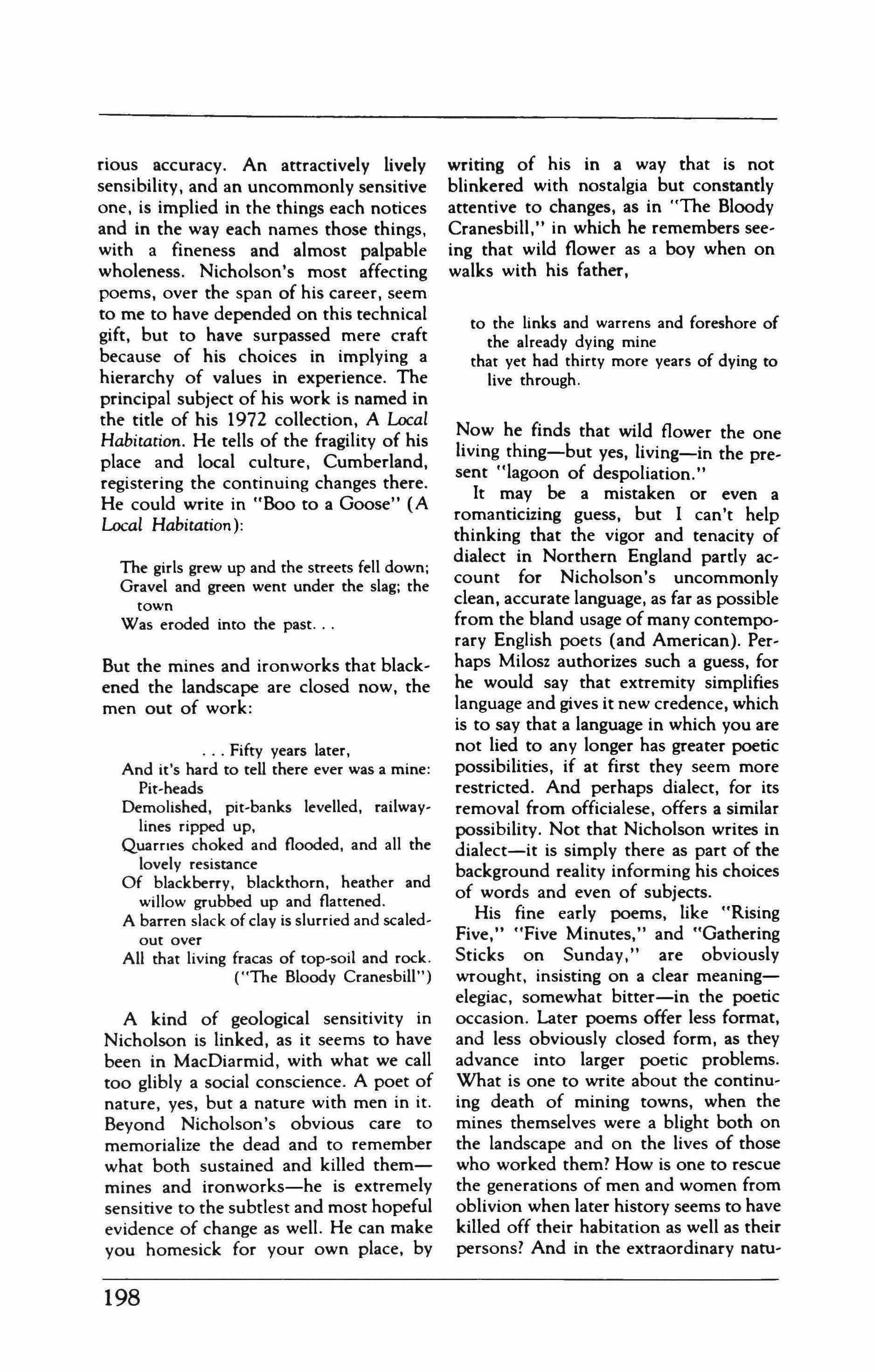
rious accuracy. An attractively lively sensibility, and an uncommonly sensitive one, is implied in the things each notices and in the way each names those things, with a fineness and almost palpable wholeness. Nicholson's most affecting poems, over the span of his career, seem to me to have depended on this technical gift, but to have surpassed mere craft because of his choices in implying a hierarchy of values in experience. The principal subject of his work is named in the title of his 1972 collection, A Local Habitation. He tells of the fragility of his place and local culture, Cumberland, registering the continuing changes there. He could write in "Boo to a Goose" (A Local Habitation):
The girls grew up and the streets fell down; Gravel and green went under the slag; the town Was eroded into the past
But the mines and ironworks that blackened the landscape are closed now, the men out of work:
Fifty years later,
And it's hard to tell there ever was a mine: Pit-heads
Demolished, pit-banks levelled, railwaylines ripped up, Quarries choked and flooded, and all the lovely resistance
Of blackberry, blackthorn, heather and willow grubbed up and flattened.
A barren slack ofclay is slurried and scaledout over
All that living fracas of top-soil and rock. ("The Bloody Cranesbill")
A kind of geological sensitivity in Nicholson is linked, as it seems to have been in MacDiarmid, with what we call too glibly a social conscience. A poet of nature, yes, but a nature with men in it. Beyond Nicholson's obvious care to memorialize the dead and to remember what both sustained and killed themmines and ironworks-he is extremely sensitive to the subtlest and most hopeful evidence of change as well. He can make you homesick for your own place, by
wnnng of his in a way that is not blinkered with nostalgia but constantly attentive to changes, as in "The Bloody Cranesbill," in which he remembers seeing that wild flower as a boy when on walks with his father,
to the links and warrens and foreshore of the already dying mine that yet had thirty more years of dying to live through.
Now he finds that wild flower the one living thing-but yes, living-in the present "lagoon of despoliation."
It may be a mistaken or even a romanticizing guess, but I can't help thinking that the vigor and tenacity of dialect in Northern England partly account for Nicholson's uncommonly clean, accurate language, as far as possible from the bland usage of many contemporary English poets (and American). Perhaps Milosz authorizes such a guess, for he would say that extremity simplifies language and gives it new credence, which is to say that a language in which you are not lied to any longer has greater poetic possibilities, if at first they seem more restricted. And perhaps dialect, for its removal from officialese, offers a similar possibility. Not that Nicholson writes in dialect-it is simply there as part of the background reality informing his choices of words and even of subjects.
His fine early poems, like "Rising Five," "Five Minutes," and "Gathering Sticks on Sunday," are obviously wrought, insisting on a clear meaningelegiac, somewhat bitter-in the poetic occasion. Later poems offer less format, and less obviously closed form, as they advance into larger poetic problems. What is one to write about the continuing death of mining towns, when the mines themselves were a blight both on the landscape and on the lives of those who worked them? How is one to rescue the generations of men and women from oblivion when later history seems to have killed off their habitation as well as their persons? And in the extraordinary natu-

ral beauty of Cumberland, Nicholson cannot avoid the poison in "a land-scape man/helped nature make" ("The Elm Decline," A Local Habitation). It's possible, even probable, that
The living world of men
Will take a lunar look, as dead as slag, And moon and earth will stare at one another
Like the cold, yellow skulls of child and mother.
("Gathering Sticks on Sunday")
The sweetness of life in Nicholson's poems is an answer to despair and weariness, however, as are Nicholson's humor and his admiring, tolerant affection for his forebears, for them especially as victors of a kind, in loving and raising their families and in their small but family-legendary accomplishments (see "The Tune the Old Cow Died Of," "Have You Been to London?" and "The Seventeenth of the Name"). The ancestors, like gods, preside before our creation, our birth, and over our childhood. And then, unlike the gods, they die, and leave us as much bereft of the divine reassuring principle of continuity as we are of a person we loved, and who loved us. Nicholson's poems to ancestors seem to come not out of a longing for his own identity-as more egotistical or forlorn poems on grandparents seem to do-but out of wonder at a life reaching so far back and so far forward, and yet still mortal, incomplete, full of fault and therefore beloved. He offers a homagehe professes his allegiance-to the dead woman who was his grandmother.
There is a fashion now for poetry that appears to consider a variety of sophisticated epistemological problems, using as its stage setting the accoutred living room, the museum hall, the back porch of a privileged retreat. Against this taste, some poets praise the most ordinary ordinariness-lacking the nerve and exuberance of William Carlos Williamsor the absence of all meaning, or a fey inconsequence, bedecked with porten-
tous pathetic fallacies, "the winter sun lets down its cold necklaces The implication of either tendency is that our personal losses and joys, and the turbulent, sometimes explosive social and political environment, are so complex that only an oblique and intellectually refined sense of play can suffice as an artistic strategy. But poems like Flint's, Van Duyn's, and Nicholson's seem to me more honest, to offer a far more substantial understanding of life, and a more pointed, and no less masterful, exercise of art.
Rather than trying to sort out the battle-flags in aesthetic skirmishes no one should care anything about, and following them into the dust, we should look for such honesty and accomplishment. Flint, Van Duyn, and Nicholson come to us bearing the two Greek masks, tragic and comic, but without as yet any need of cataclysms, because their sense of the world around them is acute and follows what Milosz calls the hierarchy of values-a different hierarchy for each poet, to be sure, but the deliberateness of their choices is clear. Their best poems make more sense, have more feeling, more dignity, more modesty, and compose a truer image of life, and a more pointed criticism, than most of the writing of our day.-Reginald Gibbons
Olivia Manning, The Levant Trilogy. Penguin Books, 1983. 568 pp. Pb, $7.95.
Penguin has issued in one American volume the three novels of The Levant Trilogy that were published in England separately in 1977, 1978, and 1980. This is the last work published, and presumably written, before Manning's death. Although she wrote more than a dozen books, she is little known in the U.S. This is a pity not only because she was an extraordinarily good writer, but also because her approach to her material, especially to World War II, is distinctive and powerful. Her work is spare in a modern way, and extremely acute psv-

chologically. Her fictional approach is to prefer multiple narratives-which is oldfashioned-but to splice them with the grace of ellipsis and the austere reticence of a modern sensibility confronted with the unspeakable as well as the ordinary. She domesticates-in the best sense-the British war in North Africa by concentrating on the lives of a few characters caught in both combat and civilian experience. Her portrait of Simon Boulderstone, a very young soldier, is reminiscent of the immediacy and movement of Keith Douglas' memoir, Alamein to Zem-Zem. She takes it for granted that the action must move quickly, and she does not stop to detail it except to convey the bewilderment, confusion, and waste of the fighting when seen from the individual soldier's point of view. Questions of campaigns and strategies are missing entirely; there is no great sweep to her war narrative, none of the often meretricious excitement of the grand event. Nor is there gratuitous gore. But she does not shrink from presenting moments of horrific suffering, either. Mostly, she has written an unusual narrative of combat, somewhat distanced, but all the more affecting for it: waiting, maneuvering, almost random death and wounds, and recovery in a ward for invalids.
The trilogy's second principal focus is on the wife of a young British Council lecturer, Guy Pringle. Harriet Pringle, amid dangers and wartime exigencies in Cairo, is caught not only in a struggle of armies and nations, but more immediately in a marriage of relentless struggle against a man of the type now identified for us by popular psychology as passiveaggressive. Her husband is gregarious, both kind and brave in a thoughtless way, but almost unconscious of the emotional lives of those around him, even as he is eager to offer a peculiarly male kind of aid to them. For example, despite his almost complete lack of political understanding, he feels greater responsibility to meet a group of visiting young Egyptians to "give them a talk about selfdetermination," than he does to be with
Harriet on the evening when she returns to him after he has thought, for months, that she was dead on a ship sunk in the Mediterranean. Guy Pringle is also curiously uninterested in the war itself, while Harriet is thrown into contact with a few young English soldiers, and perceives them and the war more acutely. The background of sexual incompatibility (Side-lit by friends of Harriet who are illicit lovers and others who are lesbian) makes the war itself seem less the large historical event than what it truly is on a human scale-a kind of huge incompatibility of purposes and desires, most of them destructive and insane.
There is not much comfort in this trilogy. In fact, the third of the three novels almost disappoints with its apparently inconclusive ending-Simon Boulderstone anxious to return to action, against every reason (having already been temporarily paralyzed with wounds, and having held in his arms his dying older brother). The war itself does not end, but merely proceeds to another front, away from Cairo. And the Pringles seem no closer to companionship than they were at the beginning. (Another subplot, the adventures of an officer-seeking beauty, offers a conclusion, but one that disappoints the beauty's cynical hopes.)
Such inconclusiveness may be part of the artistic design of the novel, which throws a sharp light on perplexity and social insanity, offers masterful portraiture of exiles and hangers-on, and demonstrates a love for soldiers and a great understanding of their hardships, especially those beyond physical suffering-their boredom, their desperate friendships, the pointlessness of most of their endeavors, their ignorance and their bravery, and their clinging to rank and routine in order to preserve a sense of society (apparently this can be enormously reassuring on the edge of disaster and bloodshed, and after it as well, but may be worth very little in action). Most of all, Manning seems to understand the loneliness and aloneness of both soldier and civilian alike, Harriet Pringle and
Simon Boulderstone. Again and again, this theme determines the details of Manning's beautiful sentences, and shapes her chapters as well. The novels begin and end, each in turn, with aloneness, and somehow, without doing more than touching this condition lightly and repeatedly, Manning presents it as the fundamental state to which war reduces men and women, by destroying the merely apparent ties and expectations that once governed their relationships.
Something in this fictional thinking about lives during the war in Africa strikes me as predominantly, if not essentially or exclusively, female-free of the cant of beautiful violence, and free also of the romantic melancholy with which Hemingway, for one, could invest wartime suffering. This novel cannot compare, for a hard and cold view, with the sort of books that focus on the gratuitous and inevitable barbarism characterizing all wars. A wider understanding is at work in The Levant Trilogy and it, too, offers a work of judgment, all the more impressive for its apparent calm and sympathy.
If one wanted to say that a novel represents an identifiably feminine sensibility, and one wished neither to offend critics who believe this is possible (but don't like others' definitions) nor to fail to offend those who believe it isn't

posstble=-how can one demonstrate the point? If a novel by a woman takes as its subject a traditionally male province of fiction-war-isn't it likely that the result, if it is good, will command attention not only because it is good, but because it offers something that most male writers do not offer? The Levant Trilogy is a superb work of fiction.
-Reginald GibbonsPublishers of books reviewed:
Harvard University Press
79 Garden St. Cambridge, MA 02138
The Dial Press
One Dag Hammarskjold Plaza New York, NY 10017
Atheneum Publishers 597 Fifth Ave. New York, NY 10017
Faber and Faber 39 Thompson St. Winchester, MA 01890
Penguin Books 625 Madison Ave. New York, NY 10022

Fred Chappell teaches at the University of North Carolina at Greensboro. The New South Co. brought out his book of short stories, Moments of Light. His sequence of poems, Castle Tzingal, will be published in 1984 by Louisiana State University Press. "Isaac Babel" is from R. D. Skillings' collection, In a Murderous Time, to be published by Apple-Wood Books in Spring 1984. His other books are Alternative Lives (Ithaca House, 1974) and P-Town Stories (or the Meatrack) (Apple-Wood, 1983). He is a member of the Writing Committee at the Fine Arts Work Center in Provincetown, Massachusetts.
John Stewart teaches in the Department of Anthropology at the University of Illinois, Urbana-Champaign. He has published a collection of stories, Curving Road (University of Illinois Press, 1975) and a novel, Last Cool Days (Andre Deutsch, 1971); he also edited the autobiography of Bessie Jones, For the Ancestors; Autobiographical Memories (University of Illinois, 1983). He is preparing a book on village culture in the Caribbean and a new collection of stories. Giinter Kunert has published work in several literary genres. His most recent book is Verspiitete Monologe, a collection of prose poems. His translator, Lawrence Rosenwald, teaches in the English Department at Wellesley College. Mr. Rosenwald has published articles on American literature and is currently translating a book on Emerson by the French critic, Maurice Gonnaud.
Natalia Ginzburg was born in Palermo in 1916 and raised in Torino. In 1940 she followed her husband, Leone Ginzburg, into political exile in the Abruzzi village of Pizzoli. There she completed her first major work, La strada che va in citro, published in 1942 under a pseudonym, Alessandra Tornimparte, in order to disguise her Jewish
202
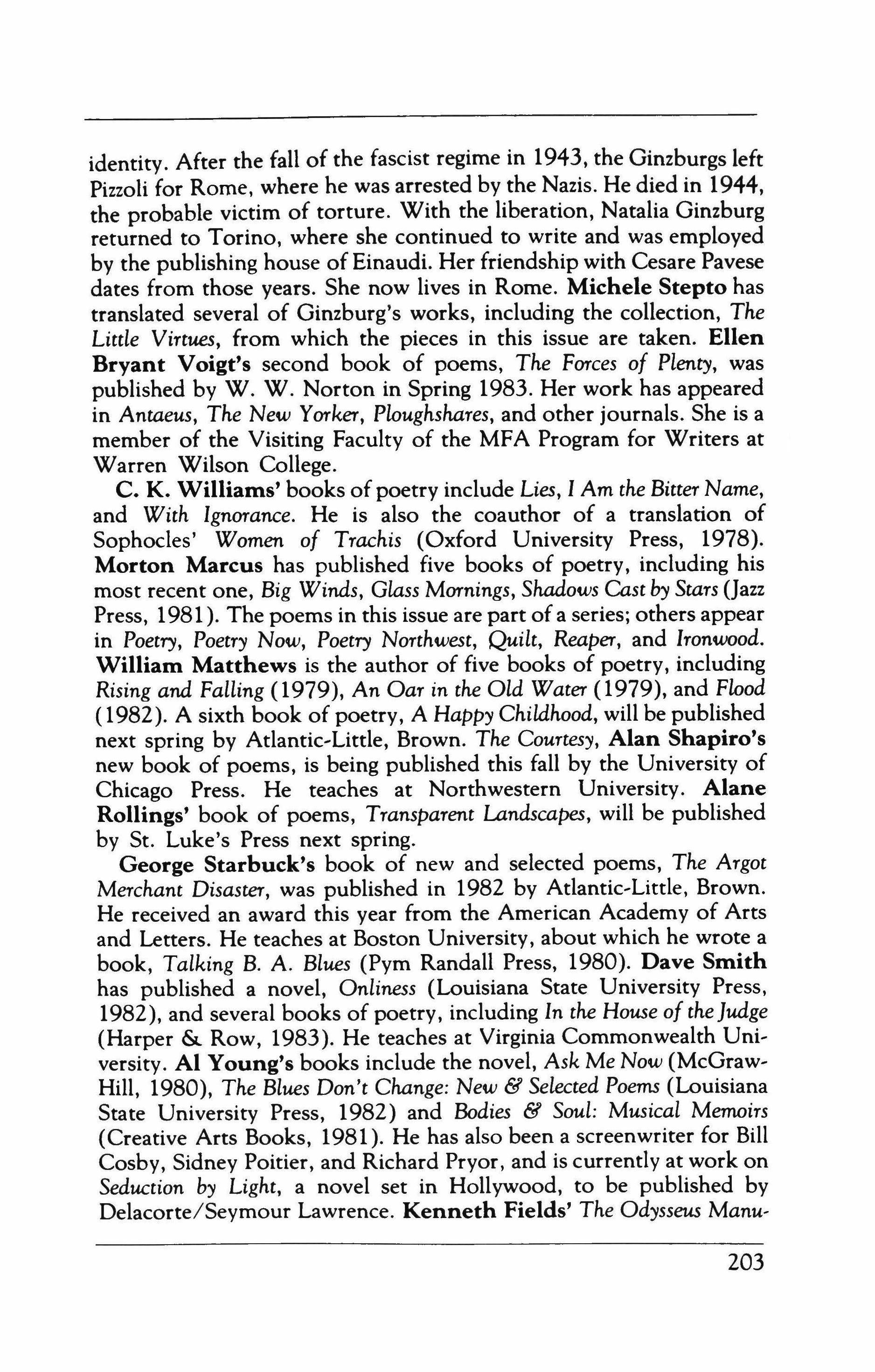
identity. After the fall of the fascist regime in 1943, the Ginzburgs left Pizzoli for Rome, where he was arrested by the Nazis. He died in 1944, the probable victim of torture. With the liberation, Natalia Ginzburg returned to Torino, where she continued to write and was employed by the publishing house of Einaudi. Her friendship with Cesare Pavese dates from those years. She now lives in Rome. Michele Stepto has translated several of Ginzburg's works, including the collection, The Little Virtues, from which the pieces in this issue are taken. Ellen Bryant Voigt's second book of poems, The Forces of Plenty, was published by W. W. Norton in Spring 1983. Her work has appeared in Antaeus, The New Yorker, Ploughshares, and other journals. She is a member of the Visiting Faculty of the MFA Program for Writers at Warren Wilson College.
c. K. Williams' books of poetry include Lies, I Am the Bitter Name, and With Ignorance. He is also the coauthor of a translation of Sophocles' Women of Trachis (Oxford University Press, 1978). Morton Marcus has published five books of poetry, including his most recent one, Big Winds, Glass Mornings, Shadows Cast by Stars (Jazz Press, 1981). The poems in this issue are part of a series; others appear in Poetry, Poetry Now, Poetry Northwest, Quilt, Reaper, and Ironwood. William Matthews is the author of five books of poetry, including Rising and Falling (1979), An Oar in the Old Water (1979), and Flood ( 1982). A sixth book of poetry, A Happy Childhood, will be published next spring by Atlantic-Little, Brown. The Courtesy, Alan Shapiro's new book of poems, is being published this fall by the University of Chicago Press. He teaches at Northwestern University. Alane Rollings' book of poems, Transparent Landscapes, will be published by St. Luke's Press next spring.
George Starbuck's book of new and selected poems, The Argot Merchant Disaster, was published in 1982 by Atlantic-Little, Brown. He received an award this year from the American Academy of Arts and Letters. He teaches at Boston University, about which he wrote a book, Talking B. A. Blues (Pvm Randall Press, 1980). Dave Smith has published a novel, Onliness (Louisiana State University Press. 1982), and several books of poetry, including In the House of theJudge (Harper & Row, 1983). He teaches at Virginia Commonwealth Untversity. Al Young's books include the novel, Ask Me Now (McfhawHill, 1980), The Blues Don't Change: New & Selected Poems (Louisiana State University Press, 1982) and Bodies & Soul: Musical Memoirs (Creative Arts Books, 1981). He has also been a screenwriter for Bill Cosby, Sidney Poitier, and Richard Pryor, and is currently at work on Seduction by Light, a novel set in Hollywood, to be published by Delacorte/Seymour Lawrence. Kenneth Fields' The Odysseus Manu-

scripts was published by Elpenor Books in 1981. He teaches at Stanford.
William Goyen was one of the greatest contemporary American fiction writers. His novella Arcadio is being published this fall by Clarkson Potter. At the time of his death, in August (after a long illness), he left two completed but unpublished works: Leander, another novella, and Precious Door, a collection of stories. A large selection of his work, and an interview, appeared in TQ #56. Born in Korea, Kim Yong Ik first came to America as a student in 1948. He is the author of four young adult novels, and of short stories published in The New Yorker, Mademoiselle, The Atlantic Monthly, Harper's Bazaar, and other periodicals. He teaches at Duquesne University. A collection of Perry Glasser's short fiction, Suspicious Origins, will be published by New Rivers Press. His work has appeared in such journals as North American Review, Antioch Review, and The Missouri Review. He teaches creative writing at Drake University. A collection of Janet Kauffman's short stories, Places in the World a Woman Could Walk, is being published this fall by Knopf.
Beth Tashery Shannon's work has appeared in Chicago Review, Northwest Review, and other journals. Ron Carlson is the author of two novels, Betrayed by F. Scott Fitzgerald (1977) and Truants (1981), both published by W. W. Norton. Stan Washburn's prints and paintings are exhibited in the United States and other countries, and are represented in numerous public collections. He lives in Berkeley, California. Matthew Owens is a student in printmaking at the School of the Art Institute of Chicago, as well as a designer and musician, performing on the bagpipe. His illustrations for this issue are composed of enamel applied by a syringe.
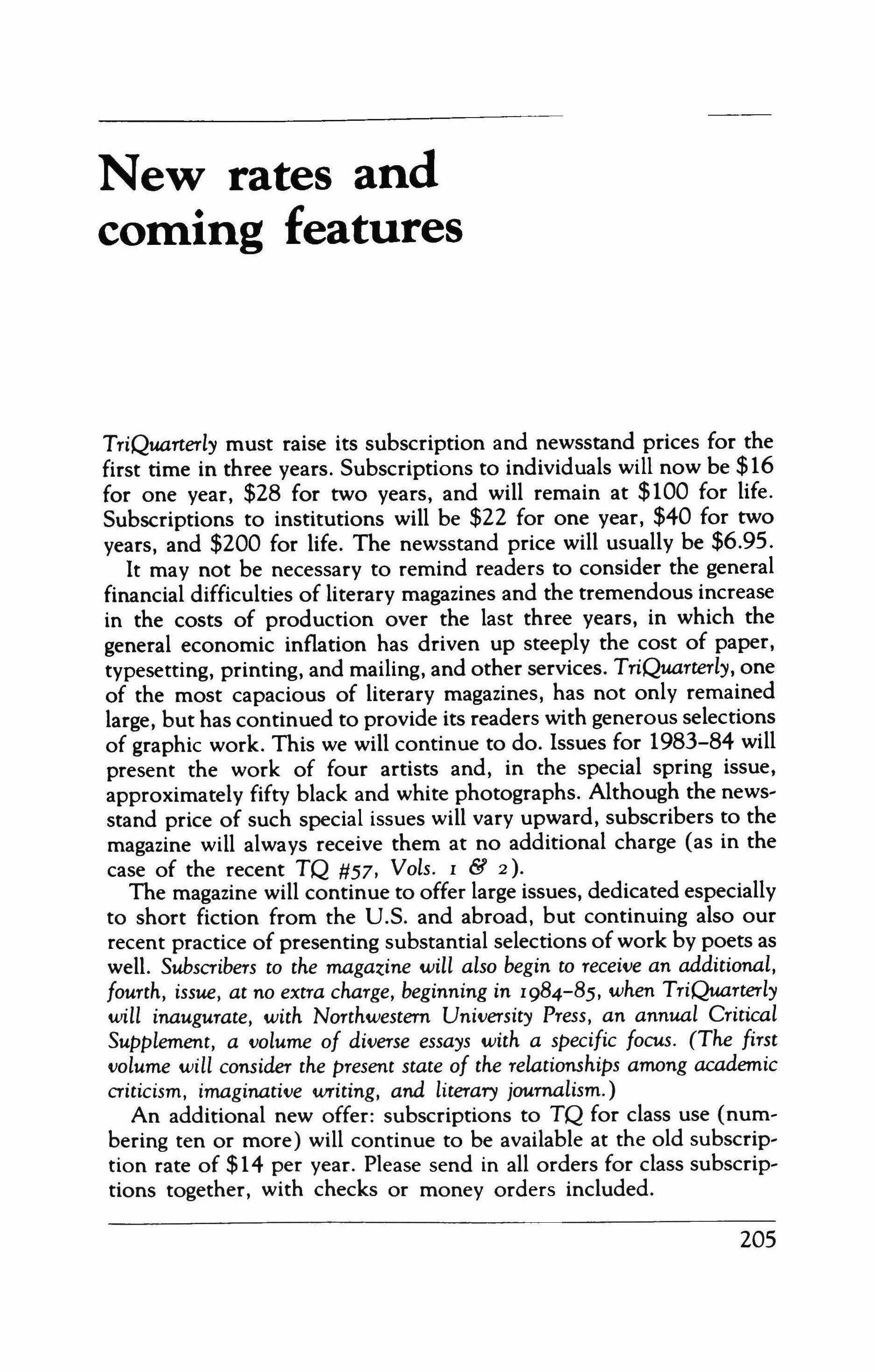
TriQuarterly must raise its subscription and newsstand prices for the first time in three years. Subscriptions to individuals will now be $16 for one year, $28 for two years, and will remain at $100 for life. Subscriptions to institutions will be $22 for one year, $40 for two years, and $200 for life. The newsstand price will usually be $6.95. It may not be necessary to remind readers to consider the general financial difficulties of literary magazines and the tremendous increase in the costs of production over the last three years, in which the general economic inflation has driven up steeply the cost of paper, typesetting, printing, and mailing, and other services. TriQuarterly, one of the most capacious of literary magazines, has not only remained large, but has continued to provide its readers with generous selections of graphic work. This we will continue to do. Issues for 1983-84 will present the work of four artists and, in the special spring issue, approximately fifty black and white photographs. Although the newsstand price of such special issues will vary upward, subscribers to the magazine will always receive them at no additional charge (as in the case of the recent TQ #57, Vols. 1 & 2).
The magazine will continue to offer large issues, dedicated especially to short fiction from the U.S. and abroad, but continuing also our recent practice of presenting substantial selections of work by poets as well. Subscribers to the magazine will also begin to receive an additional, fourth, issue, at no extra charge, beginning in 1984-85, when TriQuarterly will inaugurate, with Northwestern University Press, an annual Critical Supplement, a volume of diverse essays with a specific focus. (The first volume will consider the present state of the relationships among academic criticism, imaginative writing, and literary journalism.)
An additional new offer: subscriptions to TQ for class use (num� bering ten or more) will continue to be available at the old subscription rate of $14 per year. Please send in all orders for class subscriptions together, with checks or money orders included.
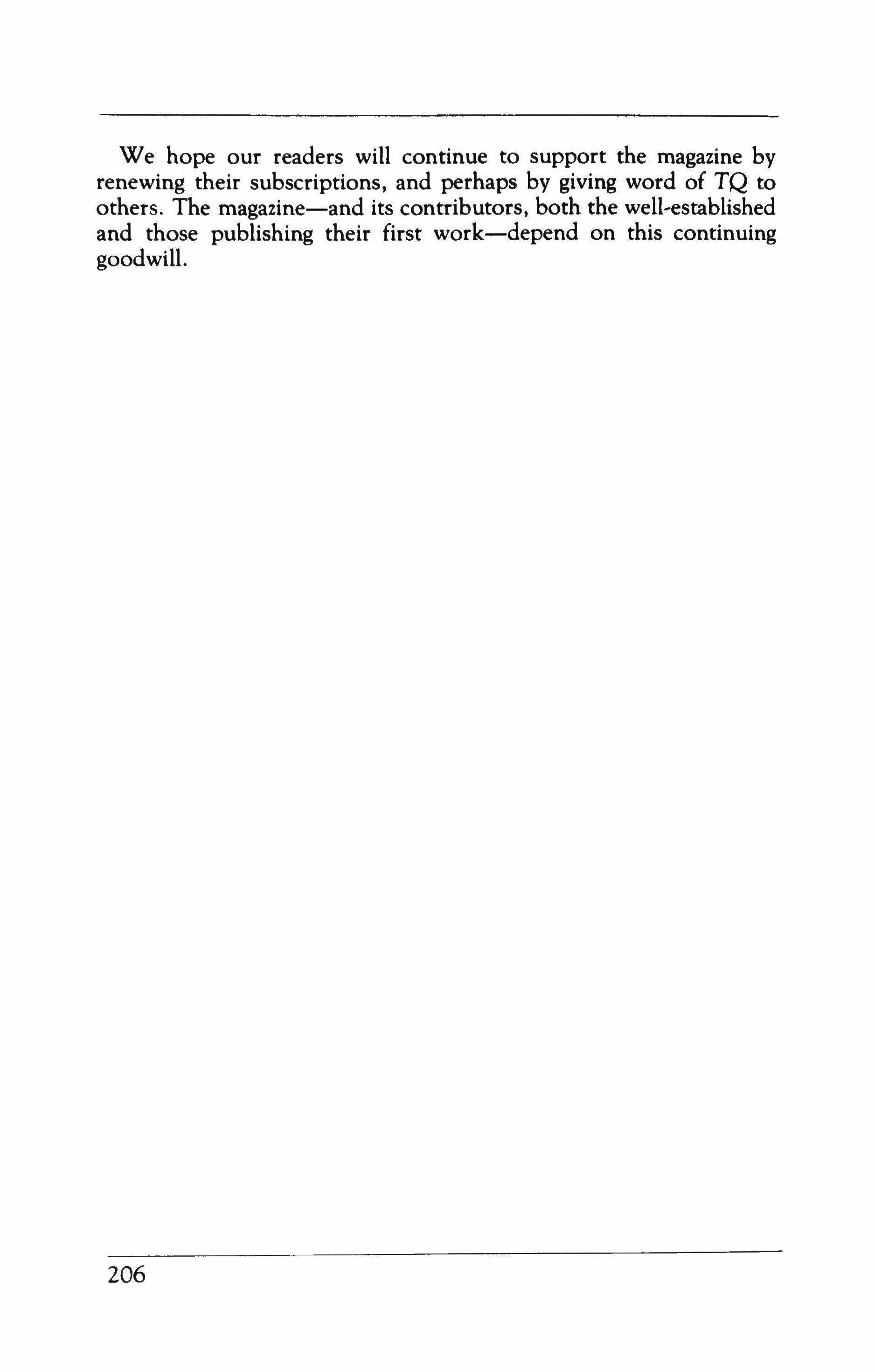
We hope our readers will continue to support the magazine by renewing their subscriptions, and perhaps by giving word of TQ to others. The magazine-and its contributors, both the well-established and those publishing their first work-depend on this continuing goodwill.
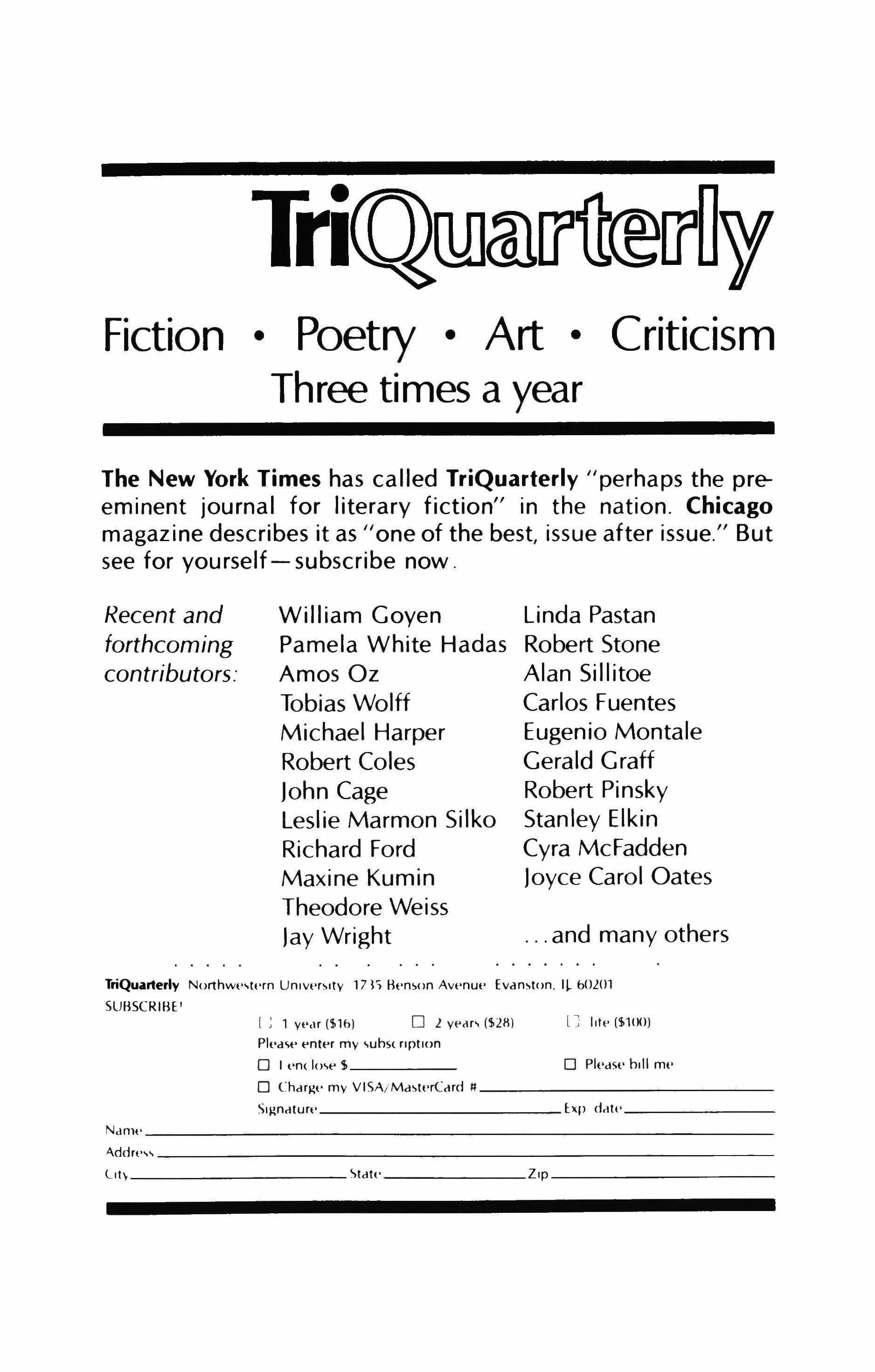
The New York Times has called TriQuarterly "perhaps the preeminent journal for literary fiction" in the nation. Chicago magazine describes it as "one of the best, issue after issue." But see for yourself- subscribe now.
Recent and forthcoming contributors:
William Goyen
Pamela White Hadas
Amos Oz
Tobias Wolff
Michael Harper
Robert Coles
John Cage
Leslie Marmon Silko
Richard Ford
Maxine Kumin
Theodore Weiss
Linda Pastan
Robert Stone
Alan Sillitoe
Carlos Fuentes
Eugenio Montale
Gerald Graff
Robert Pinsky
Stanley Elkin
Cyra McFadden
Joyce Carol Oates
Jay Wright and many others
TriQuarterly Northwevtr-rn Uruversitv 171') He-nson Avenue Evanston. I� b0201
SUBSCRIBE'
.The twelve people involved in these exciting conversations are all, as in fiction, invented. Each reveals his or her character as the talks progress - in disagreements, conflicts and resolutions - on the important issues of our time, in science, the arts, politics, philosophy and business.
.The conversations take place during lunch time in the faculty restaurant of a university. The characters consist of eight professors - of psychology, political science, history, English ("sort of a Marxist"), physics, sociology (a feminist), biology, philosophy-and a member of the theater department, an executive in the oil industry, a philosopher and a visiting academic.
.There is hardly any subject ofurgent interest that is not discussed and presented in depth.
• Like all conversations on a high enough level, these turn out to be a pleasurable way of learning a good deal about what the world and oneself are like.
At your bookseller. SI5.95. or use coupon below to order:
HORIZON PRESS. Dcpt. T. 156 Fifth Avenue, N.Y.. N.Y. 10010
Please send copies of Conversations. A Kind of FICtIOn @ $ 15. 95 per copy. plus $1.35 for postage and handling. Enclosed is $
Namc
Addr cs-,
Cuv

Sldll' /,f'
"He was a shining star a craftsman of uncommon talent one of the finest masters of English prose."
-Houston Chronicle
Arcadio is Goyen's finest novel in years. It is an extraordinary, affecting, and deeply poetic tale. "A triumph of the imagination This beautifully written book has the overwhelming power of a myth brought to life."
-PubLishers WeekLy
"Mr. Goyen's dialogue is extraordinarily entertaining:' -CHRISTOPHER ISHERWOOD

$12.95, now at your bookstore
Clarkson N. Potler; Inc.

#22 Leszek Kolakowski special issue: co-edited by George Gomori. The first translations into English of this important Polish philosopher. 256 pp. $2.50
#25 Prose for Borges: a special issue with an anthology of writings by Borges and essays and appreciations by Anthony Kerrigan, Norman Thomas di Giovanni and others. 468 pp. $6.00
#26 Ongoing American Fiction I: features Stanley Elkin, Robert Coover, Thomas McGuane, Russell Edson, Alain Robbe-Grillet, Joyce Carol Oates, and Philip Stevick. 420 pp. $5.00
#29 Ongoing American Fiction Il: stories by John Gardner, Joseph McElroy, Joy Williams, Gilbert Sorrentino, William Kittredge and others. 216 pp. $4.00
#30 A Context for Ongoing American Fiction: criticism by Albert J. Guerard, David Caute, Richard Pearce, Tony Tanner, John Hawkes and Philip Stevick. 140 pp. $4.00
#31 Contemporary Asian literature: co-edited by Lucien Stryk. With Lu Hsun, Chairil Anwar, Ho Chi Minh, Shinkichi Takahashi, Yasunari Kawabata and others. 244 pp. $3.50

#33 Ongoing American Fiction 01: James Purdy, David Kranes, Alan Sillitoe, Paul Bowles, Daniel Halpern, Morris Dickstein, Robert Alter and more. 340 pp. $3.50
#34 Ongoing American Fiction IV: Charles Newman, Ian McEwan, Robert Creeley, Gilbert Sorrentino, Ron Sukenick, Joseph McElroy, Robert Scholes and nine others. 256 pp. $3.50
#36 Ongoing American Fiction V: Robert Coover, Ursule Molinaro, Paul West, Ian MacMillan, Joyce Carol Oates, Peter Michelson. 256 pp. $5.00
#37 Going to Heaven: a fantasy about love and death, narrated entirely through photographs. Produced by Elliott Anderson, directed by Lawrence Levy, and photographed by Michael Vollan. 112 pp. $4.50
#38 In the Wake of the WAKE: co-edited by David Hayman. With Samuel Beckett, John Cage, William Gass, Italo Calvino, Arno Schmidt, Gilbert Sorrentino. 260 pp. $5.00
#39 Contemporary IsraeU Uterature: fiction by Amos Oz, David Shahar, Yehuda Arnichai, Pinchas Sadeh, A.B. Yehoshua. Poetry by Amichai, Dan Pagis, Abba Kovner and others. Afterword by Robert Alter. 342 pp. $4.25
#40 Ongoing American Fiction VI: Sean Connolly, Paul Theroux, Mary Morris, Joyce Carol Oates, Michael Anania, Cynthia Ozick, Virgil Burnett, Joseph McElroy and fourteen more.
280 pp. $4.25
#41 Longer Fiction: novellas by Charles Newman and Arthur A. Cohen. A section of LETTERS by John Barth. 244 pp. $4.25
#42 Men and Women: featuring Manuel Puig, Penelope Gilliatt, Joseph McElroy, Maxine Kumin, William Gass, Joy Williams and twelve more. Illustrated by Brad Holland. 272 pp. $4.25
#44 Four Novellas: by Virgil Burnett, Peter Collier, Stanley Elkin and Oakley Hall. Illustrated by Jim Matusik. 264 pp. $4.50
#45 War Stories: fourteen stories by Jay Neugeboren, Milovan Djilas, Ian MacMillan, Arnost Lustig, Kent Anderson, Larry Heinemann, Benedict Kiely and others. 320 pp. $4.50
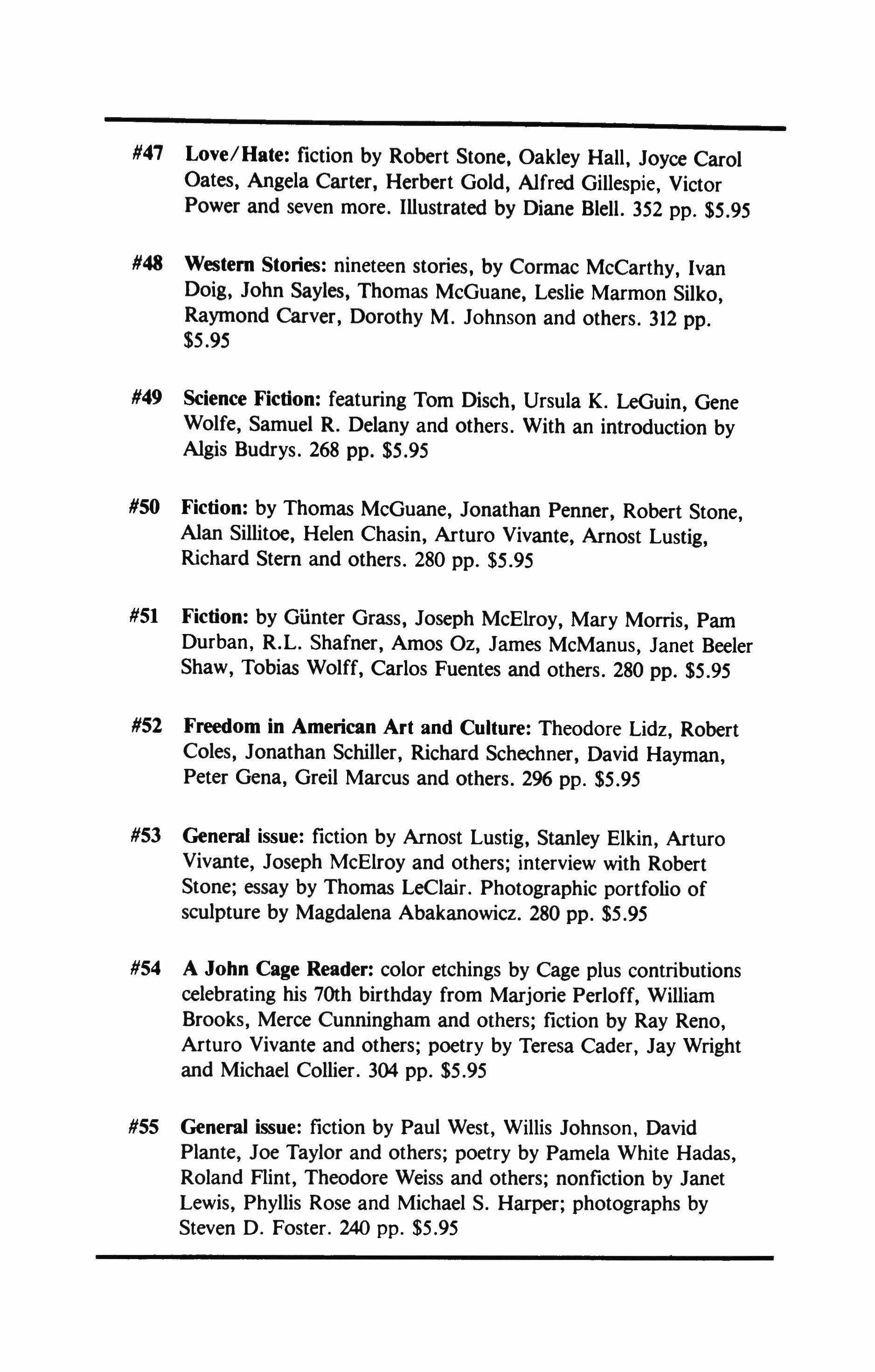
#47 Love/Hate: fiction by Robert Stone, Oakley Hall, Joyce Carol Oates, Angela Carter, Herbert Gold, Alfred Gillespie, Victor Power and seven more. Illustrated by Diane Bleil. 352 pp. $5.95
#48 Western Stories: nineteen stories, by Cormac McCarthY, Ivan Doig, John Sayles, Thomas McGuane, Leslie Marmon Silko, Raymond Carver, Dorothy M. Johnson and others. 312 pp. $5.95
#49 Science Fiction: featuring Tom Disch, Ursula K. LeGuin, Gene Wolfe, Samuel R. Delany and others. With an introduction by Algis Budrys, 268 pp. $5.95
#50 Fiction: by Thomas McGuane, Jonathan Penner, Robert Stone, Alan Sillitoe, Helen Chasin, Arturo Vivante, Arnost Lustig, Richard Stem and others. 280 pp. $5.95
#51 Fiction: by GUnter Grass, Joseph McElroy, Mary Morris, Pam Durban, R.L. Shafner, Amos Oz, James McManus, Janet Beeler Shaw, Tobias Wolff, Carlos Fuentes and others. 280 pp. $5.95
#52 Freedom in American Art and Culture: Theodore Lidz, Robert Coles, Jonathan Schiller, Richard Schechner, David Hayman, Peter Gena, Greil Marcus and others. 296 pp. $5.95
#53 General issue: fiction by Arnost Lustig, Stanley Elkin, Arturo Vivante, Joseph McElroy and others; interview with Robert Stone; essay by Thomas LeClair. Photographic portfolio of sculpture by Magdalena Abakanowicz. 280 pp. $5.95
#54 A John Cage Reader: color etchings by Cage plus contributions celebrating his 70th birthday from Marjorie Perloff, William Brooks, Merce Cunningham and others; fiction by Ray Reno, Arturo Vivante and others; poetry by Teresa Cader, Jay Wright and Michael Collier. 304 pp. $5.95
#55 General issue: fiction by Paul West, Willis Johnson, David Plante, Joe Taylor and others; poetry by Pamela White Hadas, Roland Flint, Theodore Weiss and others; nonfiction by Janet Lewis, Phyllis Rose and Michael S. Harper; photographs by Steven D. Foster. 240 pp. $5.95
#56 General issue: New work by and an interview with William Goyen plus fiction by Frederick Busch, Amy Hempel, Stephen Dixon, Andrew Fetler and others; poetry by Mairi Macinnes, Marvin Bell, Joyce Carol Oates, W.S. Di Piero, Lucien Stryk and others. A selection of The Small Press Book Club. 288 pp. $5.95
#57 A special two-volume set-Vol. I, A Window on Poland: featuring essays, fiction and poems written during Solidarity and martial law. Konwicki, Brandys and others, with twenty-two photos and graphic works. 128 pp. Vol. 2, Prose from Spain, featuring recent fiction and essays, plus an interview with Juan Goytisolo and eight color pages of street murals. 112 pp.
$3.95/each vol., $7.90/set
For orders of two or more books, deduct 20070 from total price. We pay postage on orders of three or more copies. (For orders of one or two books please add $1.00 for postage and handling.)
Note: While supplies last, an index to issues I-50 is available on request, free of charge, with any order.
lnQuarterly, Northwestern University 1735 Benson Ave., Evanston, IL 60201
Please send me the following back issues of lnQuarterly:
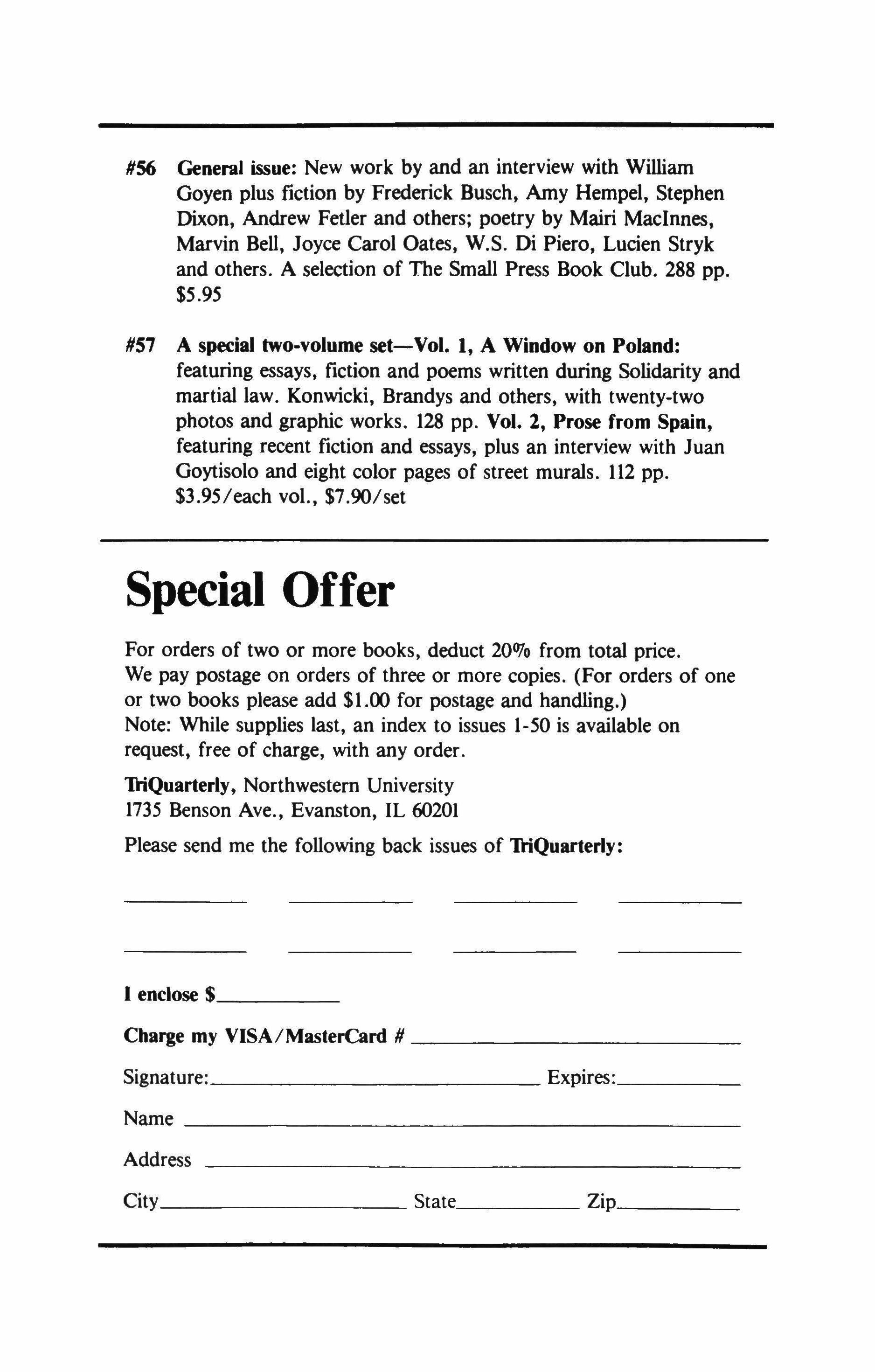
I enclose $
Charge my VISA/MasterCard #
Signature:

Richard Poirier, Editor in Chief
Thomas R. Edwards, Executive Editor
Stanley Cavell on Skepticism and Romanticism
Mary Hartman on An Economic History of Women in America
George Levine, "Darwin and the Problem of Authority"
Svetlana Alpers on Photography
William Rothman on Cinema and Sentiment
Hubert Dreyfus on Scientific Explanations
Elaine Showalter, "Critical Cross-Dressing"
Harold Bloom on Facticity
Poetry by Howard Moss
Thomas R. Edwards on The Politics of Murder
Stephen Greenblatt, Further Reflections on China
Denis Donoghue on Strangeness and Beauty
Raritan: A Quarterly Review
Rutgers University-165 College Avenue
New Brunswick, New Jersey 08903
Subscriptions: $12lyear, individuals; $16lyear, institutions
$2112 years, individuals; $2612 years, institutions
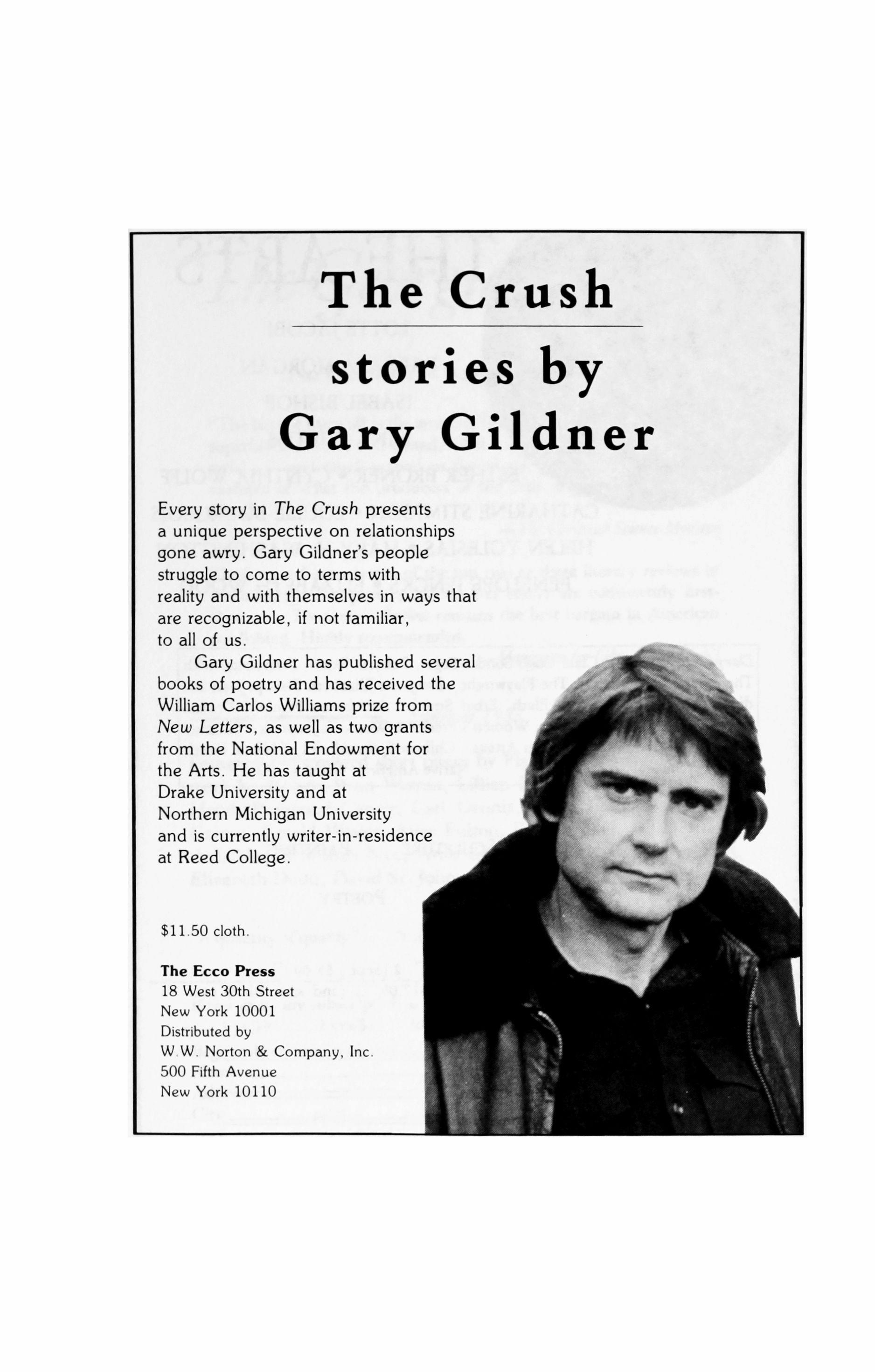
Every story in The Crush presents a unique perspective on relationships gone awry. Gary Gildner's people struggle to come to terms with reality and with themselves in ways that are recognizable, if not familiar, to all of us.
Gary Gildner has published several books of poetry and has received the William Carlos Williams prize from New Letters, as well as two grants from the National Endowment for the Arts. He has taught at Drake University and at Northern Michigan University and is currently writer-in-residence at Reed College.
$11.50 cloth.
The Ecco Press 18 West 30th Street
New York 10001
Distributed by W.W. Norton & Company, Inc.
500 Fifth Avenue
New York 10110
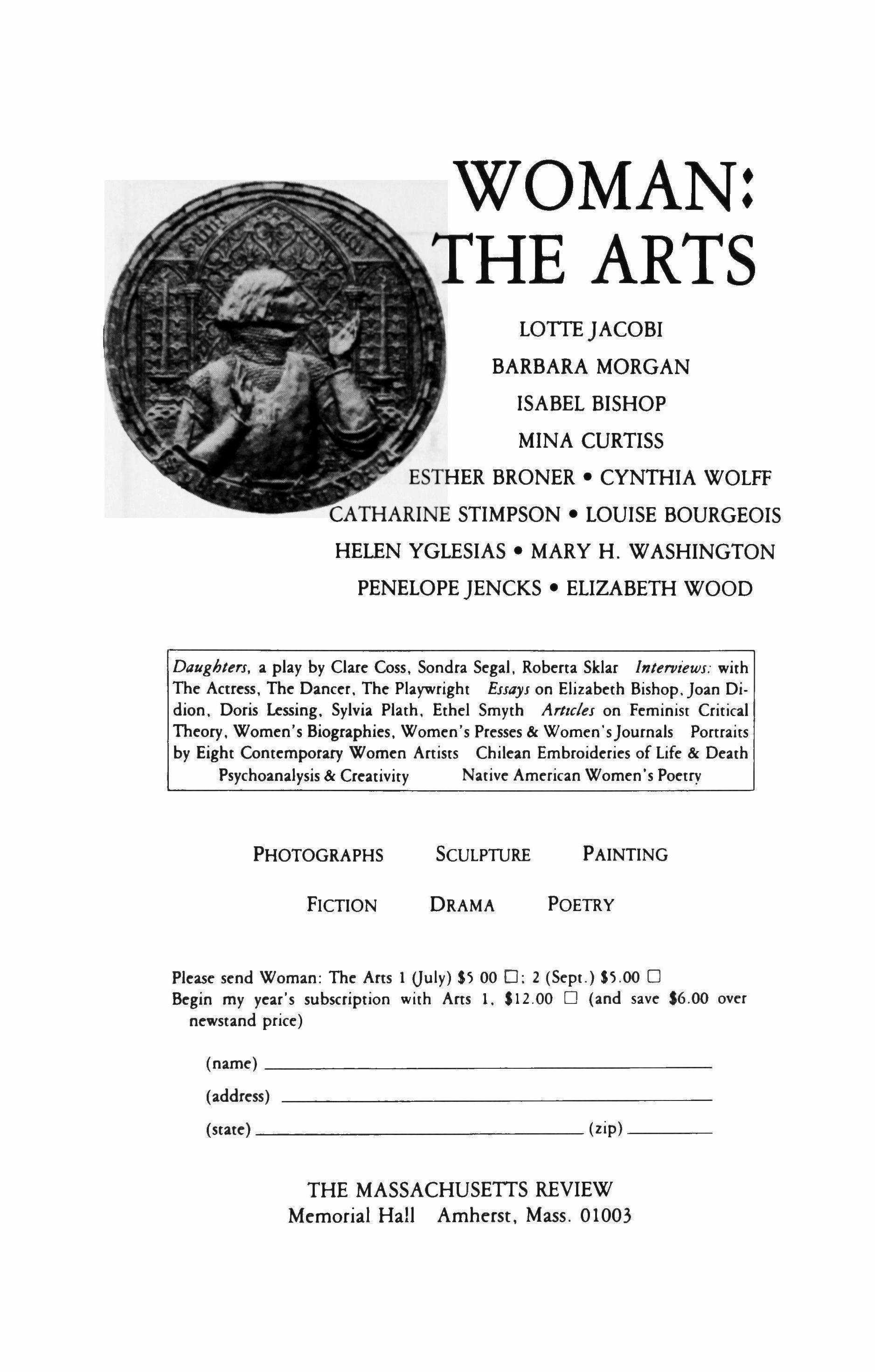
LOTIE)ACOBI
BARBARA MORGAN
ISABEL BISHOP
MINA CURTISS
ESTHER BRONER CYNTHIA WOLFF
CATHARINE STIMPSON • LOUISE BOURGEOIS
HELEN YGLESIAS MARY H. WASHINGTON
PENELOPE JENCKS ELIZABETH WOOD
Daughters, a play by Clare Coss, Sondra Segal. Roberta Sklar Inte",iews: with The Actress. The Dancer. The Playwright Essays on Elizabeth Bishop. Joan Didion. Doris Lessing. Sylvia Plath. Ethel Smyth Arttcles on Feminist Critical Theory. Women's Biographies. Women's Presses & Women'sJournals Portraits by Eight Contemporary Women Artists Chilean Embroideries of Life & Death Psychoanalysis & Creativity Native American Women's Poetry
PHOTOGRAPHS SCULPTURE PAINTING
FICTION DRAMA POETRY
Please send Woman: The Arts 1 (july) S� 00 0: 2 (Sept.) S�.OO 0
Begin my year's subscription with Arts 1. $12.00 0 (and save $6.00 over newstand price)
(name) (address) (state) (zip)
THE MASSACHUSETTS REVIEW Memorial Hall Amherst. Mass. 01003

"The best of them all is the amazing Georgia Review: modestly priced, superbly conceived and edited, filled with unusual and colorful material and much marvelous fiction and poetry. It's the supreme example of what the producers of the little magazines can accomplish."
- The Christian Science Monitor
The Georgia Review is one of the top two or three literary reviews in the country. The poetry, fiction, and essays are consistently firstclass. The Georgia Review remains the best bargain in American publishing. Highly recommended.
-Magazinesfor Libraries (4th ed.)
Featuring rediscovered short pieces by Flannery O'Connor, plus new work by Robert Penn Warren, Lillian Feder, Walker Percy, Mary Hood, Raymond Carver, Carl Dennis, Molly Peacock, Ernest J. Gaines, Gerald Weales, Alice Fulton, Donald Hall, M. L. Rosenthal, Naomi Shihab Nye, Arno Karlen, Dave Smith, Peter Stitt, Elizabeth Dodd, David St. John, &- many other fine writers.
"A quantity ofquality" "the best bargain in American publishingtoday."
Please enter my subscription to The Georgia Review (4 issues per year): I yr/$9 2 yrs/$15 (outside U.S. add $3/yr-U.S. funds only)
Begin subscription with the issue.
Name:
Address: City State Zip
The Georgia Rtvu-w is published by the University of Georgia, Athens, Georgia 30602
Critical Inquiry regularly publishes the finest articles on criticism, the visual arts, history and culture, film, music, and literature.
The September 1982 Special Issue
In our age the act of interpretation, whether it is directed at a legal or philosophical text, a novel or painting, a historical or contemporary event, or a scientific phenomenon, seems inseparable from questions of politics.
Edward W. Said Opponents, Audiences, Constituencies, and Community
Donald A. Davie
Wayne C. Booth
Julia Kristeva
Stephen Toulmin
Hayden White
T. J. Oark
Stanley Cavell
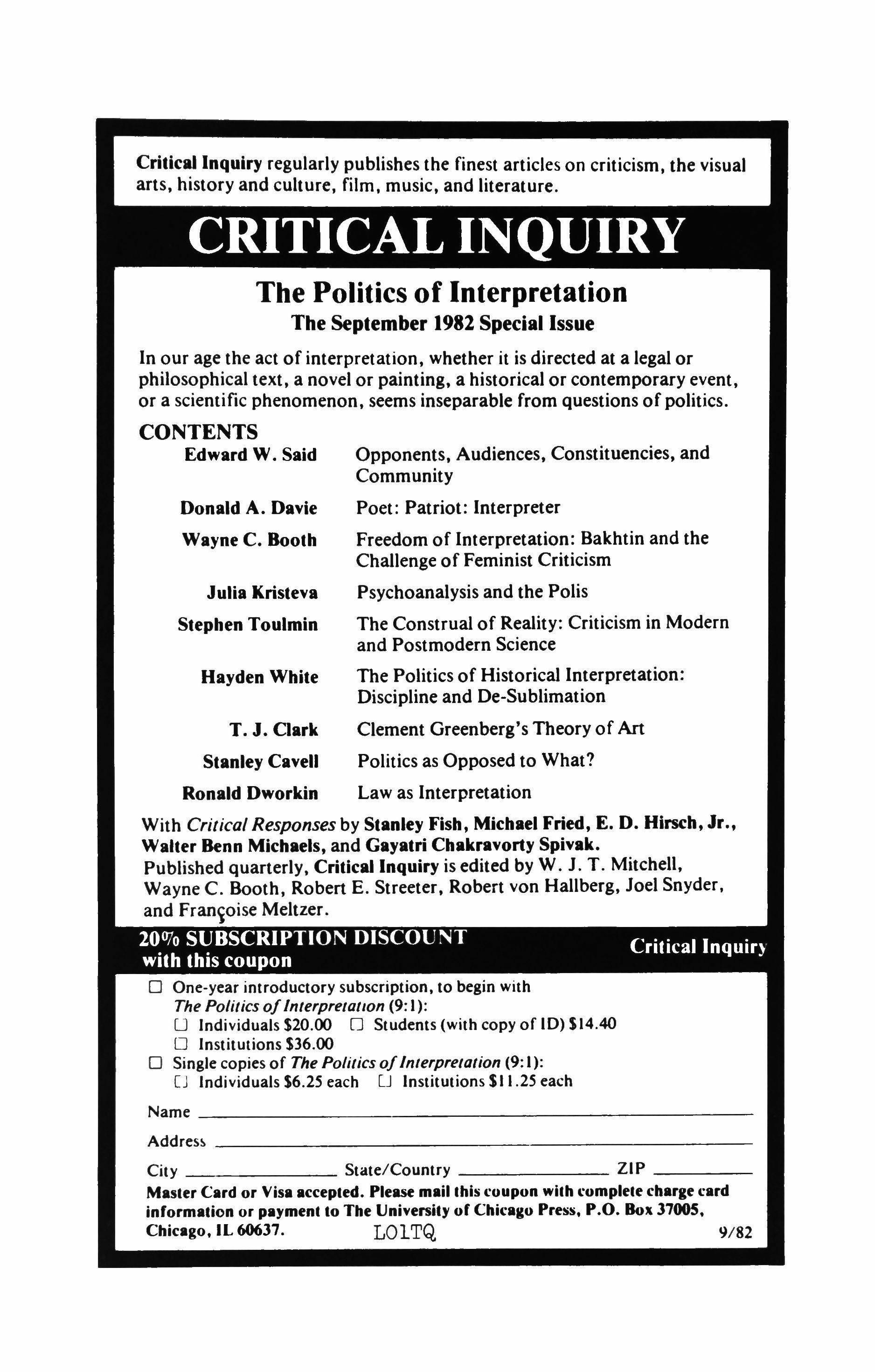
Poet: Patriot: Interpreter
Freedom of Interpretation: Bakhtin and the Challenge of Feminist Criticism
Psychoanalysis and the Polis
The Construal of Reality: Criticism in Modern and Postmodern Science
The Politics of Historical Interpretation: Discipline and De-Sublimation
Clement Greenberg's Theory of Art Politics as Opposed to What?
Ronald Dworkin Law as Interpretation
With Critical Responses by Stanley Fish, Michael Fried, E. D. Hirsch, Jr., Walter Benn Michaels, and Gayatri Chakravorty Spivak. Published quarterly, Critical Inquiry is edited by W. J. T. Mitchell, Wayne C. Booth, Robert E. Streeter, Robert von Hallberg, Joel Snyder, and Francoise Meltzer.
o One-year introductory subscription, to begin with The Politics 0/lnterpretauon (9: I):
[J Individuals $20.00 0 Students (with copy of ID) $14.40
o Institutions $36.00
o Single copies of The Politics 0/Interpretation (9: I):
[J Individuals $6.25 each [_j Institutions $11.25 each
Name
Addres�
City State/Country ZIP
Master Card or Visa accepted. Please mail this coupon with complete charge card information or payment to The University of Chicago Press, P.O. Boll 37005, Chicago,IL60637. L01TQ 9/82

Name
Address
EMBRACING OMNICIDE Louis Rene Beres
THE PREVIOUS TENANT Louis Simpson
THE RIDGE FARM A R Ammons
BUSINESS AND POETRY Dana Gioia
FIFTY-SEVEN VIEWS OF FUJIYAMA Guy Davenport
Theodore Ziolkowski
Charles Tomlinson Gail Mazur
Sonya Rudikoff
Marvin Mudrick
T R Hummer
Robert Asahina
Vernon Young
Roger Rosenblatt
Richmond Lattimore
Joseph Epstein
Paula Deitz
The FIRST FOUR ISSUES include poems by:
Anna Adams, Fleur Adcock, Jorge Luis Borges (trans. Arthur McHugh), Richard Caddel, Vuyelwa Carlin, Glen Cavaliere, Paul Coates, David Constantine, Tony Curtis, Donald Davie, Hilary Davies, Lyn Dawes, Joachim Du Bellay (trans. C.H. Sisson), Douglas Dunn, Gavin Ewart, Vicki Feaver, Graeme Fife, Roy Fisher, Eddie Flintoff, Duncan Forbes, Ronald Gaskell, Reginald Gibbons, Romesh Gunesekera, Charles Hadfield, D.W. Hartnett, J.C.M. Hepple, Nicki Jackowska, Denise Catharine James, Laurence James, Lotte Kramer, Grevel Lindop, Victor Magor, E.A. Markham, Gerda Mayer, Jamie McKendrick, Vincent Morrison, Nicholas Murray, Paul O'Prey, Peter Reading, Peter Robinson, William Scammell, Michael Schmidt, Martin Seymour-Smith, Deirdre Shanahan, C.H. Sisson, Bill Smith, Anne Stevenson, Marina Tsvetayeva (trans. David McDuff), Keith Turner, Hugh Underhill, John Ward, Joan White.
The FIFTH ISSUE (Winter 1983) will include poems by: Anna Adams, Annemarie Austin, C.B. Cox, Michael Farley, Duncan Forbes, Cynthia Fuller, Reginald Gibbons, Romesh Gunesekera, Michael Hulse, D.W. Hartnett, Paris Leary, Thomas Meyer, Evangeline Paterson, Keith Turner
SUBSCRlmON RATE for a year (three issues): £2.50 (includes postage); $7.00 abroad (mcludes surface mail)
SINGLE COPIES and BACK ISSUES: 90p (includes postage); $2.00 (includes surface mail).
-
-- - - - -
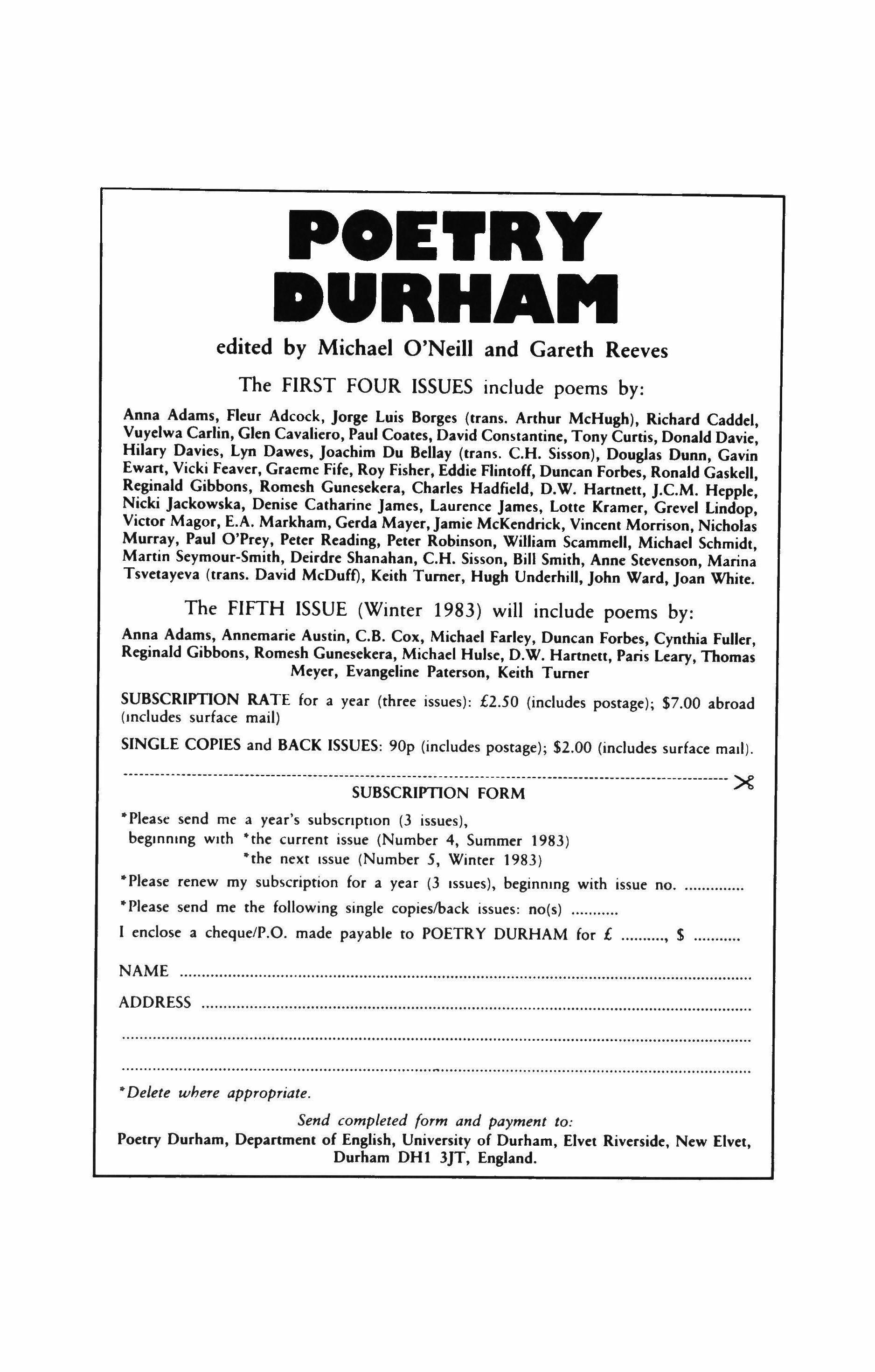
- -- - - - - - --- - - - - - - --- - - - --
SUBSCRlmON FORM
'Please send me a year's subscnpnon (3 issues), begmnmg With "the current issue (Number 4, Summer 1983) "the next Issue (Number 5, Winter 1983)
'Please renew my subscription for a year (3 Issues), beginrung with issue no.
"Please send me the following single copies/back issues: no(s)
I enclose a cheque/PiO. made payable to POETRY DURHAM for £ $
NAME
ADDRESS
"Delete where appropriate.
Send completed form and payment to: Poetry Durham, Department of English, University of Durham, Elver Riverside, New Elver, Durham DHI 3JT, England.
"He is midwife to the soul" H.D.
A triannual of fiction, poetry and criticism presents a special double issue with Freud in mind
Freud and Literature
A compendium of writers' responses to Freud, work by Michael Burkard Laura Jensen Albert Goldbarth David Wojahn Christopher Buckley William Hathaway Chase Twichell and others and an interview with John Barth.
of The Galileo Press 1983 Ha'Penny Book Contest
John Engman for his poetry collection, Keeping Still, Mountain "These poems are an uprising" Norman Dubie Jonathan Penner for his novella, The Intelligent Traveler's Guide to Chiribosco "Page by page it sparkles while it moves, like quicksilver" R.V. Cassill loW. Michaelson for his collected short fiction, On My Being Dead and Other Stories don', see how anyone could ever forger them" Knute Skinner, Bellingham Review
Mail today to The Johns Hopkins University Press
TELESCOPE
o 1 year subscription, $9.00 (includes the special Freud issue)
o Freud and Literature only, $4.25
HA'PENNY BOOK SERIES
o Engman $3.49/paperback
o Penner $3.49/paperback
o Michaelson $3.49/paperback
o COMPLETE SERIES AVAILABLE FOR $9.00

Name Address City State Zip
Send with check to The Johns Hopkins University Press, Journals Division, Baltimore, Maryland 21218.
Make checks payable to The Johns Hopkins University Press

"With The KentuckyStories, his second book,Joe Ashby Porter is clearly establishing himself as an American original. one of our contemporary myth-makers in fiction. I admire his work immensely."-john Hawkes
In these eight stories. the state of Kentucky becomes a state of mind- a semimythical realm ofthe heart's fidelities and predilections, ofviolence, fear, and love. It is a land where the cornmonplace takes on a new and marvelous glow as quixotic individuals explore the enduring puzzles of human existence.
johns Hopkins Poetry and Fiction '12.50
Thejohns Hopkins University Press Baltimore, Maryland 21218
Makoto Veda. The first comprehensive study ofmajor modern Japanese poets in English, this volume has two purposes. One is to examine the poetic theories of eight poets who are rapidly gaining prominence in world literature. The other is to increase the Western-oriented reader's understanding and appreciation of the works of Masaoka Shiki, Yosano Akiko, Ishikawa Takuboku, Hagiwara Sakutaro, Miyazawa Kenji, Takamura Kotara, Ogiwara Seisensui, and Takahashi Shinkichi. Their works. ranging from innovative uses of the traditional verse forms tanka and haiku through experimentation with free verse, provide a unique and stimulating introduction to the world of contemporaryJapanese poetry. $28.50

Tr;Quarterly is pleased to offer for sale two limited-edition books:
The Lake Series, photographs by Steven D. Foster, published by Tr;Quarterly and the Art Institute of Chicago. Winner of a 1983 Design Excellence Award from the Society of Typographic Arts. Sixteen black-and-white photos and photo-collages by a young photographer whose work combines technical mastery and a visionary sense of place. This pamphlet, issued for the one-man show by Foster at the Art Institute, and containing his introduction and a resume of his exhibitions, is a special edition of the photos published in TQ #55. Signed by the photographer. 24 pp. $5.00.
New Work and Work in Progress by William Coyen, published by Tr;Quarterly and Palaemon Press. Works that first appeared in TQ #56, reprinted in a fine hardcover edition, hand-bound with red endpapers, and signed by the author. Edition limited to 200 copies. Contains two stories, excerpts from the novella Arcad;o and from Coyen's autobiography, and a lengthy interview conducted by Reginald Cibbons. 80 pp. $15.00.
Send check or money order in appropriate amount to TriQuarterly, 1735 Benson Ave., Evanston, IL 60201. Please add $1.00 for postage and handling-except when ordered with a subscription or back issues, in which case there is no additional charge.
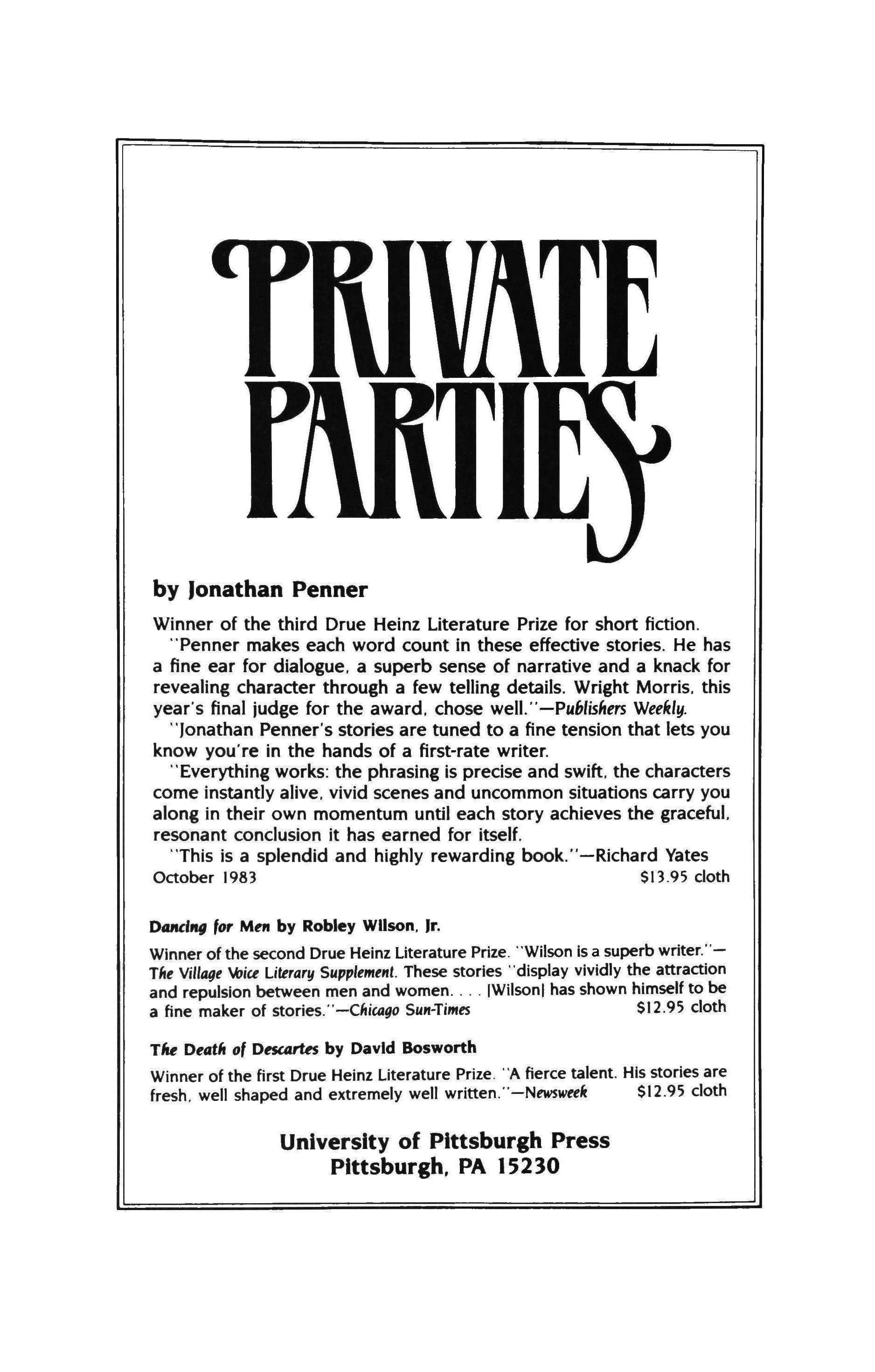 by Jonathan Penner
by Jonathan Penner
Winner of the third Drue Heinz Literature Prize for short fiction.
"Penner makes each word count in these effective stories. He has a fine ear for dialogue, a superb sense of narrative and a knack for revealing character through a few telling details. Wright Morris, this year's final judge for the award, chose well."-Publisliers Weekly.
"Jonathan Penner's stories are tuned to a fine tension that lets you know you're in the hands of a first-rate writer 'Everything works: the phrasing is precise and swift, the characters come instantly alive, vivid scenes and uncommon situations carry you along in their own momentum until each story achieves the graceful, resonant conclusion it has earned for itself.
"This is a splendid and highly rewarding book."-Richard Yates October 1983 $13.95 doth
Dad", 'Dr Men by Robley Wilson, 'r.
Winner of the second Drue Heinz Literature Prize. "Wilson is a superb writer.">
The ViIl/J4t 'obiet Literary Supplement. These stories "display vividly the attraction and repulsion between men and women IWilsonl has shown himself to be a fine maker of stories."-Chicago Sun-Times $12.95 doth
The Deatil 0' DescarUs by David Bosworth
Winner of the first Drue Heinz Literature Prize. "A fierce talent. His stories are fresh. well shaped and extremely well written."-Newsweek $12.95 doth
University of Pittsburgh Press Pittsburgh, PA 15230

